L List of Movie Reviews
(For optimum viewing, adjust the zoom level of your browser to 125%.)
L.A. Confidential (1997)
Rate:
4
Viewed:
10/04, 2/14

2/14:
I saw L.A. Confidential in 1997 and found it overrated.
It's the same sentiment again in 2004, and now, nothing has changed. The pathetic screenplay, unbelievable manipulation
of logic, and awful acting are the downfall of this show. I cringe at how racist it is.
Letting her breasts do the work, Kim Basinger wins the Oscar for her fake performance. Ever since she played Elizabeth
in 9½ Weeks, she has forgotten how to act. Her co-star Russell Crowe is so over the top that it's hard to believe
that his character can constantly maintain the wrecking-ball personality. I'm baffled by how he's fit to be a police officer.
The sight of James Cromwell is a dead giveaway because he's obviously the bad guy which ruins the element of surprise. To make
it worse, the political maneuvering by Edmund Exley (Guy Pearce) is unrealistic and illogical because, quite simply, he has no
clout to begin with.
Throughout, the avalanche of illegal police tactics push the envelope so far that the plot ceases to be believable.
Today, critics and idiots alike regard L.A. Confidential as a great neo-noir. No, it's not. It was not,
is not, and will never be labeled as a neo-noir. In fact, it's the quintessential pseudo-neo-noir.
All in all, L.A. Confidential is one of the most overrated films ever, and that's not going to be off the record, on
the QT, and very hush-hush.
La Bamba (1987)
Rate:
8
Viewed:
5/05, 5/20
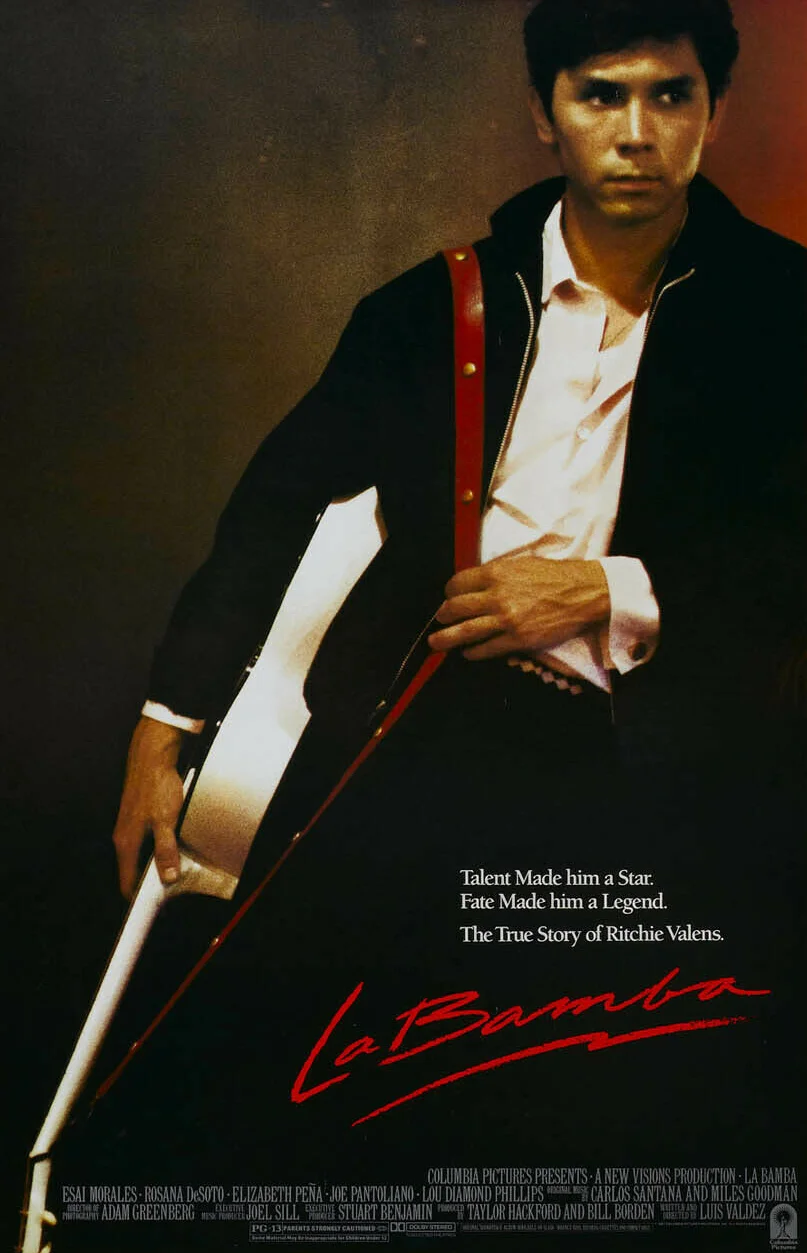
5/05:
La Bamba is a nice but fairly okay biopic about Ritchie Valens, a Mexican-American pop star who died at the age of 17
along with Buddy Holly and The Big Bopper in a plane crash near Clear Lake, Iowa, on February 3, 1959.
The movie can be monotonous at times, but it's a delight to watch because of Lou Diamond Phillips. This is the role that
made him famous, and he's perfect. His music scenes are electrifying. However, it's odd to see the attention
going to Bob (Esai Morales) more than Ritchie. Some of his scenes are redundant and pointless, prolonging the running length.
The insertion of symbolisms throughout to indicate of what's to come for Ritchie Valens is patently overdone. Interestingly,
his real family was present during the filming of the fateful scene, and they begged Lou Diamond Phillips not to get on the
plane, thinking it would happen to him, too.
All in all, La Bamba makes for a worthwhile viewing, but let's not forget who the biopic is supposed to be about.
5/20:
Making his motion picture debut in La Bamba, Lou Diamond Phillips becomes a household name.
When idiots talk about the day that music died (which wasn't coined until 1971) on February 3, 1959, they always mention
Buddy Holly and maybe The Big Bopper but never Ritchie Valens who was 17 at the time. Quick, who were the guys who didn't get
on the plane? Tommy Allsup and Waylon Jennings. The pilot wasn't trained to fly in such adverse weather although he hadn't
been properly informed of it ahead of time.
Anyway, I first saw La Bamba in 1987. Since then, I've found it weird that Esai Morales must overshadow Lou Diamond
Phillips. Is the movie supposed to be about Bob or Ritchie Valens? No matter what, it's a good performance by Esai Morales who
should've been Oscar-nominated, and what the heck happened to him afterwards? He just fell off the map, having not appeared
in a movie for two years and nothing else interesting during the 90's.
Lou Diamond Phillips didn't do the singing as most of the music was performed by Los Lobos. You can see the band when Ritchie
and Bob visits a whorehouse in Mexico. Comparing to actual history, the details are generally accurate. The coin toss didn't
happen right outside by the plane but inside the Surf ballroom in Clear Lake, Iowa. Ritchie wasn't sick that day, but The Big
Bopper was, having taken Waylon Jennings' seat as a favor.
All in all, like Selena, La Bamba is a feel-good film about an up-and-coming Mexican-American singer whose life
was tragically cut short.
La bête humaine (1938)
Rate:
6
Viewed:
7/15
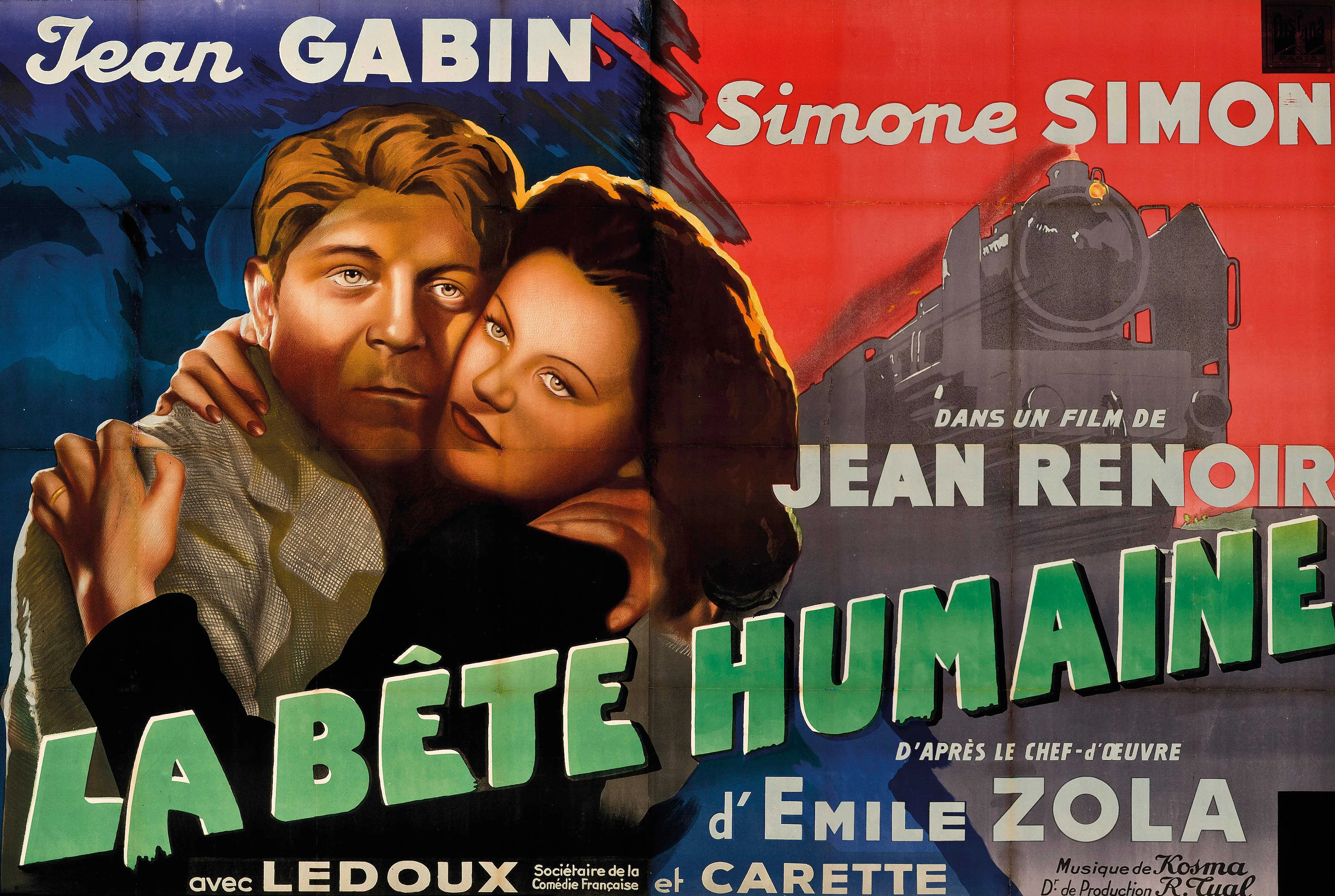
7/15:
Like many Jean Renoir's pictures, La bête humaine, which is translated as The Human Beast in English, paints
an unrealistic picture of human relations and emotions.
Unlike the previous works, it's actually the first good one I've seen out of him. The chief problem is identified during
the first scene, which is although outstandingly shot, and that's the need for better editing to speed up the pace. The film
moves slow for anything to happen. When it finally does, it provides an interesting insight of human reaction to a
certain moment. Unfortunately, that's the downfall of La bête humaine: overt simplification.
However, it gives a good blueprint of how a film noir, a term that wasn't yet coined until
1946 by Nino Frank and Jean-Pierre Chartier, works which is the reason why it's often cited as one of the earliest precursors
in the noir genre. So, I tip my hat off to Jean Renoir for this.
There are two standouts: Jean Gabin and Simone Simon as Jacques Lantier and Séverine Roubaud, respectively. They take the
time to develop their characters, reaching the peak in the final half hour to reveal who they are along with their motives.
Hence, the technique is keen, acting-wise. Séverine is an interesting character because she goes from an anti-femme
fatale to a full-blown femme fatale.
All in all, La bête humaine is a supremely photographed noir picture with great performances that can sometimes
be slow-paced and simple.
La dolce vita (1960)
Rate:
5
Viewed:
2/14, 5/25

2/14:
You may notice Anita Ekberg gracing the DVD covers, posters, and trailers of La dolce vita, but
unfortunately, she only appears in the picture for twenty minutes or so.
Thereafter, she's forever gone. That's when the film started to lose me for good because I thought it was
all about her. Anita Ekberg's presence speaks volumes, and it's the most famous performance of her career.
The rest is poetic although it's empty. Yes, I understand how boring and superficial everybody is despite their
wealth. But to watch La dolce vita for three hours long? That's too much. I could only take thirty minutes
in one sitting. But yes...this is the film that birthed the term "paparazzi" because of the character's name
Paparazzo.
All in all, you'll either love or hate La dolce vita, but I'm indifferent and consider it to be another
overrated film by Federico Fellini.
5/25:
I'm dropping my rating from '6' to '5' for La dolce vita.
It's overlong, boring, and devoid of meaning although I acknowledge it as the most famous film to come out of
Italy, putting Federico Fellini on the map. There's no story but an endless free-flowing trip from
one group of rich wastrels to another with several iconic scenes, especially at the Trevi Fountain. Obviously,
they've got too much time on their hands.
All in all, the biggest mistake of La dolce vita is making Anita Ekberg's screen time so short, causing it
to be pretty much finito afterwards.
La Femme Nikita (1990)
Rate:
4
Viewed:
10/16
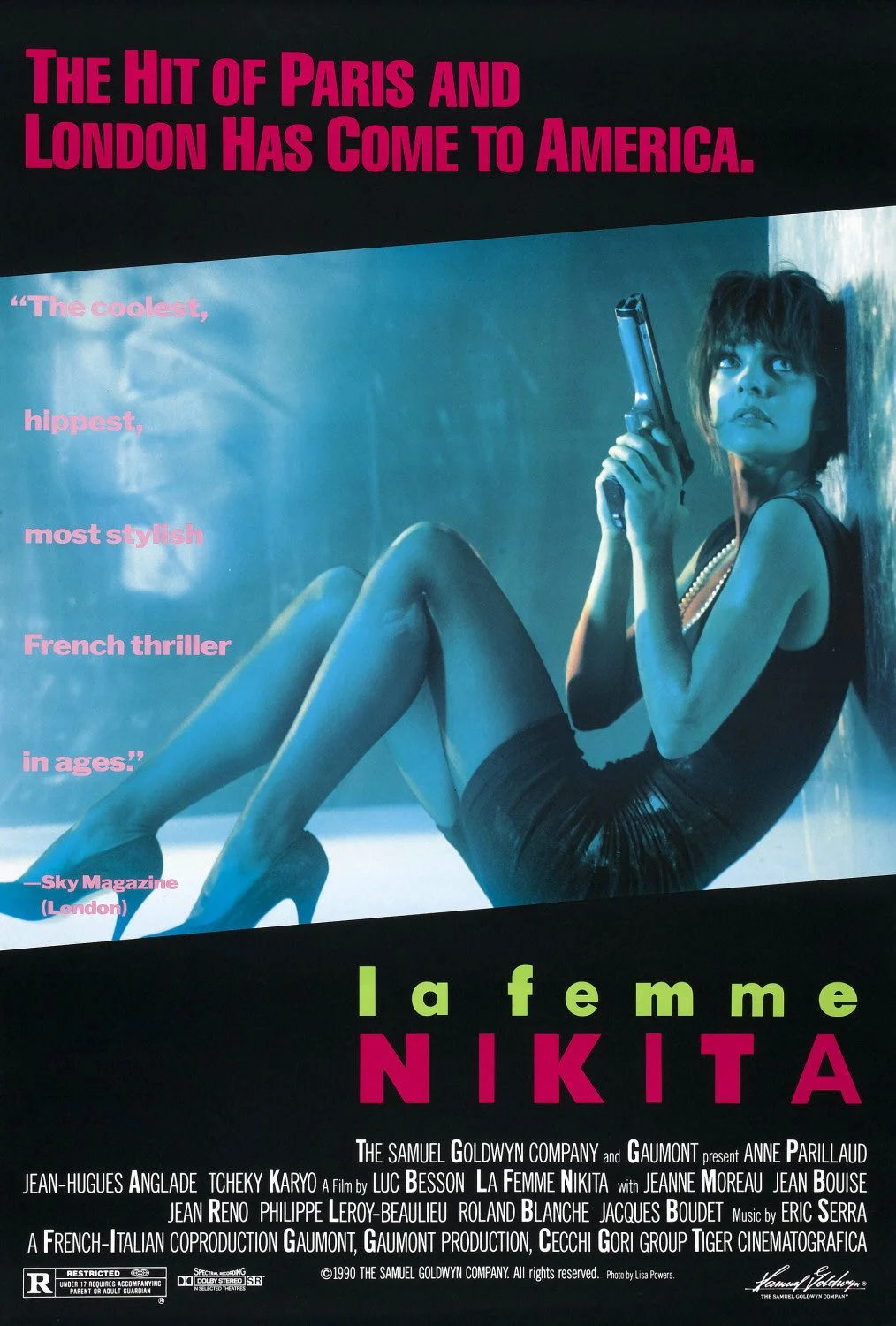
10/16:
La Femme Nikita seems to have been made recently as it caters to today's moronic teenagers who have
trouble discerning between fantasy and reality.
The film was going okay for a while until Victor, aka Léon, showed up. Then, it's all downhill from there on.
He acts like a mental retard who has no clue what the fuck he's doing like in
The Professional.
Observing her 90-pound skinny body with thin arms, I fail to see how Nikita can muster up any strength to
inflict physical damage. Her mental instability is a dead giveaway that this is not a person to be trusted.
So, Nikita is discovered to be special just because she has the ability to dissociate herself from the rules of
society? Then, why did she fall apart quickly within a couple of jobs into her new profession? Like I said,
this film is strictly for moronic teenagers.
All in all, don't believe the ridiculous hype surrounding La Femme Nikita.
La règle du jeu (1939)
Rate:
2
Viewed:
2/09
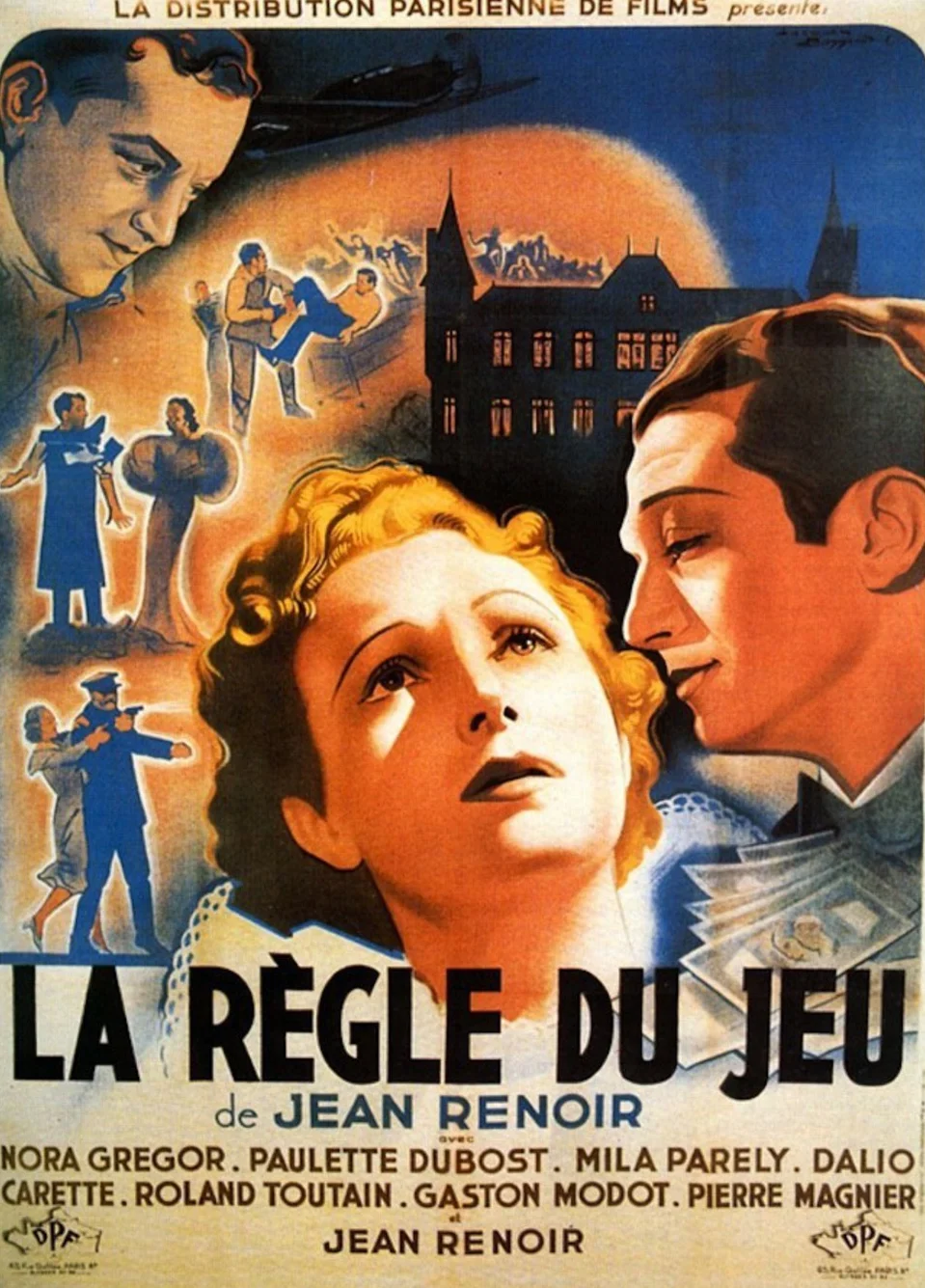
2/09:
I hate French movies, I hate Jean Renoir, and therefore, I hate La règle du jeu.
If you're stupid like I am, the English translation of the title is The Rules of the Game. While watching it, I didn't
know what the fuck was going on. If there's something important I'm supposed to observe closely, well la dee dee
da...what the fuck do I know? I must have missed it and therefore don't fucking care.
All in all, La règle du jeu is what's wrong with pseudo-intellectuals who absolutely love it.
La vita è bella (1997)
Rate:
8
Viewed:
2/13
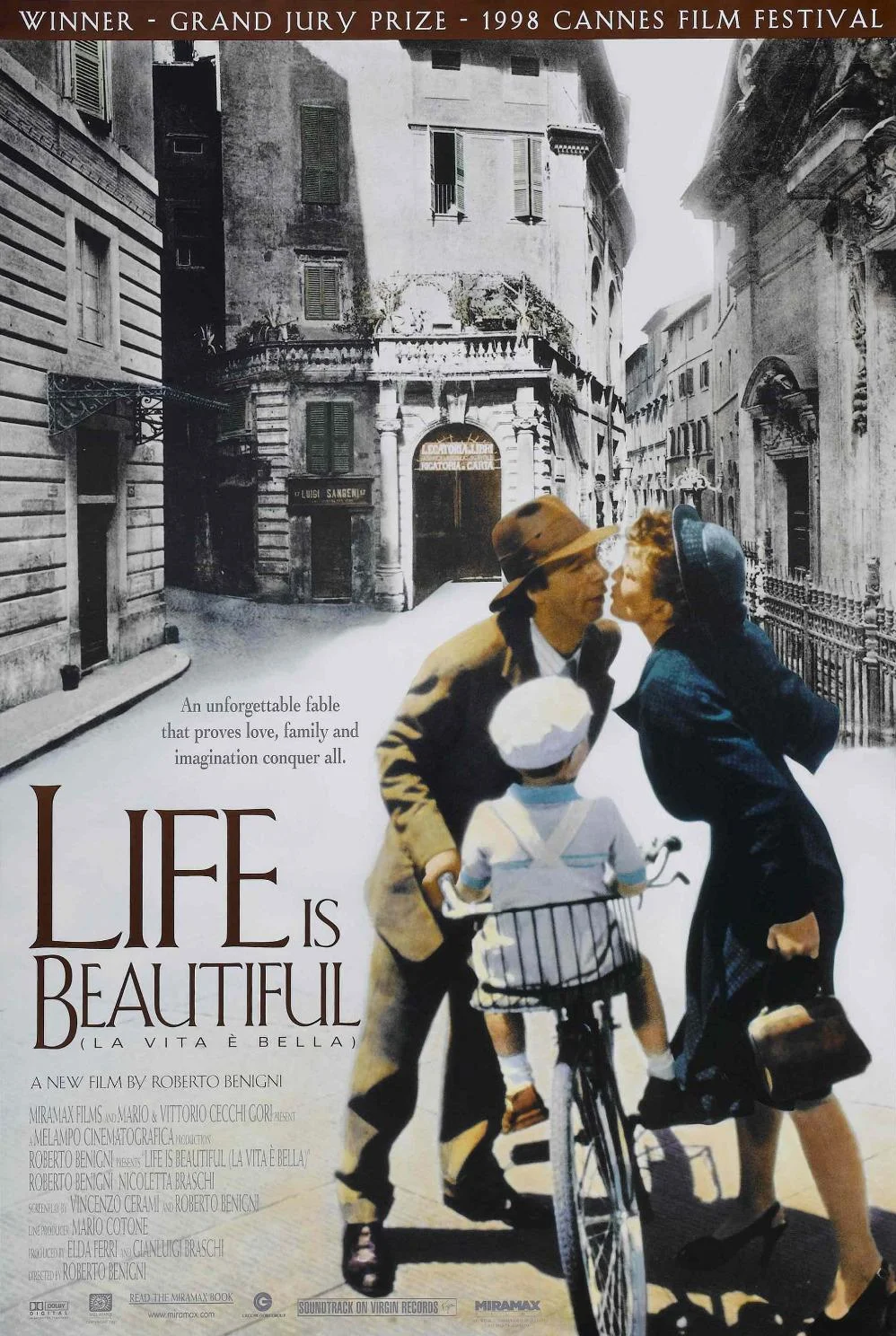
2/13:
Why La vita è bella (Life Is Beautiful) is such a memorable film is due to what Roberto Benigni did during
the 1999 Oscars show when he literally walked over the people who were in their seats.
I saw the scene live on television, and it was a cool, spontaneous moment. But I had never seen the film until now. The reason
why I didn't is that I wasn't particularly keen about the prospect of being trapped by a slow-paced Italian picture.
During the first half, I realized my misfortune because it had gotten loquacious and unfunny. Then, like how it happened in
Vertigo, things started to change, and a perspective began to develop after the characters were ushered through the
critical phase of the Holocaust. After seeing what had transpired between father and son about making it a game to
be played, I wasn't sure if I should be offended or say, "Well...that's an interesting point of view."
To make the Holocaust a positive experience for the sake of shielding the son's eyes from the horrors in order to mitigate the
effects of the inevitable psychological trauma that will soon follow after liberation sets up La vita è bella
as a compelling film. There's a lot of wit throughout, I must say.
All in all, I'm going to have to watch La vita è bella again in the future to see if it holds up.
Labyrinth (1986)
Rate:
1
Viewed:
1/08
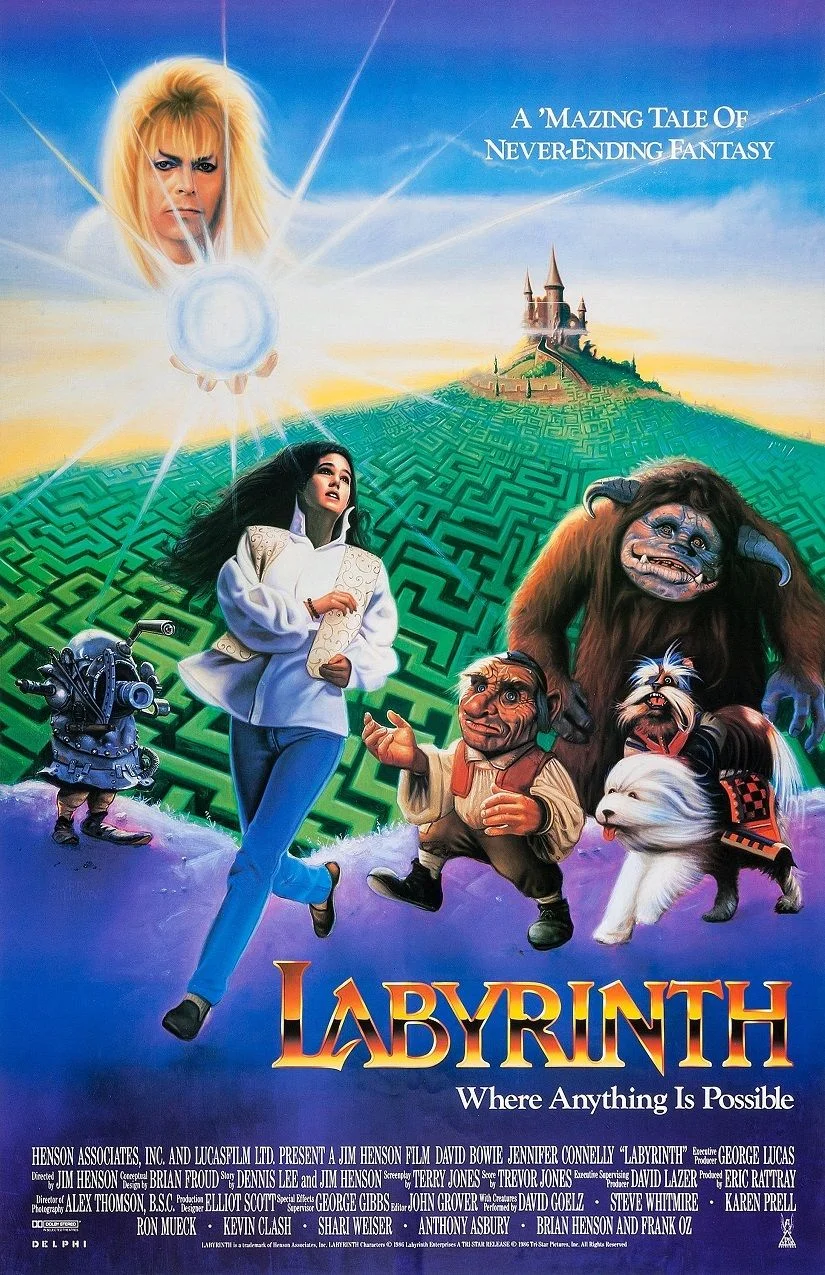
1/08:
Because Labyrinth was directed by Jim Henson, I figured the movie couldn't be bad.
Wrong. It's bad. Not only that, but it's also dreadfully boring. Nothing works for me. No wonder why the film
was a massive box-office failure. The characters are ugly, and I hate them all. Nobody can act. The plot sucks.
It's like being in Waldo's World. Yeah, the design looks nice and all, but I was thinking of uh...entertainment?
Excuse me, is that David Bowie's penis showing through his extremely tight spandex pants? It looks like he had
an erection for appearing in a children's film. One scene shows him throwing a "baby" up and down in the air.
Oh, my goodness.
All in all, Labyrinth is shockingly awful.
Ladder 49 (2004)
Rate:
3
Viewed:
2/25
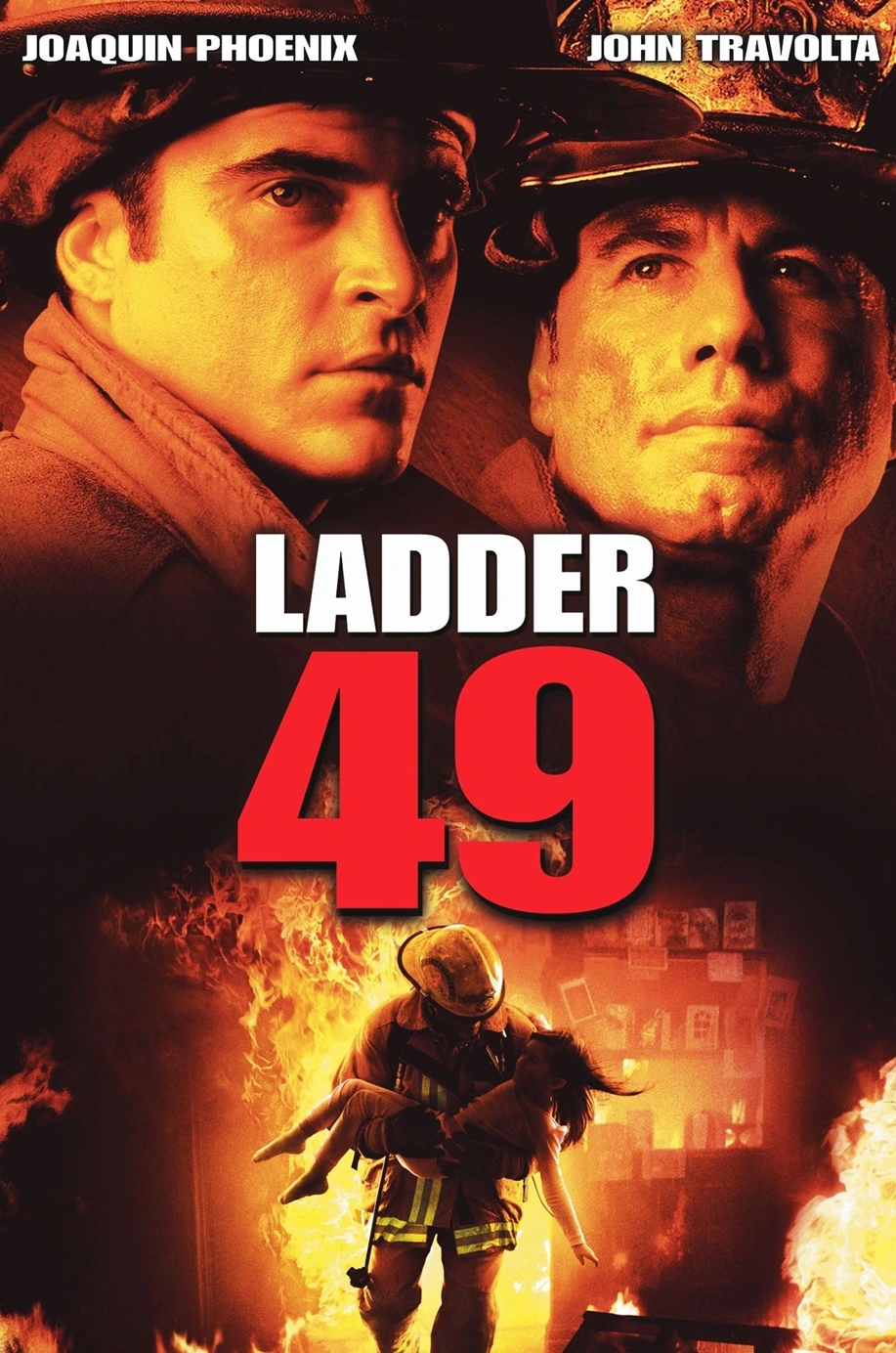
2/25: Ladder 49 is long and clichéd.
After it was over, I looked up online for cons of being a firefighter, and there were as follows: politics,
too much time away from family, unable to forget the traumatic sights, cancer, incessant pranks/bullying, and
sleep deprivation, among others. There were times I wondered if it was worth losing lives to save people in
that piece-of-shit city called Baltimore.
The biggest mistake is giving a lot of attention to Jack Morrison's wife. I absolutely do not care
about her. The director should've focused on the firefighting aspects. The more situations shown, the better.
Instead, it's been "Hi, honey...how was your day?" and "No!!!!! Don't go!" As a result, my eyes had become glassy.
Memo to Hollywood: get rid of Jacinda Barrett; she stinks at acting. Ditto for Joaquin Phoenix who's virtually
the same every single time despite his ability to carry a movie.
Another is not aging anybody. Ten years pass, and everybody doesn't look any different compared to day one. At
least, John Travolta, who's the only reason why I bothered with this crap film, gave the old college try by
making his sideburns white. Speaking of time, people sure get married quickly after a random meeting at the
supermarket, huh?
Oh, boy...so many mistakes. Where there's fire, there's always smoke...lots and lots of it, but Ladder 49
makes sure there's no such thing, especially inside of buildings. Whenever a firefighter saves a person, he will
have a second mask ready. What can possibly be accomplished from walking atop the roof? Why is Jack Morrison alone
in the building that cost his life when he should be working in a team of 2's or more? Where is his mask anyway?
Firefighters just don't deal with fires all the time; they attend to medical calls, automobile accidents,
hazardous material spills, water rescues, natural disasters, and so on.
All in all, although illogical and ridiculous, Backdraft is better than
Ladder 49.
Ladri di biciclette (1948)
Rate:
7
Viewed:
5/04, 12/07

12/07:
After seeing Ladri di biciclette, which is better known as The Bicycle Thief to us American pigs,
for the first time, I was moved by the simplicity of the story and gave it a '10'.
Now, I feel it moves too slow. Nevertheless, there are beautiful shots throughout, and the story is still poignant.
Lamberto Maggiorani, who was a factory worker turned nonprofessional actor, gives a performance that not many are capable
of. Sadly, he never replicated the same success for the rest of his life. Enzo Staiola will always be memorable as the
little boy.
All in all, Ladri di biciclette is the quintessential example of the Italian neorealism wave.
The Lady from Shanghai (1947)
Rate:
10
Viewed:
3/14, 1/15

3/14:
If the wunderkind said, "My name is Orson Welles. I invented the word 'genius' and defined it," I would've believed him.
He was one of the greatest directors ever lived. Look no further than
Citizen Kane, The Magnificent Ambersons,
and The Lady from Shanghai. His third work of genius has the most implausible plot of them all, yet it's saved by three
critical elements: Orson Welles, Rita Hayworth, and Charles Lawton's cinematography.
One of the fastest-paced pictures I've seen, The Lady from Shanghai is that good and twisting. A dominating presence,
Rita Hayworth lets her looks, especially the platinum blonde hair, to ward off any suspicions of being a femme fatale.
Orson Welles knew how to amp it up in any scene. Nowhere is this epitomized more than the Hall of Mirrors which is one
of the finest and the most creative. It's surreal and Dalí-esque, having been possibly influenced by the dream
sequence in Alfred Hitchcock's Spellbound.
All in all, although the plot is difficult to swallow, The Lady from Shanghai is an undeniable Orson Welles classic.
1/15:
If not for Charles Lawton's masterful cinematography, The Lady from Shanghai would've never been the film as it is.
Confusing and incomprehensible, Orson Welles' story is perfect for film noir, and his genius is that nothing is what
it seems. How obvious Welles' character is being framed for a murder, yet he's willingly to go along with it.
Rita Hayworth is beautiful as the platinum blond siren who shocked everybody by radically changing the color of her hair. The
most famous scene is the Hall of Mirrors which is something to behold. There's nothing like it. Once again,
that's the genius of Orson Welles.
All in all, if I have to pick a top ten noir masterpiece, it's The Lady from Shanghai.
Lady in the Lake (1946)
Rate:
8
Viewed:
10/08, 2/24

10/08:
If there's one thing that's unusual about Lady in the Lake, the whole film was shot from the first-person perspective,
a cinema's first.
Unrealistically showing too much expression, Audrey Totter, who plays the sexy Adrienne Fromsett, steals the show but is
hampered by what she has to work with. She's drop-dead gorgeous, cunning, and alluring. Why...her character can be the killer
after all.
Then, there's the 20-year-old Lila Leeds who looks hotter than Audrey Totter. That's why Phillip Marlowe almost twisted his neck
while eyeing her until reaching the back of his head. Sadly, her acting career started to fall apart when she was busted with
Robert Mitchum for possession of marijuana and served time. If you look at the famous photo showing him in court, that's Leeds
on the left. During her stint in jail, she was introduced to heroin and developed an addiction. She became destitute and worked
as a faith healer during the 70's.
Anyway, the plot is very convoluted, and I couldn't wrap my head around it. Despite the film's promise of me being involved
in solving the murder case, I've never felt that way. One thing I would've done at the outset is to ask for a picture of
Chrystal Kingsby and, if possible, a picture of Mildred Havelend, Muriel Chess, or whoever the hell she's supposed to be. It'll
clear up the matter because when Marlowe entered Chris Lavery's house, a Sandy Dennis look-a-like female came out and acted
peculiarly. At the same time, I found it impossible that she overlooked the body in the shower which obviously meant she was
connected, only to reveal later to have done it.
All in all, Lady in the Lake is well known for being shot in the first-person perspective, but it's a badly
executed film.
10/08:
Lady in the Lake is better this time, but wow, the plot is convoluted as ever.
Okay, let's try to unravel the mystery. I believe Mildred Havelend and Muriel Chess are one and the same. First, Mildred killed
Florence Almore, the wife of a doctor whom she was working for, so she could marry him. Somehow, Lieutenant DeGarmot
found out about it but fell in love with her. As a deal, he would fix it by making the murder look like suicide and sushed
the Graysons, Florence's parents. In turn, Mildred had to disappear.
Wanting to get away from DeGarmot, Mildred decided to marry Bill Chess and therefore assumed the name of Muriel Chess. Somewhere
along the way, she fell in love with Chris Lavery, and so did Chrystal Kingsby. They fought over him, and as a result, Chrystal
Kingsby was killed and was therefore the "lady in the lake." Chris Lavery knew about it. That's why he had a slip of the tongue
and thus corrected himself by saying "is" for "was" when Phillip Marlowe had a conversation with him at his house.
Thereafter, Muriel Chess disappeared with Chris Lavery to El Paso, Texas, which led to Bill Chess being charged with his wife's
murder since her "corpse" was found in the lake. Because of Phillip Marlowe going there to find out what happened, he
inadvertently tipped off the true identity of Muriel Chess to DeGarmot who was still looking for her.
For some reason, which could be that love had gone sour, Muriel Chess killed Chris Lavery to tie up a loose end while setting
up Adrienne Fromsett for the murder. Then, she pretended to be Mrs. Fallbrook when she was surprised by Phillip Marlowe while
going downstairs. What's strange here is that he never heard gunshots when walking to the house. Once Mildred's original plan didn't work
(Marlowe took the gun and the handkerchief which were intentionally planted), DeGarmot tried to find a way to pin the murder
on Phillip Marlowe. It's possible this was when he, after falling for Mildred for the second time, was doing another favor
for her. At the end, DeGarmot, who finally had enough of the trickeries, decided to kill her and tried to set up Marlowe to
take the fall but failed.
While this was going on, Adrienne Fromsett's only motive was to prove Derace Kingsby's wife was dead, so she could marry him
and inherit his money. After the plan failed, she got mad but decided to turn her interest toward Phillip Marlowe. Why he
would accept this arrangement after what happened is a very good question. Anyway, I have to laugh at the "trail of rice."
Like it'll be clearly visible...not.
The biggest mistake Robert Montgomery made is not taking me to the lake. I thought I was given the chance to solve the mystery
alongside him. Instead, he withheld some information from me. Gee, thanks for nothing. The first thing I would've asked from
the outset is pictures of Chrystal Kingsby and Muriel Chess.
At least, Audrey Totter saves the film from getting worse. I prefer not to see Robert Montgomery because he's no Phillip
Marlowe. The way he talks, eek...it's hard to believe that Adrienne Fromsett was still interested in him. The first-person
perspective works, but it should've been used 100% of the time.
All in all, Lady in the Lake is a good try but has several mistakes here and there.
Lady in White (1988)
Rate:
3
Viewed:
11/07
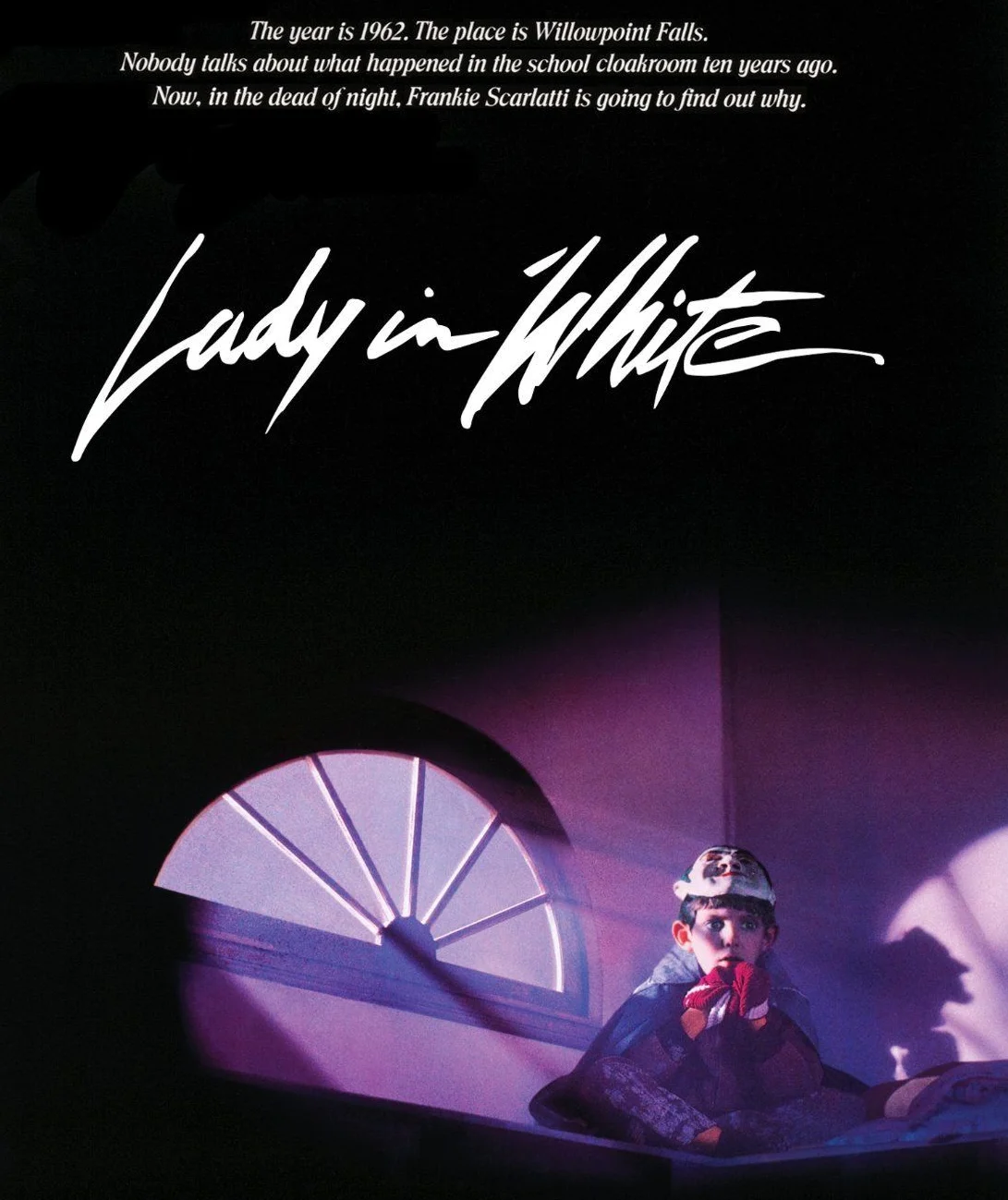
11/07:
Notwithstanding the nice special effects, Lady in White is a turd.
It has more questions than answers. At the beginning, I don't understand why the guy, who walks to the cemetery before narrating
the story, is black. I knew he was the director because of the freckles. Yet the protagonist, as the story unfolds, turns out
to be a white boy.
As much as I can't stand Luke Haas, he's sort of okay here. His dilated pupils, along with his dumbbell ears,
still bother me. When I thought I had the angle figured out, I was only half right. So, what's problem? Easy, I never got to
know why. Rather, it's all about the special effects and being scared, that's all.
All in all, for a potential ghost story picture, Lady in White fails.
Lady Sings the Blues (1972)
Rate:
9
Viewed:
3/24

3/24:
Lady Sings the Blues is a depressing biopic about Billie Holiday all the way through.
Diana Ross of The Supremes had no acting experience prior to the film, and it's a stunning debut for her. She has many
sad moments. Now, you know Billy Dee Williams, but this is the one, along with
Brian's Song, that made him a household
name. Richard Pryor is impressive as Piano Man; it's too bad about his character at the end.
Unfortuntely, the direction isn't great, but John A. Alonzo's cinematography saves the overlong film which was falling apart
in the final hour. There isn't much of substance while Diana Ross is going in circles with her character's drug
problem. Eventually, it's a common story as seen in hundreds of films like Bird. The editing is
on the lazy side by using newspaper articles to speed up the narrative.
Lady Sings the Blues was financed by Berry Gordy, the man who brought the Motown sound (Detroit had nothing to do
with it; it's just a city where the recording studio was situated) to America. Films like Shaft
and Super Fly created
the Blaxploitation genre that featured tough-looking, crude black characters. But Billy Dee Williams is all class in the mold
of Clark Gable, a rarity in Hollywood during the 70's. Hence, I can see how he's a role model for black males and
why black women wanted to be with him.
As for the story of Billie Holiday on screen, little of it is true. A heroin addict, she was more plump-looking in real life
than Diana Ross and didn't rename herself professionally after seeing it on some newspaper. Her musical career was more
complicated than what the film showed. She was married twice before making it a third with Louis McKay, a mob enforcer,
in 1957 but died a couple of years afterwards.
What's not known is that Billie Holiday had an affair with Orson Welles while he was making
Citizen Kane. She called him
the best she had been with. On the other hand, the film makes it seem like she was banned from performing in New York completely,
but it's only the places where alcohol was sold. However, it did take away a majority of her earning potential that left her
destitute on top of having been swindled by Louis McKay during her final years. Additionally, Billie Holiday had a drinking
problem and was in relationships with abusive men including all of her husbands.
All in all, Lady Sings the Blues should be seen for Diana Ross' impressive performance.
The Lady Vanishes (1938)
Rate:
9
Viewed:
6/14
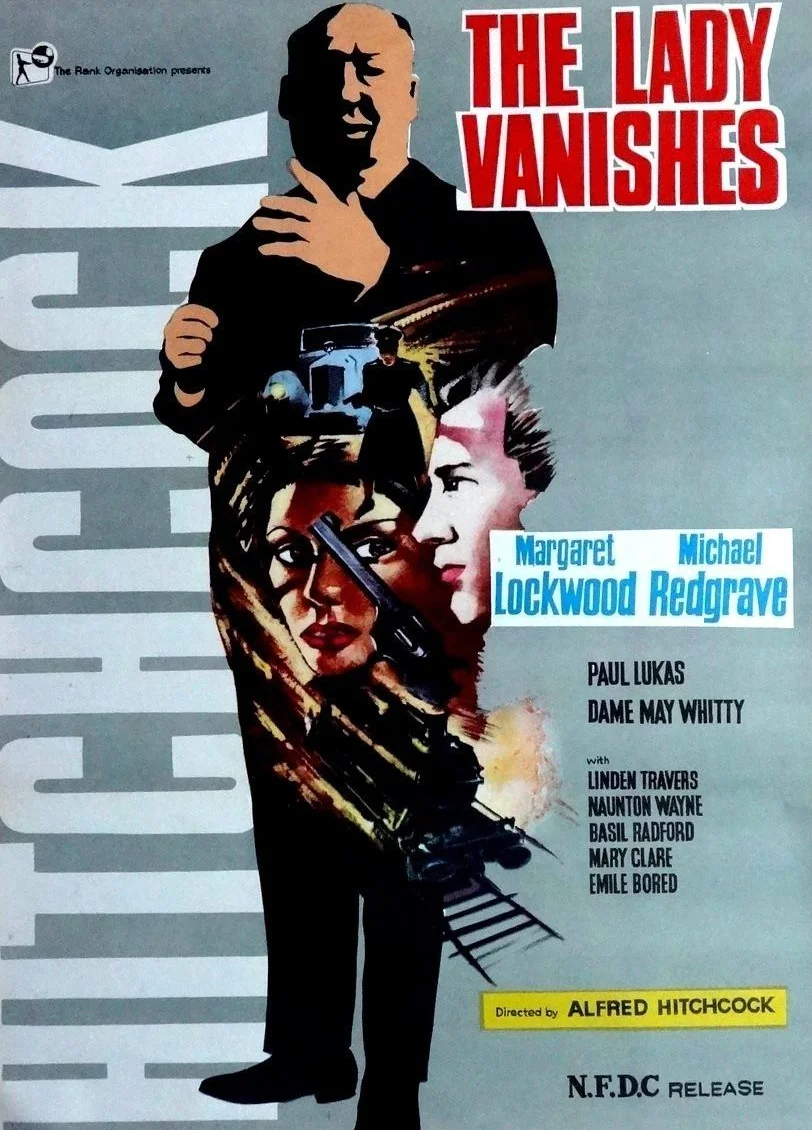
6/14:
At the beginning of The Lady Vanishes, there's a great deal of
Grand Hotel before segueing to the next
part when the characters aboard the train to begin the action.
What carries it well is the marvelous pairs of Basil Radford and Naunton Wayne as the cricket enthusiasts,
Charters and Caldicott, and Margaret Lockwood and Michael Redgrave who sings a tune that's reminiscent of
The Bridge on the River Kwai.
Because The 39 Steps is my favorite Hitchcock picture of all time for being perfect, The Lady Vanishes comes
off as formulaic. Michael Redgrave and Margaret Lockwood pick up where Robert Donat and Madeleine Carroll left off. It's
not to say the movie is that bad. On the contrary, it's well-made and enjoyable to watch.
However, I find the investigation of the old lady annoying because really...why is Iris keenly interested in wanting to
locate her? When she does, then what? How does it help her?
All in all, no matter how much it resembles
The 39 Steps, The Lady Vanishes is a Hitchcockian-worthy picture.
Ladybugs (1992)
Rate:
7
Viewed:
3/23
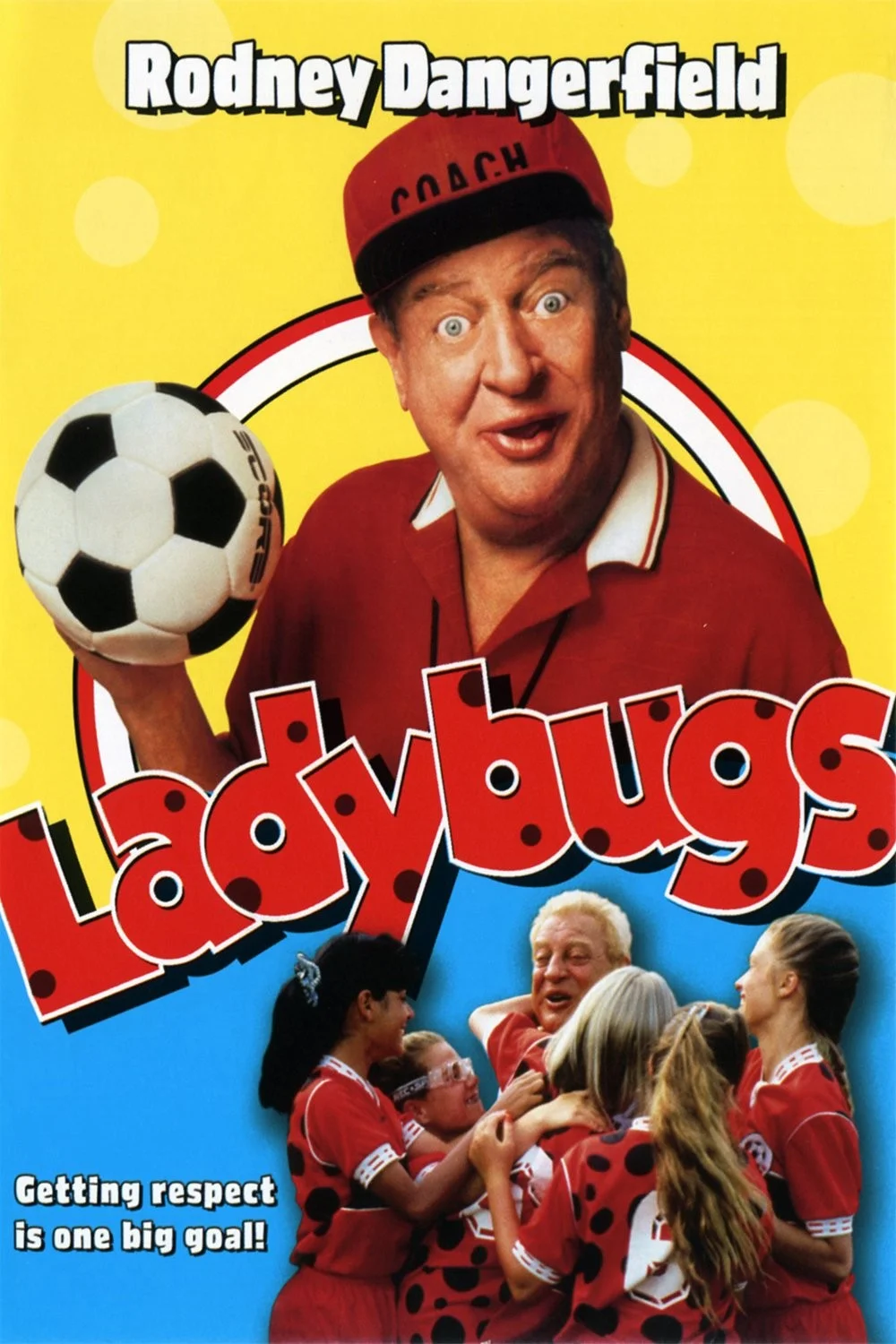
3/23:
Ladybugs is a well-known soccer movie for a couple of reasons: Jonathan Brandis in a drag and Rodney
Dangerfield.
I have to say Brandis did a good job; he's convincing enough to pass for a girl. Of course, the premise is
silly, but who cares?
Now, Rodney Dangerfield...he has more jokes than misfires. The funniest is when he related his story to the
bartender before being thrown out. Only if he knew the situation when taken in context. Sure, there's a
lot of profanity for a family film. The content is funny. It's just silly moments, that's all. Jackée Harry
isn't bad, either, as a sidekick to Rodney.
All in all, there's no Ladybugs without Rodney Dangerfield.
Ladyhawke (1985)
Rate:
3
Viewed:
8/17

8/17:
I had heard about Ladyhawke for being a great film, and when I finally saw it, my immediate reaction was, "Oh, my
goodness. It's so fucking bad!"
It's full of nonsense and belongs with the likes of
Labyrinth and Legend. Interestingly, if the
genre is fantasy and the title begins with "L," then it's bound to stink like a toilet bowl that's overflowing with
yesterday's dinner.
There's one nice idea which is the personification of the eagle through Gaston's dreams; she's sometimes real and imaginary.
Eventually, she comes alive in spirit. Yet the sucky story, cheesy acting, hokey dialogue,
and dragged pace doom the film, rendering it unwatchable for a long stretch. I can't bear it for more than ten minutes
at a time although the cinematography is nice. I normally like Matthew Broderick, but I hate him in this.
All in all, just because the movie is about fantasy doesn't mean it's automatically good.
Laffing Gas (1914)
Rate:
1
Viewed:
9/06
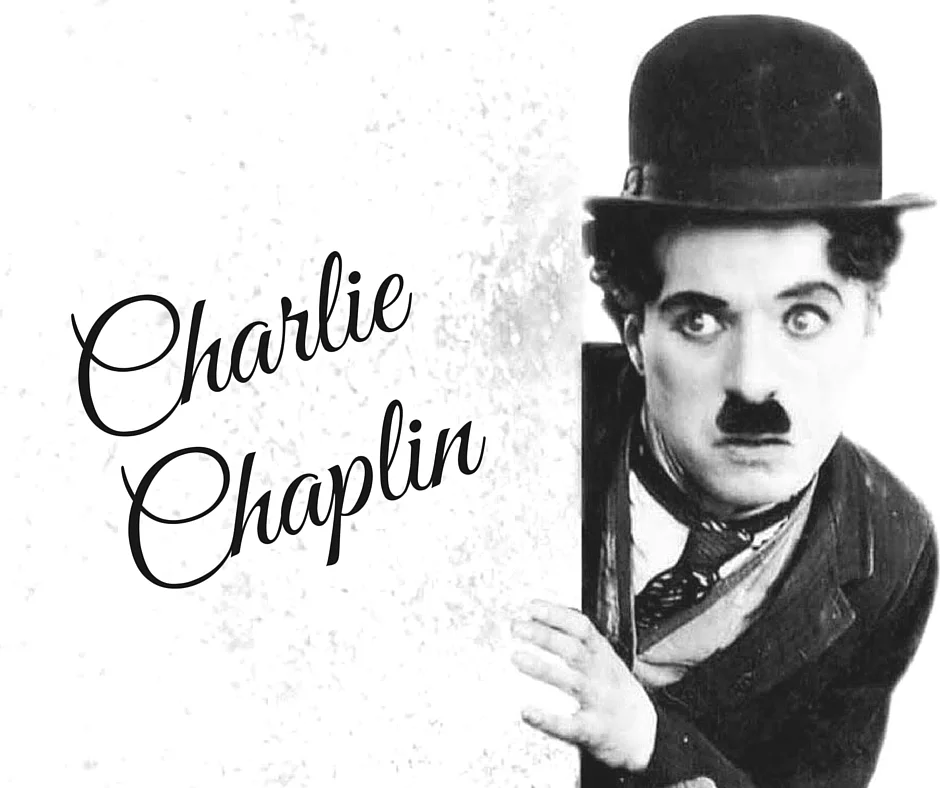
9/06:
More laughs can be generated from a dose of laughing gas than Laffing Gas.
Simply put, nothing works. Charlie Chaplin was a pure sadist. Every time I see his film, I'm more and more
convinced of it.
All in all, instead of laughter, Laffing Gas has slipped me into a coma.
The Lair of the White Worm (1988)
Rate:
3
Viewed:
7/11

7/11:
Thanks to Ken Russell's goofy approach to filmmaking, The Lair of the White Worm makes for a tough sitting.
Although there are certain aspects that work, the film is too talky. Seeing Harry Potter
doesn't help matters any, either. Honestly, things start to get boring after a while, and then it's a matter of
endurance to finish the movie. I barely survived the whole mess. It isn't what I call a true cult, horror, or
comedy film but a wannabe.
It's obvious that star potential is written all over Hugh Grant's face. Watching him act and keep a straight face
during this godforsaken crapfest has to be remarkable. Of the cast, Sammi Davis, who plays Mary, is the worst
and the most annoying. She looks like a female version of Dennis Christopher. Meanwhile, one reviewer said,
"Amanda Donohoe looks pretty hot, but the armpit hair could go." Yeah, it's true. By the way, that's her on
the movie poster.
All in all, Ken Russell was really cuckoo back then.
Lake Consequence (1993)
Rate:
8
Viewed:
7/12, 11/16
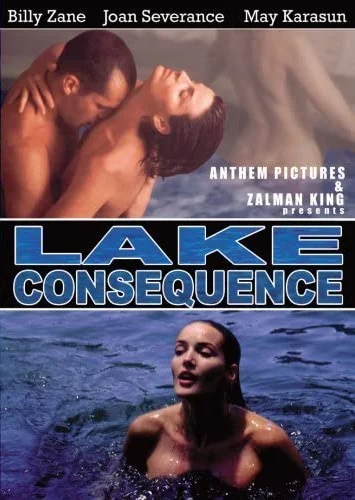
7/12:
Only Zalman King could pull it off.
He, who recently died, was focused on making soft porn films, read that as "erotica," that
rose above the material with plenty of creativity through crafty editing, quality acting, and a workable storyline.
Lake Consequence is that kind of film which is almost right up there with
9½ Weeks and Two Moon Junction.
Billy is mysterious as John from 9½ Weeks, and this is what excites Irene. Hence, Irene did what she normally
wouldn't do. She kept trying to turn around to go back home but only to return to the unknown territory.
If it wasn't for the underlying moral thread, Lake Consequence would've been labeled as another trashy soft porno
flick. Many such films focus too much on sex, and they quickly lose the luster when the players bare it all. But not
in Zalman King's films. "Less is more" is the mantra.
Also, it's the cinematography, which is highly reminiscent of 9½ Weeks with some
Easy Rider thrown in, that makes the time fly by fast. Thanks to his Greek looks, Billy Zane is hot, hot, hot.
Joan Severance and May Karasun complement him well. Because they're beautiful-looking, the improbable sexual fantasy
works, allowing them to get away with any questions about morality, hence the "vibe."
A flaw is Billy exposing himself when he loses his temper. Once he does it, he becomes less mysterious.
Why Mickey Rourke's John worked out well in 9½ Weeks is that his mysteriousness stayed intact all the way to the end
before he started to reveal a bit about himself in order to save his relationship with Elizabeth.
By the way, here's a nice piece of movie trivia: when Stanley Kubrick was shooting
Eyes Wide Shut, he called Zalman
King almost every night for tips to learn how to make the scenes as sexy as possible. Hence, it's not hard to see how
the film looks Zalman-esque.
All in all, all fans of Zalman King are strongly encouraged to see Lake Consequence to get their fix.
11/16:
Many fans of Billy Zane will remember him from either
Titanic, The Phantom,
or Dead Calm.
But most will be hard-pressed to have seen him at his sexiest in Lake Consequence which has Zalman King's fingerprints
all over it. Ever since the smash hit 9½ Weeks, Zalman King made a goal
for the rest of his life: repeat the same formula to produce more erotic films, hence Two Moon Junction,
Wild Orchid, Lake Consequence,
Wildfire, and Delta of Venus.
All except for the last two worked out well. Zalman King knew how to shoot sexy scenes without them ever becoming
stale. He understood the concept of "less is more." He kept intact the mysteriousness of the characters to make them appear
interesting over time. That's why Zalman King was called the "High Priest of Erotic Filmmaking."
Born of Greek heritage, Billy Zane takes advantage of his dark, brooding looks to pour fuel into the steamy,
passionate romance fling with Joan Severance. When May Karasun joins them, the threesome becomes hotter. By far, the best scene
takes place in the Chinese bath house with a style that's distinctively similar to 9½ Weeks.
Zalman King salvages Lake Consequence from being labeled a total sex movie by injecting an interesting thread about
Irene's dark secret. It's how she tried proverbially to remove a pebble in her shoe by reliving an escapist fantasy with
Billy only to find out everything wasn't what it all appeared to be.
The reason why I'm giving the movie a weak '8' is that Billy Zane's character got exposed when he started losing his temper
with Irene. I consider this move to be a bad idea, showing weakness in Billy Zane's acting. The same goes for Joan Severance
who relied more on her looks to get through many scenes because of her tenuous thespic abilities.
All in all, thanks to Zalman King's unique vision, Lake Consequence is one of the best erotic films made.
Lakeview Terrace (2008)
Rate:
7
Viewed:
7/23
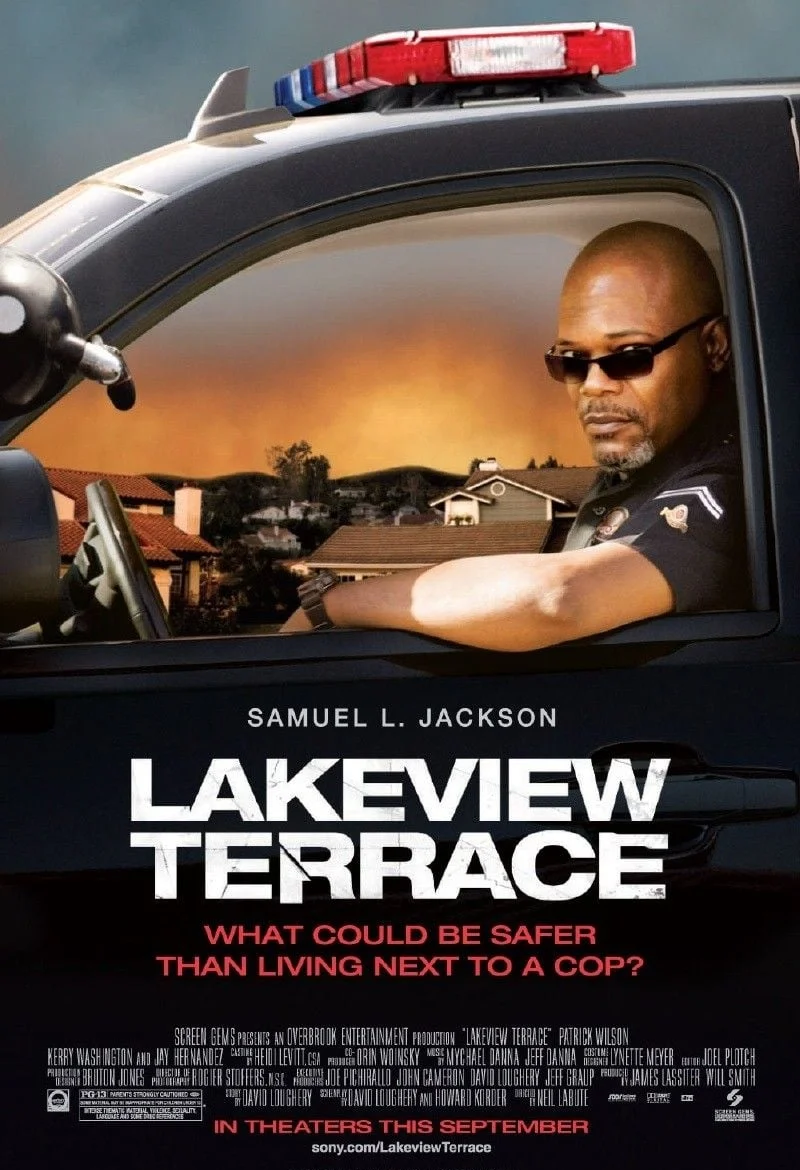
7/23:
At first, because of the DVD cover, I thought Lakeview Terrace would be a rip-off of
Unlawful Entry.
But it's a good thing that it didn't happen. This is the best performance by Samuel L. Jackson since
Jackie Brown. His
character, Abel Turner, does remind me of the cross between Officer Pete Davis (Ray Liotta) and Denzel Washington's Alonzo
Harris from Training Day.
The conversations Abel has with the newly moved-in white resident Chris Mattson are strange like one of his lines: "Say,
you know, you can listen to that noise all night long, but when you wake up in the morning, you'll still be white." I can see
where Abel is coming from. He, as a police officer, has worked on the other side so much that his personality has been
significantly altered.
As great as Samuel L. Jackson is, the rest of the film is fair. The ending is typical but an easy way out. What's
going on with Abel and Chris seems to exist in a vacuum with almost no participation from other neighbors. It'll be
nice to know how they've been affected by Abel just like his children. Yet the director makes the mistake by showing several
scenes involving only Abel because this movie is supposed to be from Chris' point of view. By the way, Lakeview Terrace
is based on a series of real-life events involving Los Angeles police officer Irsie Henry who ended up being fired.
All in all, Lakeview Terrace works well for the most part, but the chief reason to see it is Samuel L. Jackson.
The Landlady's Pet (1914)
Rate:
1
Viewed:
8/06

8/06:
I thought, after seeing Cruel, Cruel Love, the improvement would
carry over to The Landlady's Pet, but it didn't.
It's an exorbitantly stupid film which is about nothing. Charlie Chaplin was a drunk, an idiot, a whiner, a
moron, an infant, a pedophile, and a cheat, yet people liked him and thought he was funny?
All in all, I can swallow a Kodak roll and shit a better picture than The Landlady's Pet.
Lansky (1999)
Rate:
5
Viewed:
7/20

7/20:
Lansky is a disappointing biopic about Meyer Lansky who was instrumental in the U.S. expansion of the
national crime syndicate.
It's because hardly much is revealed just like the interview with the reporter at the end, so what's the
point then? Either supply the meat or don't make the film in the first place. John McNaughton is a terrific
director, but this is a big letdown coming from him. David Mamet wrote the screenplay? Um...okay. Well, that's
hard to believe.
Richard Dreyfuss' acting is excellent; it isn't his fault that Lansky didn't work out. He's a treat
to watch, especially with the makeup on him. Max Perlich is also decent as young Lansky. Eric Roberts make
things interesting by playing Bugsy Siegel who's famous for putting Las Vegas on the map. Anthony LaPaglia's
screen time is so small that his character barely matters.
All in all, adding more substance to Lansky would've been greatly appreciated.
L'armée des ombres (1969)
Rate:
2
Viewed:
5/17
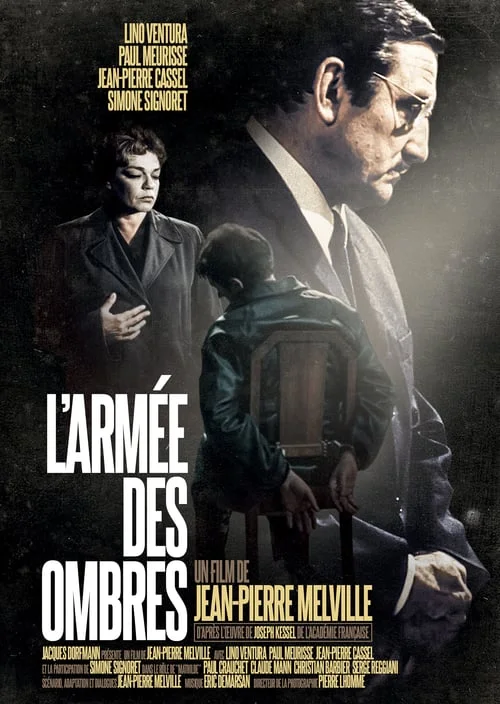
5/17:
L'armée des ombres, which is translated as Army of Shadows, is long, slow, and boring with each
adjective being worse than the preceding one.
With very few exceptions, I hate French films, and they're always the same: long, slow, and boring. "Pretentious"
is another word I'll gladly throw into the mix. Hence, don't be fooled by those who love them: they're at best
pseudo-intellectuals and at worst know-nothing sheep.
One of the worst WWII pictures ever made, L'armée des ombres took me roughly two weeks to complete. I
would watch for fifteen minutes a day before giving up and switching over to something else that I could finish
in one sitting. As a matter of fact, I saw three Star Wars pictures
consecutively, and I'm not even a fan.
The biggest facepalm moment is the sight of strings attached to the plane. It's something that Ed Wood, Jr.,
would've done. The main character, whatever his name is, jumps out of the plane without any safety gear, but it
takes forever for him finally to do so. I hardly know the names of others, and I've forgotten them as I type
this review.
All in all, L'armée des ombres is an aaaaarghhh.
Lassie Come Home (1943)
Rate:
4
Viewed:
6/07

6/07:
I'm sorry, but I consider Lassie Come Home to be a horror picture.
When it features scenes of brutal dogfighting, two men aiming to shoot a dog, meanness shown to Lassie, and the death of a
cute-looking dog, among other wretched moments, Lassie Come Home ceases to be for children.
Joe's family sold Lassie because they couldn't afford the luxuries of life? But they own a house and wear nice clothes. The
complexion of their skin passes the eye test in terms of how healthy these people look. I've seen worse situations that
reeked of despair, but they still had pets, even if they were outside a lot.
Lassie, who's the greatest and the most famous dog actor of all time, outacts everybody, and when that happens, it's not a
good sign. I'm impressed with her for performing dog tricks, jumping over a fence, walking limp, and looking bored while
everybody else is chattering away. An impressive feat that's performed by another dog is Toots' leap into a small ring.
What I don't buy is Lassie came home. Why would she do that? I hate most of the characters, especially the conceited
grandfather and the spoiled granddaughter who's played by Elizabeth Taylor. The funniest part is that Lassie
was actually paid more per week than her.
All in all, Lassie Come Home is a bona fide horror picture that's no way meant to be for kids.
Last Action Hero (1993)
Rate:
8
Viewed:
2/09, 3/24
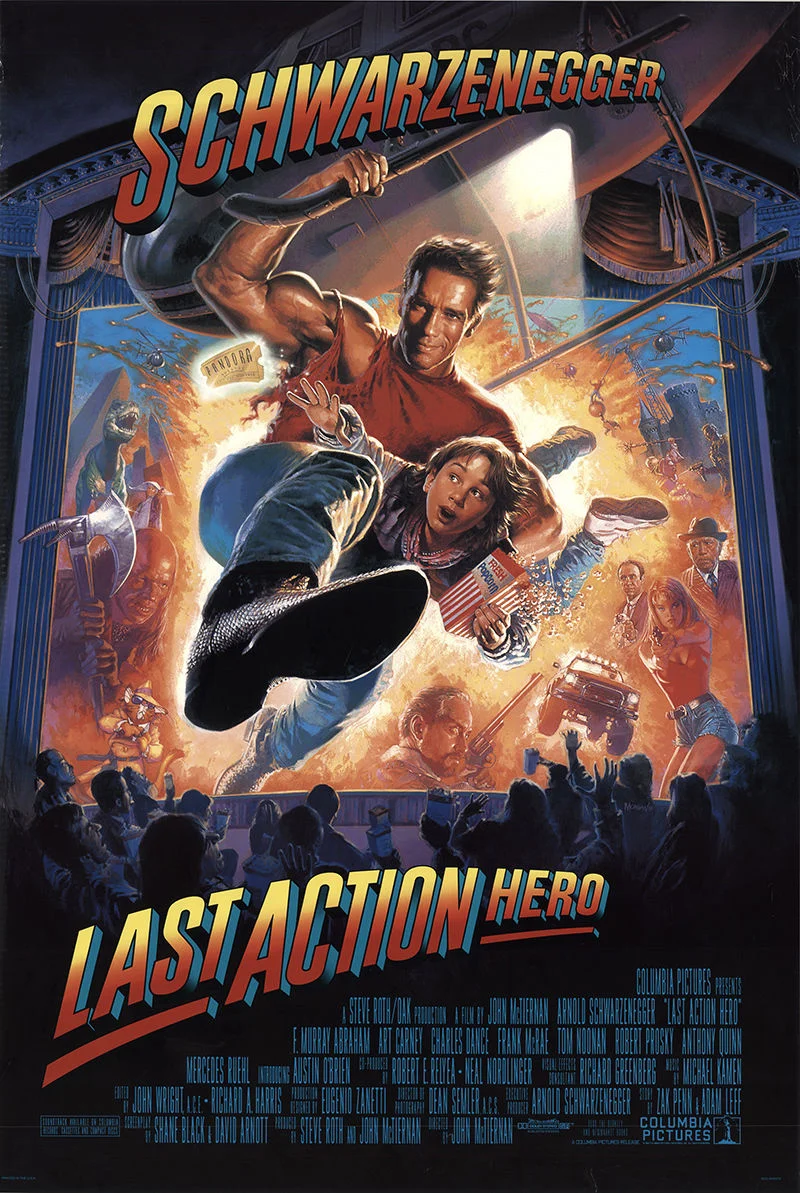
2/09:
When I saw Last Action Hero in 1993, I thought it was ingenious and different with great writing.
After watching the film again, my opinion still holds up. I don't understand why it received low marks from
critics because I've been able to enjoy the show by looking at it from several perspectives. What I love the
most is movie magic. It reminds me of The Goonies and
Hook which is the idea of going on a trip to a fantasy world where the rules
are different.
Of course, action movies have always been against common sense by abusing the laws of physics which is a big
part of Last Action Hero in a satirical way. It's cool when the kid noticed things like that and pointed
them out.
A funny twist is the kid showing Jack Slater the poster of
Terminator 2: Judgment Day as a proof of starring
in it but only to reveal the face of Sylvester Stallone. It reminds me of the moment in
Twins when Arnold Schwarzenegger mocked the size of Stallone's biceps after
seeing the poster of Rambo III.
When Jack Slater was transported to the other world, I became disappointed by the failure to keep things as real
as possible to show why the laws of physics must be strictly adhered. Of course, if Jack Slater is walking on
the streets of New York City, he should've been instantly mobbed within seconds because it's Arnold
Schwarzenegger.
All in all, Last Action Hero is a highly creative popcorn flick.
3/24:
Raising my rating from '7' to '8', I'm surprised people don't think much of Last Action Hero.
If they want movie magic, this is it. Yeah, I can see the cheap image quality from time to time, but it's a
creative movie that pokes fun of Hollywood films in general. The action might be exagerrated, but I've spotted
so many logic problems like you can't believe.
However, what bothers me is when Jack Slater made the transition from the movie world to the real world, he's
still doing the impossible stuff. That's when director John McTiernan shot himself in the foot. Had everything
been strictly real, I would be more impressed. Nonetheless, everybody is great. Even I love the
Amadeus tie-in as in "this is the guy who killed Moe-zart."
All in all, Last Action Hero is unique.
The Last Boy Scout (1991)
Rate:
7
Viewed:
10/03, 11/05, 3/20
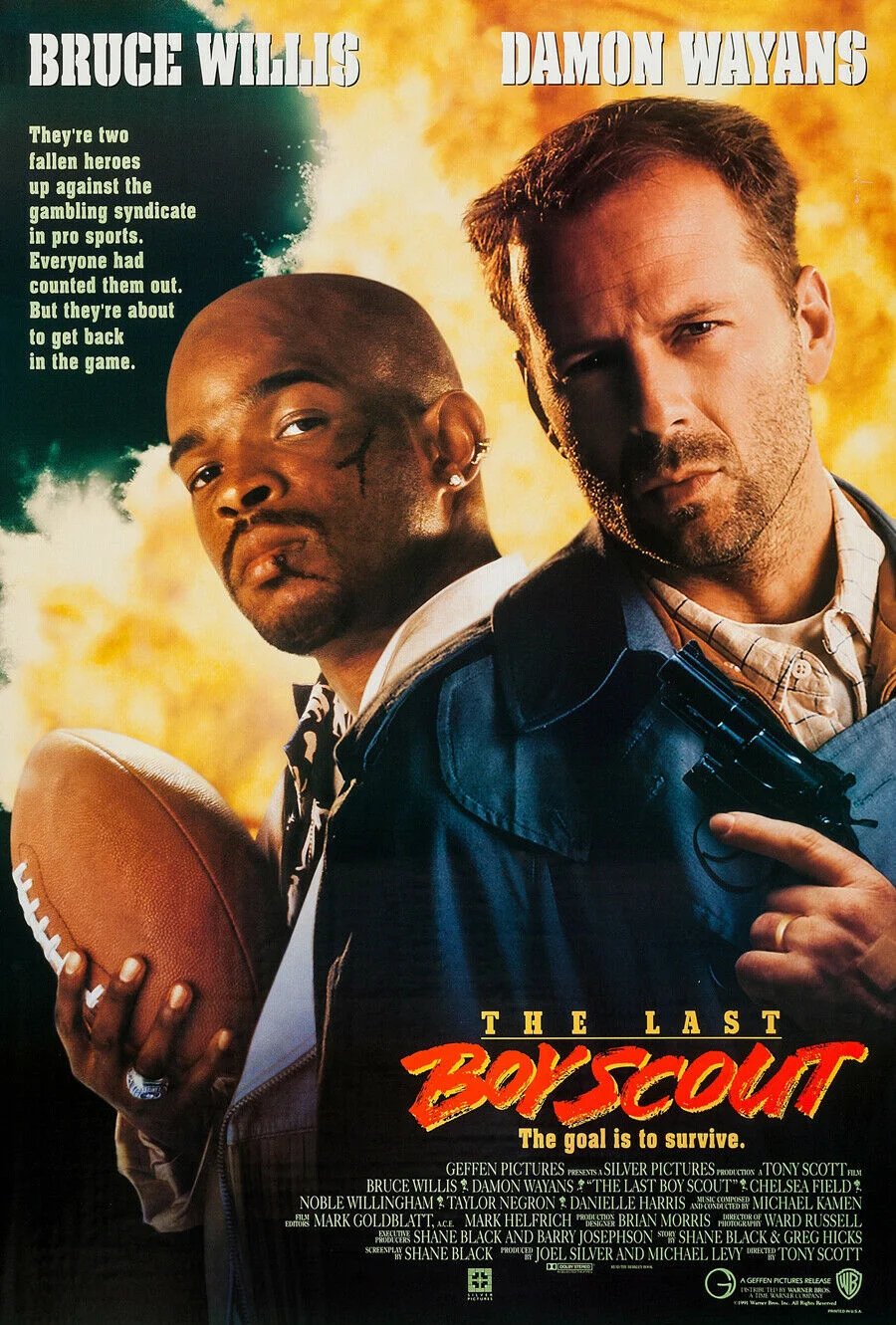
11/05:
The most memorable moment of The Last Boy Scout is when the football player pulled out his gun as he
ran for a touchdown and shot at the defenders before saying, "Ain't life a bitch?" and blowing his brains out.
That's Billy Blanks who founded the Tae Bo exercise program. Anyway, it's another poorly directed movie by
Tony Scott. Having great lines while sporting a terrible fake-looking hairpiece, Bruce Willis is perfect as
Joseph Hallenbeck. Damon Wayans is okay but is more of an ornament. The chemistry between these two doesn't
snap, pop, and crackle. Hence, they aren't funny enough. In fact, Bruce Willis and Damon Wayans hated each
other and didn't get along well on the set.
All in all, the writing is the best part of The Last Boy Scout, but there's not much of excitement.
3/20:
I have to hand it to Shane Black for penning a fine throwback neo-noir screenplay for
The Last Boy Scout.
Not all of the jokes work, but some do stick; the more Bruce Willis keeps throwing them, the better the film is.
I can feel the Dashiell Hammett/Raymond Chandler quality, but this time, it's crude and near the gutter.
The editing is good, and the story flows well. Memorable moments come from Billy Blanks, Kim Coates, Halle
Berry, and Taylor Negron to give the film an interesting edge. Both Bruce Willis and Damon Wayans have good
chemistry, but I'm surprised they couldn't pull off a sequel. The truth is that they didn't like working
together.
All in all, it's easy to appreciate The Last Boy Scout, especially from a writing standpoint in
terms of neo-noir.
The Last Castle (2001)
Rate:
2
Viewed:
8/25
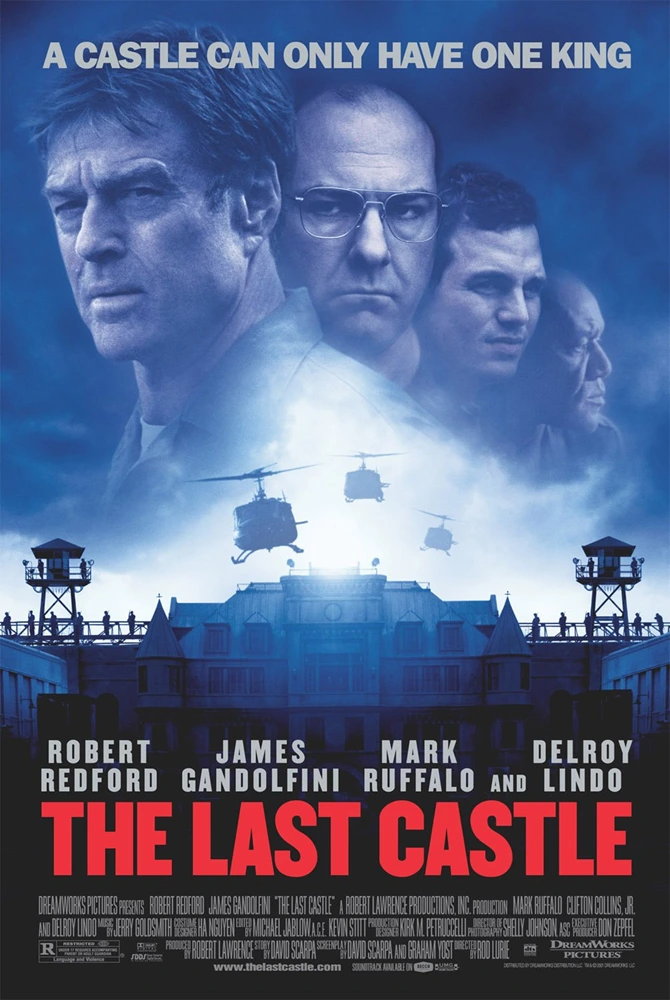
8/25:
For a very long time, I thought Havana was the most infamous film Robert
Redford ever did, and now, it's been replaced by The Last Castle.
The first half went well, putting me in a "let's see" mode, thanks to the high quality of the material despite
the several reminders of The Shawshank Redemption.
By the time the prison riot broke out, I was like, "Dude, you just lost me." The movie kept getting worse to
the end with no recovery whatsoever.
I have to say this: Colonel Ed Winter (James Gandolfini) was never in the wrong for one second. If the
military approves of what he's doing, then so be it. He's the warden, for goodness sake. If not, it can review
procedures and make adjustments in whatever, and Winter will just follow along. By the way, how did his
men not see the trebuchet being built in the yard as well as other weapons? If I were them, I would get rid of
all the rocks; they serve no purpose.
That means Eugene Irwin is the bad guy but gets away with it only because he's Robert Redford. I was never on
his side. In fact, I didn't know what the hell he was doing or what point he wanted to make. If there are
problems, he can always file a formal complaint. Given his former rank (a three-star general), he
has plenty of clout to make things happen, but I don't buy for a second somebody like him would be put in prison
like this. In any case, Winter should've isolated Irwin from the rest of the population, so his influence would
be virtually cut off.
As for the prisoners, why should I support them? What are they originally in for? I'm sure many are rapists,
murderers, and pedophiles. Didn't Irwin stop and think about that for a minute? For the less serious crimes, why
would some of the prisoners be okay in going along with the plan if they had no more than a few years remaining
in their sentences? Why would they follow Irwin if he previously had 18 men killed? Now, after the prison riot,
everybody can expect to receive an additional sentence of ten plus years. Death penalty won't be off the table
for some including Sam Yates who should've died in that spectacular helicopter crash.
Back in the 70's, Robert Redford did an extremely bad movie called
Little Fauss and Big Halsy, and he was constantly shirtless. I
thought it would be the last time he would do something foolish like that. When he took off his shirt after
moving back and forth to carry the rocks, it became the most cringeworthy movie moment of his entire career,
and he was 65 years old.
All in all, Brubaker works while The Last Castle is "what was
everybody thinking?"
Last Dance (1996)
Rate:
4
Viewed:
7/04, 7/25

7/25:
Remember when Sharon Stone went serious after being Oscar-nominated for Casino?
Well, it backfired...big time. Two films of hers released in 1996 were
Diabolique and Last Dance. Both lost millions and
millions of dollars at the box office. That forced her to do nothing for the next two years. When she came back,
her career kept getting worse and worse, leading to the permanent loss of her A-list status.
It wouldn't have mattered if Dead Man Walking didn't
come out the year before. Last Dance has serious issues of its own, and gender has nothing to do with it.
Then, it suffers greatly in comparison with the other film. I just can't believe how identical both are scene
for scene. As a matter of fact, they were being filmed at the same time.
One, there's no emotional core. As a result, I didn't feel anything for the woman on death row named Cindy
Liggett. Two, Sharon Stone, actually a supporting actress here, gives a performance that's semi-weak and
semi-pathetic. I find it easy to laugh at her as a tough wannabe who fails to match up with the evilness of
Sean Penn's character.
Three, Rob Morrow, as Rick Hayes, is occasionally phony and inappropriate when he should've been 100%
professional. It feels like he was falling in love with Cindy, and that's the very first case he started working
on? Worse, Rick still doesn't know what he's getting into, and Cindy isn't somebody to deal with or to pity on.
No matter how hard he wants to get people on the side of his client, he's never convinced me once that this is
somebody worth caring about.
Watching how the death sentence was carried out and thinking back to
Dead Man Walking, I found everything to be done improperly. For example,
the condemned female prisoner is allowed to have men in her cell, and they stay there all day when staying behind
the bars makes more sense. Then, she walks to the gurney unshackled that's seemingly next door in the manner of
"Oh, all right...take me away. Whatever." In other words, everything is so laxly done that unexpected problems
can arise.
If there are positives, the legal stuff is interesting to watch. It's what I paid attention to the most. Then,
there's the pretty good performance given by Randy Quaid. As a matter of fact, if he played Rick, I think it
would've made for a more credible picture. Anyway, Randy Quaid is certainly a tall guy, standing at 6'5".
Jack Thompson and Peter Gallagher help out and thus do well.
All in all, Last Dance was DOA in 1996, having been completely overshadowed by
Dead Man Walking.
The Last Days of Disco (1998)
Rate:
1
Viewed:
2/10
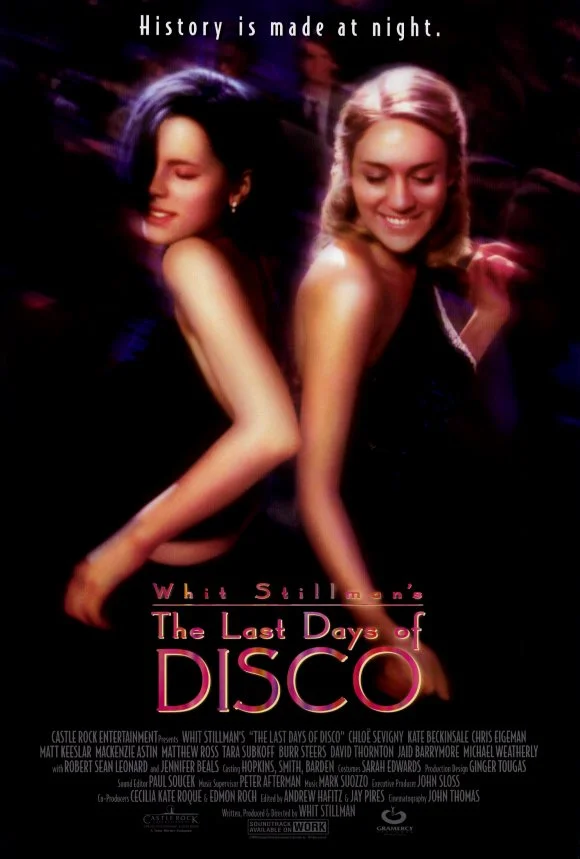
2/10:
The Last Days of Disco came out during the same year as
54, and I prefered the latter because the cast consisted
of well-known names whereas the former had a bunch of nobodies.
So, I didn't see the film again until now because Criterion had decided to make it part of the collection. Afterwards, I was
left with "WHY?" Failing to achieve the look that's remotely close to the early 80's, The Last Days of Disco is
pretentious. It has no plot, looks like a bad rip-off of St. Elmo's Fire, and contains lines that sound
artificial, turning the characters into pseudo-intellectuals.
None of the characters is likable, and I've had a hard time believing the club, especially the atmosphere, is labeled
as the greatest in the world. If that's so, why does it admit drab-looking characters with pale skin? Chloë Sevigny is the
only one of the cast who passes the eye test to be let in the club. But she has to put in the extra work to woo Robert Sean
Leonard's character? Oh, please. The most despicable character is played by Kate Beckinsale. And the point of her is
uh...? I thought one of the actors was Sean Astin, but it turns out to be his brother Mackenzie.
All in all, The Last Days of Disco, a box-office failure in 1998, is a colossal waste of time.
The Last Days of Patton (1986)
Rate:
7
Viewed:
1/15, 4/22
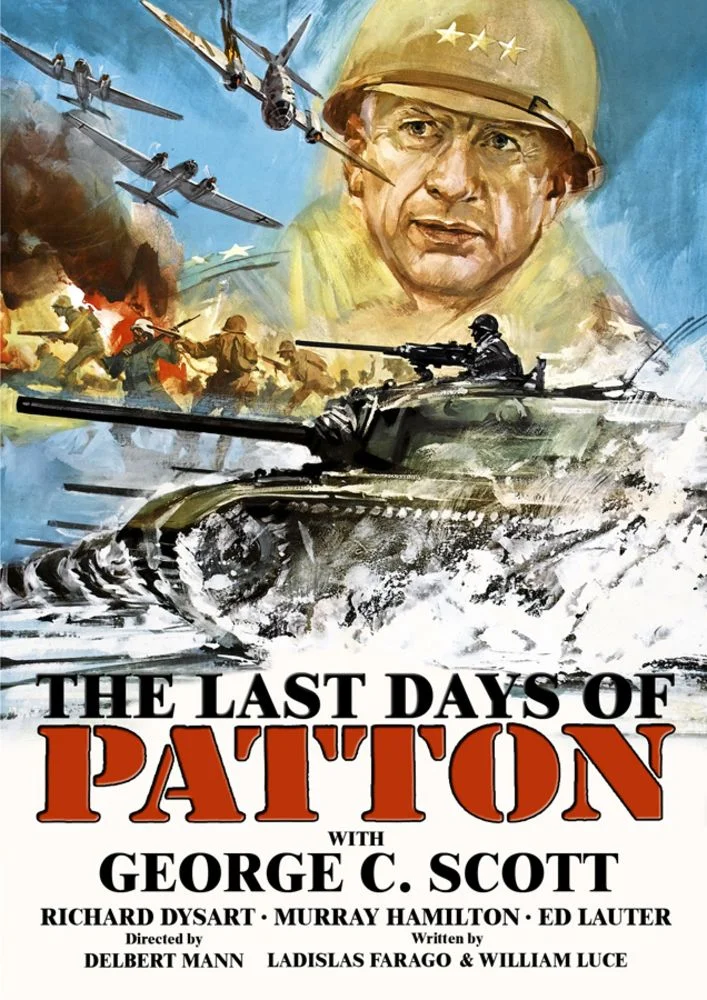
1/15:
I saw Patton and liked it very much, thanks to George C. Scott's Oscar-winning performance.
Naturally, I was all for seeing The Last Days of Patton. Once again, he's flawless, and Eva Marie Saint
is remarkable as Patton's wife. The rest of the cast is passable. Although the telefilm is 146 minutes long, it feels like
four hours. Because my interest couldn't be sustained through many unnecessary scenes, I took some breaks.
It's hard to see the relevance of flashbacks to Patton's youth. Perhaps if there are more of them and less of going through
the mundane affairs, I'll have a better understanding as to kind of person he was. The final days for Patton look
tough which is a sad way to go out. He died on December 21, 1945, just four months after the end of WWII, as a result of
injuries that came from the freak automobile accident twelve days earlier.
All in all, The Last Days of Patton is an interesting history lesson that's worth watching for all fans of General
George S. Patton.
4/22:
George C. Scott reprises the most famous role of his career for the sequel: The Last Days of Patton.
Sixteen years may have passed, but he's still in top form. The cast isn't bad as it includes Eva Marie Scott, Murray Hamilton
in his final acting role (who also worked with George C. Scott in Anatomy of a Murder),
and Ed Lauter. Because of them, the film is watchable but is ultimately sad in the final hour.
The events portrayed may seem like weeks, going from the automobile accident to Patton's death, but in reality, it was only
twelve days. Seat belts for vehicles weren't in vogue at the time. When Patton passed away, many in the army and in Washington,
D.C., probably felt relieved because he was a ticking bomb ready to go off, enough to cause national embarrassment, and talked
about invading Russia. Therefore, there's a strong indication that he was mentally ill as a result of many brain injuries during
horse accidents and military battles, among others. Jean Gordon, Patton's niece, may be shown in the film, but there are
rumors that they were romantically involved for a long time. She killed herself eighteen days after his death.
All in all, if you're a fan of Patton and want to see more, you should continue with
The Last Days of Patton.
The Last Detail (1973)
Rate:
9
Viewed:
11/14, 8/21

11/14:
Two years after directing the über cult classic Harold and Maude, Hal Ashby worked on
The Last Detail which is probably one of the most unusual road pictures made.
It focuses on three Navy servicemen, played by Jack Nicholson, Otis Young (who sports an uncanny resemblance to O.J. Simpson),
and Randy Quaid, with the first two being guards of the latter who's a prisoner en route from Norfolk, Virginia, to
Portsmouth Naval Prison.
On the way, Jack's Buddusky, aka Badass, has ideas of his own and wants to make it specially memorable for the prisoner in a
coming-of-age way. It's odd because why do the two men care about him? Well, dammit...Badass has feelings and wants to prove
he's a human being, not a robot.
I got into it fully the moment the three made their stop in Washington, D.C., and it's when the film started becoming goldmine,
thanks to Jack Nicholson's antics. As a result, he scored a deserving Academy Award nomination with another picked up by
Randy Quaid. Robert Towne penned the screenplay and subsequently got a nomination which was the year before he did the
Oscar-winning screenplay for Chinatown.
All in all, The Last Detail is an all-time military classic.
8/21:
It's badass time for Jack Nicholson who makes something out of nothing during a memorable trip from Norfolk, Virginia, to
Kittery, Maine, for The Last Detail.
As a result, he was rewarded with an Oscar nomination, the third of his career. The profanity-laced writing was so good that
another went to Robert Towne. They paired up again for Chinatown, their best and most creative work in
collaboration with Roman Polanski. Randy Quaid is unforgettable as the pathetic loser seaman, receiving the only Oscar
nomination of his career.
Hijinks happen along the way because Badass can't stand being bored and must do something to enliven things. Some of the best
scenes include the confrontation with the bartender for refusing his underage prisoner a drink, the three's observance of a
chanting session, and the finale which sums up how depressing the naval life can be.
All in all, it takes an extraordinary actor to pull off what Jack Nicholson did in The Last Detail which is a fine Hal
Ashby picture.
The Last Emperor (1987)
Rate:
9
Viewed:
3/05, 1/06, 6/10
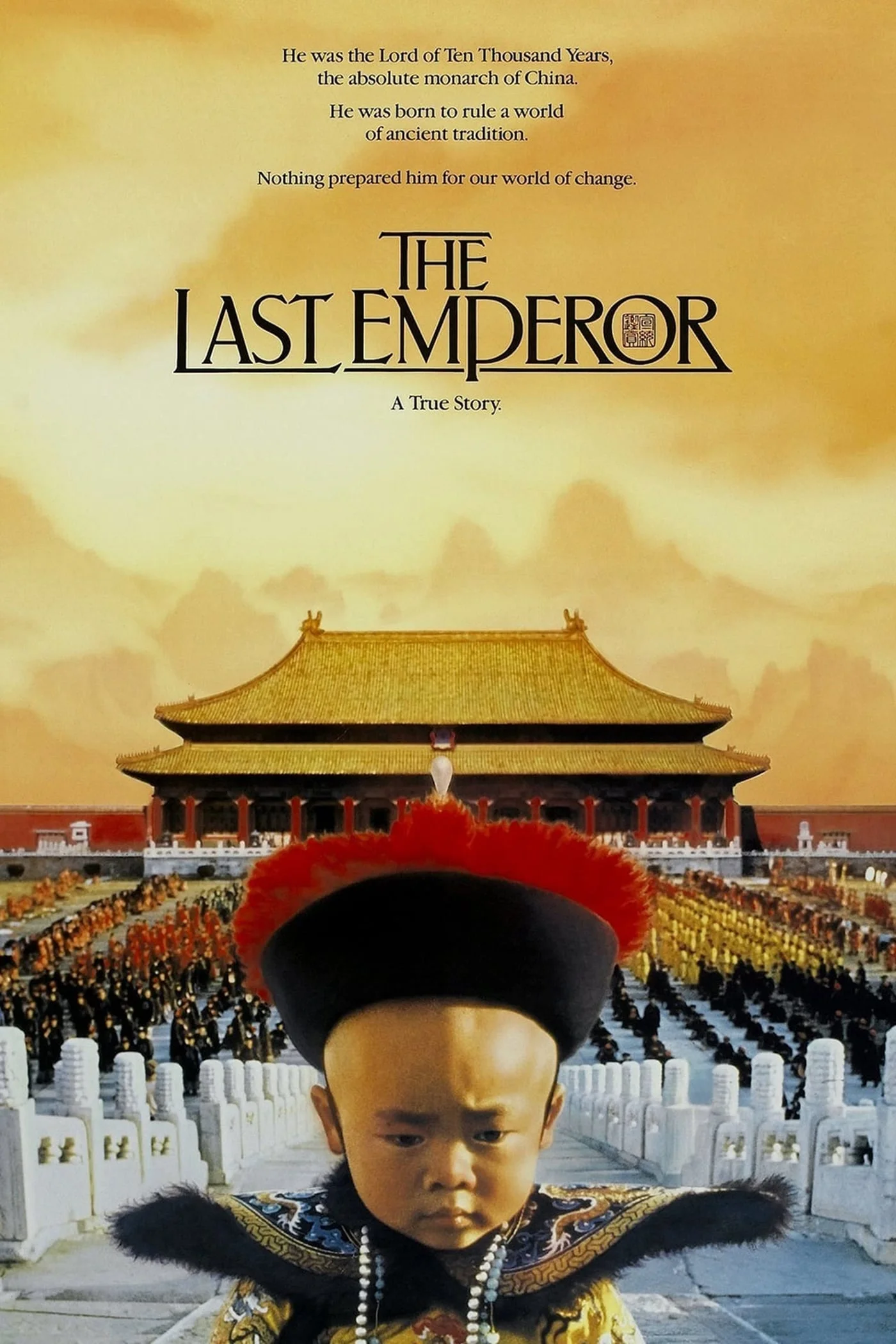
1/06:
The cinematography of The Last Emperor is outstanding, making it a resplendent film.
The tale of Puyi is powerful: how the last emperor of China was crowned at the age of two years and ten months at an
unfortunate timing only to become a common peasant a half-century later. I honestly don't feel sorry for him.
The opening title sequence is brilliant, and I love it. As for the cinematography, it was handled by Vittorio Storaro who won
his third Oscar with the first two being
Apocalypse Now and Reds. He deserved it. John Lone is incredible in the
role of Puyi. I wonder why he didn't have a longer career in Hollywood. It's too bad.
All in all, The Last Emperor, the Best Picture winner of 1988 that swept all nine categories for Oscars, is a monumental
achievement by Bernardo Bertolucci.
6/10:
Well, that was a good film, but I'm giving The Last Emperor a rating of '9' which is a point downgrade.
The main reason is that I simply didn't care about Puyi. He was a useless, selfish person who's not worth caring about for
almost four hours. Yet the idea of a man go from an emperor to a commoner is impressive, and that's why I
like The Last Emperor a lot. My biggest gripe is the lack of details because I want to learn more about Puyi.
John Lone gives a nice, decent performance. I wonder why he wasn't given more work for years. Is it just me,
or is it true every time that I see a film with an Asian cast, it must always contain Victor "There's Something Wrong with
My Eye" Wong? Peter O'Toole was nominated for an Oscar, but pray tell me, what's special about his performance? I like him,
but he's overrated here. Instead, it should've gone to John Lone.
Among the best parts is the Oscar-winning cinematography, especially when it comes to the inside the Forbidden City. Over
19,000 extras were used. My favorite is the opening title sequence. I know this sounds silly, but it's such a
powerful start for an epic. There are a couple of inaccuracies. One, for instance, shows Puyi engaging in a ménage à trois
when he was in fact a homosexual. Another is Amakasu committing suicide by a gunshot to the head when he actually
swallowed a cyanide pill.
All in all, The Last Emperor needs to provide more details.
Last Exit to Brooklyn (1989)
Rate:
1
Viewed:
5/12
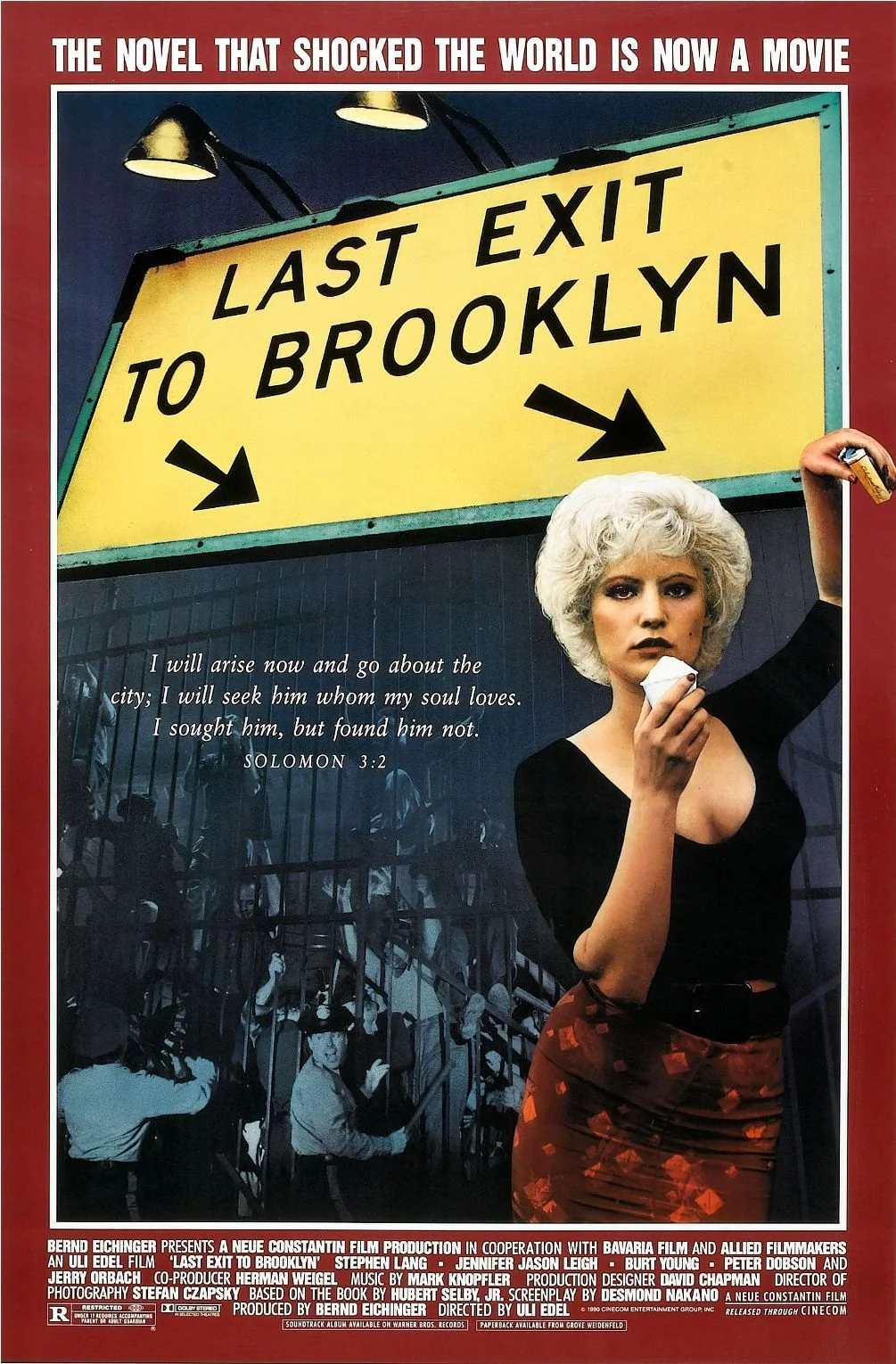
5/12:
Tralala yells to everybody within earshot that she has the "best tits in the western world!"
It's a scene from Last Exit to Brooklyn. What a terrible film. All of the characters are so unlikeable
that I've quickly lost interest. Whatever the crap they were doing, I wanted none of it and couldn't wait
for the show to end. Where was police the entire time? It's unrealistic.
Even more so is how the characters tried to imitate the era through their clothes, mannerisms, and attitudes.
They've been fake. Every time I see Stephen Baldwin's face, I just want his brother, Alec, to beat the hell
out of him with his set of brass balls from Glengarry Glen Ross.
All in all, Last Exit to Brooklyn is a disjointed mess.
The Last Full Measure (2019)
Rate:
8
Viewed:
3/21

3/21:
In the spirit of Courage Under Fire, The Last Full Measure is
a true story of making a Medal of Honor case for a soldier who was killed in action while saving numerous men.
At the beginning, I thought of turning off the film due to horrible editing. Changing my mind, I decided to stick
with it a bit more, and then things got better afterwards. It's hard to say which worked more: the story or
the acting. Perhaps, it's been a combination of both.
On the surface, the cast looks unbelievably all-star including a couple of long esteemed actors who'll pass away
within two years, but it's Sebastian Stan who deserves the most credit for making the movie work by piecing
together a puzzle of what happened.
Yes, Sebastian Stan looks robotic for a long time, but the most powerful scene is his character was at where
the incident happened in Vietnam. That's when he started to rearrange his thoughts by recognizing the gravity of
the whole thing while everybody else had already been personally affected by it for a long time.
Pretty much, the movie is about righting a wrong for William H. Pitsenbarger, an Air Force Pararescueman. He took
part in almost 300 rescue missions during the Vietnam War, and one day, on April 11, 1966, he saved over sixty
men under enemy fire before being killed. At first, he was awarded the Air Force Cross when it should've been
the Medal of Honor due to weak documentation. It took thirty-five years for the award to be finally upgraded.
All in all, for what it had been two decades in the making, The Last Full Measure may have failed at the
box office ($3.4 million versus a budget of $20 million), but it's absolutely worth watching.
The Last House on the Left (1972)
Rate:
3
Viewed:
10/07
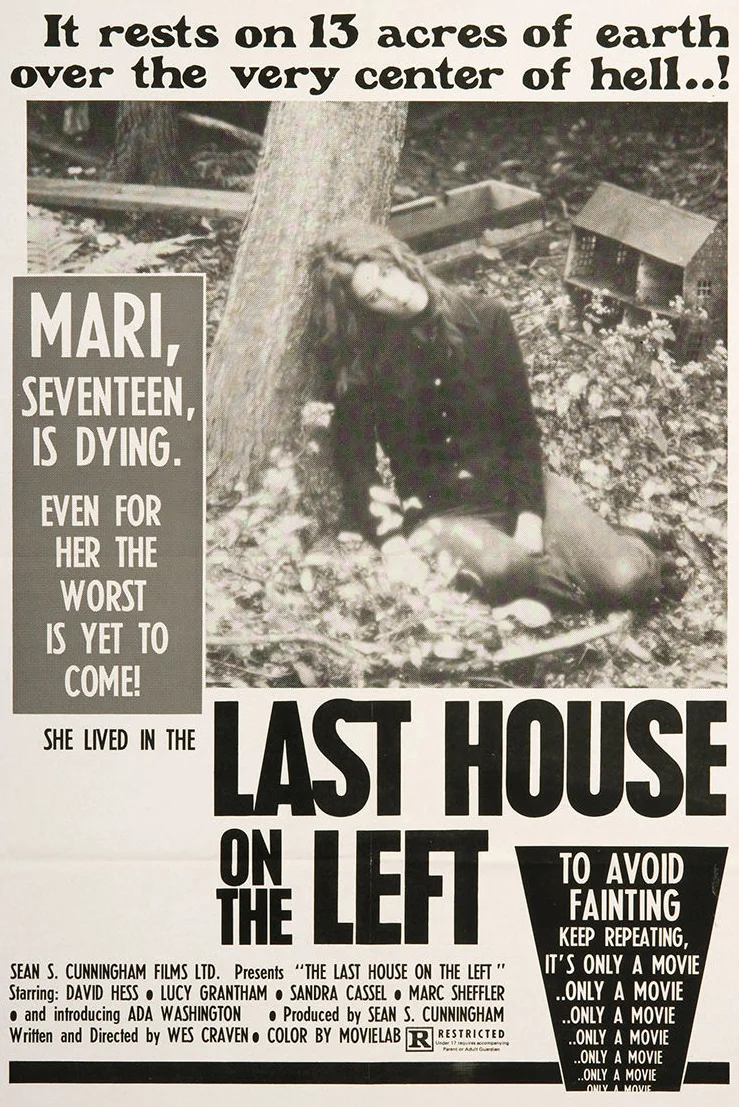
10/07:
Wes Craven is the Master of Suck.
The premise of The Last House on the Left is as idiotic as it gets. The director basically thinks that rape is a cool
and fascinating subject. I guess he never thought about what it's like being a victim. According to Wikipedia:
"The film split opinion with critics, unsure whether the film is a bold artistic statement or exploitative trash, or some
combination of the two. Audiences, however, flocked to see the film and, along with films such as
The Texas Chain Saw Massacre, it is credited with bringing a new sense of realistic violence to the modern horror film
genre."
Ah, yes. No wonder why there are idiots everywhere. Why is it so important to create films like
The Last House on the Left while leaving rape victims to feel everlastingly awful? Anyway, the title has me thinking:
"Why is it called so?" If I'm on the right side of the street, then sure. But on the left? No.
All in all, I wish that Wes Craven never existed.
Last Man Standing (1996)
Rate:
4
Viewed:
3/04, 6/24
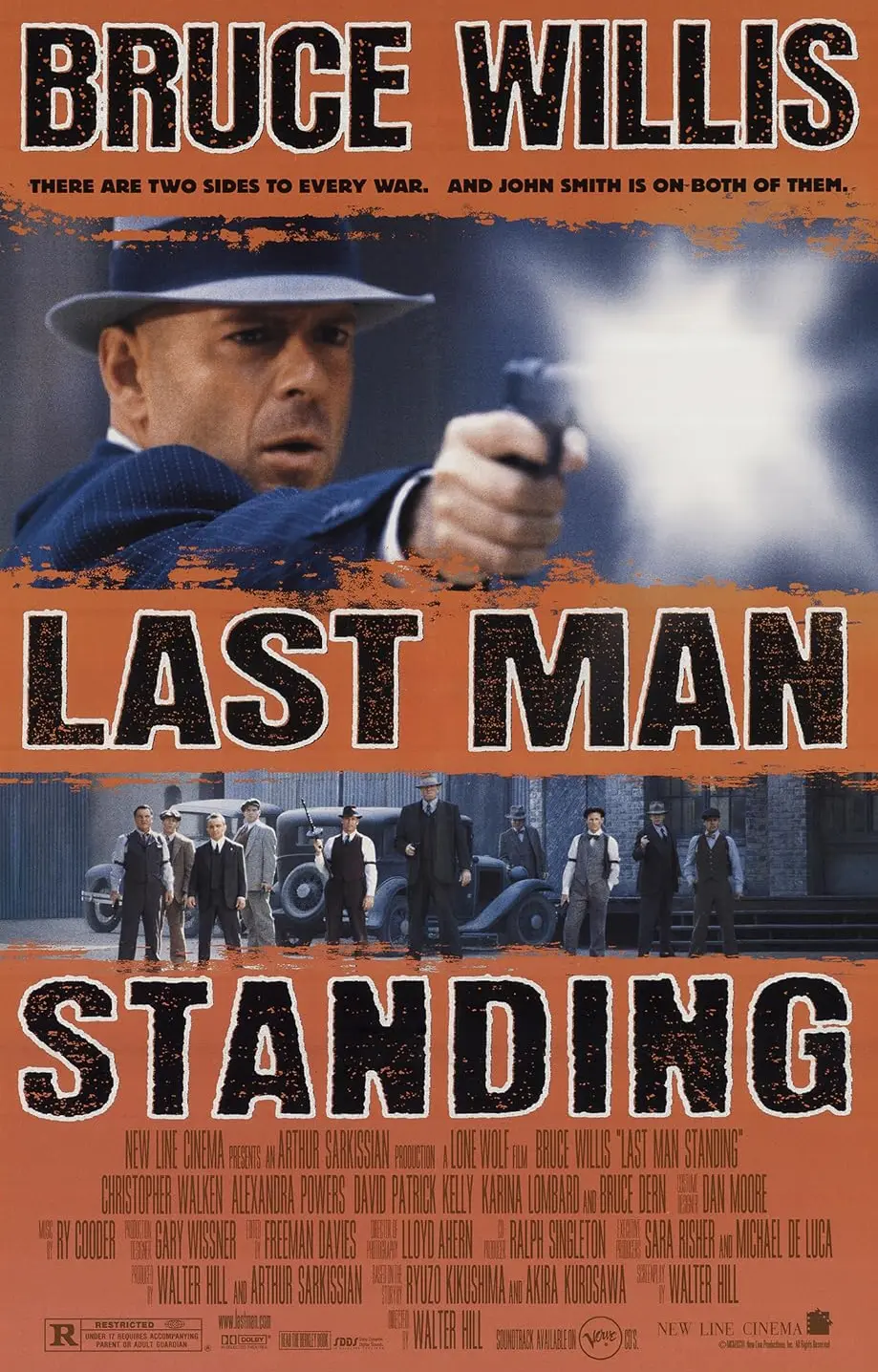
6/24:
A combination of Unforgiven and
Bad Day at Black Rock, Last Man Standing is overdone.
It takes place in the middle of nowhere in West Texas during the Prohibition era, and there's no law enforcement to be
found. This lets Bruce Willis' character off the hook, so he can kill ten guys all by himself in a few seconds without
reloading his guns. If that's not excessive enough, then there's the voice-over narration. Please, just shut up...I don't want
to be further overcome by the pretentiousness.
The cast is okay, but the Italians are annoying. Bruce Willis seems to be in his element, but he has stupid moments, especially
when he's beat to a pulp but manages to be functional afterwards. Yet won't it make sense to kill him instead of abandoning
him in the room? On the other hand, whenever Christopher Walken appears, he steals the show effortlessly while loving
his Tommy gun a lot.
All in all, long, ridiculous, and violent, Last Man Standing is full of Walter Hill crap.
The Last of Sheila (1973)
Rate:
5
Viewed:
6/11
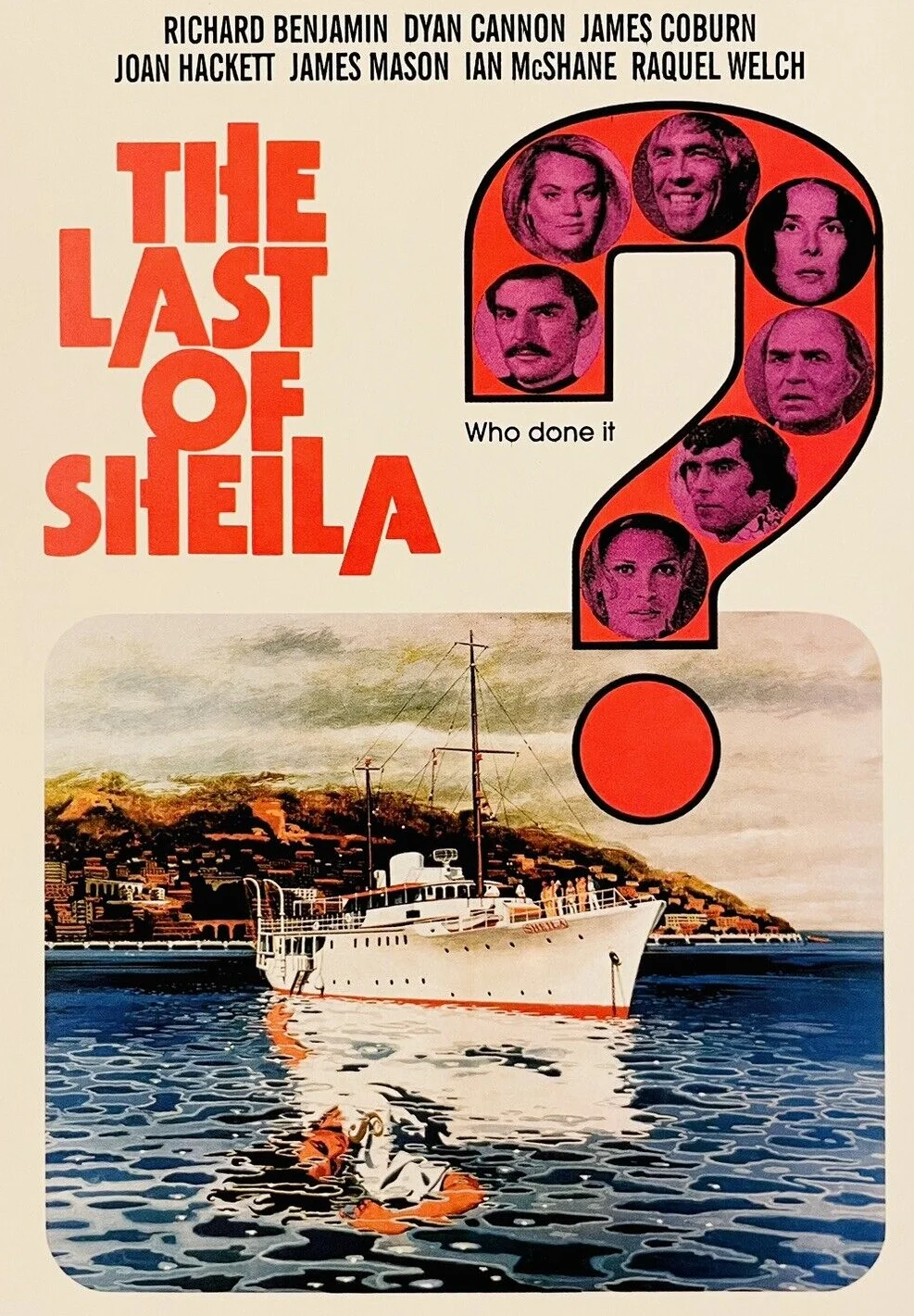
6/11:
I hate movies like The Last of Sheila.
The premise was so good that it got bungled toward the end. I hated the direction. At the beginning, I was thinking of a
possible rip-off of And Then There Were None, but it turned out not to be so.
Then, looking at James Coburn who's all teeth and nothing else, I thought it was a going to be a great mystery murder game.
This speculation ended rather quickly when his character got killed. Thereafter, the sight of James
Coburn's dead transsexual face was the most chilling image of the film.
For a good reason, I kept feeling that it was all fake and that James Coburn would magically appear at some point later. Then,
I saw Dyan Cannon's "Oscar" clip of getting drunk and stupidly laughing on her way back. It's probably the beginning of the
end since who in his or her right mind would be along that side of the boat, especially near the propeller area?
During the second half, there was an emergence of two ordinary filmmakers who had suddenly become world-class detectives.
Either they were trying to manipulate me or knew what happened because they...did it. Unshockingly, the latter proved to be true.
That's when The Last of Sheila started to fall apart as it tried too hard to be intelligent. I wonder how the ship was
able to operate without a crew. If there are in fact crew members, then why is none of them suspected of murder?
Anyway, I'm disappointed that nobody played any of the board games in the "Parkers Brothers" room. Dyan Cannon's line
"My mouth is so dry they can shoot Lawrence of Arabia in it" is clever. The same goes for James Mason's character
when he was labeled as the "Little Child Molester" given that he did play one in Lolita.
All in all, The Last of Sheila isn't worth it.
Last of the Dogmen (1995)
Rate:
8
Viewed:
12/02, 3/24
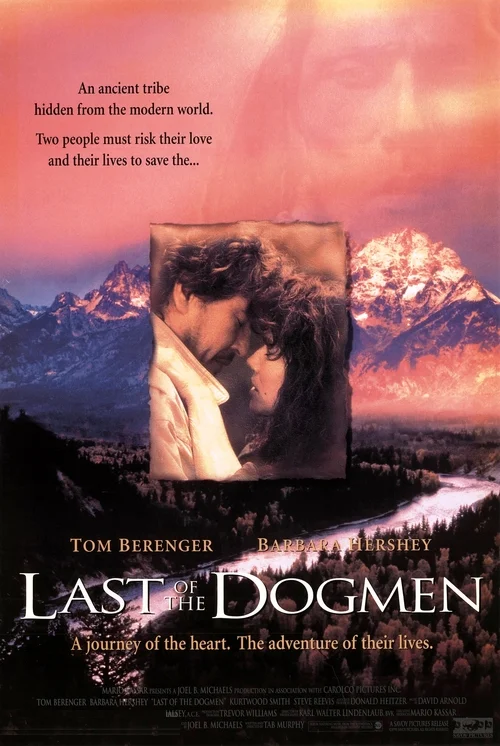
3/24:
One of the better movies in Tom Berenger's oeuvre is Last of the Dogmen.
It has a good story with fantastic cinematography of Montana which was unfortunately shot on location in
Alberta and British Columbia, Canada, and Mexico. This time, it's not inundated with American Indian clichés.
In other words, they just get on with the show like
The Last of the Mohicans. The only aspect I'll like to see
rid of is the voice-over narration. It's superfluous and unnecessary.
Tom Berenger is excellent and gets to wear nice clothes for outdoors. He's credible all the way through. Barbara
Hershey is a surprise treat by working well with him and the American Indians as a translator in the middle.
One question has to be answered: is it possible for a band of people to disappear and thrive on its own in
the United States? I have to say no. A dead giveaway is the smoke coming from the fire. A helicopter can
fly over the region, and the pilot will be like, "Hey. What's that? Let's check it out." The other issue is
the murder of white people throughout the years. I don't think the law enforcement will take kindly to that.
All in all, Last of the Dogmen is a small gem.
The Last of the Mohicans (1992)
Rate:
10
Viewed:
9/04, 3/05, 4/05, 7/07, 7/11, 2/17, 4/19, 6/21

4/05:
I consider The Last of the Mohicans to be one of the all-time great films.
When I saw the picture at a theatre in 1992, it was just brilliant, and I hadn't seen anything like it before or since then.
Hence, Michael Mann is one of the best directors in the history of motion pictures. All he does is make visual masterpieces.
The Last of the Mohicans should've received a boatload of Oscar nominations including Best Picture, Best Actor, Best
Supporting Actor (at least two), Best Supporting Actress, Best Director, Best Cinematography, Best Costume Design, Best
Adapted Screenplay, and Best Film Editing.
It's impossible to deny how good Daniel Day-Lewis, Madeline Stowe, Wes Studi, Russell Means, Steven Waddington, Maurice Roëves,
Patrice Chéreau, and Eric Schweig are. As Magua, Wes Studi turns in the best performance of 1992, and it's not even close. If
anyone remembers The Last of the Mohicans, it's both him and Daniel Day-Lewis.
Additionally, Wes Studi spoke three different languages: French, Cherokee, and English. During the scene on the cliff, he
twisted his knee, tearing a cartilage which forced him to have an orthoscopic surgery before returning to the set a week
later. That's why he's seen wearing a brace, or rather a legging, over it. Some of my favorite lines of the film are:
"Well, we kind of face to the north, and real sudden-like, turn left."
"l, Chingachgook, the last of the Mohicans."
"It is more deeply stirring to my blood than any imagining could possibly have been."
"I do not call myself subject to much at all."
"In case your aim's any better than your judgment."
"I ain't your scout. And we sure ain't no damn militia."
In response to "What are you looking at, sir?," "I'm looking at you, miss."
"Yes, and, 'do not try to make them understand you. That is because they are a breed apart and make no sense.'"
"Magua's heart is twisted."
"We're sorry to kill you, brother. We do honor to your courage and speed, your strength."
In Huron, "Magua understands that the white man is a dog to his women. When they are tired, he puts down his tomahawk to feed
their laziness."
"Magua said, 'Understand English very well.'"
"Some day, I think, you and I will have a serious disagreement."
"A breed apart, we make no sense?"
"When the Grey Hair is dead, Magua will eat his heart. Before he dies, Magua will put his children under the knife, so the
Grey Hair will know his seed is wiped out forever."
By the way, the DVD version of The Last of the Mohicans is an eek. Because certain lines and shots are cut out and new
ones have been added along with unnecessary shots, the spirit isn't the same as the theatrical version. The battle scenes
are long and boring. That's why I still have the VHS copy (in fact, two).
All in all, there's nothing like The Last of the Mohicans.
7/07:
I've said it before and I'll say it again: The Last of the Mohicans is a unique masterpiece.
Wes Studi was snubbed big time for the Best Supporting Actor Oscar nomination. If not for him, I don't think
The Last of the Mohicans would've been half of the film as it is. Daniel Day-Lewis is at his sexiest, who's
complemented well by Madeleine Stowe. They have some of the best romantic scenes in any film. Initially unremarkable,
she comes alive during the first night with Daniel Day-Lewis.
All in all, The Last of the Mohicans might be the best picture Michael Mann has ever directed.
7/11:
Wes Studi was clearly robbed of the Oscar for Best Supporting Actor.
All in all, The Last of the Mohicans is a masterpiece.
2/17:
It's still a great film.
4/19:
Comparing the DVD version with the VHS copy of The Last of the Mohicans, the differences are now becoming tolerable.
However, I don't understand why Michael Mann chose to keep "I cannot be an invalid schoolgirl," which is so random, while
taking out "Someday, I think you and I are going to have a serious disagreement" and several exchanges between Cora and Hawkeye
during the first night.
Although The Last of the Mohicans is the best Daniel Day-Lewis movie, the best Michael Mann movie, the best American
Indian movie, and the best Colonial movie, nothing is more impressive than Wes Studi's performance as Magua. It's simply so
good that he was sadly robbed of an Oscar.
All in all, as I hear there's a third version out in Blu-ray, Michael Mann needs to stop fucking with
The Last of the Mohicans and just release the original theatrical version in DVD.
6/21: The Last of the Mohicans is still a thrilling motion picture.
The Last Outlaw (1993)
Rate:
3
Viewed:
8/20

8/20:
Saddled with a cliché-riddled script and terrible acting, The Last Outlaw is straight-to-cable Western
garbage.
It's difficult to watch for more than twenty minutes. The plot has nothing new to say, and I've seen better films
like The Wild Bunch and
Butch Cassidy and the Sundance Kid. Mostly, what this
one has going for itself is a bunch of low-IQ guys killing each other.
Are the filmmakers telling me that a gang of die-hard Confederates okayed the idea of having a black cowboy on
board? Uh-uh, I don't think so. That's why the KKK came into prominence. I can't help but notice how pearly white
some of the characters' teeth are. So, Colgate toothpaste was aplenty at the time? On the other hand, the guys
brush off their gunshot wounds as if they got nicked while shaving.
Mickey Rourke plays a character who looks like he just had plastic surgery. Hey, wait a minute...it's exactly
what the actor did. Because of his heavy makeup, thin eyebrows and mustache, eyeliner but with no eyelashes,
and headband, Mickey Rourke can proceed to jam alongside Bret Michaels during Poison concerts.
All in all, The Last Outlaw is about people being picked off one by one, and I'm among them.
The Last Picture Show (1971)
Rate:
10
Viewed:
5/08, 6/15, 12/19

5/08:
The Last Picture Show is a haunting picture about growing up in a small Texas town that's devoid of rich culture and
is at the verge of disappearing forever.
It's also everything that The Graduate is not. Timothy Bottoms, Cybill Shepherd (in her feature film debut), Ben
Johnson, Cloris Leachman, Jeff Bridges, Ellen Burstyn, and Eileen Brennan are all outstanding. The first two, they did
it for me. Randy Quaid also makes his motion picture debut.
All in all, The Last Picture Show is powerful.
6/15:
The Last Picture Show is one of those timeless classics that gets better every time I see it.
Although Ben Johnson and Cloris Leachman are both great in their own way, I never thought they deserved Oscars. Instead,
it's Timothy Bottoms and Cybill Shepherd who steal the show by playing complex characters, and they're fascinating to watch.
Jeff Bridges is excellent whenever he shows up and lends a supporting hand. That's why his career lasted so long in Hollywood.
Ellen Burstyn and Eileen Brennan step up to the plate and make a lasting impression. My favorite aspect is Robert Surtees'
cinematography as the introduction and the ending define what the film is about.
All in all, Peter Bogdanovich should be proud of The Last Picture Show which is a bleak, haunting picture
about transition to the adult world from high school in a Texas small town that's devoid of rich culture.
11/19:
Brilliant and haunting, The Last Picture Show is a timeless motion picture about individuals growing up in a dying
Texas town.
The most lasting impression is Robert Surtees' black-and-white photography. Then, there's the ensemble: old-timers
and newcomers who'll be famous. Two Oscar winners are Cloris Leachman and Ben Johnson while the six others are
Jeff Bridges, Timothy Bottoms, Ellen Burstyn, Eileen Brennan, Cybill Shepherd, and Randy Quaid.
Let's be clear: The Last Picture Show is not Jeff Bridges' but Timothy Bottoms' picture; therefore, he should've
been Oscar-nominated. The latter is the one who made the film work from the story's perspective. However, all the
credit goes to Peter Bogdanovich.
All in all, I can watch The Last Picture Show over and over but will never get over how good it is.
Last Rites (1988)
Rate:
6
Viewed:
12/16
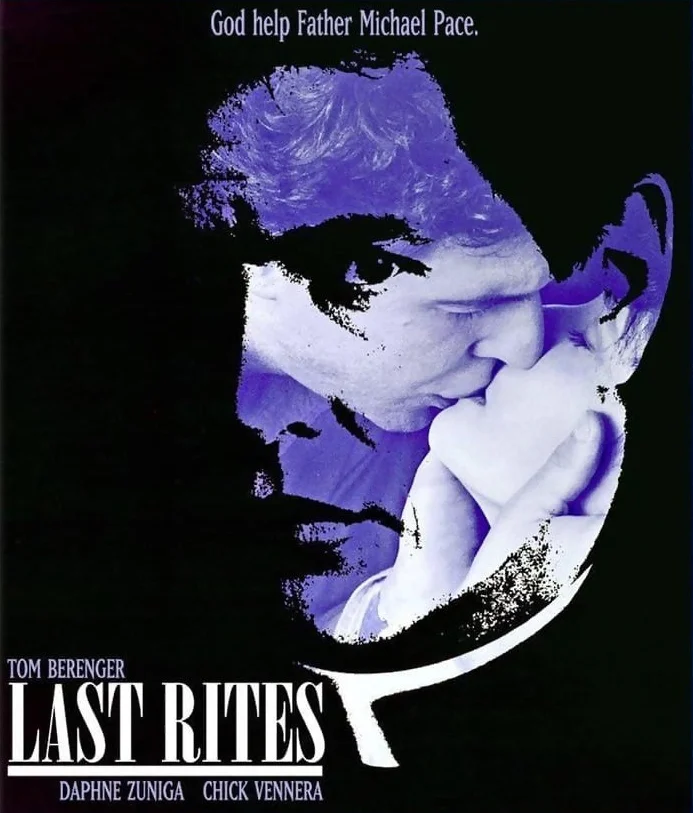
12/16:
If Daphne Zuniga looks familiar to you, it's because she played Princess Vespa in
Spaceballs.
Anyway, a lot of people didn't like Last Rites, which was a massive box-office failure in 1988, but I've enjoyed it.
The neo-noir thriller has style and plenty of substance.
Any time Tom Berenger stars in a film, it's bound to be entertaining. He's always been a good, handsome actor and can
make a mediocre picture better with his presence. That's the case with Last Rites which is Donald Bellisario's
only cinematic film (he's famous for the creation of outstanding TV shows such as Magnum, P.I., Airwolf, and
Quantum Leap).
The story is fun, but it has a lot of logic problems. Tom Berenger's character, Michael, sure doesn't act like a priest,
and he breaks many fundamental rules while on the job. I like it when he wears an expensive-looking tan cashmere jacket
with a white scarf. It's certainly fancy for a priest. Why did he and Angela go to Mexico? What was the purpose over there?
Why couldn't they resolve their problems in New York City? Regardless, there are many good-looking scenes in Mexico.
The ambush scene is ridiculous. So, this guy who "spray-paints" the windows in a perfect line with his Uzi yet misses
Tom Berenger? I'm sure I saw a couple of bullets striking the priest in the abdomen, but he miraculously survives.
While at that, the priest runs after him with a cigarette still in his right hand. It's a strange moment, indeed.
Why didn't Zena finish the job at the beginning? Whenever she uses the silencer to assassinate people, gunshots
can be heard. Are they sure the priest and Zena are brother and sister? There's a moment that implies they slept
together. Did something happen between them that caused Michael to become a priest at age 15 out of shame? When Angela
began to tell the priest what's happening, why did he wait so long before pressing her for more answers? At least, the
ending, which is hard to believe, is a pleasant surprise and puts the film into perspective.
All in all, don't believe the critics when they called Last Rites the worst film of 1988; it's actually a decent
murder mystery thriller with some logic flaws.
The Last Samurai (2003)
Rate:
5
Viewed:
5/04, 4/06

4/06:
The first time I saw The Last Samurai, I was awed.
Having watched it again recently, I'm left bored. It's strange how films can fail to stand the test of time so quickly. Clocking
at 154 minutes, The Last Samurai is too long. At least an half hour should've been cut out. When I thought
things would get better, it never did.
The cinematography of Japan is beautiful. It was handled by John Toll who won the Best Cinematography Oscar for
Legends of the Fall and Braveheart. Unfortunately, there's not much of a plot. Tom Cruise gives a lifeless
performance. Somehow, it has become a contest in terms of when he was going to shave off his beard. And Tom Cruise never did,
to my surprise.
All in all, The Last Samurai is a mediocre Japanese version of Braveheart.
The Last Seduction (1994)
Rate:
3
Viewed:
7/11

7/11:
The Last Seduction is a dumb, dumb, dumb movie.
I just knew it was going to be terrible within the first fifteen minutes. The film manages to pull out all possible
tricks in the book while trying to look good.
I hate that kind of manipulation Bridget was putting on Mike. I don't believe it for a bit. If teenagers were used instead,
then sure...the premise would be more acceptable. Then again,
Body Heat had already been made but with adults. Speaking
of low intelligence, there are many instances such as:
One, private detectives aren't that stupid to begin with. They tend to be former cops.
Two, no private detective is willing to eat or drink anything that's offered by the person he's assigned to follow.
Three, if there are blown tires, fine. Just get the name of the cab company and the taxi number. Hire another shadow to follow
her. Even a private detective will make a mistake or two on the job.
Four, no private detective is stupid to show his penis just to prove a point. I mean, what the hell for?
Five, if Mike had a traumatic episode with a transsexual, then fine. Go back to his roots and regain trust with whoever he's
familiar with. A good start is Stacy the good-looking tanned blonde.
Six, if Mike has friends, what happened to them during the rest of the film?
Seven, no respectable insurance company will allow anyone to work under an alias to avoid a social security check.
Seven, the lawyer disappeared?
Eight, if Clay knew where his wife was, why didn't he go to Beston and start trouble for her?
Nine, out of all words, Clay decide to focus on New York which is a clever way to find out Bridget's alias. If he's that
smart, then how come he's stupid?
Ten, if Wendy is going to make references to Double Indemnity, will that ruin the film?
Eleven, Mike, as a claim adjustor with a wealth of experience, would've been prepared for what was going to happen.
Twelve, having sex at the front of the bar entrance without being seen, yeah, it'll work...not.
To drive the point further as the final nail in the coffin, one reviewer said: "But Mike has really got her (Bridget) beat in
the lack-of-brains department. He first meets her in a bar, where she tries to blow him off. But he persists. Why? She's a
skinny, flat-chested, coarse-voiced shrew. A really good-looking guy like that could surely get a nicer, better-looking woman,
but he wants Bridget, for no obvious reason. When they do start their (purely physical) 'relationship,' he gets distressed
that she's so cold and distant. She's emotionally unavailable, but he keeps pursuing, for no other reason than furthering the
mundane plot. He should have gotten out when he had the chance; when the finale arrives, we're not sure whether we pity him
or whether we're annoyed by him."
All in all, Body Heat is the preferred choice over The Last Seduction because it's a believable film with a
believable plot and believable performances from a believable cast.
Last Tango in Paris (1972)
Rate:
4
Viewed:
3/06, 8/13, 1/20

3/06:
Proclaimed as one of the most outrageous and controversial films of its era, Last Tango in Paris, which is better known
as Hey, Marlon Brando Is Fucking Me in the Ass with a Slab of Butter, is a boring, pointless, and unsexual film.
It's not Brando. It's not the girl. And it's not the concept. Rather, the direction, along with the dialogue which is damn
bad, is what killed the movie. It just goes nowhere. In fact, Marlon Brando had no idea what the story
was all about. Neither did I. It's very out of left field for him, but he does a nice job of
getting through it amidst the chaos and meaninglessness.
All in all, Last Tango in Paris is overrated.
8/13:
After giving Last Tango in Paris another chance, I still stand by my opinion.
It's not a good movie overall. Marlon Brando has his moments, but he seems to have recycled a lot of stuff from
The Godfather. There are so many times that it's obvious he's looking up or down to read off the cue cards.
There's no story, and the pace is slow. The butter rape scene is the tipping point
for me to tune out. It's when I realized the film was about the degradation of the female sex. Honestly,
what's so potent about that?
All in all, Marlon Brando wrote in his autobiography that he had no clue what Last Tango in Paris was all about, and
I concur with him wholeheartedly.
1/20:
While everybody wants to attack Last Tango in Paris for the rape scene, I want to focus on how terrible the film is.
It's hard to watch, often putting me to sleep. 95% of the dialogue is crap. Whenever Marlon Brando and Maria Schneider are
together, they're great, but when she's with other boyfriend, the scenes are pointless. Oddly, Maria Schneider is constantly
naked, but Marlon Brando never shows his genitals. What a hypocrite.
Pauline Kael called Last Tango in Paris: "A landmark in movie history." Um...how? It's just two lost characters who
happen to degrade each other and ultimately themselves. The anal rape scene is a perfect example of it. But I get why she
said it: this is Marlon Brando at his most naked self. The film can be described as semi-biographical for him based on
his difficult relationship with his father.
By the way, the two oil paintings on canvas at the beginning were done by Francis Bacon, and they're
Double Portrait of Lucian Freud and Frank Auerbach and Portrait of Isabel Rawsthorne.
All in all, despite Marlon Brando's moments of excellence, Last Tango in Paris is a bad movie.
The Last Temptation of Christ (1988)
Rate:
5
Viewed:
2/14
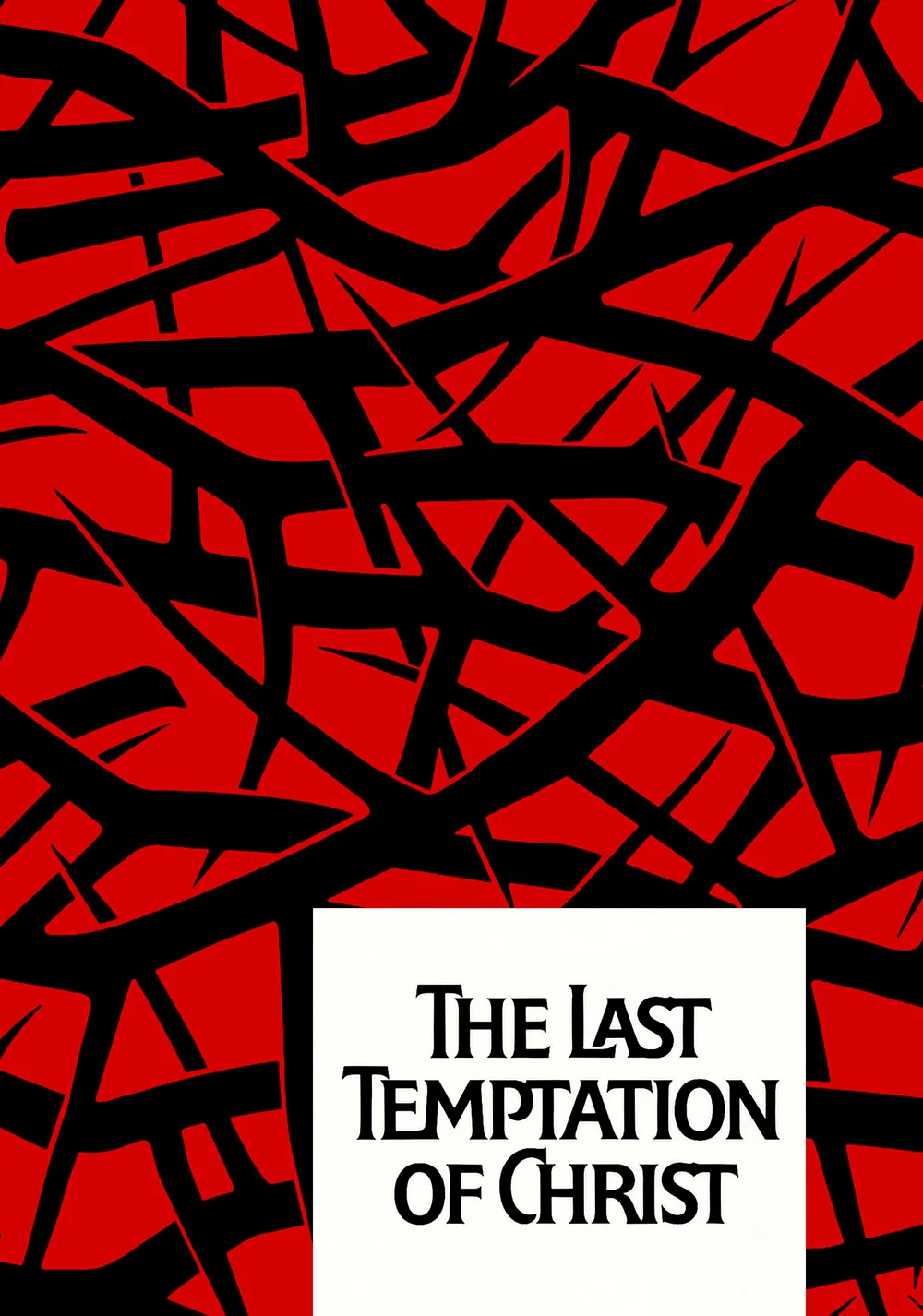
2/14:
If I told you that Martin Scorsese directed The Last Temptation of Christ, you wouldn't believe me.
But he did. Clocking at 164 minutes, the film is so boring that it resembles a slow-paced Movie of the Week on
some religious television station. Since I'm only adhering to the cinéaste point of view, it doesn't make a difference
whether I'm an atheist or not because The Last Temptation of Christ isn't entertaining or interesting as compared to
Ben-Hur and The Ten Commandments.
Oddly, this film engendered some controversy for showing questionable content. Hmm, maybe those who were offended need
some secular education to develop their brains a bit more? The re-enactment of the supernatural moments looks silly anyway.
At least, Willem Dafoe has done a great job of playing Jesus Christ. But Harvey Keitel...um, nice hair, not.
All in all, The Last Temptation of Christ is like having a bad acid trip and asking afterwards: "What the hell was that?"
The Last Tycoon (1976)
Rate:
5
Viewed:
1/15
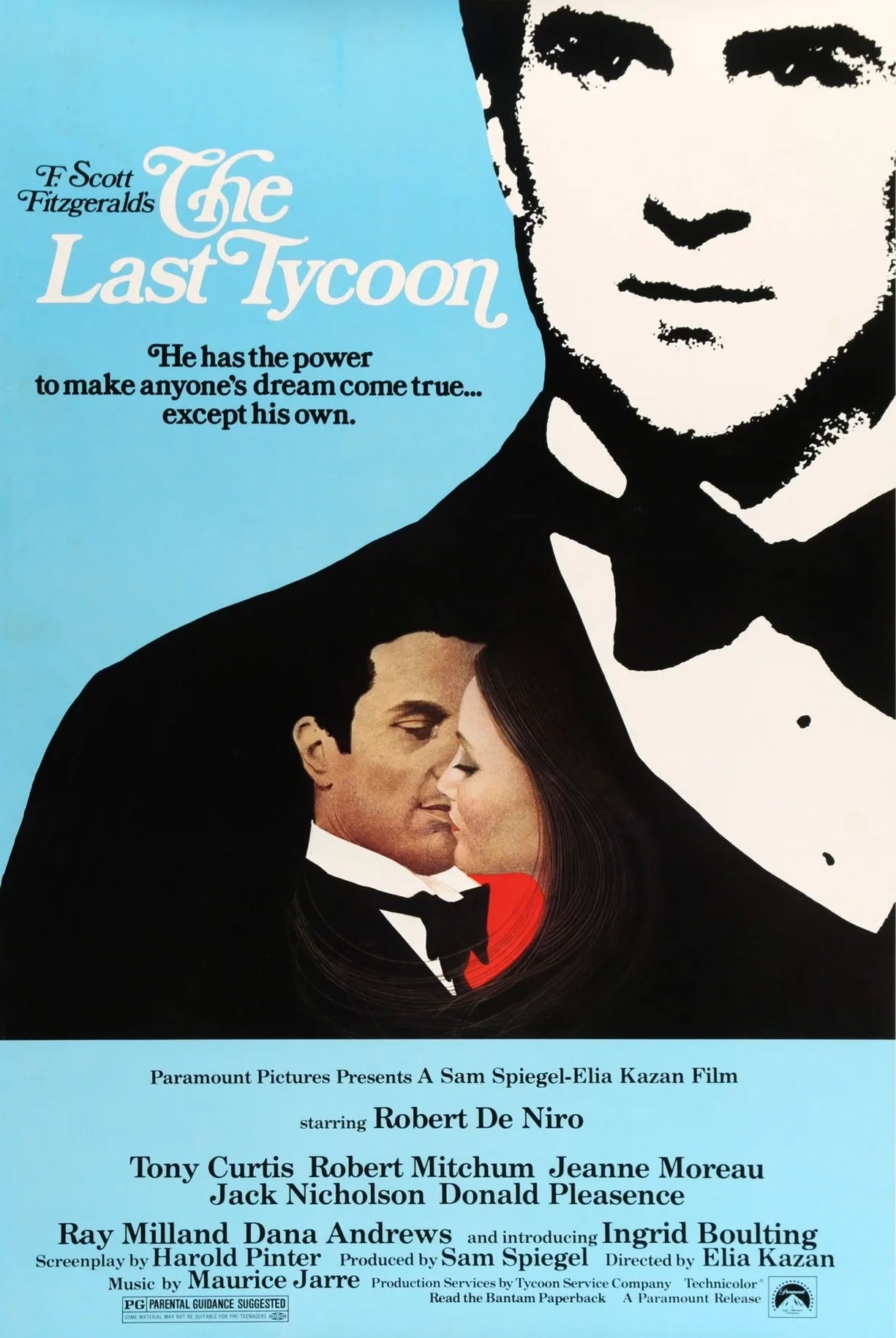
1/15:
The final line of The Last Tycoon, which was said by Robert De Niro's character, is "I don't want to lose you."
Too late. A relaxing period picture for the most part, it's unfortunately flat, goes nowhere, and ends an half-hour early.
Furthermore, the story drags and drags with no resolution in sight. The dialogue is lifeless and seems purposeless.
Robert De Niro is perfectly capable of the role, and I think he did fine. Ingrid Boulting, who plays Kathleen Moore,
takes attention away from him whenever her cherubic face appears. Strangely, she looks like Evelyn Mulwray's sister-daughter.
Robert Mitchum keeps his character low-key as much as possible.
Beyond the aforementioned thespians, I'm afraid there's not much to work with. Jack Nicholson looks displeased for being
cast. The performances by Jeanne Moreau and Tony Curtis in the picture within The Last Tycoon are pathetic.
A notable significance is that it's based on the final, although incomplete, novel by F. Scott Fitzgerald before he drank
himself to death. It's also the final film for Elia Kazan who's more well known for directing
A Streetcar Named Desire,
On the Waterfront, and East of Eden.
All in all, The Last Tycoon has made me wish many times for something, anything at all, to happen, but nothing ever does.
The Last Valley (1971)
Rate:
5
Viewed:
4/25
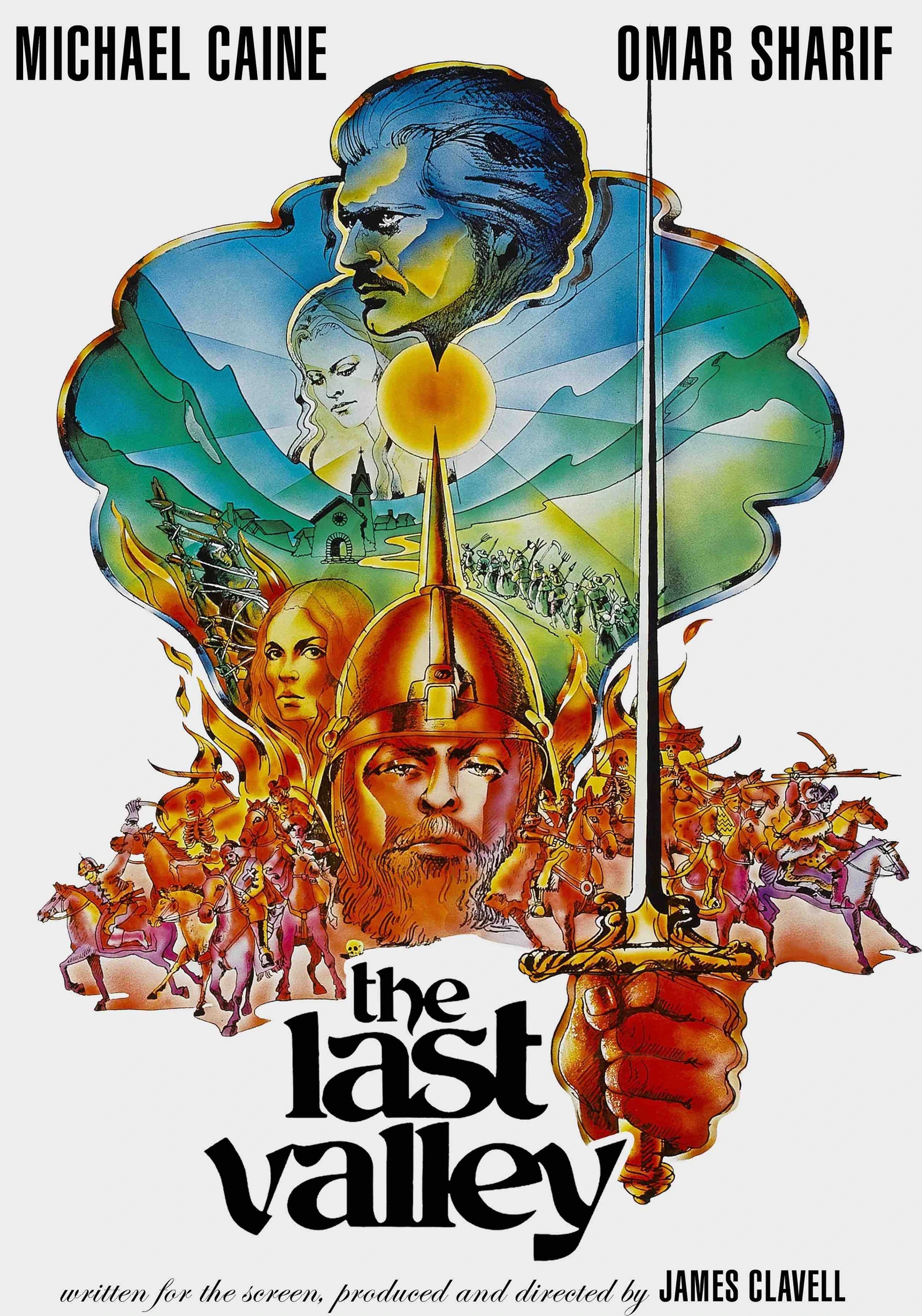
4/25:
Shot on location in Austria, The Last Valley is too mediocre for a unique anti-religious war picture.
Then again, it was directed by James Clavell, the last of his career. Because of the huge box-office disaster,
he would devote his time to writing permanently. The subject matter is interesting: life in war-torn Germany
during the mid-17th century. There are a lot of great ideas, especially when it comes to dealing with religion
and superstitions, but as a whole, they don't come together very well to make a strong impact.
Everybody talks about brutality and killing constantly such as "The next time I see you, Vogel, I'll tear out
your eyes" and "If they can't, then 10,000 to 20,000 innocent men, women, and children are falsely accused,
brutally tortured till they confess." It doesn't feel real if nothing is shown. That's why
Braveheart won Best Picture of 1995 by never holding back to depict the
reality of harsh times.
The performances are fine. Michael Caine could've been much more. Again, it's the tame material that held him
back. Omar Sharif is almost as he was in Lawrence of Arabia. Per
Oscarsson should've gotten more screen time to be transformed into a dominating figure. This way, the movie
can focus on the rivalry between his character and the Captain and Vogel. Ironically, Per Oscarsson died in
2010 by burning to death in a house fire.
All in all, talking too much about something but never demonstrating it ruins a film, and that's
what happened in The Last Valley.
The Last Voyage (1960)
Rate:
9
Viewed:
8/25
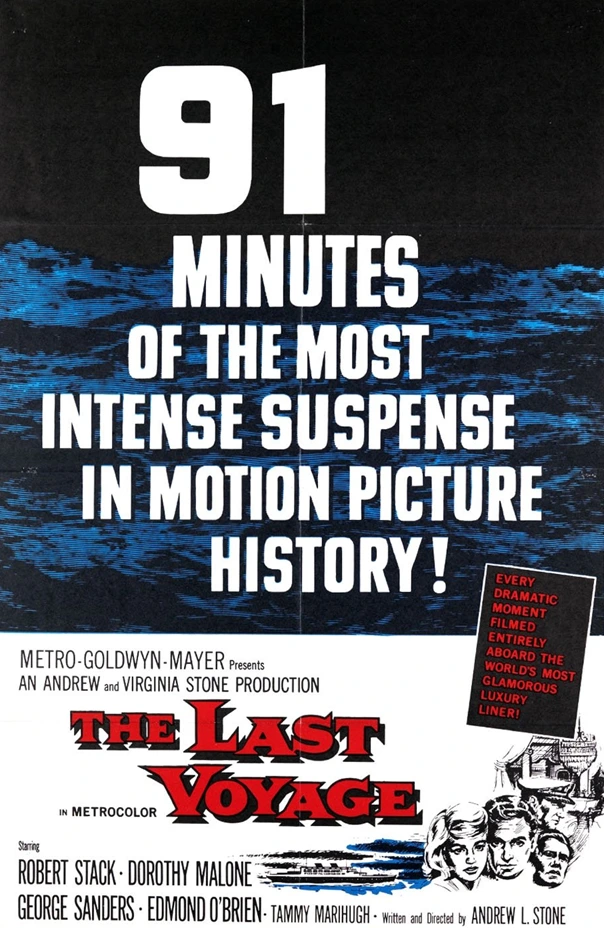
8/25:
"91 MINUTES OF THE MOST INTENSE SUSPENSE IN MOTION PICTURE HISTORY!"
Well...not really 91 minutes, but there are plenty that fit the bill in The Last Voyage. It's an
strong cast: Robert Stack, Woody Strode, and three Oscar winners: Edmond O'Brien, George Sanders, and
Dorothy Malone.
Typically, there's a buildup of soap opera drama and it takes a while before disaster strikes, but not this
one. Everybody is ready to go, and it's been problem after problem after problem. I'm impressed with how
some important people received and sent so much information and how distracted but focused they were.
In short, it feels very realistic.
There are a lot of great scenes. The rescue of the girl and the ending with the water flowing on top of the
ship may have clinched the Oscar nomination for Best Visual Effects. If anybody deserves another, it's Woody
Strode for Best Supporting Actor. He steals the show by playing a hero. No shirt is ever needed for him. Actually,
1960 was the best year of Woody Strode's career, having appeared in Spartacus,
The Last Voyage, and Seargeant Rutledge. It's too bad that the Academy Awards took so long until
Rupert Crosse finally became the first black male in 1970 to earn Best Supporting Actor nomination for
The Reivers.
Back to the rescue of the girl, I was thinking about how it could've been handled. Instead of putting the plank
in the middle of the hole, Robert Stack should've put it on the top of the blown-off sides of the bed attached to
the wall. There will be support in the middle. All the girl has to do is walk halfway through, and Robert Stack
will reach out to grab her.
As for Dorothy Malone, I wish the filmmakers would let me see inside the steel beam because it seemed like
there were only wood drawers stacked above her legs. They can be easily broken and then taken out. At least, the
filmmakers have the bruising and bleeding on her right leg correct during the aftermath.
All in all, forget The Poseidon Adventure; The Last Voyage
is the one to see.
Lat sau san taam (1992)
Rate:
3
Viewed:
8/15

8/15:
I saw Dip huet seung hung (The Killer) twice the past year
and was left duly impressed each time.
Hence, I followed it up with Lat sau san taam which is better known as Hard Boiled. Both of
them can't be more opposite in action, style, quality, plot, body count, acting, pace, and, most of all,
comprehension.
The amount of violence is so excessive that I've laughed and rolled my eyes. Instead of two dead bodies
per five minutes, it feels like twenty-five per minute which is too much for a two-hour flick. The actual body
count turned out to be 307 which must have been an all-time record for a 20th century film.
One critic described the Hong Kong picture: "More exciting than a dozen
Die Hards." Imagine doing the same thing in John McTiernan's classic, it would
have lost so much. I have no idea what the story is about; all I see are random Asians coming out of nowhere
before being shot as if it's the most beautiful way to die. I guess it's something they've practiced all
their lives.
I don't think any of the characters reloaded their guns. If they did, then the only way to keep up was to be
near an arsenal. Anyway, Lat sau san taam would be the last Hong Kong picture for John Woo because the
audience got bored of his stuff. So, he packed up his bags and left for Hollywood. The result of the transition
has been markedly poor because his American pictures are silly as well.
All in all, Lat sau san taam is for people who don't know when enough is enough.
The Late Show (1977)
Rate:
5
Viewed:
1/17

1/17:
The Late Show works for a neo-noir picture, but it has many problems.
Although Art Carney is great, it's Lily Tomlin, in her second film after being Oscar-nominated for Best Supporting
Actress in Nashville, who's annoying to put up with. I don't see why she
had to be in the movie or take up so much screen time. It's evident that Art Carney was peeved with her, too.
More of the Raymond Chandler kind, the murder mystery plot is no great shakes and is too convoluted to follow.
In a way, the film tries too hard to be a modern take of
The Maltese Falcon. There's even a framed picture of Humphrey
Bogart at one point just to pay him homage. By the time the mystery had been solved, I didn't feel like I
participated and was in the dark the entire time. On the other hand, the Oscar-nominated screenplay is okay.
There are good lines here and there, but that's it.
All in all, if Art Carney had gone solo, The Late Show would be more of a neo-noir private detective
picture than what I saw.
The Laughing Policeman (1973)
Rate:
5
Viewed:
6/23

6/23:
"Eight people know who the killer is—and they're all dead."
If they're dead, shouldn't the verb "know" be in the past tense? Besides, not all "knew" who the killer was; it
was a random mass murder hit with most of their backs turned. In fact, after the killer was caught and killed,
there's no explanation of why he did it.
Shot on location in San Francisco, The Laughing Policeman is an odd title because I never saw Watter
Mathau laugh, deadpan face and all. He's okay but likes to chew gum a lot for who-knows-what-reason. Louis Gossett,
Jr., is fair, but Bruce Dern stands out the most. I thank him for enlivening things because the movie wasn't
getting anywhere many times.
The story is ordinary with shades of The French Connection. By now,
the look is dated with some interesting insight into routine police procedure. There's a stretch of the detective
beat that works well on the neo-noir side. Then, all of a sudden, a random attack is initiated,
ruining the momentum. As a result, the movie never recovered from it.
All in all, the DVD cover of The Laughing Policeman may seem interesting, but it's actually not.
Laura (1944)
Rate:
3
Viewed:
10/12

10/12:
Laura is an overrated film noir with a capital O.
It's done with little intelligence, and the characters, who are all jackasses, are obnoxious. After fifteen minutes into
the film, I started looking at the clock. Ten minutes later, I was thinking of what to do the next day for errands. Five
minutes afterwards, I had fallen asleep.
There's no way the stupid detective ends up kissing her. What an idiot he is for trying to solve the mystery while letting
Laura go unprotected after her identity had been revealed. How many packs of cigarettes and gallons of alcohol did
everybody consume during this farce?
All in all, Laura isn't noir.
The Lavender Hill Mob (1951)
Rate:
6
Viewed:
6/14
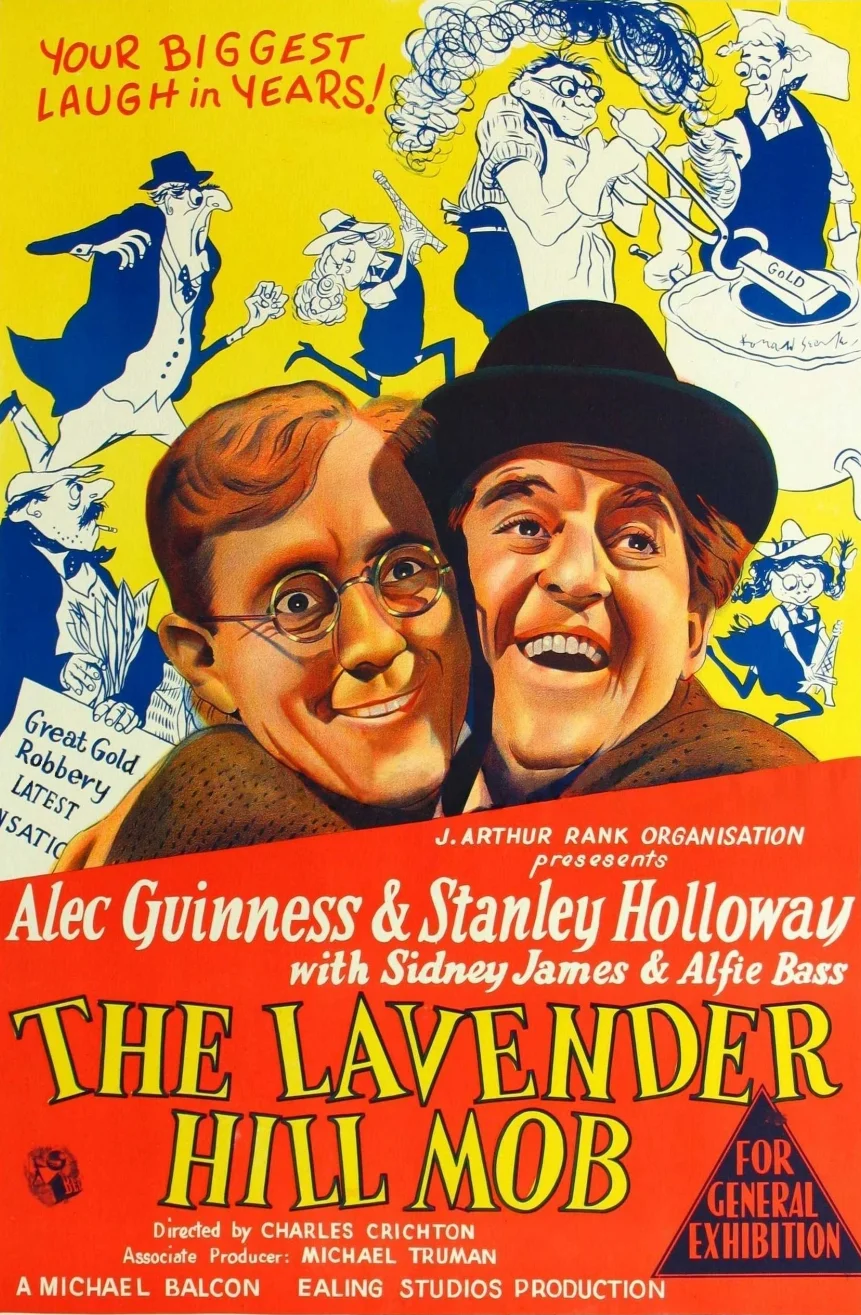
6/14:
The Lavender Hill Mob is a fairly decent British heist picture starring Alec Guinness.
Billed as a comedy, it fails to elicit a laugh from me. Perhaps the humor, whatever of it, is dated. Scoring the first Oscar
nomination of his storied career, Alec Guinness isn't bad. I'm just surprised how old, or rather how
unrecognizable, the guy looked at the time, but he was 38.
I thought that I was dreaming but felt sure it was her. But yep, it's Audrey Hepburn who makes a brief cameo
appearance which coincided with her first year of acting. Robert Shaw also makes his motion picture debut,
but I never saw him, having found out about it in the trivia section thereafter.
Anyway, I don't like the ending because it feels forced. Although the United Kingdom was lenient about such matters,
the original ending was frowned on in the United States due to the Hays Code.
All in all, The Lavender Hill Mob isn't a great picture, but it makes for a passable viewing.
Lawrence of Arabia (1962)
Rate:
10
Viewed:
7/05, 12/07, 7/11, 7/15, 9/20
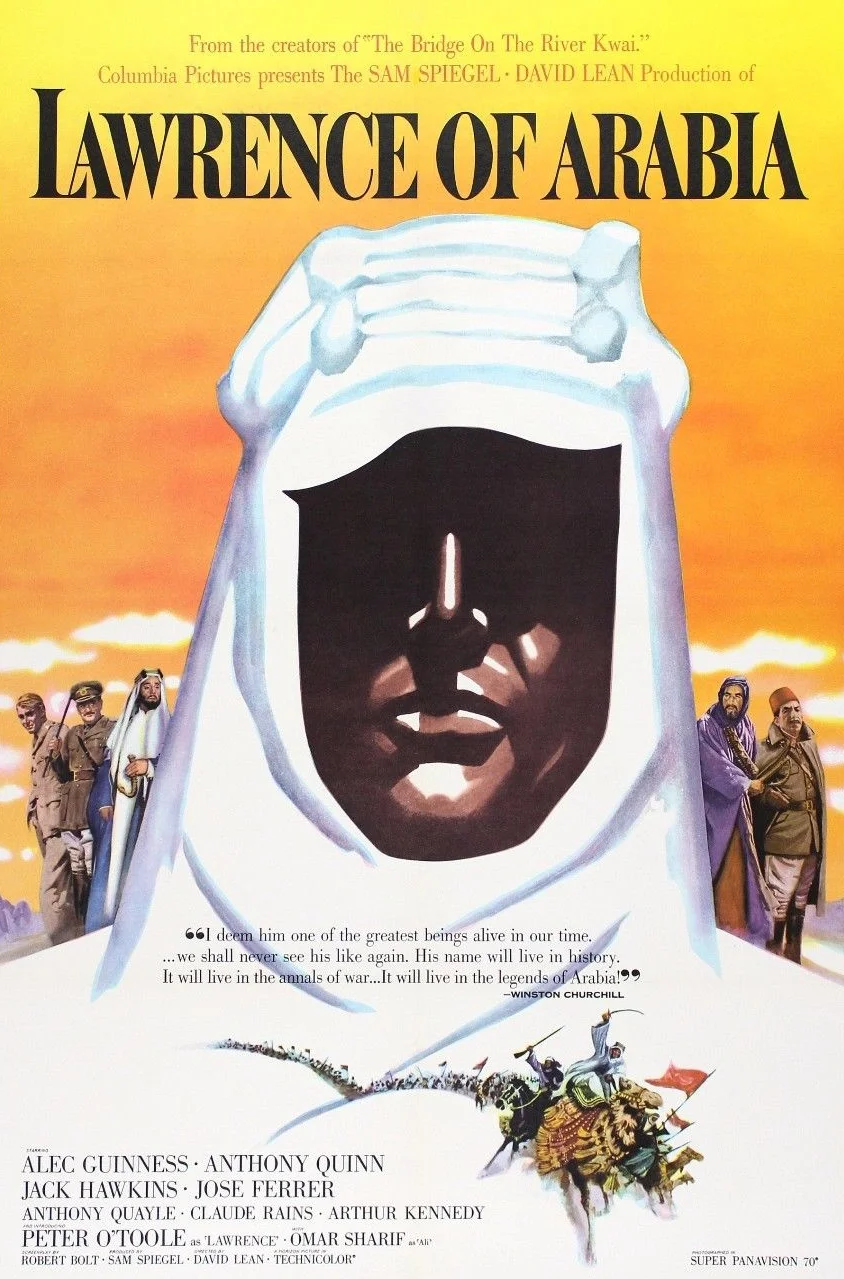
7/05:
A magnificently made masterpiece, Lawrence of Arabia is David Lean's magnum opus.
It tells a complex story of an ordinary man who transforms himself into the leader of an Arab revolution, despite not sharing
any ethnicity, and tries to make it all work but is ultimately betrayed by the realities of politics.
All in all, thanks to Freddie Young's spellbinding cinematography, it's impossible to deny the power of the desert that
Lawrence of Arabia brings to the screen.
12/07:
Like Gone with the Wind and
Ben-Hur, Lawrence of Arabia is the very definition of an epic picture.
In fact, it's probably the epic of all epics. One of the most remarkable jobs David Lean did with his characters is not
only make them larger than life but also mysterious in terms of their ambitions and desires. That's why it remains a
difficult picture to comprehend, and it's also the reason that I keep revisiting it many times. How can I not forget the
transition from one scene of T.E. Lawrence's request to be left alone as a simple, ordinary recluse to the next with
Arabs chanting "El Aurens" as he comes back to the desert?
All in all, Lawrence of Arabia is a once-in-a-lifetime picture.
7/11:
Lawrence of Arabia is among the greatest movies ever made.
Having seen the picture many times, I never get tired of it. Four hours is nothing. There are so many hidden meanings that
I learn something new every time I watch it.
According to Robert Sellers' The Life and Inebriated Times of Richard Burton, Richard Harris, Peter O'Toole, and Oliver
Reed: "By the end of filming O'Toole had lost two stones in weight, received third-degree burns, sprained both ankles,
torn ligaments in both his hips and thigh, dislocated his spine, broken his thumb, sprained his neck and been concussed twice.
The conditions were such that some of the crew couldn't take it and left."
All in all, Lawrence of Arabia is a top five masterpiece.
7/15:
Omar Sharif passed away last weekend.
Thinking of his cinematic achievements, I wanted to see Lawrence of Arabia for the millionth time. It's still
a timeless classic that ranks in the top five of all time. The power of the desert is undeniable; those weren't impacted by
it have sadly missed the point.
It's true that one man can change the fate of a country, and it's also true that he cannot do it all by himself. He needs to
be surrounded by people who believe in him in order to achieve the impossible. It's a powerful concept that has been proven
over and over throughout the course of history.
Courtesy of Freddie Young's cinematography, Lawrence of Arabia is a rare accomplishment for allowing the ambience to
overshadow the characters. That's why when T.E. Lawrence came back with Farraj to the army headquarters in Cairo, everything
felt strange and out of place.
I can't say enough about the cast. It's one of the greatest ensembles ever. Peter O'Toole's screen debut is nothing less
than stunning and impactful. So is Omar Sharif's, the best actor to come out of Egypt, whose character is the personification
of Lawrence's superego. Anthony Quinn is stirring as Auda abu Tayi. Alec Guinness is the master of his craft and obviously the
perfect choice for Prince Feisal.
Never mind the running length because time passes so quickly that I'm amazed the movie is over
already. Thus, it's important for the new viewers to forget the length but to feel the quality. With numerous layers
to unpeel to tell the story of T.E. Lawrence's military campaigns in Saudi Arabia, the replayability value of
Lawrence of Arabia is quite high.
David Lean knew that the amount of material on T.E. Lawrence was staggering. As a result, he became a genius for transforming the
story of his Arabian adventures into perfectly worded conversations to advance the plot while capturing the power of the desert.
It's precisely the reason why the characters are shown larger than life, making Lawrence of Arabia a mystical film.
Many directors have tried to copy his style of filmmaking, but it still remains inimitable.
All in all, there's nothing like Lawrence of Arabia.
9/20:
Ah, well...what movie is going to beat the cinematography of Lawrence of Arabia?
A tall task indeed, so forget about it. This is the film that everybody is remembered for all eternity: David Lean, Peter
O'Toole, Omar Sharif, Anthony Quinn, Jack Hawkins, Anthony Quayle, Robert Bolt, Michael Wilson, and Freddie Young, among
others.
They said that if Peter O'Toole was any prettier, he would've been called the Florence of Arabia. It's true. The
mystifying power of the desert cinematography is unbelievable; that's why I can watch the film many times.
It may be an easy thing to do by knocking off the white Englishman Alec Guinness for playing an Arab, Prince Feisal, but
by all accounts, it's been remarked that he looked exactly like him. The same is true for Anthony Quinn as Auda abu Tayi.
Omar Sharif is special. Peter O'Toole should've won the Oscar for Best Actor in a landslide.
All in all, Lawrence of Arabia is a top three masterpiece in world cinema.
Le ballon rouge (1956)
Rate:
7
Viewed:
6/19
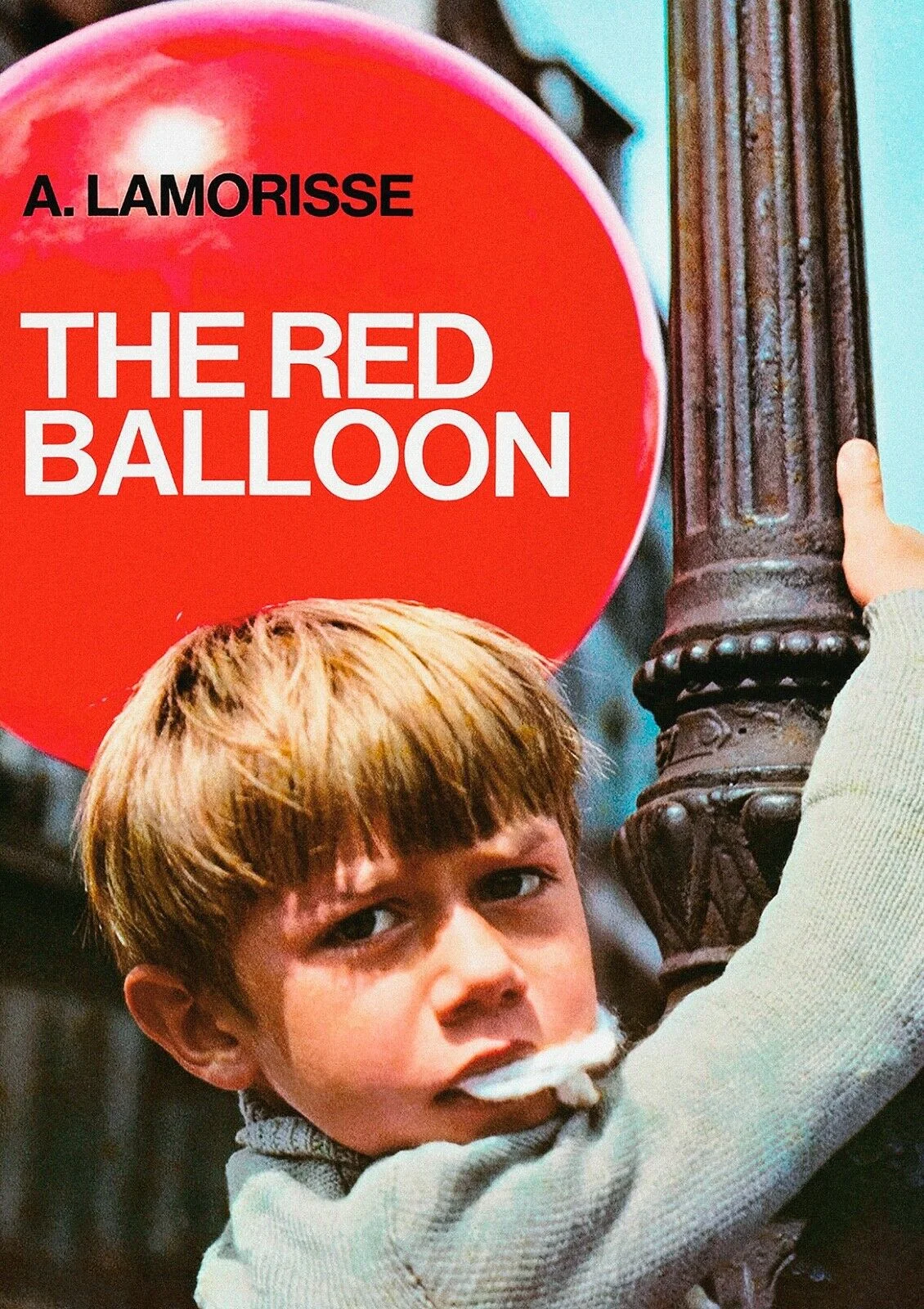
6/19:
Le ballon rouge is a quirky, innovative French short with no more than twenty-five words (this one won
the Oscar for Best Original Screenplay if you can believe it) about a boy with a red balloon that acts like a dog.
Children will probably like the film, but for adults, I'm not sure. I guess they'll have to tap their inner
child to get into it. There are stories of them hating Le ballon rouge with passion because they were
endlessly subjected to watching it on a rainy day during school which went on for decades.
The running length of 34 minutes feels long, stretching many parts to a lot of nothing. It's easy to see the
string atop the red balloon which can be distracting at times. At least, I like observing what the Ménilmontant
neighborhood of Paris looked like back then. Most of it is now gone.
The ending is sad, but there's a happy, spiritual moment to erase it away. A contrast is made between the red
balloon and the drab, dreary background as if France is trying to recover after WWII. Adults are viewed as
rigid while children are made out to be little feral monsters. Amidst them is a boy who wish to be away from
it all by letting his imagination roam free.
Incidentally, the director of the film is named Albert Lamorisse, and he invented the board game called
Risk in 1957. He died at the age of 48 in helicopter crash while shooting a documentary short in Iran.
The boy in Le ballon rouge is his son Pascal.
All in all, Le ballon rouge is a feel-good short film that's perhaps too simple-minded.
Le cercle rouge (1970)
Rate:
5
Viewed:
6/22

6/22:
There are many French films that literally scream for an editor, and Le cercle rouge (The Red Circle) is one of
them.
It's just an ordinary heist story turned into 140-minute marathon of actors walking around and not saying much. The
epigraph at the beginning is stupid, pretentious, and nonsensical (FYI: it was made up by the director). Funnily enough, even
though the film needs extensive cutting, there are occasional examples of bad editing with a bit of cheating involved.
Sometimes, I don't know what's going on, especially during the caper which had been done before in
Rififi. The ending
is anticlimactic. I can see it's the same inspector from the beginning, but I don't know how Vogel figured it out, coming from
nowhere to save Corey. Ditto for the transportation of a prisoner on the passenger train. Really, what police force does that?
At least, Henri Decaë's cinematography is outstanding. It's what kept me awake although I took plenty of breaks.
Alain Delon and Yves Montand aren't boring with the former reviving his Jef Costello-like personality from
Le samouraï. They're perfect for this sort of thing.
All in all, although brilliantly shot, Le cercle rouge is dull as hell.
Le charme discret
de la bourgeoisie (1972)
Rate:
2
Viewed:
6/11

6/11:
For some reason, when I picked up Le charme discret de la bourgeoisie (The Discreet Charm of the Bourgeoisie),
I thought it was based on the short piece entitled Le bourgeois gentilhomme, but I turned out to be wrong.
Initially, it was off to a decent start until the random dreams appeared. Thereafter, I lost interest and was bored stiff to the end.
Meant to be a film that's full of ironies, it might have hit the mark perfectly well because somebody walked into the room
and watched with me for like five minutes. Suddenly, he asked me if it was supposed to be funny. I replied, "Well, I
thought so, too."
All in all, thanks, Luis Buñuel, for wasting my time.
Le Mans (1971)
Rate:
5
Viewed:
6/17

6/17:
Le Mans is a famous bad film in Steve McQueen's résumé.
The movie had no script to begin with. Setting up for an editor's nightmare, the race was shot with a million feet of film
despite the absence of a story. Steve McQueen wasn't allowed to race in the 24 hours of Le Mans because if he did, the funding
for the film would have to be withdrawn.
Virtually granted total control, Steve McQueen wanted every aspect to be perfect yet was more interested in
fucking women and staying high as much as possible.
The Great Escape's John Sturges signed on for the project but
quit midway through due to creative differences with Steve McQueen. A TV director replaced him although he had no experience
with an auto racing film before.
Robert Relyea, the vice-president of Steve McQueen's company Solar Productions, was fired, and they never spoke again. A real
race-car driver lost his leg doing a stunt during the filming, hence the special thank-you at the end for his bravery.
In the midst of it all, the crew went on a strike. Finally, Cinema Center Films stepped in, having zero involvement hitherto,
and shut it down. The execs tried to replace Steve McQueen with Robert Redford, but no dice. Finally, they forced him to
give up his salary, percentage of profits, and control of the film in order to get Le Mans fucking finished.
Eight million dollars later with no story still, the film got put together and released despite not having more than
100 words of dialogue. It was declared DOA because almost nobody in America had ever heard of the race. As a
result, they didn't show up in theatres, causing Steve McQueen to declare bankruptcy.
Solar Productions folded for good, and Steve McQueen's marriage to Neile headed for divorce. He never raced in a car
again for the rest of his life despite finishing second to Mario Andretti. Steve McQueen also made Charles Manson's hit
list and was actually invited to the party which saw his friends Jay Sebring and Sharon Tate murdered but skipped it because
he had a "hot" date that night.
But it's okay. Steve McQueen was still the Cooler King, having rebounded to star in
Junior Bonner, give the
greatest performance of his career in Papillon, and score a new wife, even if it's a temporary sham marriage, and a
big payday for The Getaway. It would be nine years before he passed away from cancer at the young age of 50.
Back to Le Mans, well...it's a bad movie. There are no two ways about it. Not only is the movie bad, but it's also
boring. Yet there's a lot of unrealized potential. I wish the filmmakers viewed it as a strictly racing picture which was
working. But stupidly, everybody was desperate to make the plot work when they should've discarded it.
By focusing on the race, they should pay attention to the mechanics, most especially the nuts and bolts of on-the-spot car
repairs. Film the guys talking about the race; what are they thinking? Get to the heart of racing strategies. Follow the
communication lines. How do the officials keep up with the cars in terms of lap-counting? Show the technical details of the
race. Educate me. By doing them all, they will have a winner.
All in all, as desperate as it was, the art of editing saved Le Mans.
Le Salaire de la peur (1953)
Rate:
3
Viewed:
5/21

5/21:
Having seen Sorcerer plenty of times, I was hoping it wasn't a rip-off of Le Salaire de la peur which is
otherwise known as The Wages of Fear.
Now, I can rest easy because it's an insanely long, bad film. The first forty minutes is terrible because it's nothing
but fluff. I've been kept waiting for the conflict to begin. Once it does, I'm on the 300-mile trip. Then, the unbelievable
occurs: not much happens...just a lot of tension over nothing significant.
I don't understand what the four guys, who are barely fleshed out, are doing on a certain road that's bound to produce
vibrations or why they have to drive alongside the edge of an incomplete bridge. The ending, which feels multiple, is stupid,
and I blame Mario's death on his low-IQ behavior. Jo keeps complaining all the time when Mario should've kicked him off for good.
William Friedkin took several concepts from Le Salaire de la peur and then redid the whole thing by establishing how and
why these four characters ended up in a desolate Central America town. Then, he outlined the problems that they faced during the
road trip. The fate of each person was sad because I got to know them better and "impossible" wasn't part of their vocabulary.
Born with Humphrey Bogart looks and having made his mark as a popular cabaret singer, Yves Montand saves the film from being a total
clunker. It's the one that made him a huge international movie star. Henri-Georges Clouzot may have won a bunch of awards at
Cannes, but his next film Les diaboliques is much better.
Having performed all of the stunts, Véra Clouzot made her screen debut but did only three films in total
which were directed by her husband.
All in all, Sorcerer is everything that Le Salaire de la peur is not.
Le samouraï (1967)
Rate:
8
Viewed:
6/08
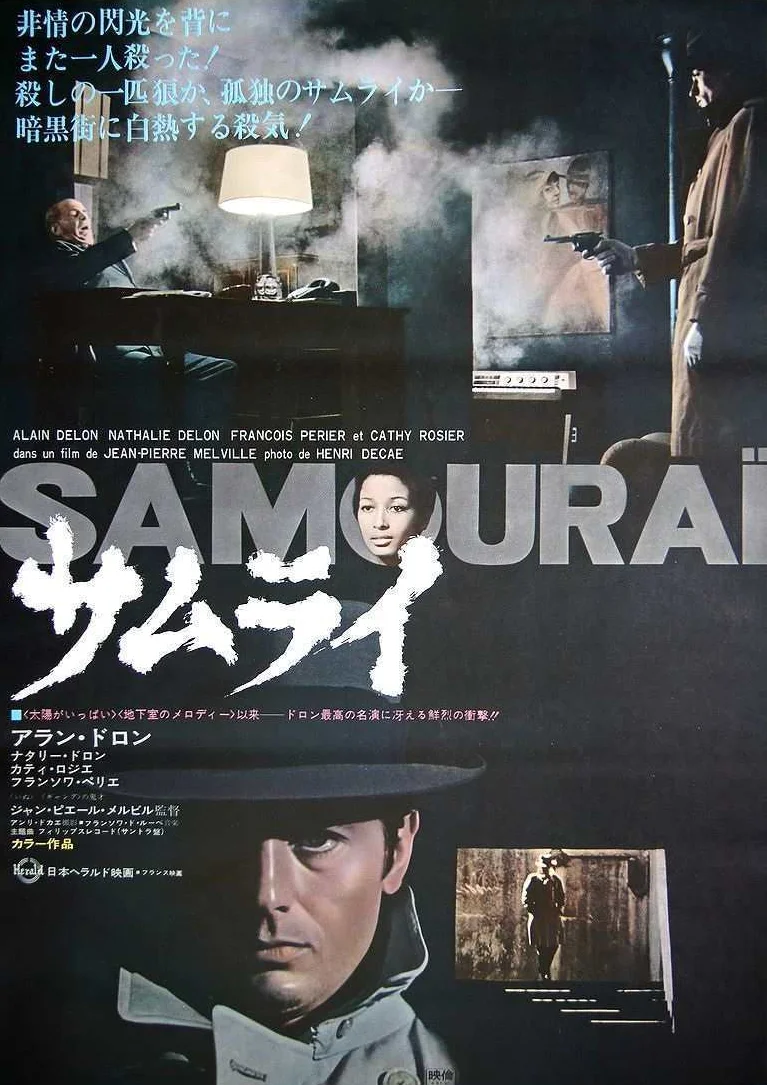
6/08:
A victim of trying too hard to be the coolest and most intelligent movie ever, Le samouraï is a near masterpiece.
One thing is for sure: the style is impeccable. Alain Delon couldn't be any happier when he was given the easiest role of
his life. He hardly does anything but to look cool. Now, I see where Brain De Palma got the idea of Frank Nitti's appearance
for The Untouchables.
The in/exterior sets are lovely done, and it's nice to see the locales of Paris be taken advantage of for the
neo-noir look. Unfortunately, the pace is slow, causing some scenes to drag out longer than necessary.
Jef Costello is kind of dumb for an assassin. Would he think of this a better idea if he ditched the hat and the raincoat?
Or perhaps he hid himself somewhere else like inside of a closet? It might have avoided all the problems for him.
I hate the ending, preferring Jef to kill the black girl and not be caught for it. I'm surprised at the amount of
dialogue. In fact, I would be cool with the whole thing had it been done in silence. It'll serve as a
"fuck you" message to the public to show that "talk is overrated."
All in all, Le samouraï is a nice addition to the neo-noir genre, and I look forward to seeing it again.
Le scomunicate di San Valentino (1974)
Rate:
4
Viewed:
5/15

5/15:
A prime example of nunsploitation, Le scomunicate di San Valentino, which is translated as *drum roll*
The Sinful Nuns of St. Valentine, is rarely the erotica picture that it's made out to be.
It's not even a horror picture by any means. In fact, it's not sinful enough. But it's a nice period piece
about the Spanish Inquisition with a slice of Romeo and Juliet. Although there's an indication of a
plot for a good hour, The Sinful Nuns of St. Valentine will slowly lose its grip by wandering to the
other side, that is, the post-medieval torture which isn't much to see.
Because the cast fails to keep up with the demands of the material, the director opts for the zoom effect to do
most of the work while the characters strip, make out, and say heavy-handed declarations to each other. No
matter what, it's hard to make heads or tails of where things are going.
There are times that it intends to be an exploitative flick, but it's never followed through. There are times
that it intends to be an historical flick, but it's never followed through. And there are times that it intends
to be a soft porno flick, but it's never followed through. That makes it zero for three; what a terrible batting
average. Many elements, especially the costumes, the dialogue, the ambience, the interior sets, and the secret
passages, have been fairly successful, but I'm lost after three-quarters of the film due to a lack of substance.
All in all, maybe the filmmakers of The Sinful Nuns of St. Valentine should think about changing the
title to simmer down expectations, hm yes?
Le violon rouge (1998)
Rate:
9
Viewed:
6/19
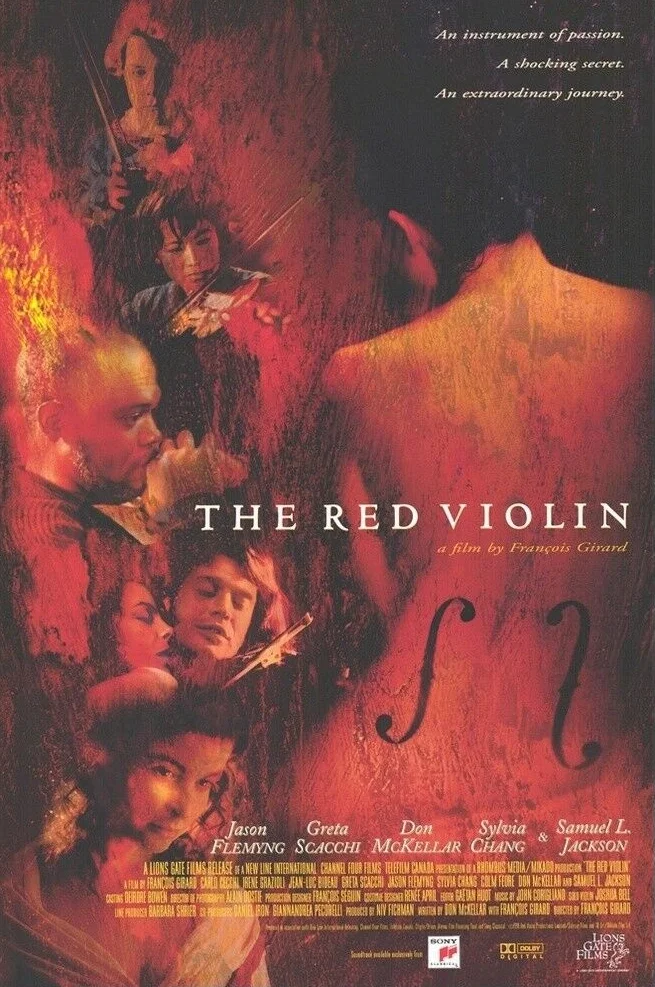
6/19:
A couple of months ago, I read somewhere online that Samuel L. Jackson ranked Le violon rouge among
his top 20 out of 111 films that he starred in.
I had seen or was familiar with more than 75% of his ouevre prior to 2000, but this one escaped my notice and
wondered how I had overlooked it. After completing the film, I can now see why it's a good role and something
different for him.
Inspired by the story of the 1720 Red Mendelssohn Stradivarius violin, Le violon rouge is technically
not Samuel L. Jackson movie as the story is bigger than him. It's about the fictional history of a red Bussotti
violin that was later revealed to be varnished with the blood of a violin-maker's wife who passed away during
labor which saw itself get exchanged by various owners across continents for over four centuries.
In this manner, the story becomes an epic as it's told in five different vignettes through six different
languages. Once Morritz authenticates the Red Violin, he begins to appreciate the historical value. That's why
he stole the instrument to give it a proper place: in the hands of an active player, not to be stored away like
a museum piece, effectively turning auctions into a joke. Then again, I question this move because sooner or
later the truth will be found out and Morritz won't look good as a result.
All in all, buoyed by great acting, music, and cinematography, the intricately woven plot makes
Le violon rouge an unforgettable film.
The League of Gentlemen (1960)
Rate:
6
Viewed:
2/25
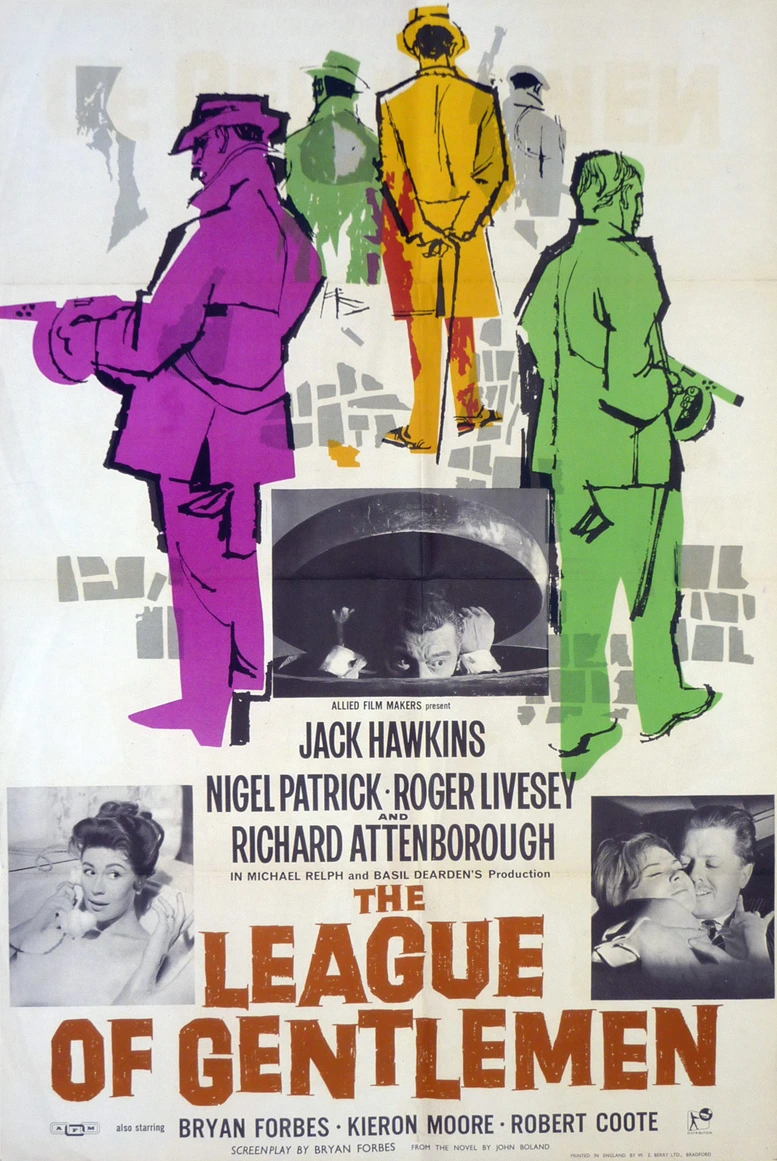
2/25:
The back DVD cover of The League of Gentlemen says that it was "immensely popular and influenced countless
Hollywood heist films."
Wrong. The Asphalt Jungle came out in 1950, made a lot of money, and
remained a very well-known film noir. Then, there was The Killing by
Stanley Kubrick from 1956; although the film lost money, its stature grew over the years. And
there was a 1955 French picture called Rififi which pretty much gave
away the blueprint of how to stage a heist.
The League of Gentlemen? Yeah, right. One has to be very hard-pressed to have heard of it, and that can
only come through being a huge fan of the director or one of the stars in the cast. Also, the heist reminds me
of Criss Cross, especially when masks are donned and there's smoke
everywhere after the money comes out of the armored truck. The League of Gentlemen has been labeled a
comedy film. Huh? What comedy? I didn't laugh once, but whatever.
The story takes too long to get to the pièce de résistance. To pass the time, gathering
participants, going over the plan, obtaining the necessary equipment, and staying disciplined have slowly bored me.
Finally, the heist commences. But the mother of all happens to set up the ridiculous ending:
there's a boy who has the knack of writing down license plates all the time. Like I would believe that.
The performances are fine. Jack Hawkins steals the show for the final leading role of his career. But what
was that all about when he came out of the sewer at the beginning? Nigel Patrick is used
again by Basil Dearden after appearing in Sapphire while Richard Attenborough
works his way up. Don't miss the amusing brief appearance by uncredited Oliver Reed as a flaming gay theater actor.
All in all, The League of Gentlemen brings nothing new to the heist genre.
A League of Their Own (1992)
Rate:
7
Viewed:
2/04, 7/25

7/25:
There was a professional baseball league for women during the 40's?
And there was a guy named Jimmy Dugan? He hit 58 home runs in 1938? A former six-time National League home
run champ? With a lifetime career of 487 home runs? Three in the World Series, two in Game 4 alone? Yeah,
okay. That's what I thought in 1992.
Just about everything in A League of Their Own is fictional. What's not is there was a big tryout, four
teams were created, and Walter Harvey was a stand-in for Philip K. Wrigley who founded the league. At the
beginning, softball was used, not baseball, and the females pitched underhand instead of over. Unfortunately, the
league remained segregated.
But was it popular? Nope. The league lasted for twelve seasons and thereafter was totally forgotten by everybody
including baseball historians. Who the hell cares about women's sports in general? Most don't watch them. All
they do is lose money. Just look at WNBA for proof. How about these fraudulent WWII veterans who had to
be taken out of MLB? Almost of them continued to play baseball while in the military and, as a result, saw no
combat action whatsoever.
Back to the film, most of it is very cheesy. There's absolutely no way there was not a single lesbian in the
league. In fact, many were. Madonna is full of herself while Lori Petty is never likeable and Rosie O'Donnell
is the image of "oh shit...fucking run away!" However, Geena Davis isn't bad. The reality is Penny Marshall
failed to develop most women's characters. A case in point: what the hell happened to Marla?
That leaves Tom Hanks as the savior with an all-time great line: "There's no crying in baseball!" If it weren't
for him, I highly doubt the film would've worked out although the baseball stuff feels like a cop-out to
cover up the deficiencies. Having the funniest lines of anyone, Jon Lovitz could've saved the movie further,
but his role was cut so short.
All in all, although well-made in spots, A League of Their Own is too butch to be taken seriously.
Lean on Me (1989)
Rate:
10
Viewed:
6/03, 11/04, 12/06, 4/08, 3/12, 7/18, 1/21

12/06:
The very first time that I saw Lean on Me was in 1989, and I became a solid fan of Morgan Freeman from that day forward.
Of all the characters, Joe Clark remains the best of Morgan Freeman's career,
and it will never be topped. Lean on Me is one of the most electrifying films of all time. There's nothing like it.
Thanks to his powerfully stirring performance, it's scene-by-scene brilliant in a moving way that captures the essence
of the human spirit. Rocky's John G. Avildsen is the perfect director for it. There are many memorable lines such as:
"You may sit down, Mr. O'Malley."
"If we treat our students like animals, that's exactly how they'll behave!"
"This is an institution of learning. If you can't control it, how can you teach?"
"There's only one boss in this place, and that's me: the H-N-I-C."
"I saw the lightning flash."
"I heard the thunder roll!"
"I felt breakers crashing, swamping my soul."
"We are not in church, Mr. Clark!"
"I fell down on my knees...and I cried, 'My God...why has thou forsaken me?'"
"Do you think I'm stupid, son?"
"You smoke crack, don't you?"
"It kills brain cells, son."
"Now, I say, if you want to kill yourself, don't fuck around with it! Go on and do it expeditiously!"
"Because you are failing to educate them, this is the posture that many of our students will wind up in. Only they'll be
staring down the barrel of a gun!"
"They used to call me Crazy Joe. Well, now they can call me Batman!"
"Boy...you really think you bad, don't you?"
"Mr. Clark don't play!"
All in all, what a performance by Morgan Freeman in Lean on Me.
4/08:
The king of high school pictures, Lean on Me is a heartwarming tale that's based on a true story of how Joe Clark
created a storm of controversy by using unconventional methods of discipline at Eastside High in Paterson, New Jersey, during
the 80's.
Morgan Freeman's electrifying performance still gets me every time. He's why I've seen the movie numerous times, and it
never gets old.
All in all, Lean on Me is one of the all-time greats.
3/12:
Once again, Morgan Freeman is thrilling as Joe Clark and gives one of the best performances ever.
All in all, Morgan Freeman, not Daniel Day-Lewis, should have won the Oscar in 1989.
7/18: "Mr. Clark don't play!"
"You smoke crack, don't you?"
All in all, it's still an electrifying performance by Morgan Freeman.
1/21:
Joe Clark passed away last month, and Lean on Me is his enduring legacy.
It's still a powerful movie with brilliant, unforgettable scenes that often come in one after another. My top three are: Joe
Clark atop the roof asking Sams if he smokes crack, his "I Heard the Thunder Roll" speech during the
emergency meeting with parents, and the test result announcement in front of the protesting students.
The Oscar for Best Actor of 1989 should have gone to Morgan Freeman; nobody was better than him that year. What a magnificent
performance he gave. It's the singular reason why Lean on Me continues to stand the test of time. The rest of the cast
is excellent as well.
All in all, Lean on Me is one of the best films made.
Leap of Faith (1992)
Rate:
9
Viewed:
4/06, 7/20
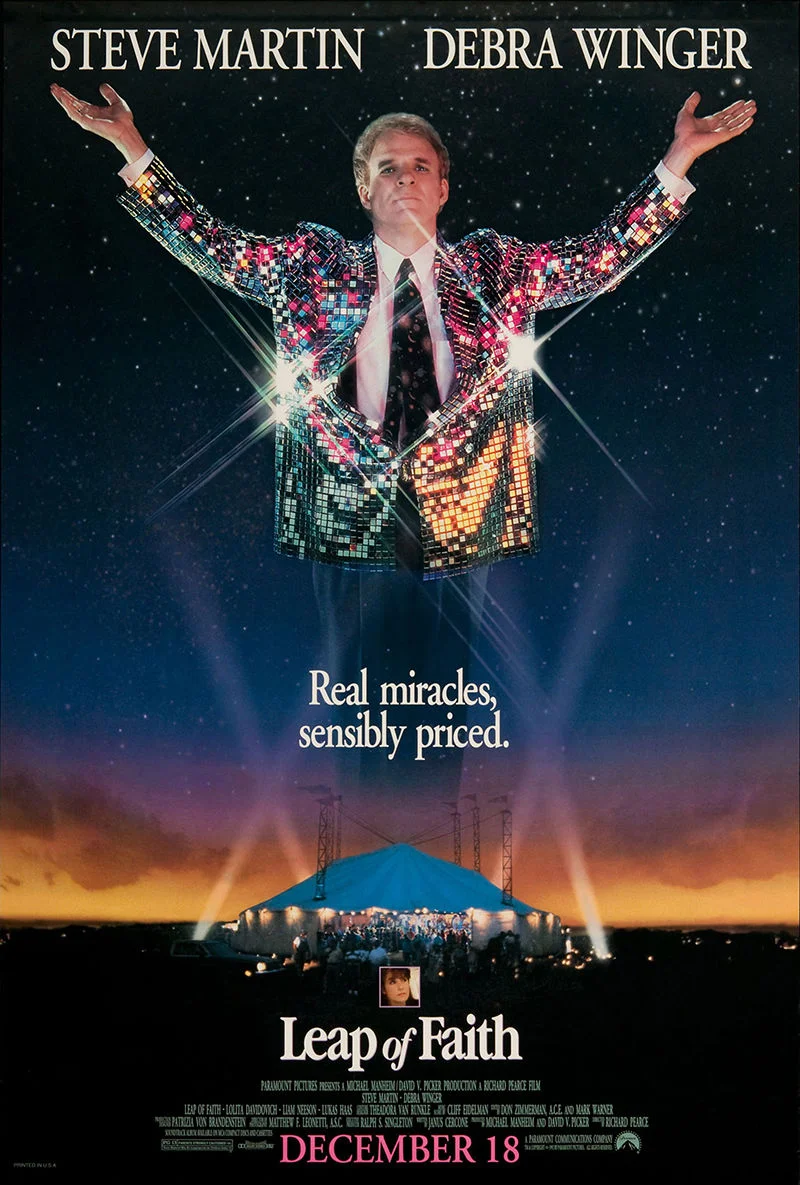
4/06:
Leap of Faith is an appropriate title for the Elmer Gantry-like
film because it's all about placing faith on a pile of bullshit.
The plot is well-thought-out with a lot of manipulation going on. Naturally, the whole faith-healing thing is
another dishonest way of making a dollar. So, I'm not easily fooled, but I love Steve Martin's performance which
is fantastic. What a convincing con man Jonas Nightengale is.
The tagline of the movie poster is an accurate representation of what the movie is about: "Real
miracles, sensibly priced." However, the romance between the characters of Liam Neeson and Debra Winger is weird
and awkward. Therefore, I wonder why it's included when the film already has enough meat.
All in all, Steve Martin gives the best drama performance of his career in Leap of Faith.
7/20:
Electrifying and honest, Steve Martin gives an Elmer Gantry-like performance in Leap of Faith that's
mostly based on Peter Popoff.
Of course, Christian fans won't take kindly to the film. Oh, well...who cares about what they think? All
religions have always been criminal enterprises. When their followers stay stupid, they lose money like water.
In Leap of Faith, it's been one con after another. The thing with the boy is the greatest of them
all, or was it? In my opinion, the audience's power is what finally got him to take a leap of faith to make the
transition. Either way, the town got what it wanted: entertainment, plenty of gospel music, pouring rain, and
an adrenaline shot to get the feeble economy going.
The acting is very good with a cast that's capable of pulling off a great show with variety. Steve Martin is
the showstopper, drawing attention whenever he appears, and he's convincing as a faith healer, con man or not.
The script is outstanding as well.
All in all, Elmer Gantry and Leap of Faith are the two films to
see when it comes to making money in the name of religion.
Leatherface: The Texas Chainsaw
Massacre III (1990)
Rate:
6
Viewed:
9/05
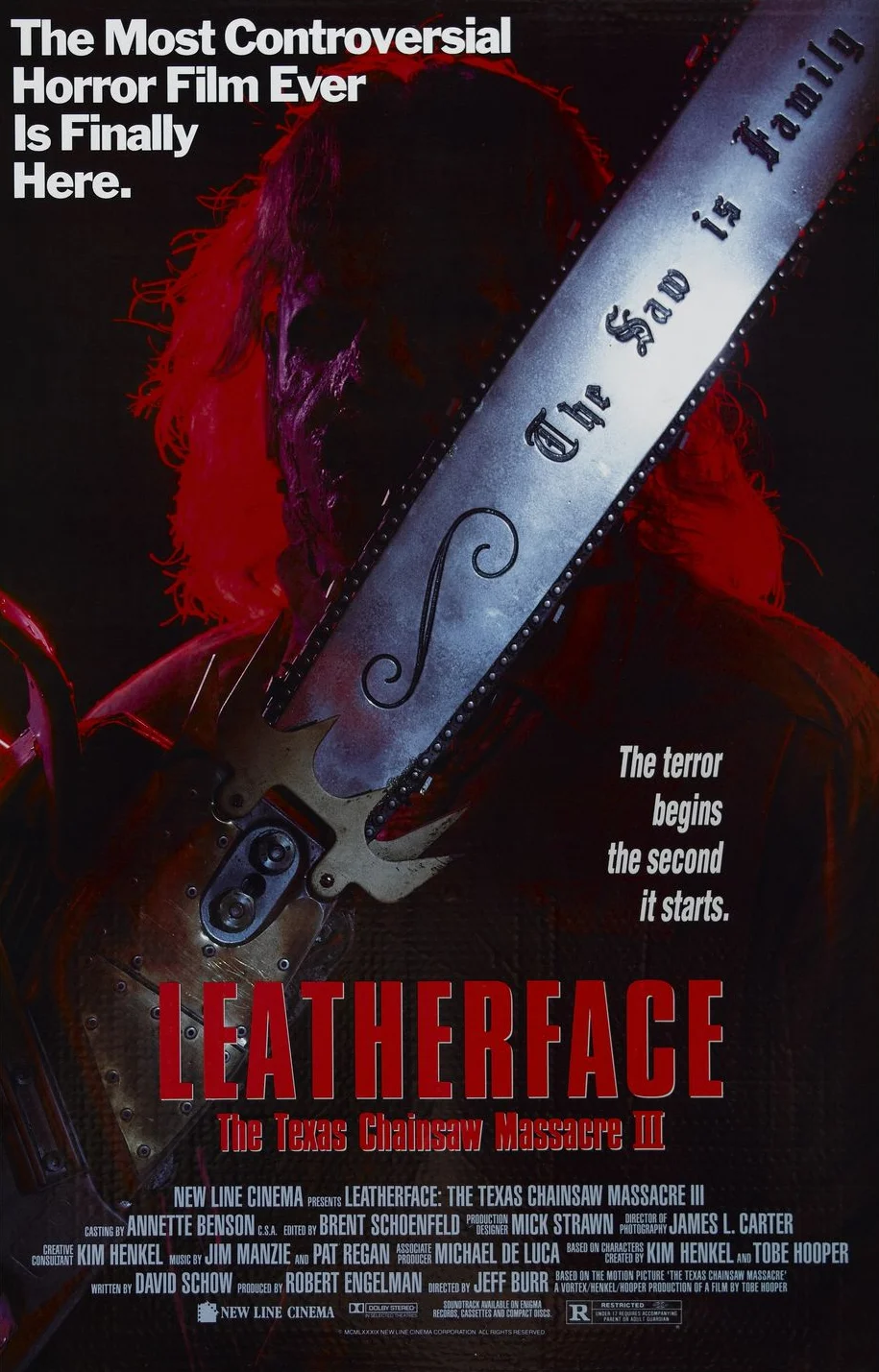
9/05:
Leatherface: The Texas Chainsaw Massacre III is a true horror film that was horribly butchered for the wrong reasons.
This one stars Ken Foree of Dawn of the Dead. His character is initially hacked into pieces, and then he miraculously
survives the bloodbath with a mere band-aid on his head not long after.
Having been submitted eleven times to the MPAA, Leatherface: The Texas Chainsaw Massacre III is infamous for being extensively cut
to avoid an 'X' rating. Imagine how good the film could've been if it was left untouched. A new ending was shot without the
knowledge of the director who found out about it for the first time while seeing the film at a theatre in Tennessee.
All in all, studio interference or not, Leatherface: The Texas Chainsaw Massacre III is a better sequel
than The Texas Chainsaw Massacre 2.
Leaving Las Vegas (1995)
Rate:
8
Viewed:
10/03, 2/13, 3/20

2/13:
The Academy Award committee has a long, extensive history of giving out Oscar nominations and wins to actors and
actresses who play drunks, prostitutes, and transvestites.
Not the one to miss a chance, Nicolas Cage gives the performance of his career, netting an Oscar win. Elisabeth Shue
is good, too, and was nominated for the Best Actress award. Leaving Las Vegas is a difficult movie to watch,
but it has many iconic moments. It's also haunting and surreal with more questions than answers.
All in all, Nicolas Cage has always been an outstanding actor, and Leaving Las Vegas is his validation.
3/20:
Leaving Las Vegas isn't an easy film to watch, but Nicolas Cage deserved the Oscar win.
First of all, it's depressing, and second, there are many unanswered questions. I can only guess what happened
to Ben Sanderson. Sera is easier to figure out as she's a damaged character who thrives on emotional support,
regardless of the circumstances.
Nicolas Cage gives an all-time iconic performance. He has haunting moments, and because of him, the movie is
surreal and has several classic scenes. To support Nicolas Cage, Elisabeth Shue is excellent, earning herself an
Oscar nomination.
All in all, Leaving Las Vegas is my preferred choice over
The Lost Weekend.
The Legacy (1978)
Rate:
6
Viewed:
10/21
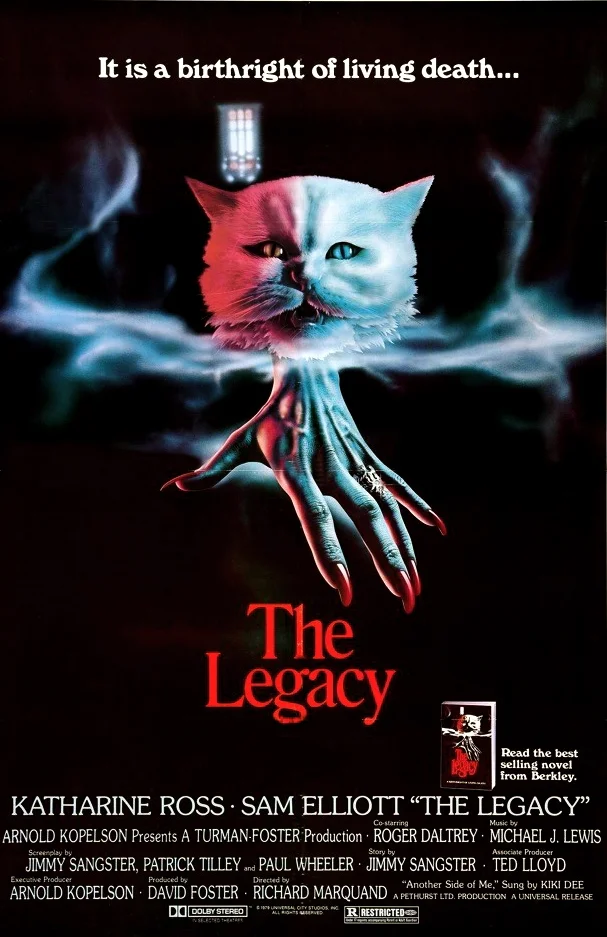
10/21:
Add The Legacy to the long line of "there's something peculiar about the whole thing" pictures.
Burnt Offerings is the best of this genre. Taking place at the English countryside, The Legacy compares
well. Unfortunately, it isn't scary or high in suspense and has little impact on me. There's a story, and everybody plays along
to enliven things. Clive says that he's in the music business. Of course, it's Roger Daltrey, the frontman of The Who.
However, there are a few aspects that I don't like. One is Sam Elliott's approach to his character. Heavy in cynicism and always
pushy, he comes off as unlikeable which is strange because Sam is usually pleasant. Two, the film is often
frustrating and takes a long while to get to the bottom of the mystery. Pete and Maggie trying to get out of the circular
roads sums up my feeling. Why can't they go through the fields and just keep going? Three, the
ending isn't good; it's been a lot of work for nothing.
The star of the film is the large Tudor manor house called Loseley Park which is located in Artington, Surrey,
England. It was built in 1568 and is currently inhabitable. Happily, Katharine Ross and Sam Elliott met each other on the
set for the second time after Butch Cassidy and the Sundance Kid and got married six years afterwards.
It's obvious that they click.
All in all, a bit of tweak here and there should improve The Legacy more.
Legal Eagles (1986)
Rate:
7
Viewed:
8/25

8/25:
Legal Eagles initially didn't grab my attention, but it got better over time, thanks to Robert Redford.
It's so awkwardly put together, yet there are parts that work. I won't call it a truly funny
movie if that's what Ivan Reitman was aiming at. I think he tried to emulate Howard Hawks in order to
reach for the Cary Grant-Katharine Hepburn effect. Therefore, it can't be the editing or the screenplay that's
the issue.
Debra Winger seems out of place at first, but she finally gets it together by latching on to Robert Redford.
That's when the film started to get into the groove during the second half. Let's be real: both aren't
certified comedians. Sure, they have charm and can be occasionally funny, but it has to be subtle on the
intellectual level.
Daryl Hannah isn't bad. Her part called for a strange artist, and she fulfilled the demand properly. For a
long while, I thought Brian Dennehy was being underutilized, but when the revelation came, I was like, "Oh,
okay. Fair enough." Terence Stamp can use more screen time to develop his character.
Back to Robert Redford, I'm impressed with his performance. He worked hard to keep Legal Eagles together.
There were times the film almost got away from everybody, but Robert Redford kept bringing it back into the
fold by stretching his range more. It's these small things he did, and they've made a big difference. At the same
time, Jennie Dundas deserves credit for creating rapport with him as his daughter.
All in all, I don't mind seeing Legal Eagles again, but the true verdict is: Ivan Reitman was the wrong
guy to direct it.
Legend (1985)
Rate:
2
Viewed:
7/17

7/17:
Yep, that's why I never saw Legend before.
Really, there's no need to. All I had to do was be aware of its disreputation. Once upon a time, Mia Sara was
beautiful. But she fell off the map big time after appearing in
Ferris Bueller's Day Off. It's a shame because
Mia had some promise. In Legend, her character is stupid, bratty, and unlikeable.
Well, Tom Cruise shan't be bothered for his association with Legend because the following year he'll appear in
Top Gun and the rest, as they say, is history. Interestingly, it's Tom Cruise's real hair which is his longest ever.
Now, if you take all of Tom Cruise's scenes in Legend and put them together as a compilation, you'll have a
very good idea of his acting range because they're the usual facial reactions that he has shown over the years. Pretty
sad, is it? Anyway, why call his character Jack? That's so American. How about something foreign-sounding that's on par
with the fantasy genre?
Sure, the cinematography and the makeup look awesome, but the film dies if the story is harebrained. Impossible
to overcome is the high amount of cheesy acting. The little boy is the champ of this department and therefore belongs in
a silly movie called Lord of the Flies. What's with the constant stream of snow and bubbles in almost every scene?
It doesn't help matters any if the dialogue is witless and full of nonsense. If it's meant to be a children's movie, then why
include profanity? Is it really necessary? The screenplay was penned by William Hjortsberg. After the whole thing was over, he
never wrote again for the rest of his life. If you can believe this, the script went through fifteen revisions, and it still
sucks.
All in all, Legend is for kooks who love living in the fantasy world to the point of no return.
The Legend of Hell House (1973)
Rate:
6
Viewed:
6/25
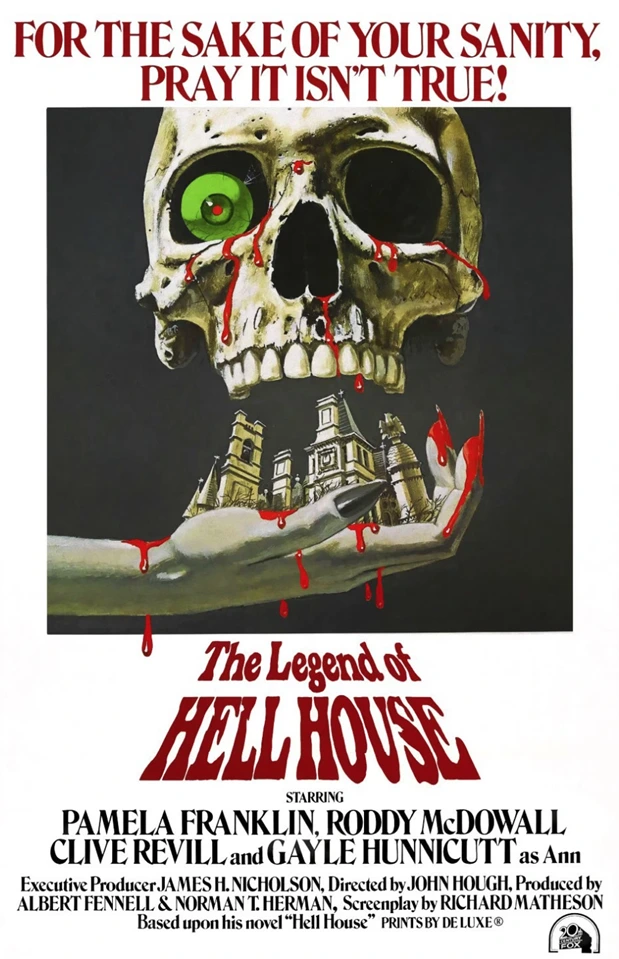
6/25:
Creating a successful haunted house motion picture is a difficult achievement.
The Legend of Hell House somewhat has it but isn't on the same level as
Burnt Offerings.
Prince of Darkness is more convincing in terms of carrying out
a proper investigation. The Legend of Hell House has a strong start, thanks to the
atmosphere. After a while, the momentum goes down steadily because of Dr. Barrett's technobabble, causing me to
quip, "Yeah, whatever. There's no scientific proof to support that."
As a result, Clive Revill plays a hated character who's so pedantic to the point of putting down Florence
Tanner as much as he can, even in front of his consenting wife. I want to yell at him, "Oh, lighten up! Focus
on teamwork." Eventually, he dies, but it's too late. If I were everybody, I would have more people working
on the house with rotating shifts. There's no reason for anyone to stay there 24/7. While at that, they
should all shut up; otherwise, too much revealing information has been given away in the "presence" of the house.
Regardless, the performances, most notably by Pamela Franklin, are well-done, being one of the two major
reasons why the film comes through. The other is the stylized camera work. I usually complain about close-ups
being suffocating, but here, they're comfortably done. Roddy McDowell deserves credit for closing the
show on a high note, but I don't feel he realistically portrayed the lone survivor from the last time when
he should be more scared and reluctant to go back again.
All in all, although not that suspenseful, I prefer The Legend of Hell House over
The Haunting.
The Legend of Zorro (2005)
Rate:
1
Viewed:
12/06
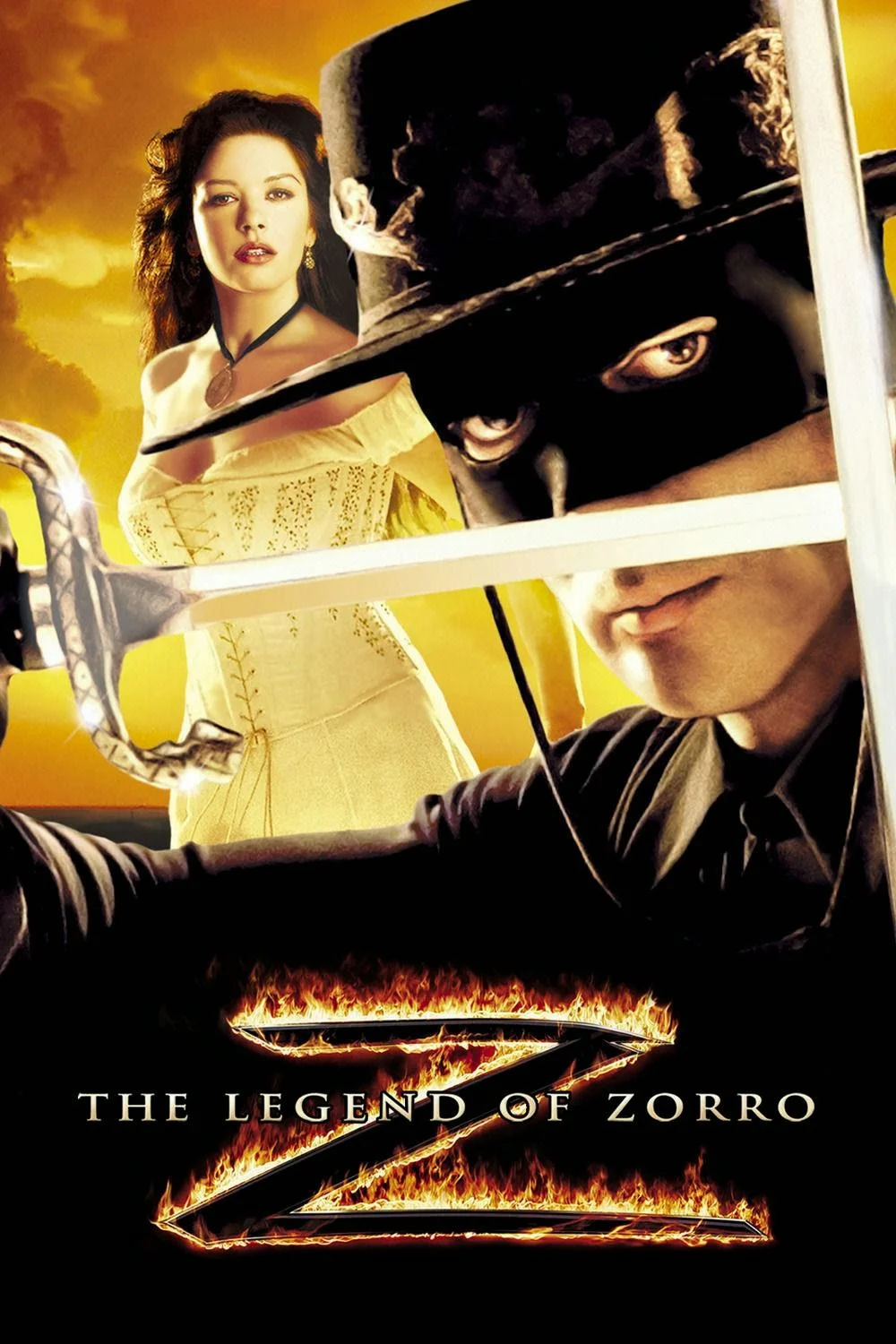
12/06:
The Legend of Zorro is a mindlessly boring film and a total waste of time.
The plot makes no sense. Some parts have insulted my intelligence, and there are too much acrobatics and swordplay.
The villains are weak and thus don't scare me.
As great as they were in the original, Antonio Banderas and Catherine Zeta-Jones are too old by now. That's because seven
years had passed. That being said, they should've given up on the idea.
Because Martin Campbell was the director, I knew what to expect, and my instincts were proven correct. The fundamental problem
is that he tried to force me to like the characters or follow the story, however incomprehensible it was. As a result,
his movies have always been a bombastic mess.
All in all, The Legend of Zorro is among worst films made.
Legends of the Fall (1994)
Rate:
7
Viewed:
8/03, 1/05, 2/07, 4/13
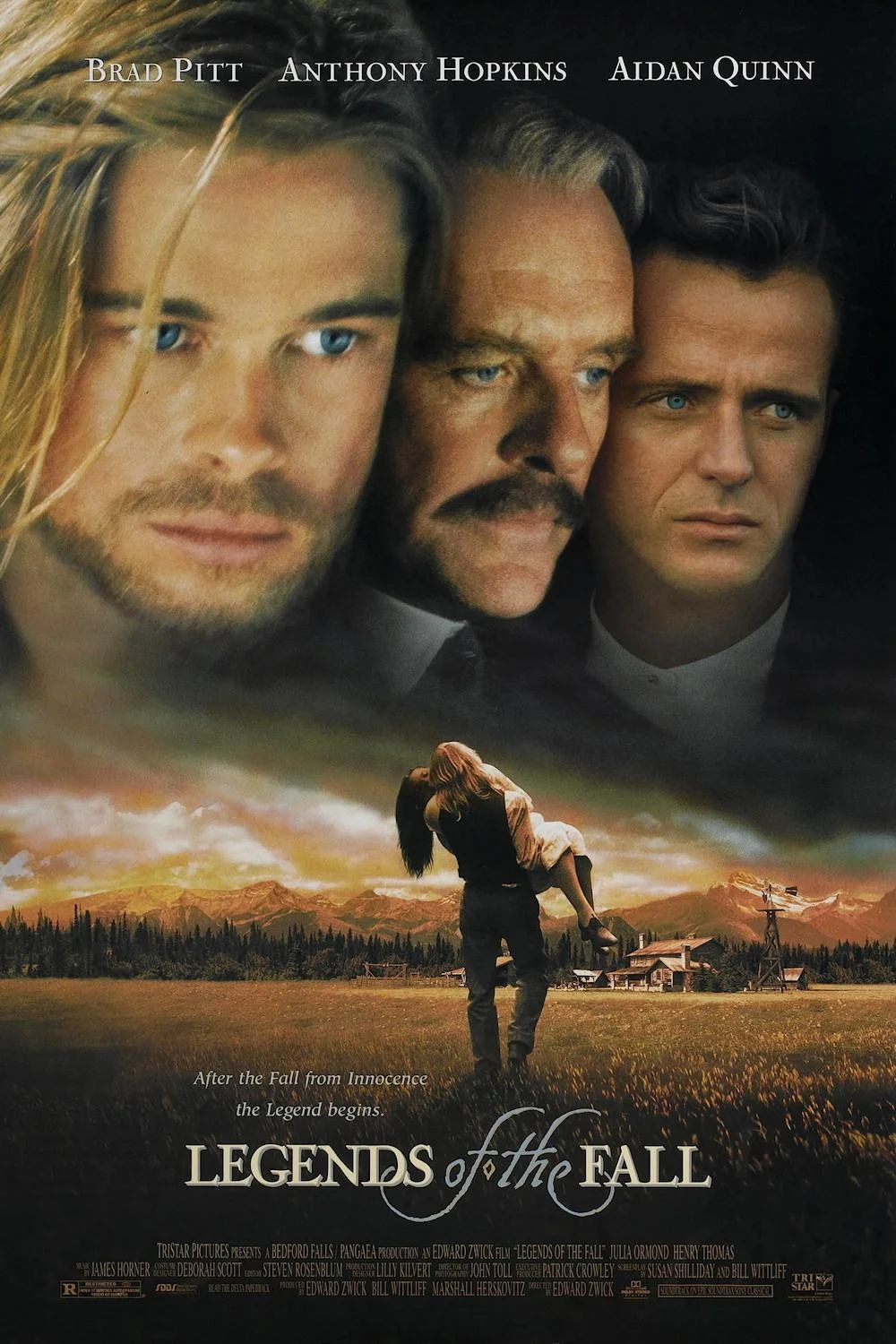
2/07:
Having reminded me of Written on the Wind, Legends of the Fall
is a ridiculous soapfest about silly problems that are easily avoidable in the first place.
Everybody is lucky to have Brad Pitt in the film because he's the only aspect worth watching.
Pretty much, the story is about a family getting away with murders, and suicide runs deep, too.
Tristan, Alfred, and their father are in the business of killing people. Samuel and Susannah commit suicide.
So, why not call the film Killers of the Fall?
All in all, Legends of the Fall is pretty much about Brad Pitt's golden hair.
4/13:
Woe is me as Susannah Fincannon reaches for her nickel-plated .38 snubnosed revolver and shoots herself in the head.
Did she do it for one of the following reasons:
1. Tristan wasn't interested in her?
2. She thought she was special?
3. She decided to stay in Montana for nothing?
4. Isabel was prettier than her?
5. She belonged to the elite social class which was vapid to begin with?
6. She slept with three men who happened to be brothers?
7. She was once married to Samuel?
8. And also to Alfred?
9. She was irrelevant?
10. She couldn't have Tristan?
11. She was just a lay to Tristan?
12. Tristan wasn't interested in her?
13. Isabel had children with Tristan?
14. Tristan wasn't interested in her?
15. She couldn't have Tristan?
16. Or all of the above?
That's why Susannah takes the cake as the most pathetic character. By the way, I didn't see the Borzoi
again after he got off the train, so what happened to the dog?
Running in a close second to Susannah is Samuel. Should he have been labeled a "village idiot"? The third place goes to
Alfred. Poor him, the color of his eyes wasn't enough to sway over anyone. Coming in fourth is One-Stab. The funniest cornball
scene is when he pretended to scalp the heads of dead men. I was like, "Um, Ritalin, anyone?" Next up is Anthony Hopkins
for his usual overacting and phony magnanimousness.
Finally, the last but not the least: Brad Pitt. It seems either of the following will happen: people die around
him or he takes a long vacation break and comes back looking prettier than ever.
All in all, Legends of the Fall is all about Brad Pitt's golden hair.
Lenny (1974)
Rate:
9
Viewed:
1/21
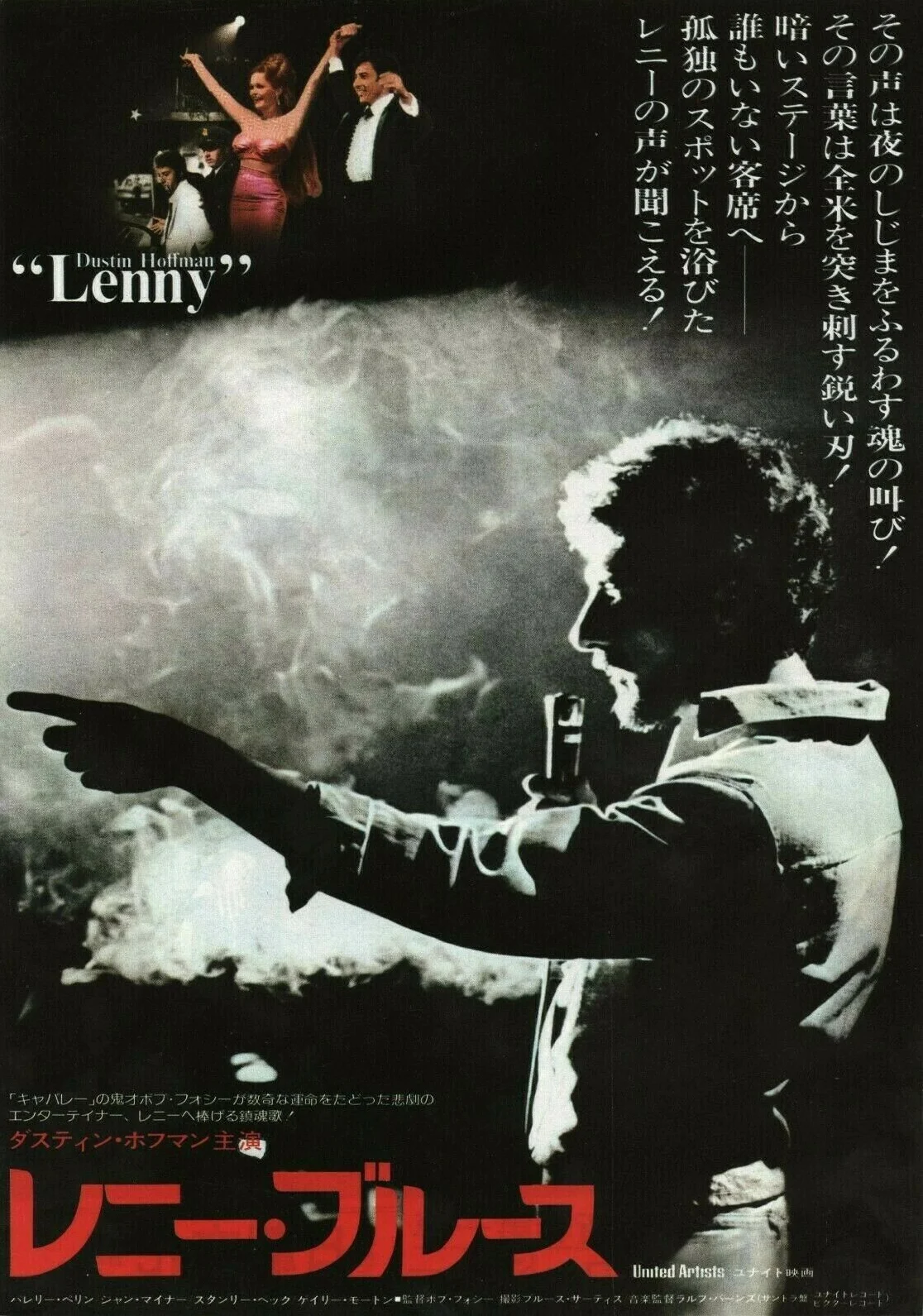
1/21:
Like Star 80, Lenny follows the same narrative style about a destructive person.
What's impressive about the black-and-white film is the editing. At first, it's rapid and choppy which signifies
Lenny Bruce's life in the fast lane. Then, the pace slows down as he ages. It comes to a standstill during his
final comedy act before dying of drug overdose at age 40.
People will have to be very, very familiar with the history of stand-up comics in the last 75 years, and to know who
Lenny Bruce was and his importance among them, they need to go through Andrew Dice Clay, Sam Kinison, Eddie Murphy, George
Carlin, Richard Pryor, and Rodney Dangerfield. All of these guys shared one trait: they were outrageous.
What makes Lenny Bruce a cut above the rest is that he was far ahead of his time. While watching the movie, I concluded that
he wasn't a funny guy. But there's an important aspect about his skit: he was saying stuff that were obscene during the 50's and 60's and
therefore got outlawed. Hence, Lenny Bruce was a shock comedian which led to his frequent arrests during and after comedy shows.
He was eventually banned from almost all nightclubs in the United States.
Dustin Hoffman gives a top five performance of his career; he's so good that the movie sometimes reminds me of
Midnight Cowboy. Valerie Perrine is also perfect, being there first before Mariel Hemingway when it comes to
telling a life story in front of the camera. Both Dustin Hoffman and Valerie Perrine deserved their Oscar
nominations by melting into their characters. By the way, Sherman Hart is a pseudonym for Milton Berle.
All in all, Lenny is an American tragedy because Lenny Bruce's First Amendment rights failed to protect him.
Les amants du Pont-Neuf (1991)
Rate:
5
Viewed:
3/16

3/16:
Les amants du Pont-Neuf, which is otherwise known as The Lovers on the Bridge to us American
pigs, is one of the strangest romantic pictures to emerge from cinema during the 90's.
However, I'll give credit where credit is due: Juliette Binoche and Denis Lavant give very, very good
performances. They do everything possible in a spontaneous way and never fake it for a minute.
Where I'm put off the most is the insane amount of energy expended by the characters given the fact that neither
has eaten much of food for proper nourishment (it's been alcohol and drugs with some firebreathing for the most
part). I just find it all hard to believe. The other side of the coin is I didn't care for the characters,
making it hard for me to get into the whole thing that's over the top all the time.
All in all, Les amants du Pont-Neuf is worth watching solely for Juliette Binoche and Denis Lavant.
Les diaboliques (1955)
Rate:
9
Viewed:
6/07, 6/25
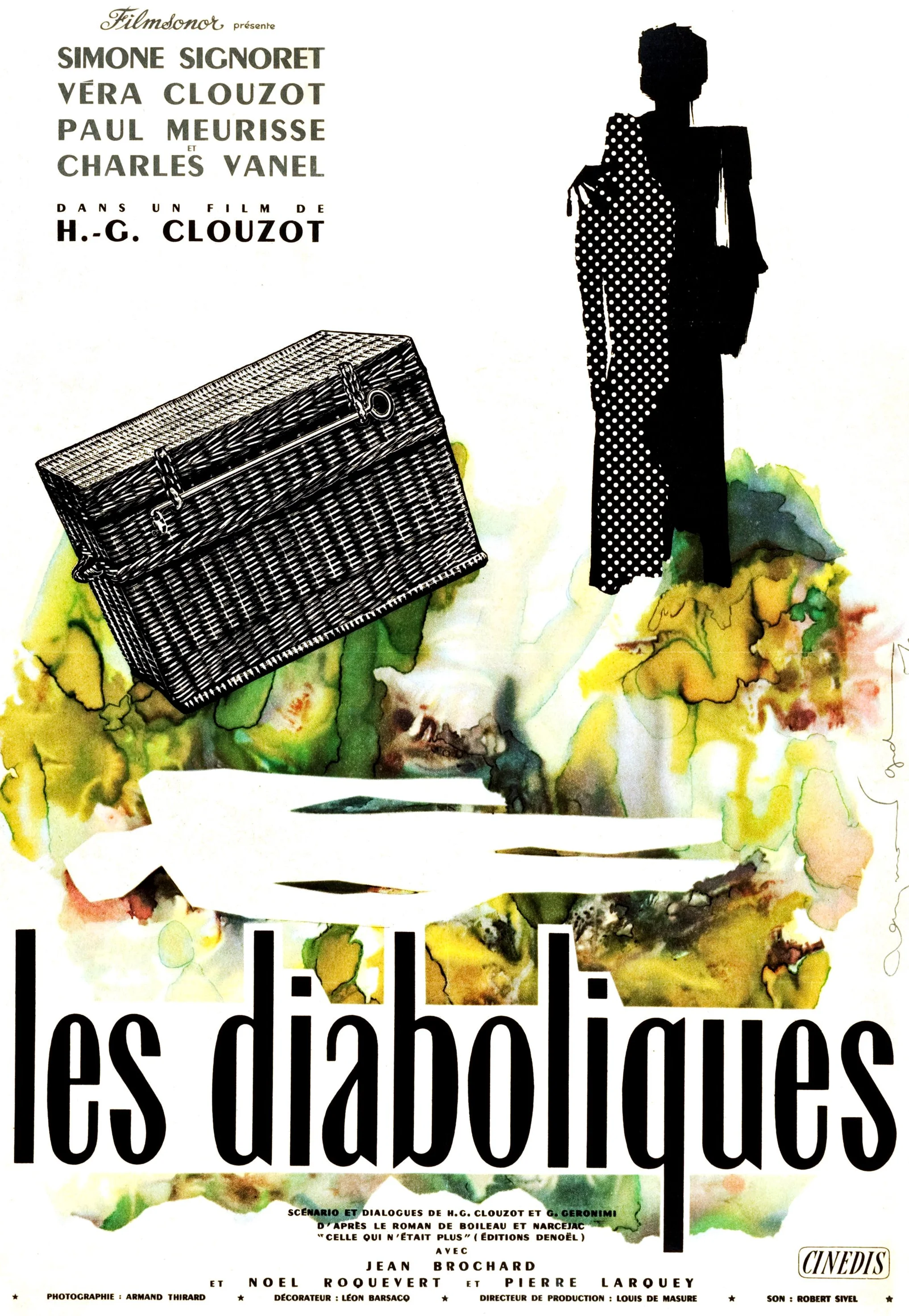
6/07:
Henri-Georges Clouzot and Alfred Hitchcock were in a race to buy the film rights to a novel called
Celle qui n'était plus by Pierre Boileau and Thomas Narcejac, and the former emerged as the winner.
As a result, he directed the award-winning French thriller that became Les diaboliques, aka
The Devils, making the Master of Suspense envious, but it did have an enormous influence on
Psycho. His wife Véra Clouzot died of a heart attack five years later
at the age of 46, mirroring the ailment of her on-screen character.
The acting is phenomenal, and the story is adeptly crafted. Sure, it's unpredictable, and I let myself stay
interested to see how the director would pull this one off. Meanwhile, Simone Signoret is ravishing while
Véra Clouzot and Paul Meurisse turn in strong performances.
All in all, Les diaboliques ranks one of the finest pictures made, and it's certainly original.
6/25:
Unique and different, the last ten minutes of Les diaboliques is what made Alfred Hitchcock want the film
rights.
Five minutes before that, I finally got it as to how the ending would happen because I thought about who really
put the poison in the bottle, placed the bronze mantle on the body, and arranged for it to soak in the bathtub,
so there went the answer. But I prefer the retired police inspector be eliminated from the picture to let the
schemers get away with the crime. Life is never morally right 100% of the time.
The biggest reason for docking a point from my rating is the film takes a while to get going. By the time
Christina Delassalle and Nicole Horner are out of town, that's when it begins to take off although the
momentum eventually slows down before picking up the pace to reach the finale. At any rate, Véra Clouzot and
Simone Signoret are consummate as these two female characters.
All in all, although problematic in terms of pace, Les diaboliques holds up very well.
Les liaisons dangereuses (1959)
Rate:
2
Viewed:
3/18
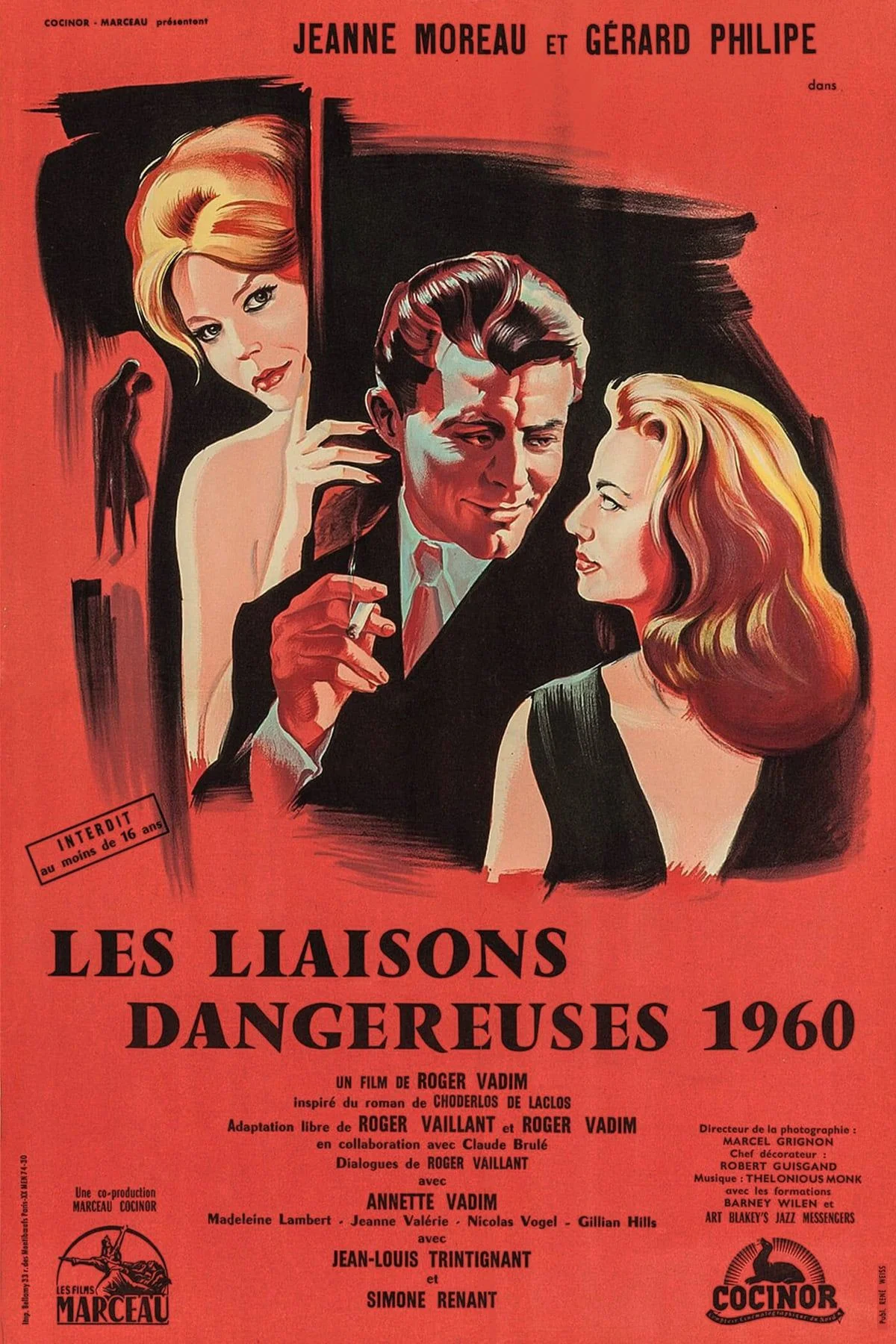
3/18:
Gee...this is precisely why I hate French cinema.
Les liaisons dangereuses never got me into the tale. The movie was so boring that I had to break it down into
five minute segments to get through the entire thing. This one took me about a month to complete. I'm a big fan of the
book, which was written by Choderlos de Laclos, and most especially Stephen Frears'
Dangerous Liaisons with John Malkovich.
In fact, I wanted more 18th century French settings and costumes from the 1959 film version. Shockingly,
Les liaisons dangereuses contains none of them as Roger Vadim prefers to keep everything as modern as possible.
So much of the plot is changed that it hardly resembles the original story, hence my permanent disinterest. Plus, I hate how
cheap the whole thing looks which resembles a bad daytime TV soap opera.
All in all, I'll rather watch Dangerous Liaisons again or read
the epistolary book one hundred times over Les liaisons dangereuses.
Les paumées du petit matin (1981)
Rate:
1
Viewed:
5/15

5/15:
The plot description of Les paumées du petit matin, which is translated as The Escapees, is: "After
escaping from an insane asylum, two women fall in with a troupe of erotic dancers and embark on a surreal journey full of
sex and violence."
Does that sound cool, huh? Well, it's one of the worst movies I've ever seen in my life. More of a film school art project than
anything, it has the worst of everything: acting, dialogue, plot (which is actually zero), pace, direction, characters, and
scenes, among others.
Listening to the characters speak, I rolled my eyes frequently and laughed to myself only out of pity. I had never seen acting this
awful. No wonder why most of the cast did nothing afterwards. Many scenes are abruptly cut off just to move on to the
next one that's still random and unconnected. Although there are many contenders, it's the last fifteen minutes that's the worst
of them all which begins with an orgy and ends with a shootout with the police.
Marie shoots herself in the belly, and Michelle walks out of the mansion, carrying her body without being arrested, and keeps
on walking as if it's supposed to be a meaningful moment. At the same time, Sophie is apprehended and is therefore
handcuffed without effort before she breaks free and runs to the edge of a quay. Then, she jumps off,
killing herself. But what for? And why do I have to endure the interminably long shot of her still-breathing body? There's
another scene which occurs earlier when Marie is ice-skating and somebody uses the spotlight on her, but there's supposed
to be nobody but her at the place.
All in all, Les paumées du petit matin made it difficult for me to stay awake for more than fifteen
minutes at once.
Les quatre cents coups (1959)
Rate:
9
Viewed:
3/06

3/06:
A famous picture of the French New Wave, Les quatre cents coups, aka The 400 Blows, is
interesting which is about the life of a typical juvenile delinquent.
The film starts off slowly but gets better over time. Plus, the ending is powerful. How the story unfolds
without pulling punches, it's almost like Ladri di biciclette. François Truffaut's masterly direction results
in superb performances, especially from Jean-Pierre Léaud who plays Antoine Doinel.
All in all, Les quatre cents coups is a prime staple of the French New Wave.
Les yeux sans visage (1960)
Rate:
2
Viewed:
9/08
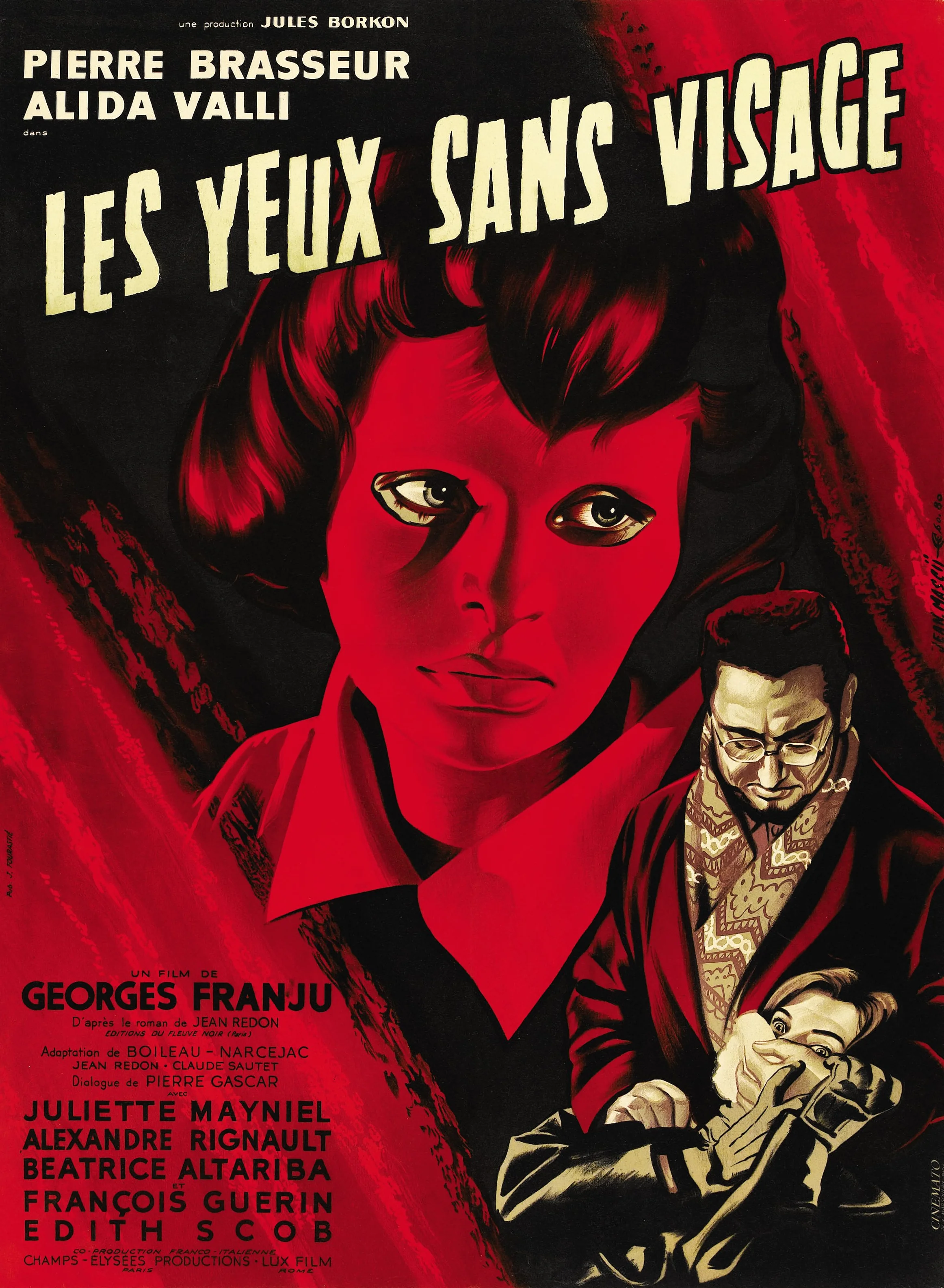
9/08:
Better known as Eyes Without a Face, Les yeux sans visage is a slow-moving picture as nothing much happens.
From start to finish, it's been a pedestrian stroll, almost as if I'm looking at the flowers and bees. The performances are
okay. To be honest with you, the whole thing would've been suitable as an episode for The Twilight Zone.
There's too much filler going on to pass for a full-length film. The only aspect that it has going for
itself is the appearance of the girl's distorted face. Yet the resulting sight is disappointing for being blurry.
All in all, more of a serial killer than a horror picture, Les yeux sans visage provides little entertainment.
Less Than Zero (1987)
Rate:
6
Viewed:
10/04, 1/06, 8/12, 11/21
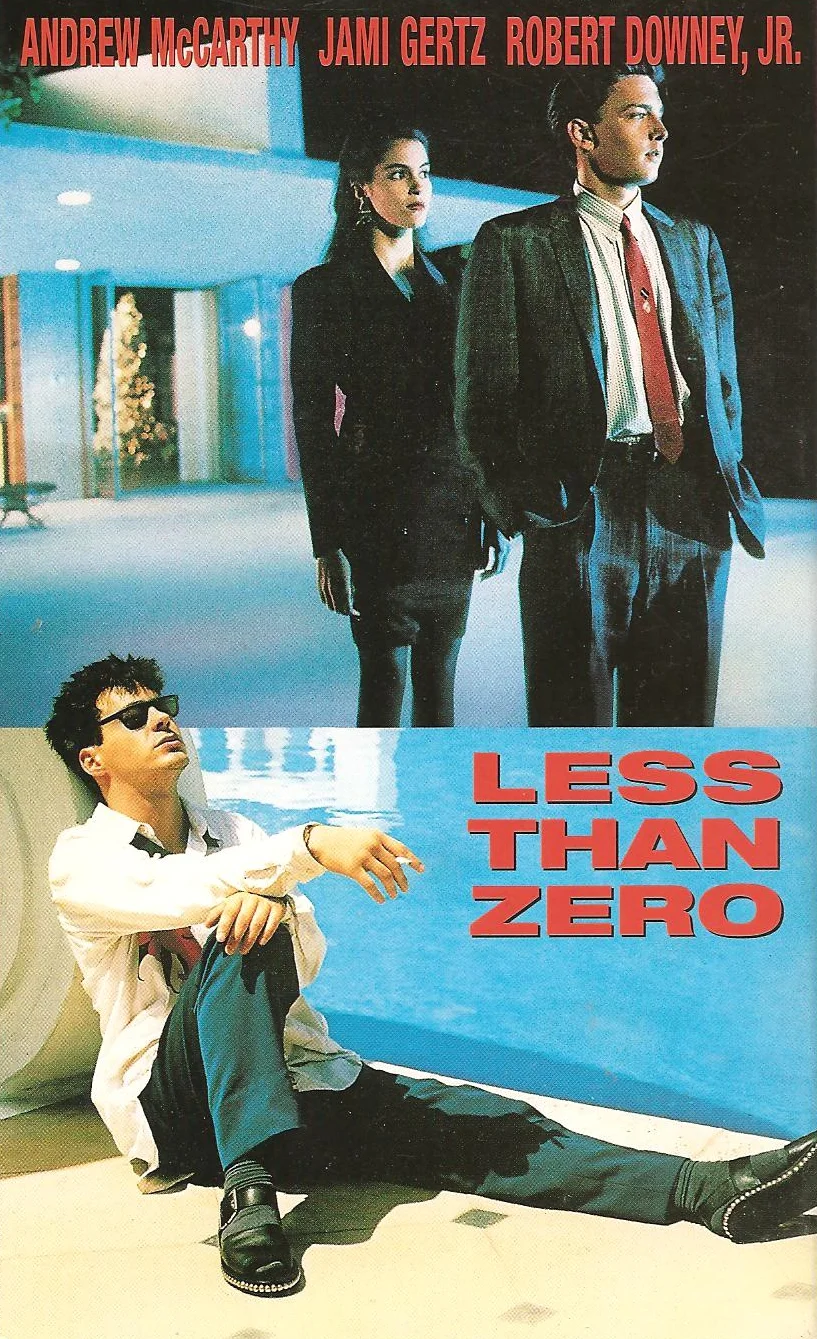
1/06:
Adapted from Bret Easton Ellis' novella, Less Than Zero is a poorly directed film that lacks the distinctive
atmosphere as created in the book.
Andrew McCarthy, Jami Gertz, and Robert Downey, Jr., turn in lousy performances. On the other hand, James Spader is perfect
and is too good for everybody; hence, he was never part of the Brat Pack which consisted of bad, untalented actors.
The trouble is that I didn't care about any of the characters. So what if Julian is found
dead with a needle in his arm in the middle of a dark alley? I mean, what's so damned important about him?
All in all, James Spader's presence prevents Less Than Zero from being a total turkey.
8/12:
I just finished the roman à clef novella Less Than Zero and went for the motion picture to see how different
they were.
All the film retained are the title and the names of the characters. Forget about everything else. I wish the environment
was similar to the book. Unfortunately, the producers had the final say by throwing the idea out of the window.
I've now decided the performances are good, but James Spader steals the show. In fact, he should've been Clay. I actually
can see Jami Gertz as Blair, but her acting needs work. Well, it's not interesting to watch a full-blown drug addict acting
pathetic and finally passing away at the end. Even worse is the constant need to know where Julian is. I mean, who cares?
All in all, by getting a better director and having a stronger vision, Less Than Zero would be a stylish, perhaps
iconic, atmospheric picture.
11/21:
Is Less Than Zero a portrayal of Robert Downey, Jr.'s real-life drug addiction?
This seems like it. Of course, he gives a believable performance but can sometimes overact for the sake of being
pathetic. Andrew McCarthy and Jami Gertz are generally bad thespians, underscoring the worst of the Brat Pack but, believe
it or not, are at their best as Clay and Blair, respectively.
James Spader is a gem, but I'm not sure why his character is keenly interested in Julian's welfare. Perhaps he has a
personal vendetta against him over something that happened a long ago which remains unknown. Yeah, that must be it.
As pointless and nihilistic as the film can be at times, there's a nice style against the chic, wealthy
yet decadent 80's ambience. The director succeeds in this respect but ultimately fails to make the film resemble anything
like the novella that made Bret Easton Ellis an instant literary sensation. He was 21 when it was first published.
All in all, Less Than Zero is a watchable film, but it's difficult to care about any of the characters.
Let It Ride (1989)
Rate:
6
Viewed:
6/22

6/22:
The last time I saw Let It Ride was in 1989, and I remembered it being a funny movie.
But now, it has aged a great deal and isn't exactly a laugh-a-thon. I realize all took a risk in making
the concept work and believe they succeeded. It pretty much feeds on thrills whether it's through horse
racing or gambling.
The star of the show is Richard Dreyfuss. The cast, which is strong to begin with, isn't bad. In many ways, the
setting looks like Miami, and it's indeed correct but was rather shot on location at Hialeah Park Race Track in
Hialeah, Florida.
All in all, Let It Ride isn't for everybody, but I've enjoyed it.
Lethal Weapon (1987)
Rate:
10
Viewed:
6/04, 3/05, 3/16, 6/21
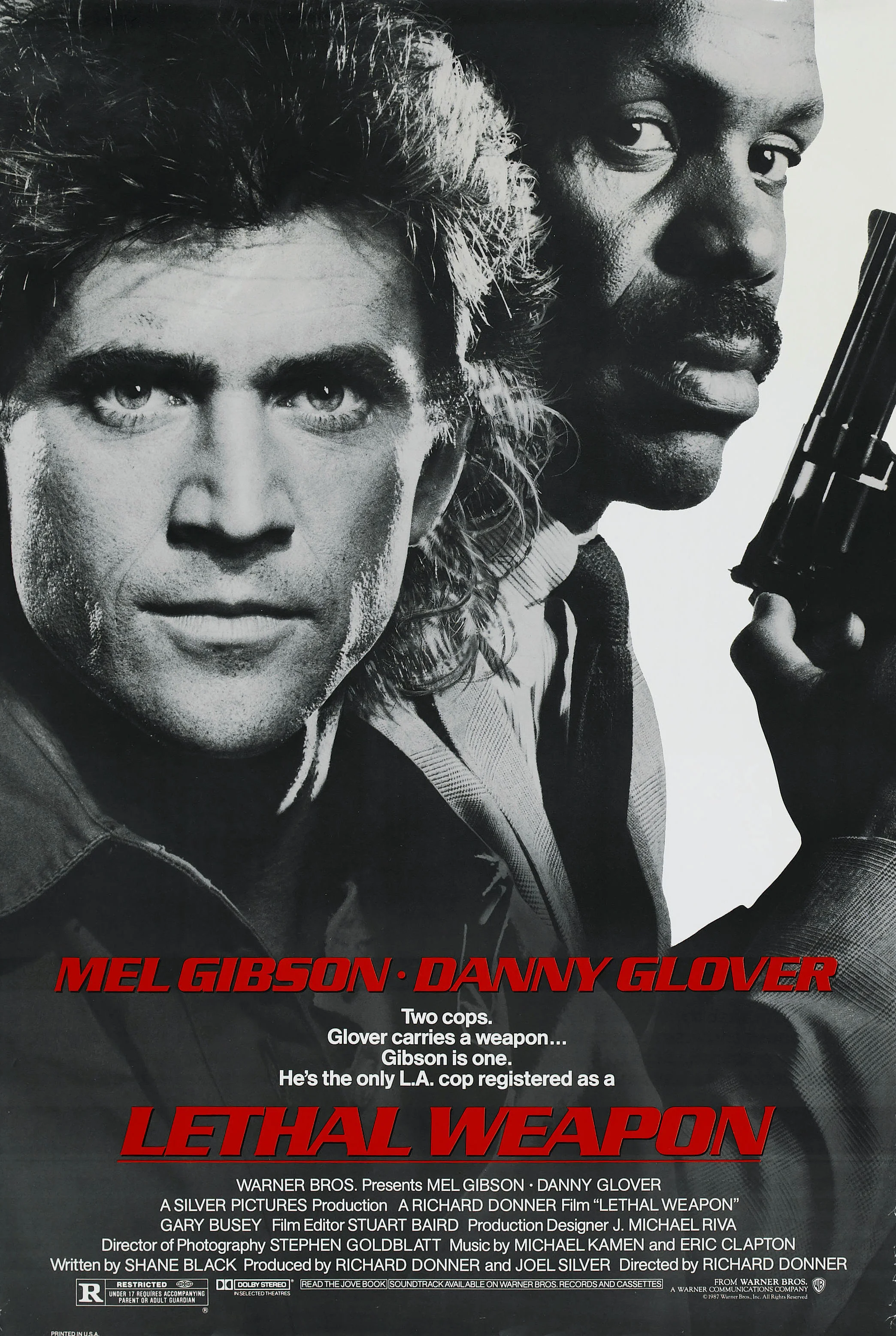
3/16:
Lethal Weapon is a forgotten masterpiece of the buddy cop action genre.
It's also a significant movie in terms of platonic interracial relationships. Mel Gibson, as Martin Riggs, is a true lethal
weapon. Danny Glover is perfect. Their chemistry is amazing which is the reason why it spawned three sequels.
The director's cut adds more to the film, and I prefer it over the theatrical version. My favorite
scene is at the gun range when Martin made a happy face out of the paper target; it's amusing and underscores how good
he is despite his psychotic behavior.
Everybody is familiar with the famous introduction of a hot naked white female jumping off the balcony. Jackie Swanson
actually performed the stunt which is impressive. In another scene, the guy in a red, black-lined Scottish jacket who holds
Riggs as hostage at the Christmas tree lot is Blackie Dammett, the father of Anthony Kiedis, the front man of Red Hot Chili
Peppers.
All in all, the chemistry between Mel Gibson and Danny Glover is what made Lethal Weapon a huge hit.
6/21:
There are hundreds of them, but Lethal Weapon is the best buddy cop film of all time.
The chemistry between Danny Glover and Mel Gibson is absolutely terrific. It's what makes the movie. One is pretty good for
a detective although he's a big believer in "do as little as possible and, more importantly, stay alive," and the other is a
true lethal weapon.
Richard Donner's direction helps immensely because the story is probably ordinary on its own. Yet the film moves along well
and has a great pace. The editing is fantastic although it can be problematic in some spots. Like
Butch Cassidy and the Sundance Kid, it's also a funny movie which goes a long way.
All in all, Lethal Weapon earns a '10' for being the best film of the buddy cop genre.
Lethal Weapon 2 (1989)
Rate:
8
Viewed:
5/03, 7/04, 3/16, 6/21

3/16:
Lethal Weapon 2 is a rare film that successfully mixes action with comedy.
It also features the best buddy cop pair of all time: Danny Glover and Mel Gibson. I can't help but admire the interracial
relationship between the two; they have terrific chemistry although it can be corny at times.
Striking gold in comedy, Richard Donner, who isn't a bad actor himself, introduces Joe Pesci to spice things
up. His character is funny with an unforgettable "okay, okay, okay" shtick. He'll come back again for the next sequel.
There are a lot of good scenes, but the most memorable of the entire franchise is the toilet bomb.
Another is Riggs taking down the stilt house with his truck. Leo Getz opening the car door is hysterically funny. However,
the showdown between Riggs and Pieter Vorstedt should've been more dramatic and longer like what happened with Gary Busey
at the end of the original. By the way, notice Murtaugh using an air gun to dispatch the bad guys. It's impossible as
he'll need to hook it up to a running generator for air pressure.
All in all, Lethal Weapon 2 is a lot of fun to watch.
6/21:
They say sequels suck, but Lethal Weapon 2 isn't one of them.
The original set the bar high, and Lethal Weapon 2 does well for measurement. I like the Afrikaner angle;
it's different. Of course, Patsy Kensit is a babe, making for the most memorable female of the franchise.
Pairing up Danny Glover and Mel Gibson is enough for goldmine, but Richard Donner takes a risk by adding Joe Pesci to
the mix. The result is a funny movie. There are a couple of legendary scenes such as the toilet
bomb and Riggs taking down the stilt house with his truck.
However, it sometimes does poorly in editing. Stunt doubles can be obvious to spot. There are some impossible moments such as the air
gun not hooked up to a compressor, Riggs running after a vehicle, and the car smashing through the steel doors of a
shipping container (it'll need more room for a running start).
All in all, Lethal Weapon 2 is full of action, twists and turns, and high-speed chases.
Lethal Weapon 3 (1992)
Rate:
8
Viewed:
7/04, 3/16, 6/21
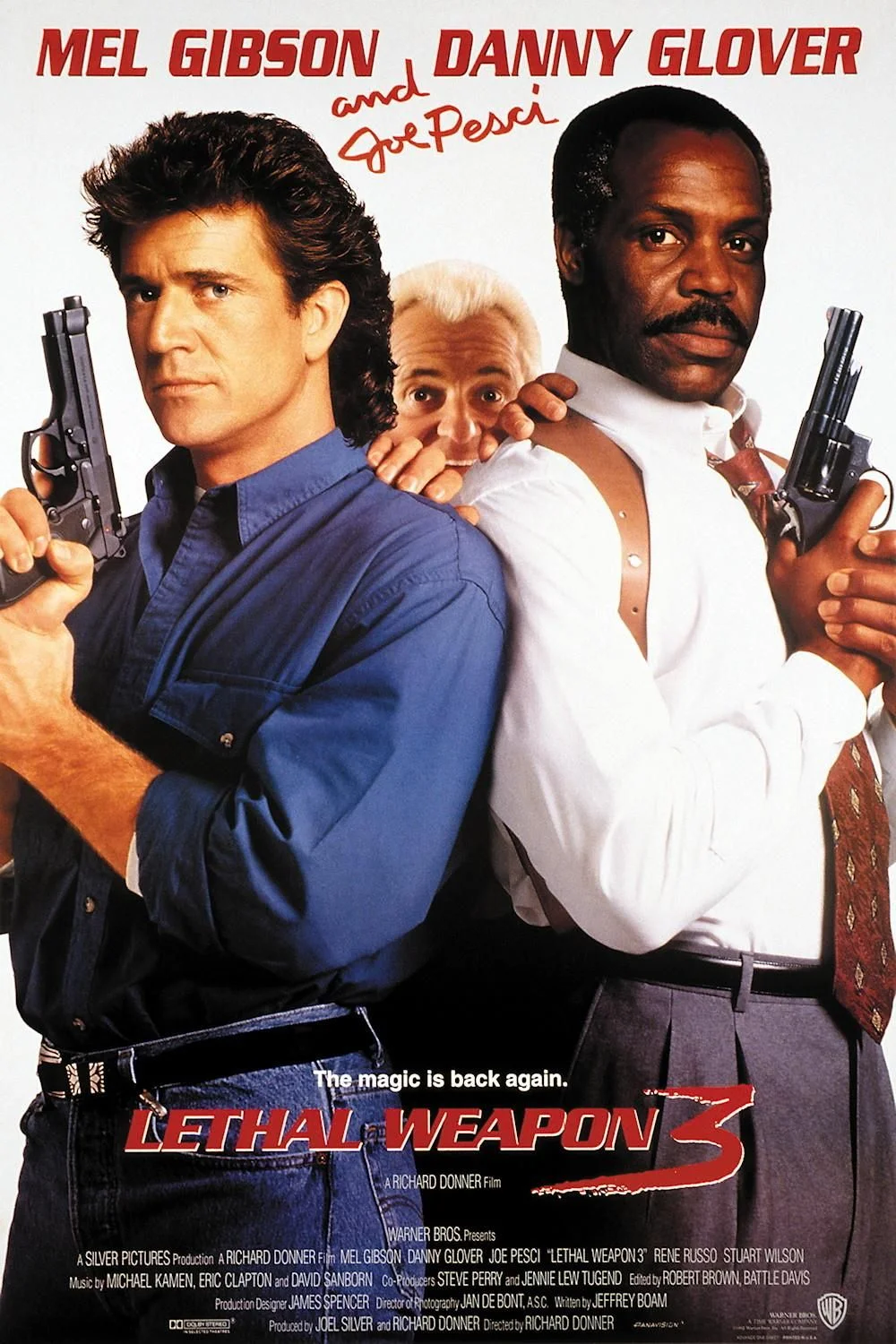
3/16:
There's too much of everything in Lethal Weapon 3: characters, action, comedy, explosions, dialogue, and violence.
Hence, I didn't remember much after seeing it a long ago. However, there's a lot of male bonding between Martin Riggs
and Roger Murtaugh. They're once again funny.
Like Joe Pesci, Rene Russo is added to the mix. It certainly helps to get things moving. Cops are supposed to be going
after Jack Travis, but he's strangely let loose after killing the suspect in the interrogation room at the police station.
By the way, ever wondered why Murtaugh's boat is called "Code 7"? It means lunch break, and he can use a lot of it.
All in all, Lethal Weapon 3 is a bit too much.
6/21:
Lethal Weapon 3 is surprisingly better than I expected.
It has a high mix of comedy and action. The weird part is how Jack Travis case feels secondary in the grand scheme of things.
Instead, the movie is about Martin Riggs and Roger Murtaugh having a great time in many random scenes. Hence, they're funny
as always.
During the previous sequel, Richard Donner took a big risk by adding Joe Pesci to the cast; now, he doubles down by having him again and Rene
Russo here, and it pays off big time. The result is the chemisty among these four is sky-high, making for a fast-paced
movie.
Another aspect I like is originality. Not much is recycled while the lines are clever, especially when it comes to the lingerie shop. Also,
the editing is smoother. Believe it or not, Lorna Cole can pat herself on the back as the first love interest
in Riggs' life to survive the movie.
All in all, second sequels have a notorious reputation of being a huge stinker, but that's not the case for Lethal Weapon 3.
Lethal Weapon 4 (1998)
Rate:
1
Viewed:
5/16
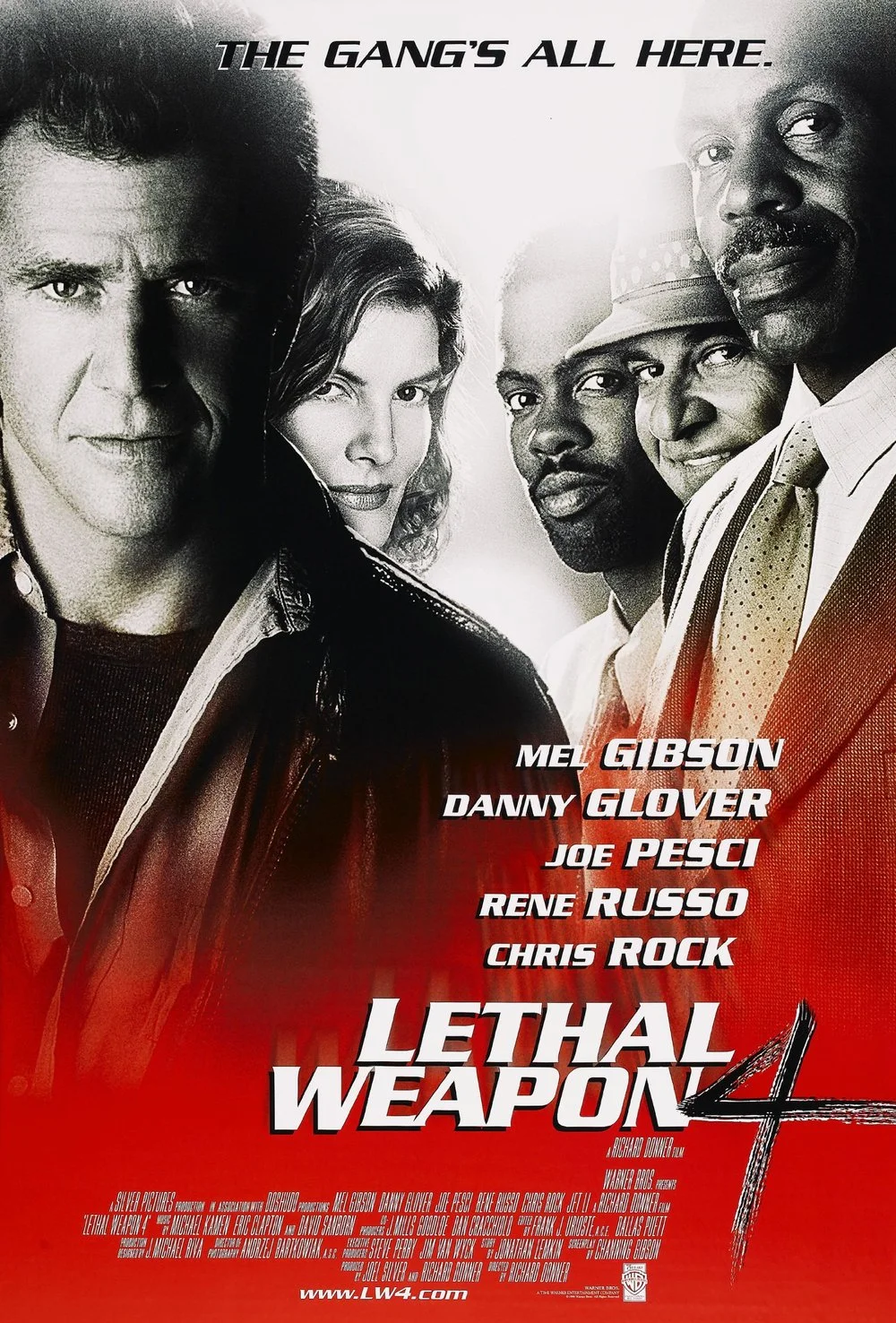
5/16:
Whatever you do, don't ever watch Lethal Weapon 4.
You'll end up hating it with passion. I notice something else: characters who survived the previous film will stay on for
the next one and also for the duration of the franchise. In Lethal Weapon 4, the cast has gotten so bloated that
Richard Donner is still addicted to having more on board. Even the movie poster looks crowded.
Nothing works. Gone is Mel Gibson's trademark mullet haircut. Why Chris Rock? Who the fuck finds him funny? Get rid
of Rene Russo, for Pete's sake. What's with the kung fu crap? My goodness...the horrible acting, it's like watching a movie
from the 2010's.
All in all, the first two parts are masterpieces compared to Lethal Weapon 4.
Let's Make it Legal (1951)
Rate:
5
Viewed:
9/23
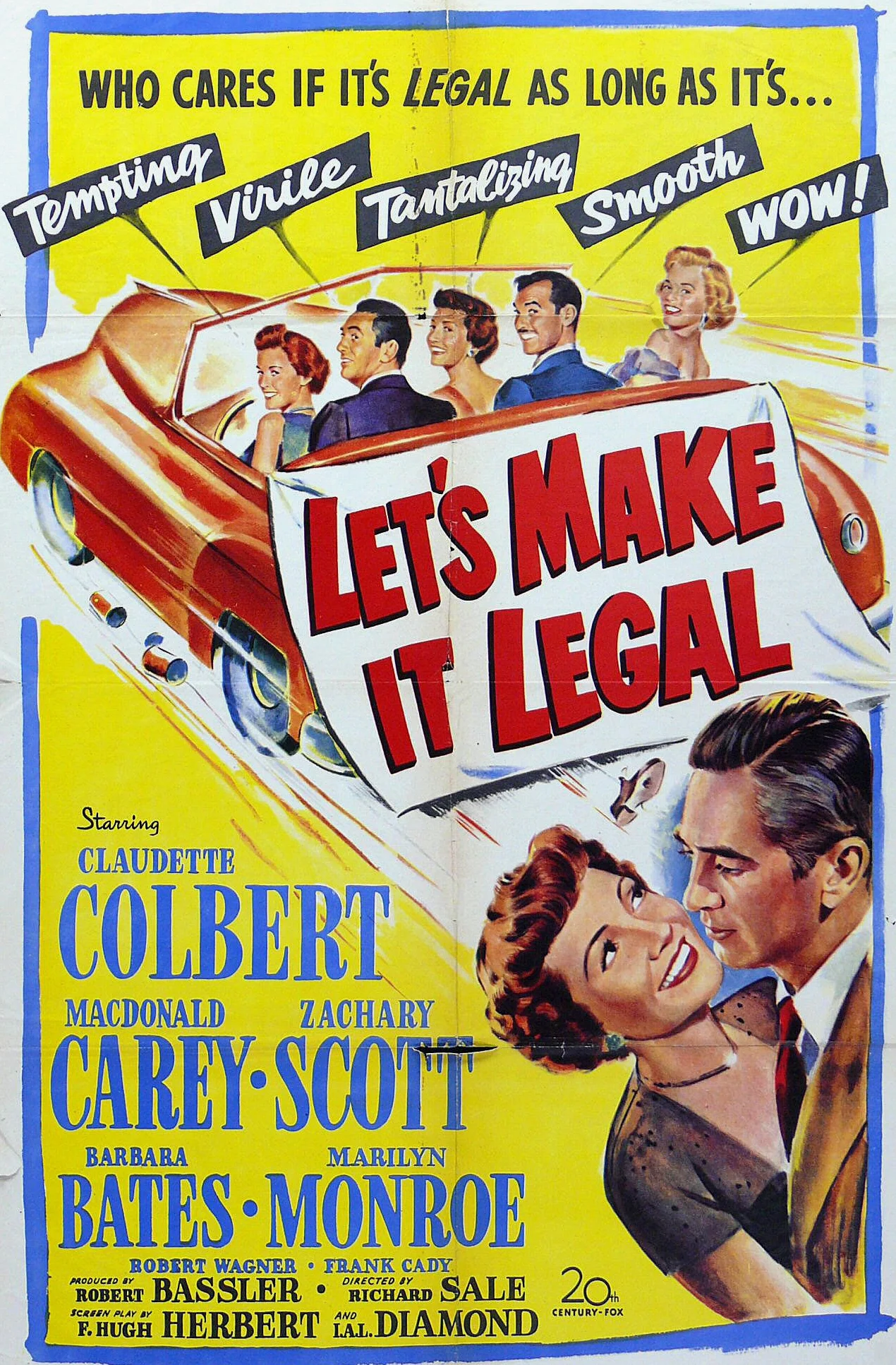
9/23:
Let's Make It Legal is a comedy?
Ha! It's more like a lightweight drama piece of crap. My eyes rolled when Hugh Halsworth said that he and Victor Macfarland
made a bet one day who would get Miriam and then Hugh married her right out of high school. Yeah, okay... this means they
should be equal in age, but Claudette Colbert looks halfway old enough to be Zachary Scott's mother (they were actually eleven
years apart).
Of course, divorce is dangled in front of my eyes throughout, but Hugh and Miriam eventually get back together,
laughing everything off as if it's another day in their lives. It still doesn't change the fact that he's a gambling
addict. At least, the writing is good, setting for a lively pace, although the story is not interesting to follow.
The cast is strong with well-done performances coming from Claudette Colbert, Macdonald Carey, Zachary Scott, and Robert
Wagner. I hate Barbara Bates' whiny, useless character. How about her doing something for a change? I wonder why she and Jerry
were married in the first place; this is the one that will head for divorce someday. If it makes you feel better,
Barbara Bates killed herself at age 43.
All in all, you know the movie is a dud when the leading man is more interested in having enough fertilizer for his rose
bushes than anything else.
Let's Scare Jessica to Death (1971)
Rate:
3
Viewed:
5/20
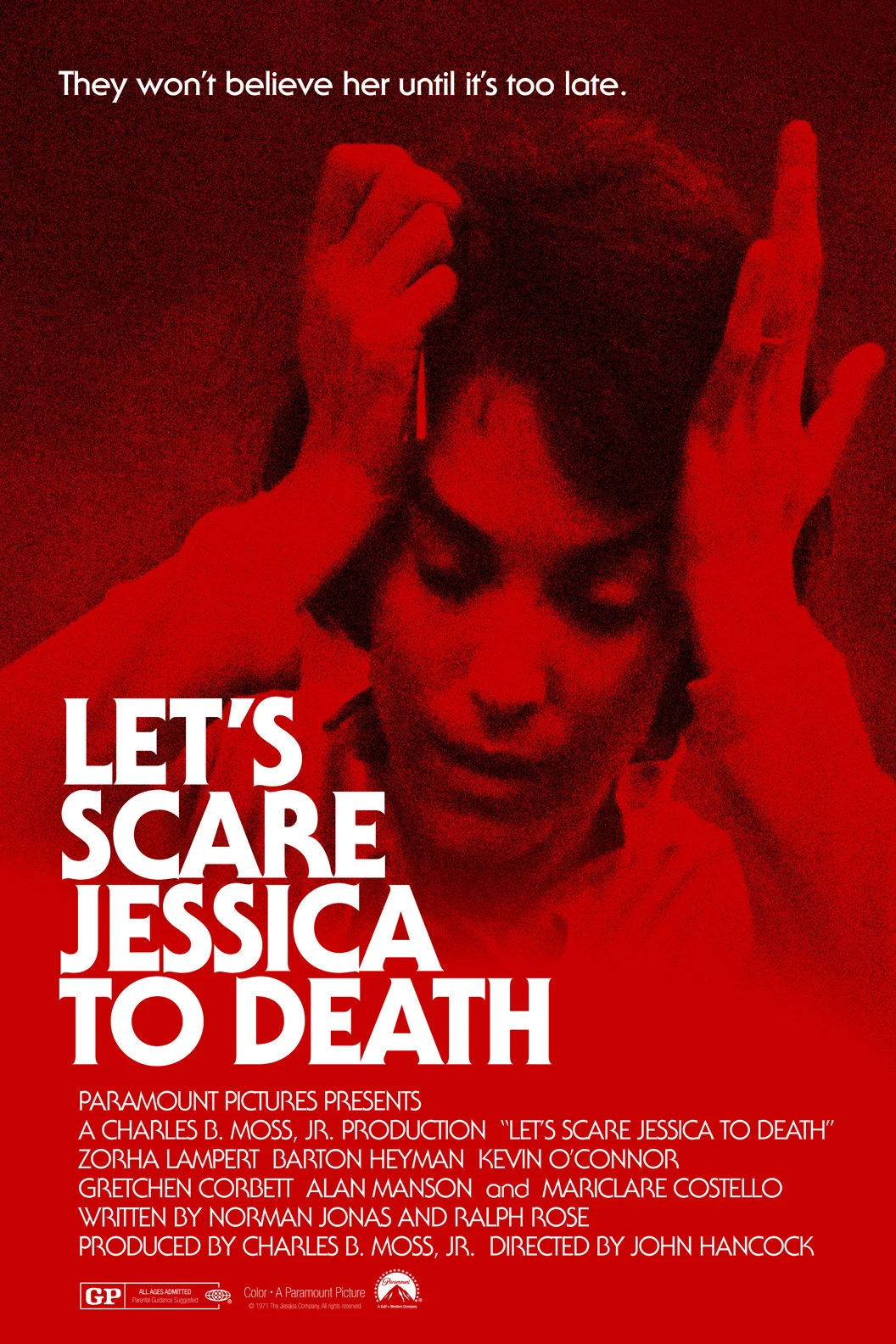
5/20:
The title is incorrect as it should be Let's Bore Everybody to Death.
Nothing much happens. There's a weak scare here and there. The rest of the time, characters are being themselves
while failing to realize the hippie movement has already ended. At one point, they throw in a corny but
redundant séance.
Despite the running length of 88 minutes, the pace is slow, forcing me to take long breaks. The cast is average,
having nothing to work with. Zohra Lampert (the movie poster misspells her first name) is weird by overacting
and grinning many times (perhaps it's a sign of mental illness?).
How can everybody be stupid? When I saw the old picture, I knew immediately that it was the same girl who scared
everybody when they first moved into the house. Yet it took Jessica a good while to figure this out. The last
ten minutes is basically a remake of Carnival of Souls with some random
vampirism thrown in.
Since I'm in the middle of the COVID-19 pandemic, Woody put on something that I can use right now: a respirator
mask. Does the fool know that pesticide causes cancer? When Woody came into the house and decided to have his
fun with Emily, he didn't bother to shower so he could wash everything off. Pretty gross. He even thought she's
beautiful, and I was like, "Um...no."
Built in 1875 with a later addition of an elaborate tower, the Piontkowski House still stands in Old Saybrook,
Connecticut. No one lives there anymore as it continues to be neglected and boarded up. The house can be had for
a cool $5.8 million along with the 124 acres, but it's more likely to face the wrecking ball. By the way, that's
not a mole but a field mouse; the difference is that the former has an elongated nose. Then again, these
characters are stupid.
All in all, you're better off watching
Burnt Offerings over Let's Bore Everybody to Death.
The Letter (1940)
Rate:
7
Viewed:
7/15

7/15:
The Letter is a good example of the film noir genre with superb performances by Bette Davis and James Stephenson
who would die of a heart attack not long afterwards.
However, the plot is unrealistic. At the beginning, I'm shown Leslie Crosbie firing her gun at Geoff Hammond and thus killing
him in cold blood. Then, she proceeds to tell an unbelievable story about how she was physically attacked by him to the point
of being raped. Yet her clothes happen to be in pristine condition. So, where's the evidence of a struggle?
Unsurprisingly, the jury acquitted Leslie of murder. I guess nobody has the faintest idea of how to conduct a solid police
investigation by following up on Crosbie's story. In an attempt to satisfy me, she has her weak but predictable comeuppance to end
the film.
All in all, The Letter isn't convincing just like its fake Malaysian scenery.
Letters from a Killer (1998)
Rate:
7
Viewed:
3/20
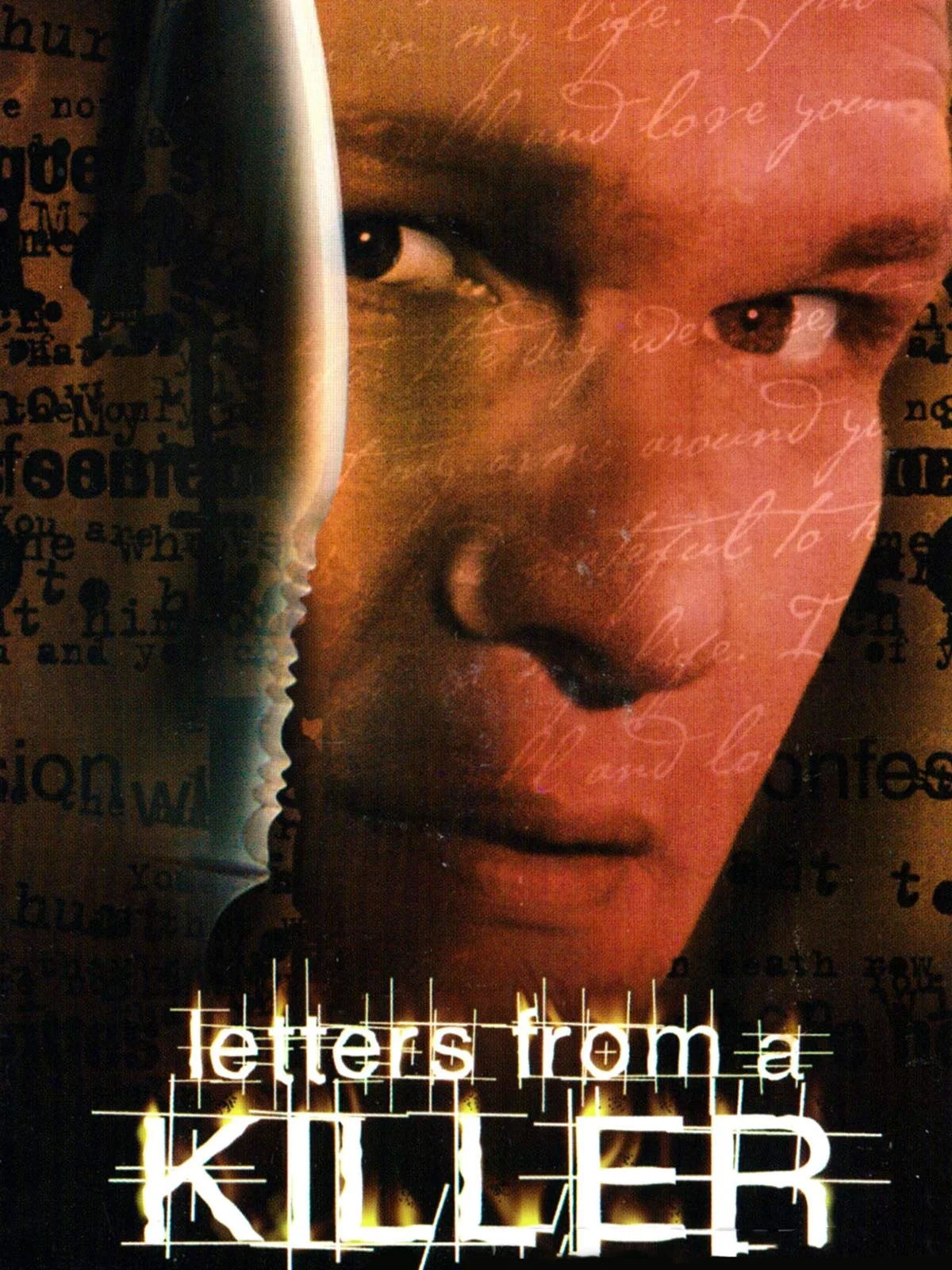
3/20:
When nearly everything fails, the final resort is to rely on acting.
That's the case with Letters from a Killer, which is one of the dumbest movies I've ever seen, yet the
cast has done a great job of pushing through it. They've kept me entertained from start to finish with a
cliffhanger ending.
It's not often that there exist clones of Jodie Foster (think of FBI trainee Clarice Starling in
The Silence of the Lambs) and Meryl Streep in the same picture.
Also included are Roger E. Mosley, who's well known to Magnum, P.I. fans,
and Bruce McGill who turns in a good performance as the FBI boss.
Stupid moments are aplenty, causing my eyes to roll. For starters, why did Lita keep Race Darnell in the dark
about what's going on in order to prevent any confusion at the end? Had she done so, then Race wouldn't be
tossed out of the fast-moving car which should've resulted in broken bones. The mall setup by the FBI is terrible
and makes no sense in terms of apprehending the suspect.
Although Race is at fault, I have to say 80% of the blame should go to the two prison guards who switched
the tapes, setting off the chain of events. Then, I wonder how Race was going to break the news to the four women
he simultaneously had relationships with during his incarceration.
By the way, why is the movie called Letters from a Killer when the method of communication has been
through cassette tapes? If Patrick Swayze looks less than 100%, it's because he broke both of his legs during
a horseriding accident, tearing four tendons in his shoulder, which delayed the filming for two months. It may
explain why he stopped being a bankable actor afterwards.
All in all, like Shattered with Tom Berenger, Letters from a Killer
is a dumb movie but works well, thanks to the interesting elements.
Letyat zhuravli (1957)
Rate:
10
Viewed:
1/08, 11/19
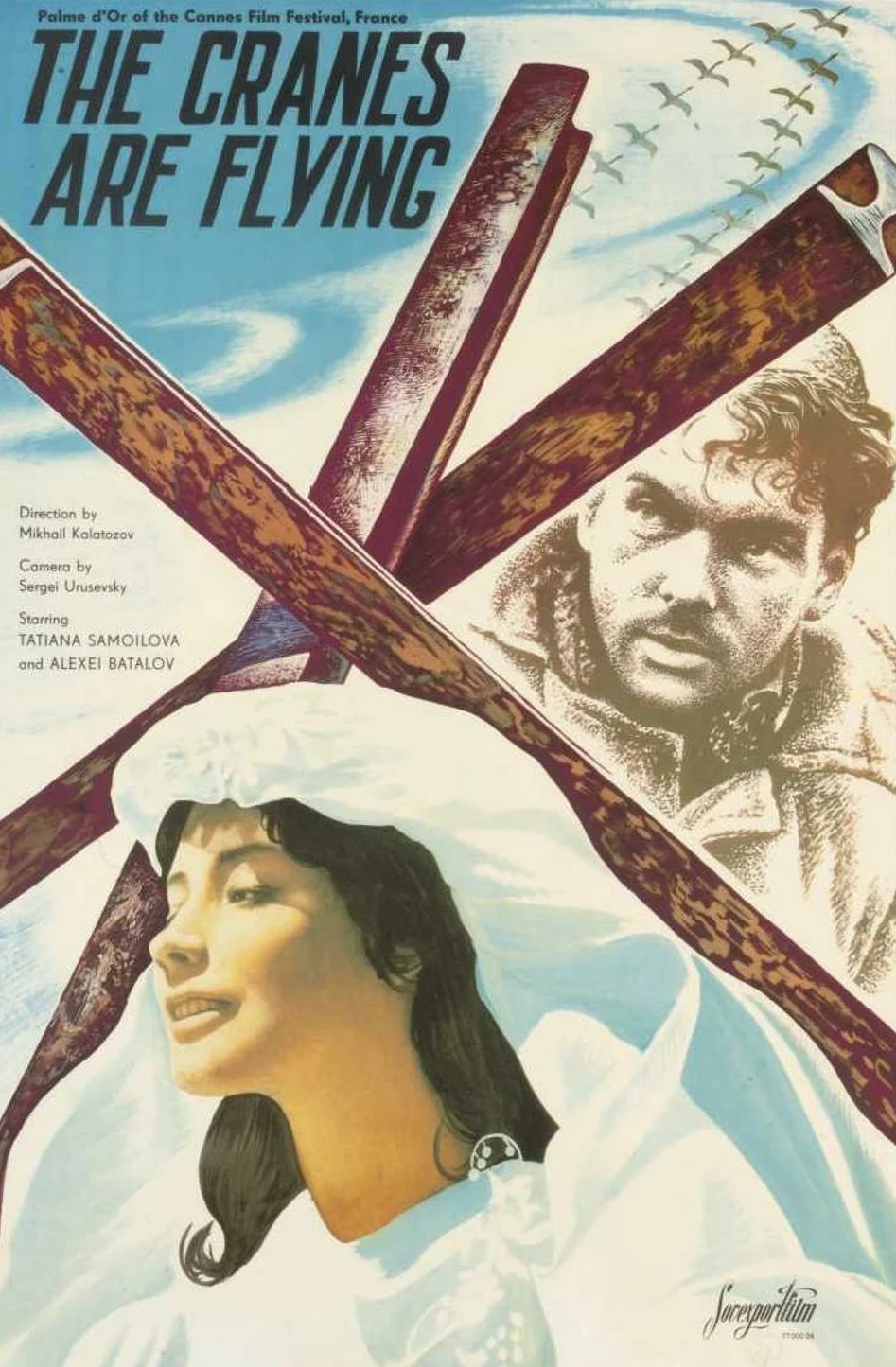
1/08:
Letyat zhuravli, which is translated as The Cranes Are Flying, elicits a mixed bag of feelings from me.
From a technical standpoint, it's beautiful, raw, and uninhibited. On the other hand, the story is confusing,
and the pace can be tediously slow at times. When it moves along, the film is alive, and then it slows
down, creating a lull. It'll be like this in a back-and-forth manner which is a constant problem throughout.
The acting isn't bad. Thanks to the lovely black-and-white cinematography, the beautiful Tatiana Samoilova, whose
acting career was largely ruined by the Soviet Union's restrictions on her life, steals the show whenever she
appears. A letdown is the weak chemistry between her and Aleksey Batalov's characters. It undermines the film as a
whole, but the ending, how it's done, is enough for me to overlook the problem. I just need to accept the fact that they
probably didn't know each other well enough.
All in all, The Cranes Are Flying is technically beautiful, and I need to see it again later.
11/19:
There's no doubt that Russia had its own Audrey Hepburn, and her name was Tatiana Samoilova.
Her most famous performance is given in Letyat zhuravli, otherwise known as The Cranes Are Flying. Highly
romantic, it's one of the prettiest pictures made with unique shots. Whenever Tatiana appears, she enhances the visually
striking black-and-white cinematography.
My opinion is better this time around by seeing it as a complete film about a young couple in love who are torn apart
forever by war after not getting the chance to say a final goodbye to each other. Now, that's sad.
All in all, The Cranes Are Flying showcases what the power of cinematography can do for a film.
Lianna (1983)
Rate:
9
Viewed:
12/17
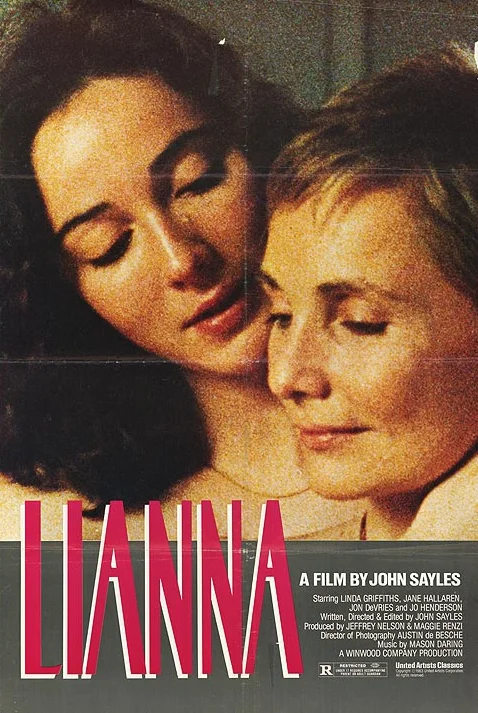
12/17:
Forget Personal Best; you should see Lianna instead.
It's the second film of John Sayles' directorial career which is every bit as good as
Return of the Secaucus 7.
What makes his pictures exemplary is that he has a good understanding of human beings and how they handle
relationships. The dialogue is always easy to listen to unlike Woody Allen's films.
Lianna is about a woman who cheats on her husband by engaging in a lesbian affair, has self-discovery, and feels liberated
as a result. It actually sounds like Henrik Ibsen's A Doll House, and there are similarities between these two.
Wonderful are the acting performances. The standouts are Linda Griffiths (who died of breast cancer in 2014 at age 57
and was the better version of Joan Cusack), Jane Hallaren, and John Sayles. My favorite line is "Just because you can argue
better doesn't mean you are right." Don't blink, or you'll miss him: Chris Elliott makes his feature film debut as the
lighting assistant.
All in all, Lianna is a fine film by John Sayles.
Liar Liar (1997)
Rate:
9
Viewed:
7/04, 4/25
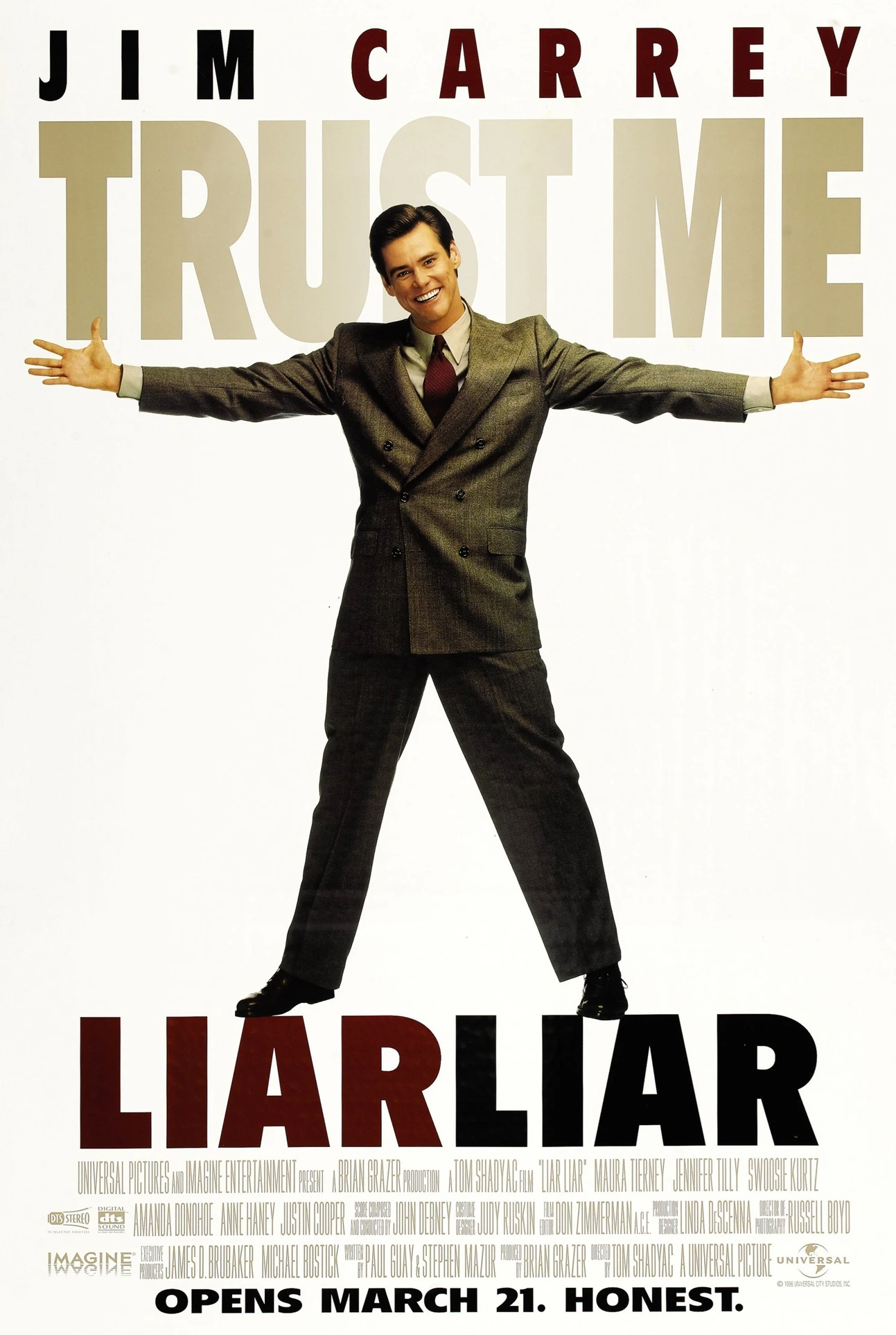
4/25:
The best film by Jim Carrey?
Maybe. Liar Liar is quite funny. Imagine a normal actor playing the same role. The results would've been
totally different, losing so much of the spontaneity that could only be generated by Jim Carrey. Just look at
Cary Elwes trying to do "The Claw." Jim Carrey called it among the most physically challenging acting jobs
of his career.
I'm also impressed with the story which is quality stuff; there's a moral involved in regard to lying all
the time. Funnily enough, when the son was asked by the teacher what his father did for a living, he said,
"He's...a liar." If you think about the word a bit more, it almost sounds like "lawyer."
If there's a number one problem among people, it's either lying or cheating. They're the same to me. Everybody
does it all the time including the president of the United States. They are always covering up things and
putting on a façade. Go to any social media page, and you'll see flaunts of their travels, cars, houses, kids, and
so on. What you'll never know is how broke they are, how much of their stuff are being paid on credit,
and the debt slavery they've trapped themselves into. The same can be said for their looks, jobs, or degrees
because you can't see how ugly they actually are, what they do, or how stupid they are. Now, imagine these
people laughing at Liar Liar when it's 100% true the other way around.
All in all, thanks to Jim Carrey, I prefer Liar Liar over Billy Liar.
The Libertine (2004)
Rate:
6
Viewed:
8/07, 7/17

8/07:
The size of the words during the opening credits of The Libertine was so damn small that I could barely read them
on my 40" TV screen.
Ridiculous. Anyway, Johnny Depp gives an unusual performance as John Wilmot, second Earl of Rochester, but once again, fails to
achieve depth. It's always been Johnny Depp's biggest flaw, but I still enjoy his stuff, regardless.
The introduction is fantastic, and I love how the movie ends, especially when John Wilmot slowly faded out as he asked, "Do
you like me now? Do you...like me now?" Although the content is vulgar and tries hard to be witty, the screenplay is
well-penned. Of course, I can be fooled into thinking the writer, Stephen Jeffreys, plucked out some highly
recognizable fancy words while playing Scrabble.
Although Johnny Depp is the show, the cast, except for John Malkovich, can never keep up, lagging behind in terms
of naturalness, fluidity, and being in character. John Wilmot warned me from the outset that I might not like him. Well,
to be frank with you, it's impossible to dislike Johnny Depp which probably explains why the film didn't ultimately work. If
it was Tim Roth instead, then sure.
All in all, The Libertine has the feel of a 17th-18th century European novel and showcases another good Johnny Depp
performance but falls short in substance and depth.
7/17:
My rating remains the same for The Libertine.
Johnny Depp gives an outstanding performance, and this is an arena where he belongs: quirky independent pictures. His
introduction and finale are fantastic. However, the movie isn't great, and the dialogue is often incoherent and
purposeless. There's a lot of emphasis on the vulgar, undermining credibility. Yet the cinematography is
excellent by taking advantage of the heavy candle-lighting à la Barry Lyndon.
Instead of focusing on the story, I like to think of it as a "feeling" picture. It's where Johnny Depp excels the most. By the
way, congratulations to him for being awarded the "Most Offensive Male Character" by Women Film Critics Circle Awards. He certainly
deserved it despite his claims of wanting to be a female. Of the cast, only John Malkovich rises to the occasion.
Everybody else is merely okay.
Among Brian De Palma's favorite screen techniques is putting together two half strips as one to make sure both actors are
consistently in focus without regard to distance. The Libertine rejects it by taking advantage of the zoom effect
between two players. It's an interesting try which mostly succeeds.
All in all, Johnny Depp has grown a lot as an actor over the years, and The Libertine is a good measure of his progress
compared to his early stuff.
Licence to Kill (1989)
Rate:
3
Viewed:
12/11
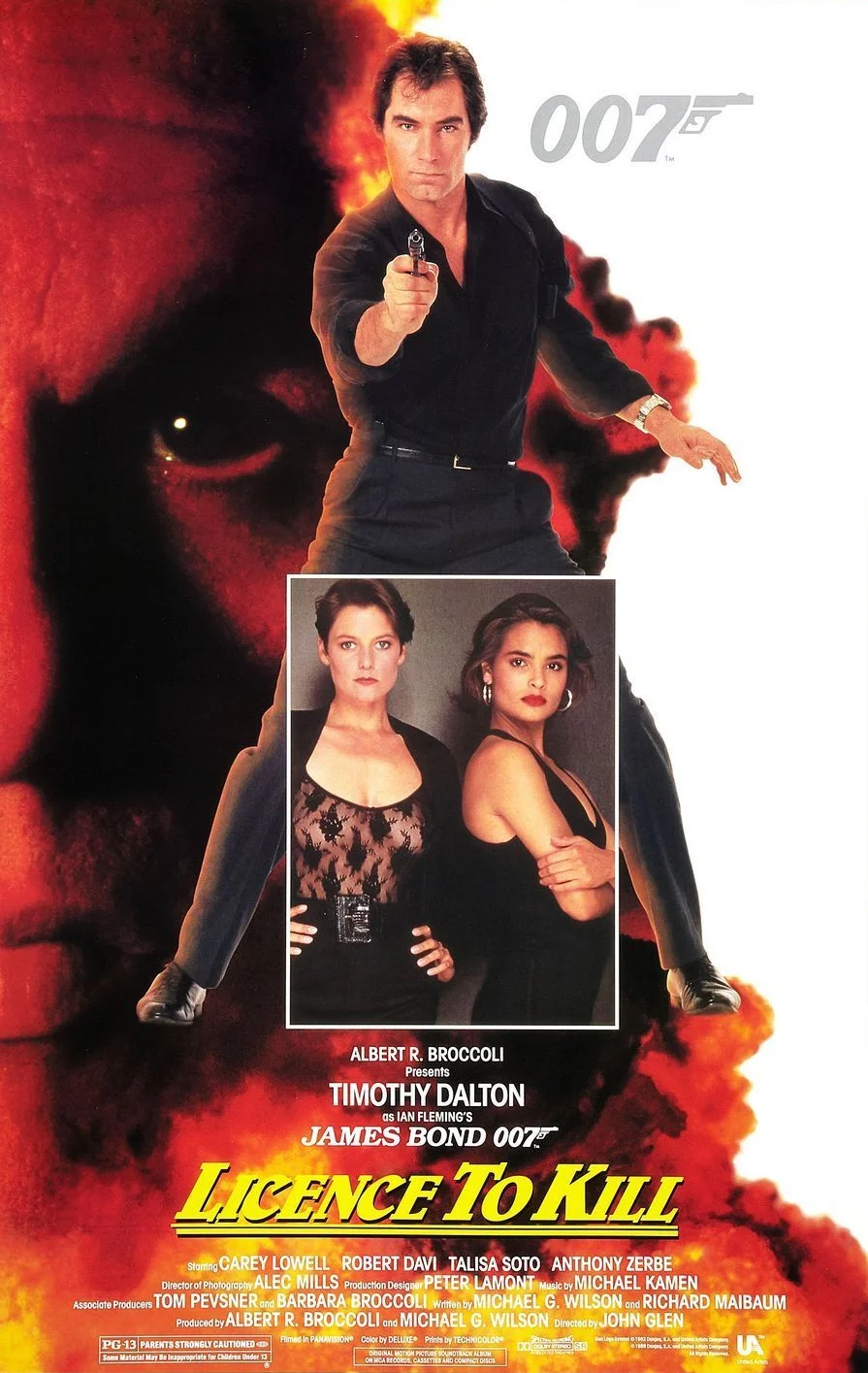
12/11:
In case if you're wondering about a possible misspelling in the title for Licence to Kill, the first word
is how it's written in the UK, and remember this is a British, not American, film.
Like the previous sequels, it's boring, flat, trite, and predictable. There's no pulse, either. I kept
looking at the clock, to count how many minutes to go, while telling myself, "Wow, this is a one long-ass film."
At certain points, Licence to Kill does have a nice pace, and when things are about to get interesting, it'll be marred
by a random, inexplicable scene. The worst moment is when James Bond caused a small fire in the chemical lab of
a major drug manufacturing center. I was thinking at that moment, "Hm, chemical lab...fire...chemical lab...fire...is it
typical? So, where are the sprinklers?" Yet the whole insanely huge compound is set ablaze.
Benicio del Toro has a tiny part, but he's the best thing going in the film. Unfortunately, he's not given the chance to do
much. Benicio del Toro would've made for a memorable Bond villain. This mistake proves once again how
dumb everybody is and why they keep making the same crap over and over.
Two women vie for James Bond's attention. Hmm, but does it matter? He always moves on with a new batch of
women in the next film and does the same shit again: woo, kiss, and use women for sex. That's why all
007 films are boring, flat, trite, and predictable.
Notice at the end when James Bond and his archenemy hung on to the rear of an oil tanker which eventually flipped over the
rocky cliff. It's amazing how they were able to survive with nary an injury. Ridiculous. If not left for
dead, nobody would've escaped it without suffering from hundreds of broken bones, slipping into a coma, and/or receiving
intensive medical care.
At the beginning, Felix's newlywed bride seemed to want to have fun with James Bond through some sort of an open relationship.
On the other hand, you have to be joking me that the man fed to the great white shark was still alive while recovering from an
amputated leg. I can never understand the point of James Bond. I mean, is he supposed to be working for his country? Or for
himself? Does he have ethics? Is he a robot or a goddamn professional poon hound? By the way, Talisa Soto, who plays Lupe,
married Benjamin Bratt after divorcing Costas Mandylor while Carey Lowell married Richard Gere.
All in all, a disastrously bad James Bond picture, Licence to Kill is the end for Timothy Dalton.
License to Drive (1988)
Rate:
7
Viewed:
12/07, 10/13
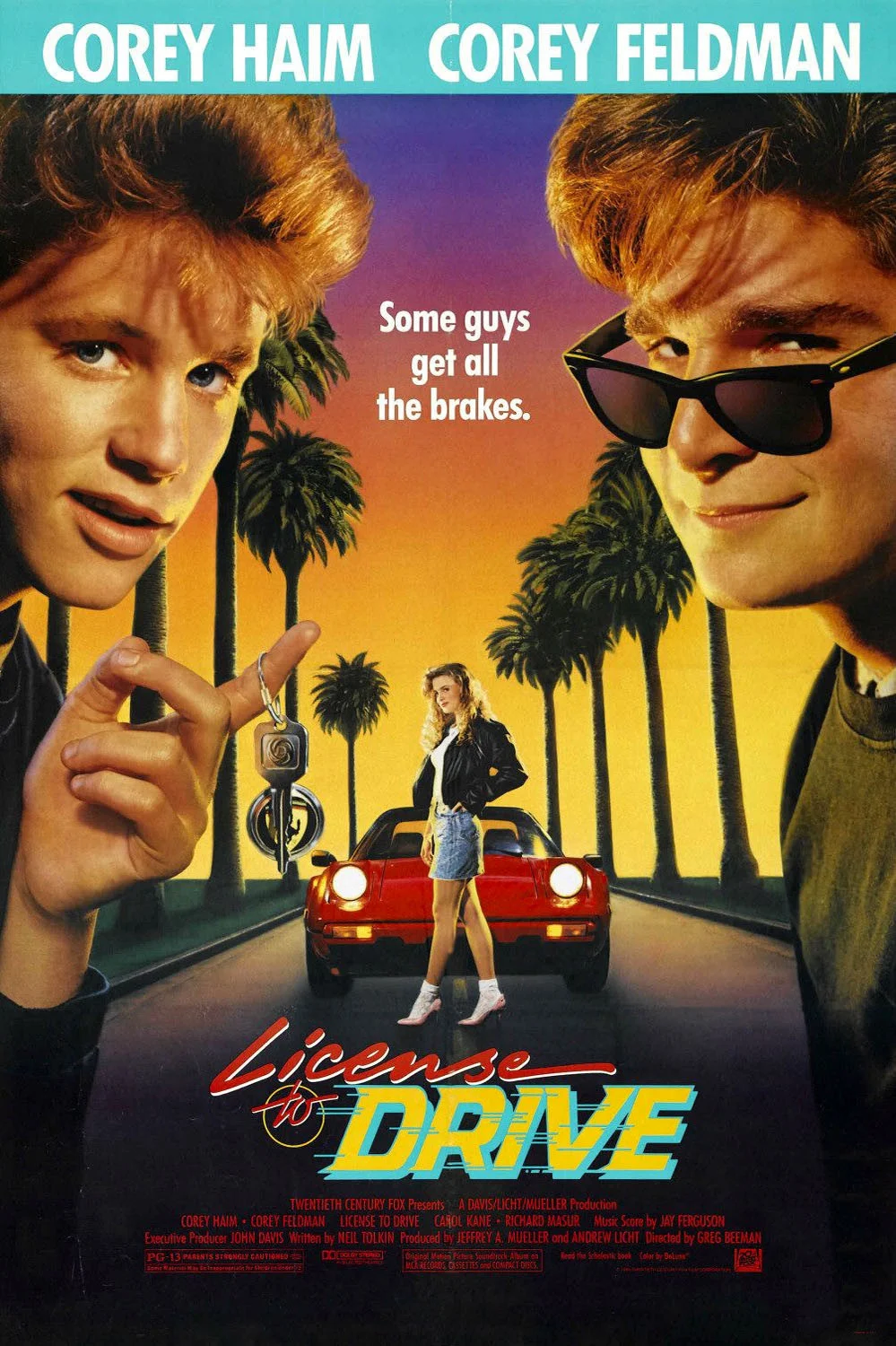
12/07:
Having seen License to Drive many times during the late 80's and early 90's, the film still stands the test
of time as an exceptional comedy.
Yes, it can be tacky in an 80's way, yet there are tons of energy to make for a great comedy. It also captures
a significant moment in a teenager's life of what it's like to get a driver's license. So, that's why
License to Drive will never be old.
Corey Haim is perfect for the role, and so are Corey Feldman and Heather Graham. Not much of credit is given to
Richard Masur, who plays the father of Les Anderson, for giving the best performance of the show.
All in all, great lines, humorous moments, and terrific performances make License to Drive a must-see 80's
picture.
10/13:
License to Drive is still a fun film to watch, yet I'm bringing the rating down from '8' to '7'.
The cast is good for this type of 80's comedy, and the concept is clever. Richard Masur and Corey Feldman are the
standouts as they elicit laughs from me easily.
All in all, don't leave home without having watched License to Drive.
Liebestraum (1991)
Rate:
8
Viewed:
8/20
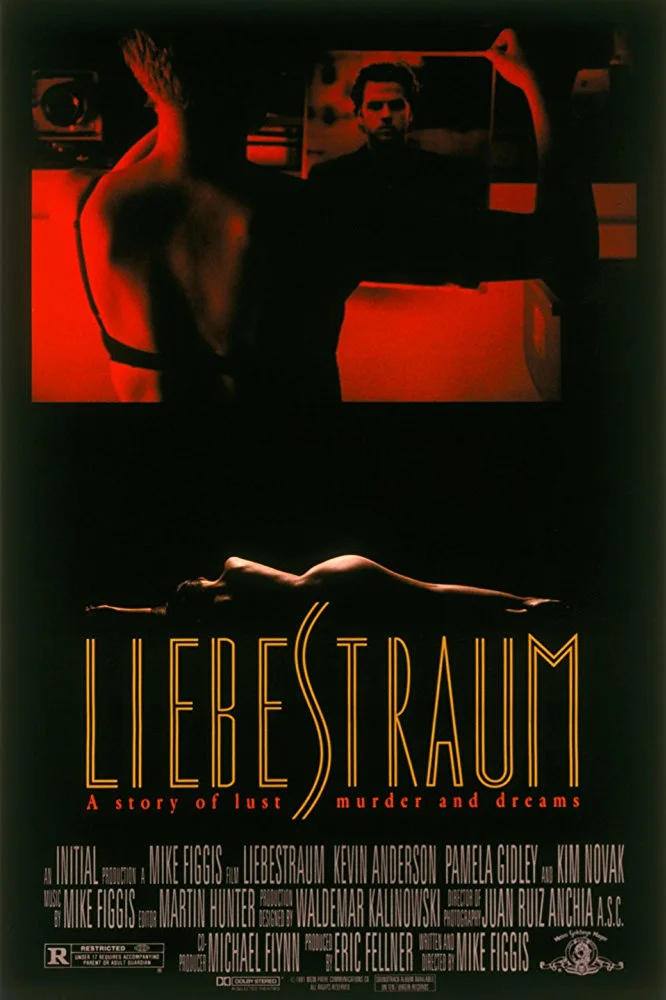
8/20:
From Mike Figgis, the director of Leaving Las Vegas, comes a
stylish neo-noir picture called Liebestraum.
Originally titled Liebesträume which is German for Dreams of Love, Franz Liszt's composition is
famous in the classical music world. It's used for the film's opening act. The rest of the show is filled
with haunting, dreamlike style and imagery until questions are finally answered with a bit of déjà vu thrown in.
Many times, I kept thinking of Mulholland Drive and how David Lynch
went too far by failing to make a point amidst the muddled nonsense. Figgis does me a favor of making sure the
mystery will be cleared up in the long run despite the anticlimactic ending.
It's an excellent performance by the bearded Kevin Anderson: very stylish and in sync with the mysterious theme.
Complementing him well is Pamela Gidley who provides sexy undertones. The supporting cast is, more or less,
full of red herrings. Once upon a time, Kim Novak was beautiful. In the final film role of her career, her
face looks intact, and I don't get why she had to ruin it years later.
The term "cast-iron building" is mentioned a lot. Popular during the middle of the 19th century for its
efficiency and cost-effectiveness, they were constructed either entirely or in part with prefabricated cast-iron,
which is a strong type of iron, allowing it to span a great distance in order to include rooms with taller
ceilings and larger windows. The material was also used for the building's façade, especially in Gothic,
Classical, or Italianate design. Eventually, modern steel and concrete took over, obsoleting cast-iron for good.
There are two ways to identify it: (1) Cast-iron is the only building material that magnets can stick to; and (2)
Designs for the façade are sectionally affixed by nuts and bolts.
All in all, Mike Figgis should be doing more films like Liebestraum and
Leaving Las Vegas but not crap
like Hotel.
Life of Brian (1979)
Rate:
1
Viewed:
3/09
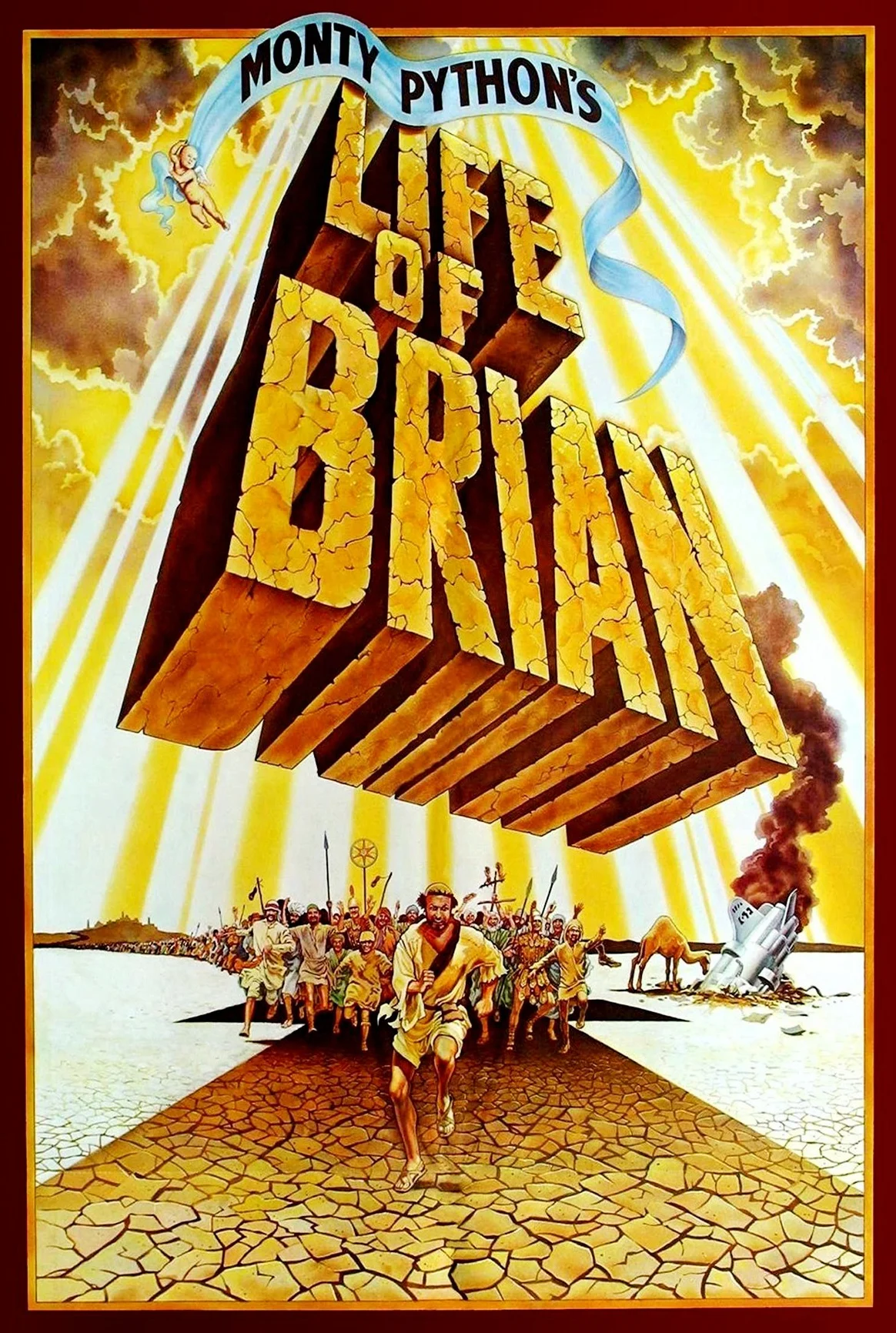
3/09:
*yawn* Uh, check please...
Is it me, or is Eric Idle all over the place in Life of Brian? I have a good sense of humor, knowing what's funny and
what's not. But this isn't what I call a comedy movie.
After beginning the show, I waited a long time to laugh. At the half-hour mark, I fell asleep. At the hour mark,
I was gasping for air. At the 70th minute mark, I was counting sheep. At the 80th minute mark, my mind died from the medieval
torture. At the 90th minute mark, I was left practically dead.
All in all, Life of Brian is among the worst pictures I've ever seen.
The Life of Emile Zola (1937)
Rate:
9
Viewed:
2/16, 3/22

2/16:
The Daniel Day-Lewis of his time, Paul Muni was one of the greatest actors ever lived.
He starred in only twenty-three films before retiring early due to health problems. When Paul Muni played a
character, he became the character, having done exactly that for The Life of Emile Zola.
The Dreyfus affair is the most notorious scandal in France history which stained its credibility forever. Émile Zola
was the hero of the case, putting his reputation on the line by questioning French officials' handling of the case in
order to save the military's face. Alfred Dreyfus was chosen as the fall guy mainly because he was, which is
unfortunately not mentioned in the film, a Jewish.
Naturally, the story is powerful. As a result, The Life of Emile Zola was selected Best Picture winner
of 1938. Joseph Schildkraut won the Best Supporting Actor Oscar by playing Alfred Dreyfus. But it's Paul Muni, although
nominated for Best Actor, who stole the show. The Life of Emile Zola is the first film ever to receive at
least ten nominations, winning third for Best Adapted Screenplay.
All in all, The Life of Emile Zola is one of the all-time great classics with a moving story and a terrific Paul Muni
performance.
3/22:
Thanks to Paul Muni, The Life of Emile Zola is a powerful film about the Dreyfus affair that permanently stained
France's national honor.
The country made it worse by aiding and abetting Germans during the Holocaust which saw the death of roughly
75,000 French Jews. Unfortunately, the film doesn't touch antisemitism that much. It's actually the reason why the scandal
started. Émile Zola put his reputation on the line by publishing his opinion in the newspaper L'Aurore: "J'Accuse...!"
All in all, bolstered by his courtroom speech, Paul Muni should've won Best Actor Oscar for The Life of Emile Zola.
Lifeboat (1944)
Rate:
8
Viewed:
10/13
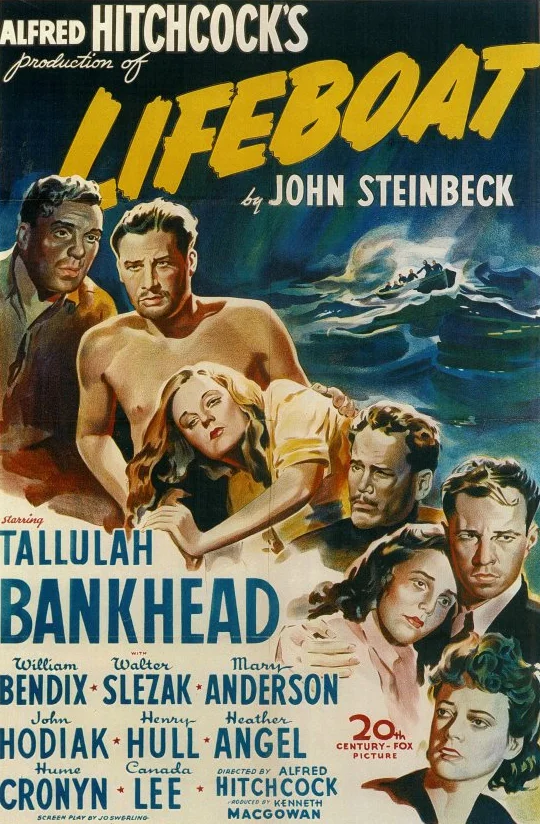
10/13:
Lifeboat is an unrealistic, melodramatic picture about stranded passengers on a lifeboat after the sinking of a ship.
Looking at the lifeboat, I can't believe the size of it. Everybody is snugly fit, too. To make things interesting,
a German has to be included with other American and English survivors. Then, to push the envelope further, he has
to be the bad guy just to reinforce a point. Things are made worse by the sight of Tallulah Bankhead who comes off as a
cheap floozy with mink coat.
As the days pass by, everybody still looks good. Nobody is sunburned. Nobody, except for one, is dehydrated. Nobody is
starving. Nobody's hair is messed up. Nobody's clothes are in a bad shape. Nobody's skin is dirty. I guess being stuck
in the middle of the ocean is no big deal after all. While at that, the ending is too much for me to take.
All in all, highly unrealistic, Lifeboat can be a good film if it's viewed from a certain perspective.
Lifeforce (1985)
Rate:
5
Viewed:
5/18

5/18:
Recovering from the disaster of not really having directed Poltergeist, Tobe Hooper tries again three years later
by taking the helm for Lifeforce, which is a mix of sci-fi and horror in the vein of
2001: A Space Odyssey, and the results are decidedly mixed.
For starters, when the heck did England get its own space center that's fitted with a rocket launch site? And why would NASA
be part of England's operations? It's a branch of the federal government in the United States.
The opening credits states: "And introducing Mathilda May." Perhaps "And introducing Mathilda May's nude body" would be
more appropriate, yes? I hate the hypocrisy that she's fully naked yet the filmmakers went great pains to cover
up the pubic region for all males.
Having spent $25 million and written at least eight drafts, Lifeforce went over schedule. It
ultimately grossed $11.6 million at the box office. Many scenes were either not filmed or cut out for failing to fit the
narrative. Hence, this disaster should've signaled the end of Tobe Hooper's career, but the studios continued to stay
stupid by allowing him to do three more films in the next five years including
The Texas Chainsaw Massacre 2.
Only dumb people will bring (English-speaking!) aliens to their spaceship, let alone the idea of entering Earth
with them. And never, ever do anything everybody takes for granted when coming across foreign bodies without established
procedures in place which will require a bunch of tests for safety reasons.
Despite being brilliant in Equus, Peter Firth didn't appear in much afterwards, so it's nice to see him
in a starring role for Lifeforce. He helped me stay awake to get through this snoozefest.
All in all, when a film like Lifeforce wants to spend a lot of time showing off a female's nude body, it's a signal
of the schlock that's to come.
The Lightship (1985)
Rate:
5
Viewed:
4/04, 3/25

3/25:
Which is weirder: the concept of lightships or Robert Duvall's acting?
Director Jerzy Skolimowski tried to make The Lightship appear deep, but it ultimately didn't work. The
first half has all the right elements only to be undone by Caspary's loquaciousness
about nothing. I agreed with the captain when he asked him, "Why do I have to listen to all this?"
Two things don't make sense to me. Since some, if not all, guys on the ship have military experience, why didn't
they take on the enemy? It's five versus two with Caspary not counting because he's weak. By the time they
surrendered their guns to Eugene and Eddie, the odds began to shift too much to them. The second is: where are
other ships in the vicinity? Is the film telling me that Hatteras is practically alone? I don't
think so.
For a while, it did look like Klaus Maria Brandauer and Robert Duvall were carrying the film without a problem.
Eventually, the former became ineffective while the latter grew ridiculous. On the other
hand, the boy's voice-over narration is too superficial to make a difference in terms of moral. The rest of the
cast is no better, either. At least, the crow was nice-looking before being senselessly killed by Eugene.
By the way, lightships used to act like lighthouses at sea. That's because either anything on land would've been too
far or the technology wasn't advanced enough to provide aid. These lightships never moved, and
the crew's job was to keep records of passing ships, to observe the weather, and to perform rescues once in a while.
The whole thing ceased in the United States on March 29, 1985, after 165 years of operation.
All in all, The Lightship should've ended by overpowering the bad guys from the get-go.
Lilies of the Field (1963)
Rate:
10
Viewed:
10/15, 5/19

10/15:
Sidney Poitier made history by becoming the first black person to win an Academy Award for Best Actor by
giving the performance of his career in Lilies of the Field.
In many ways, it's a bizarre cult film with a unique story about a black drifter stopping for water at a house
that's inhabited by five white German nuns in the middle of nowhere in Arizona and he's eventually conned by
them into building a chapel.
The reason why the film works is Sidney Poitier. He'll also cement his status as one of the best actors ever
in the history of motion pictures after appearing in A Patch of Blue,
In the Heat of the Night, and
Guess Who's Coming to Dinner because he makes a powerful
statement about the capabilities of a black man. He also has a great universal appeal. Lilia Skala's performance
as Mother Maria earned her an Oscar nomination by making for a memorable character. The rest are as good as
Lilia Skala.
In his autobiography The Measure of a Man, Sidney Poitier wrote that United Artists wanted to work with
director Ralph Nelson again. Nelson's first choice was Lilies of the Field, but the studio wasn't
interested in something soft. To make the deal happen, it begrudgingly gave him a budget of $240,000 for the
whole works. The cast rehearsed for a week, and everybody wrapped the filming up in thirteen days. And the
rest was history.
All in all, Lilies of the Field is moving.
5/19:
The script for Lilies of the Field was first given to Harry Belafonte, but he didn't want to be doing
a bizarre story that takes place in the middle of nowhere with five crazy white German nuns.
Um, okay....enter Sidney Poitier. Result: the first black Oscar winner of Best Actor, a feat that wouldn't be
duplicated for thirty-eight years when Denzel Washington won it for
Training Day. The Austrian Lilia Skala, who played Mother Superior of
the sisters, also received an Oscar nomination. Shot on location in Tucson, Arizona, for two weeks under a budget
of $240,000, Lilies of the Field is one of the great heartwarming human pictures made. It's difficult
seeing Sidney Poitier without five German nuns in the background.
All in all, all the credit is due to Ralph Nelson for making Lilies of the Field possible.
The Limey (1999)
Rate:
10
Viewed:
1/03, 6/03, 5/05, 10/10, 3/16
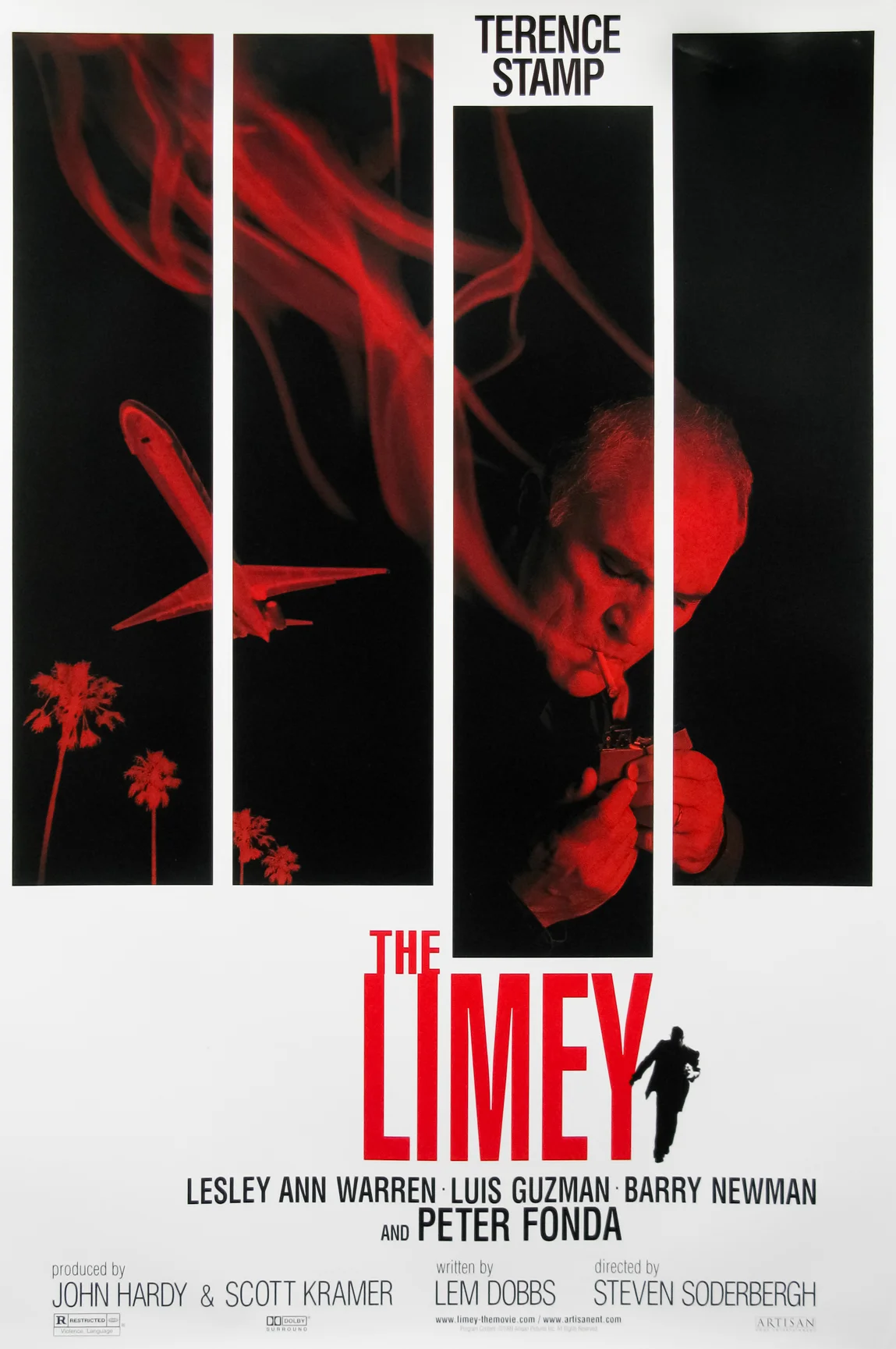
5/05:
The Limey is both style over substance and substance over style.
Terence Stamp is brilliant as Wilson. What a strong supporting cast: Peter Fonda, Luis Guzmán, Lesley Ann Warren,
Nicky Katt, Bill Duke, Joe Dallesandro, Barry Newman, and Amelia Heinle. They are all outstanding. It's Steven Soderbergh's
unique cinematic style that grabs me. I haven't seen a story that's nonlinearly told this well since
Pulp Fiction, thanks to Sarah Flack's editing job.
All in all, The Limey is an all-time great neo-noir picture.
10/10:
Most films will tell a story in a linear fashion which goes from point A to B before coming to a predictable ending.
In The Limey, it's anything but. The editing is unorthodox and thus innovative. Although it's disjointedly
told, the story is pieced together like a jigsaw puzzle. All over the film is a distinctive style that gives it a lasting
neo-noir stamp. Terence Stamp is perfect. So is everybody else.
All in all, The Limey is a neo-noir masterpiece.
3/16:
The Limey is a fine neo-noir thriller.
It's both style over substance and substance over style. That's why I consider Steven Soderbergh one of the most skilled
filmmakers. It's too bad that he sold himself out to do mainstream cinema. Had Steven Soderbergh stayed true, he
would've done more interesting films.
The first aspect that stands out the most is Sarah Flack's editing job. She should've been at least
nominated for an Oscar. It's not often that a story is told so well; the style is unorthodox, reminding
me of Jean-Luc Godard's famous jump cuts in À bout de souffle.
Brilliantly done is the inclusion of Poor Cow footage with Terence Stamp from 1967. Having Peter Fonda on board is
genius because of his Easy Rider connection. I also love the cast of Luis Guzmán, Lesley Ann Warren, Nicky Katt, Bill
Duke, Joe Dallesandro (who's a forgotten icon of Andy Warhol's era), Barry Newman of
Vanishing Point fame, and Amelia
Heinle. They are perfect and know there's an art to the characters they play.
All in all, I'll never get tired of watching The Limey over and over.
Lincoln (2012)
Rate:
5
Viewed:
10/23
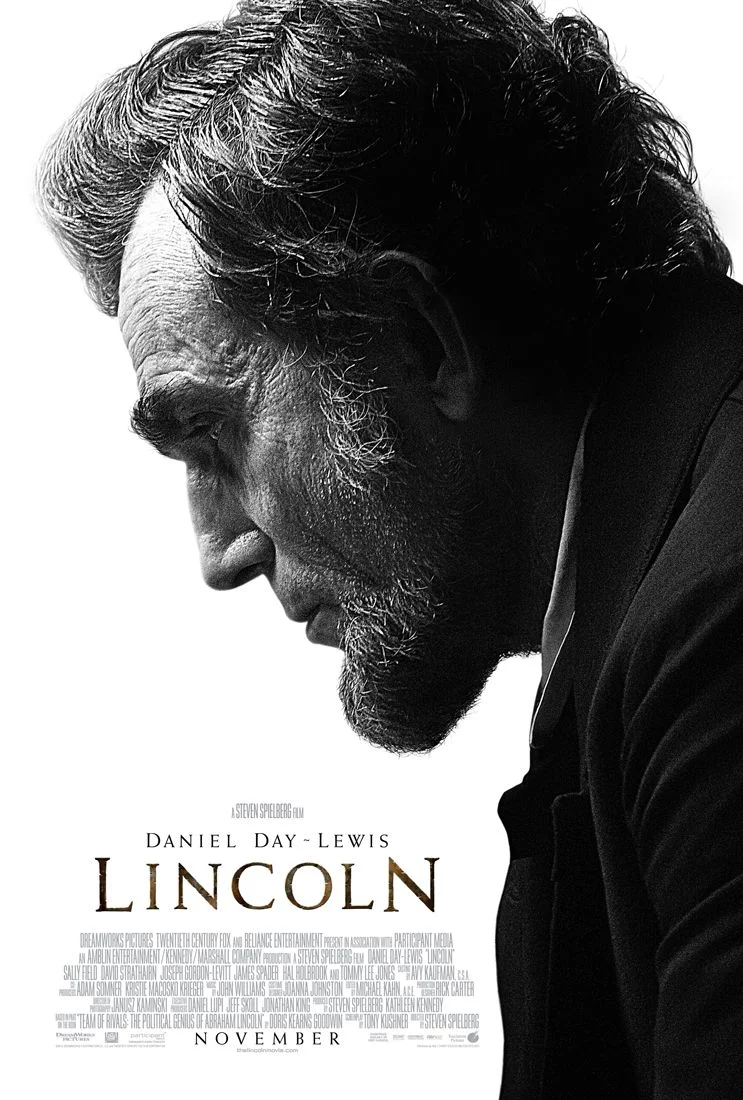
10/23:
Lincoln is a misleading title because it's all about the passage of the Thirteenth Amendment (no surprise there, hence
the overall lack of suspense).
That being said, it's a boring movie with an overrated performance by Daniel Day-Lewis. There's no reason to turn the
topic into a movie because I want to be entertained, not be bored by a series of torturous lectures which only belong in a
book. Like Amistad which was also directed by Steven Spielberg, I fell asleep plenty of times.
It's impossible for me to tell if any of the presented content is true. Wikipedia mentions, "The screenplay by Tony Kushner
was loosely based on Doris Kearns Goodwin's 2005 biography Team of Rivals: The Political Genius of Abraham Lincoln."
Loosely? Okay, there you have it. Some of the stuff was made up anyway: many characters weren't real, the names of people who
voted "no" had been changed, and there was no drama happening during the pivotal scene; paper ballot was the
method they used to tabulate the votes.
All in all, Lincoln is B-O-R-I-N-G and full of incomprehensible dialogue that could've been straightened out
by a more gifted writer than Tony Kushner.
The Lincoln Lawyer (2011)
Rate:
7
Viewed:
7/23
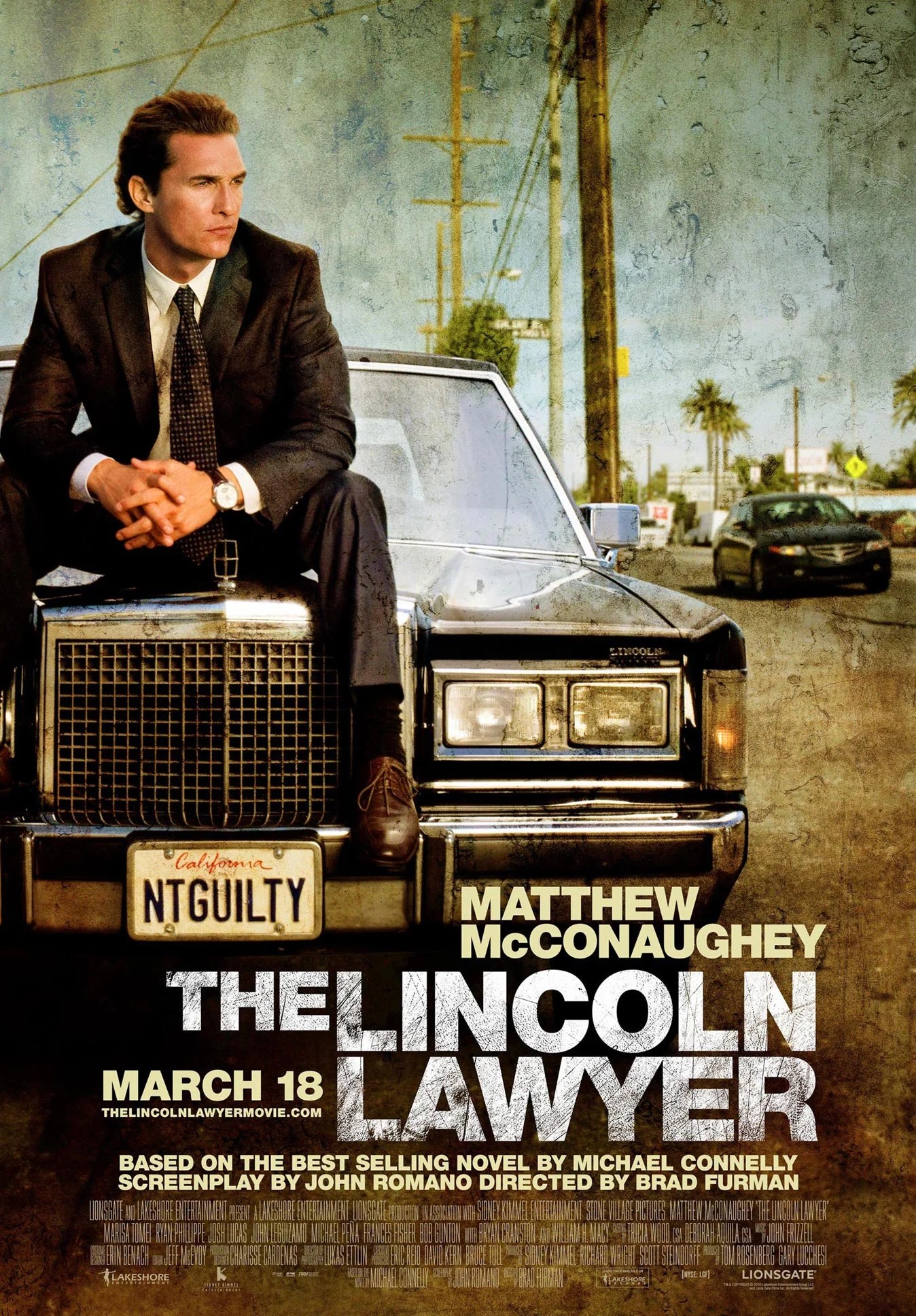
7/23:
Having played a lawyer before in A Time to Kill and Amistad, Matthew McConaughey is given a
stylized role for The Lincoln Lawyer.
Sans the lousy camera work, it's an enjoyable movie that's on the neo-noir side, but Mickey Haller has to stop drinking so
much. His judgment becomes more impaired every time he does. Of course, Ryan Phillippe is a dead giveaway as to what the
answer will be.
The oftener Mickey and his ex-wife are shown together, the more I wonder why they divorced in the first place. It's a
question that never got answered. Regardless, The Lincoln Lawyer is engaging due to alternative theories
until the plot has become too convoluted for its own good.
All in all, serious films like The Lincoln Lawyer prove why Matthew McConaughey wasted his time on romantic
comedies crap for a while.
The Lineup (1958)
Rate:
6
Viewed:
12/24
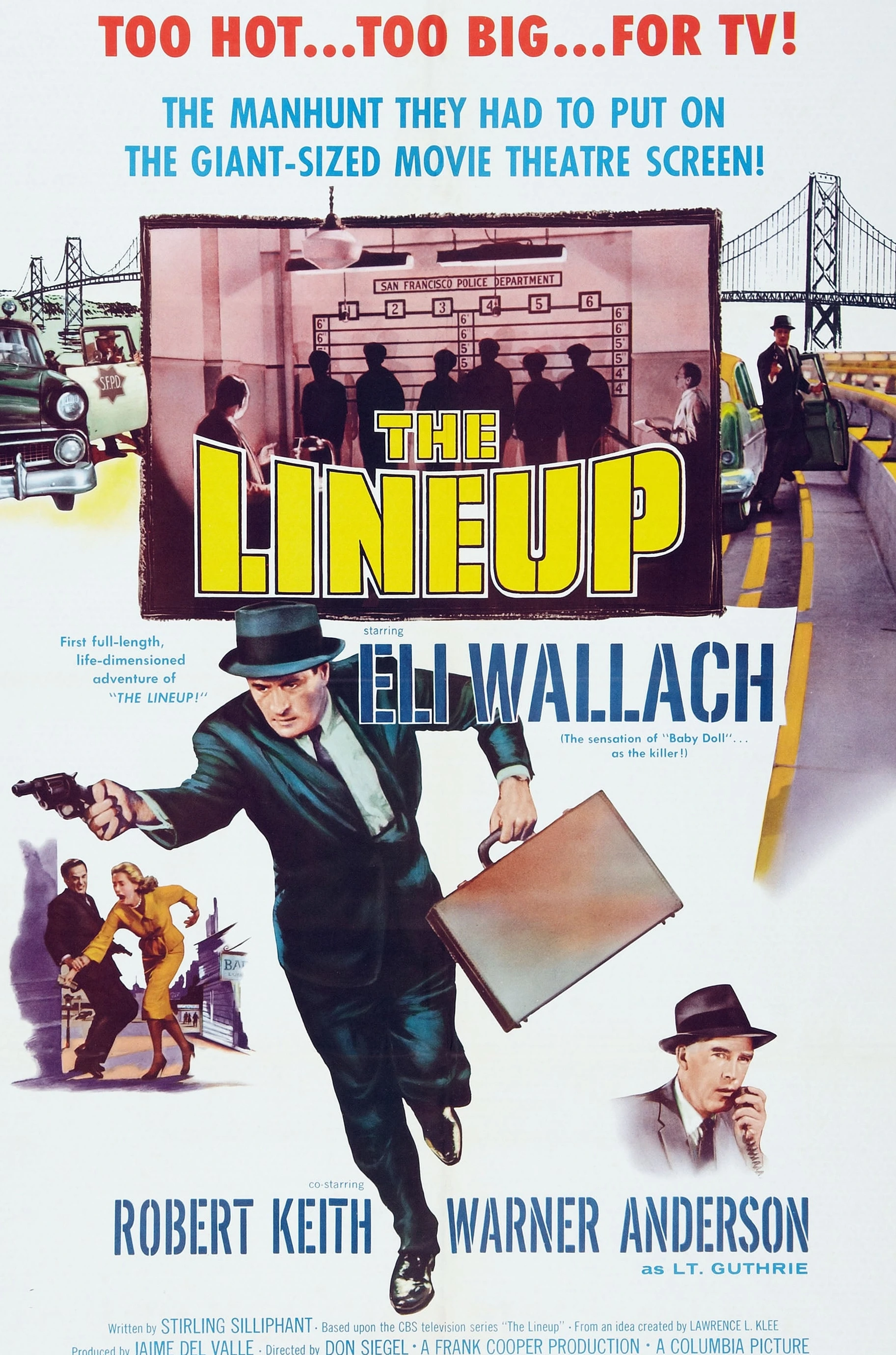
12/24:
For The Lineup, a spin-off from a popular TV series during the 50's, Eli Wallach plays the
worst operator ever in film noir history.
In fact, the title of the movie should be changed to The Worst Operator. If I were him, I
would stop dressing like somebody from the Outfit in Chicago. Otherwise, he stands out too much as if
there are people to kill.
At first, I thought it was me but ultimately decided "no." The plot makes no sense. Okay, why not get their
own mules instead of relying on unsuspecting people?!? It'll cut down most of the problems down the road. Eli
Wallach's character is sure dumb. Talk about leaving behind a trail for the cops to follow easily. Then again, he's
supposed to be psychopathic. Because of the heroin hidden in Asian artifacts, I wonder if the story was the basis of
Wait Until Dark.
Although not as good as The Naked City, The Lineup is a competent
film noir picture. Don Siegel was a good director back then, and he would revisit San Francisco for an even
better picture: Dirty Harry. It's also interesting because of the
Bullitt-esque car chase through the city. By the way, that was a 1957 Plymouth
Belvedere with a V8 engine.
Of course, so many locales are captured on screen for the much-needed character of San Francisco such as Steinhart
Aquarium, Sutro Baths (which was later turned into Ice Skate at Sutro's), Mark Hopkins Hotel, War Memorial Opera
House, Cliff House, Whittier Mansion, Coit Tower, Pier 41, the Embarcadero area including the YMCA as a stand-in
for Seaman's Club, and the Golden Gate Bridge. Some of them are no longer there today.
All in all, The Lineup may seem a run-of-the-mill black-and-white picture, but it's worth
watching to soak in what San Francisco used to look like in the 50's.
Lion of the Desert (1980)
Rate:
8
Viewed:
1/20

1/20:
Talk about a powerful film: Lion of the Desert.
Before there was the North Africa Campaign that made Erwin Rommel famous, the Italian troops tried to colonize Libya, but
somewhere in the middle of the desert, there was a twenty-year resistance that's successfully led by a Bedouin
named Omar Mukhtar whose nickname was "The Lion of the Desert." Thanks to General Rodolfo Graziani's strategies, he was
finally conquered and then hanged in 1931 at the age of 73. After killing nearly 100,000 Bedouins in concentration camps, Italy
relinquished control over Libya in 1947 through a peace treaty.
The producer of Halloween, Moustapha Akkad, had one goal in mind when he set out to direct an epic for
Lion of the Desert which involved thousands of extras, armored vehicles, and horses: present the events as they
happened with a high level of realism. It was all accomplished right in the middle of the Libyan desert.
Anthony Quinn is every bit spectacular as Omar Mukhtar and almost looks like him. It may be the greatest role of his career,
and he should've been Oscar-nominated. Yes, his presence in the desert reminds me too much of
Lawrence of Arabia, but this is a different movie and he's perfect for it.
There are also several more outstanding performances coming from Oliver Reed, Rod Steiger who's somewhat guilty of
overacting, and Raf Vallone. The greatest and most poignant moment is when Raf Vallone as Diodiece understood the gravity of
the situation after Omar Mukhtari was captured and treated like a common prisoner by the Italians when in fact it was a great
warrior they had in their possession. That's when Lion of the Desert transformed itself from a pretty good movie to an
outstanding motion picture.
All in all, Lion of the Desert may have lost $34 million, but it remains an important motion picture that's hopefully
seen by many to learn something about world history.
Lionheart (1990)
Rate:
7
Viewed:
8/05, 3/20, 9/21

8/05:
Before there was the Ultimate Fighting Championship, there was Lionheart.
I like the plot which is somewhat endearing although the acting is often average. Jean-Claude Van Damme may be the star,
but Harrison Page as Joshua steals the show.
Sadly, it's the fight sequences that kill the movie. Some of the guys throw shadow punches and kicks. The more times I see
them doing it, the more annoying the whole thing is. However, the battle locations are interesting which
take place on a tennis court, an underground parking lot, a drained pool, and a racquetball court.
All in all, I wish the fights looked more real in Lionheart.
3/20:
Lionheart is one of the better Jean-Claude Van Damme vehicles.
Believe it or not, the most memorable performance comes from Harrison Page who plays Joshua. He puts a lot of effort
into his character, and it works well. It's a surprise that he bet against Lyon for the final fight. I thought Joshua
believed too much in him to do the unthinkable.
Jean-Claude Van Damme is fair but seems to go through the motions. He has nice choreographed fights. On the other hand,
I like Deborah Rennard as Cynthia who's ruthless for a female and has a great sartorial taste. I thought Brian
Thompson would fight, but he's only a bodyguard. The actor who played Moustafa is Michel Qissi, and he was Tong Po in
Kickboxer. His brother, Abdel, is Attila.
All in all, Lionheart is enjoyable.
9/21:
Lionheart is still enjoyable with a terrific storyline.
It's sometimes slow-paced, but there's plenty of action. Lots of movies have tried to do the same thing, but this is the only
one that gets it right. Harrison Page and Deborah Rennard are excellent as Joshua and Cynthia, respectively. It's one of the
best performances by Jean-Claude Van Damme. He plays an interesting, likeable character with more depth than usual.
All in all, it's hard to go wrong with Lionheart.
Lions for Lambs (2007)
Rate:
3
Viewed:
6/08
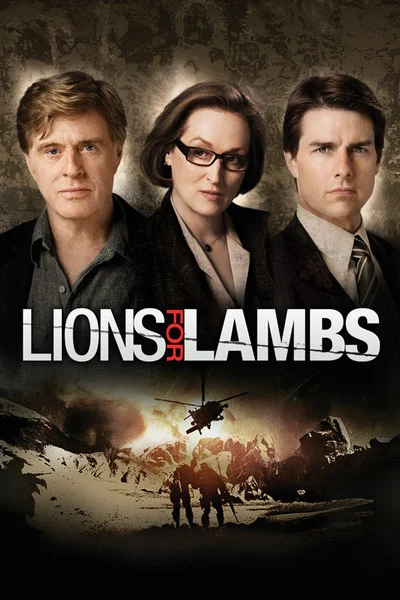
6/08:
Uh, mind telling me what was that all about?
Lions for Lambs is an ambitious picture that fails to connect with me. I could've stood up and screamed,
"Yes! I will save the world!" Actually, it reminds me of Network. What's the purpose of media nowadays?
They just advance crap which is loaded with made-up opinions. After the film ended, had things changed? Of course not.
Yeah, I get where Lions for Lambs is going, and I get the dialogue. But I don't follow the logic. It looks like I'm
made out to be a bad person for enjoying freedom. I like it that way and can't help it. I know the government sucks, the media
sucks, the people suck, and everything that's America sucks. In fact, shouldn't the title of the movie be called
Lambs for Lions? It'll make a lot of sense because sheep are being slaughtered by the rich people.
The conversations between the teacher and the student, they sound the same as my mother and I would have on politics which never
go anywhere. It's nothing but talk, and then we return to our lives. Sometimes, the film makes for a good viewing but falls
apart by causing me to feel that "uh..." moment. It's the lectures that I'm tired of because they're always hollow and meaningless.
All in all, Lions for Lambs is instantly forgettable.
Lipstick (1976)
Rate:
4
Viewed:
8/20

8/20:
Directed, written, and produced by myopic males, Lipstick is a manipulative rapeloitation picture with a capital R.
These guys want to turn it into a case of "he said, she said," but I'm more pissed off at them for making me think
what Gordon Stuart did to Chris can be easily accomplished with no physical injuries. It's impossible.
Let's replay the rape scene, shall we? Gordon throws Chris against the closet door, breaking it, and the edge of the
mattress. They should've left bruises across her back. Then, he proceeds to smack her head against the bed post several times
and the edge of the sink after throwing her in the bathroom. Both should've produced two large bumps: the first on the back of
her head and the second on her forehead.
During the rape, Chris patently showed no interest in sex, having been forced against her will; hence, there'll be an
unmistakable display of vaginal tears and anal fissures. Being tied on all fours to the bed post against her will should've
left marks on her ankles and wrists. Therefore, where were the medical examiners for witnesses in court?
In other words, there's too much physical evidence to indicate both assault and battery, along with rape, had occured. Yet the
movie attempts to force me to believe that Chris suffered no physical harm and wanted sex after all. Yeah, right. Had it been
realistic, Gordon didn't have a case and should be in prison for decades. However, the filmmakers want to go in
another direction, prompting me to give Lipstick a deserved rating of '4'. Of course, the ending
is I Spit on Your Grave all over again.
I've tried to give it the benefit of the doubt by looking at the strength of performances. The cast does a good job
of trying to make the material succeed. It's Margaux Hemingway's debut role, and her acting ranges from "not bad" to
"needs work." Fourteen years old and young-looking, the also-debuting Mariel Hemingway, Marguax's sister, gives a
decent but sometimes average performance and comes full circle by starring in Star 80.
At first, I was thinking, "What's Chris Sarandon doing in this by playing a good guy?" He never does that; how
things have quickly changed. Anne Bancroft's lawyer character goes too far in abusing the rape victim psychologically, but
she's superb during the courtroom scenes.
All in all, the filmmakers of Lipstick need to acquaint themselves with reality.
Lisa (1989)
Rate:
5
Viewed:
3/13

3/13:
Stupid is as stupid does.
It best describes the eponymous protagonist of Lisa. She should've died at the end, but the improbable, predictable
finish forbids it. To sum up Lisa, she's a stupid, spoiled brat.
For the most part, the film is fairly okay and has a nice pace. Back then, people used to receive in mail their
telephone bill monthly which included a list of phone numbers for incoming and outgoing calls. Hence, Richard would've
found out within a month, clearing up the mystery.
All in all, the ending for Lisa needs a redo.
The List of Adrian Messenger (1963)
Rate:
4
Viewed:
5/24
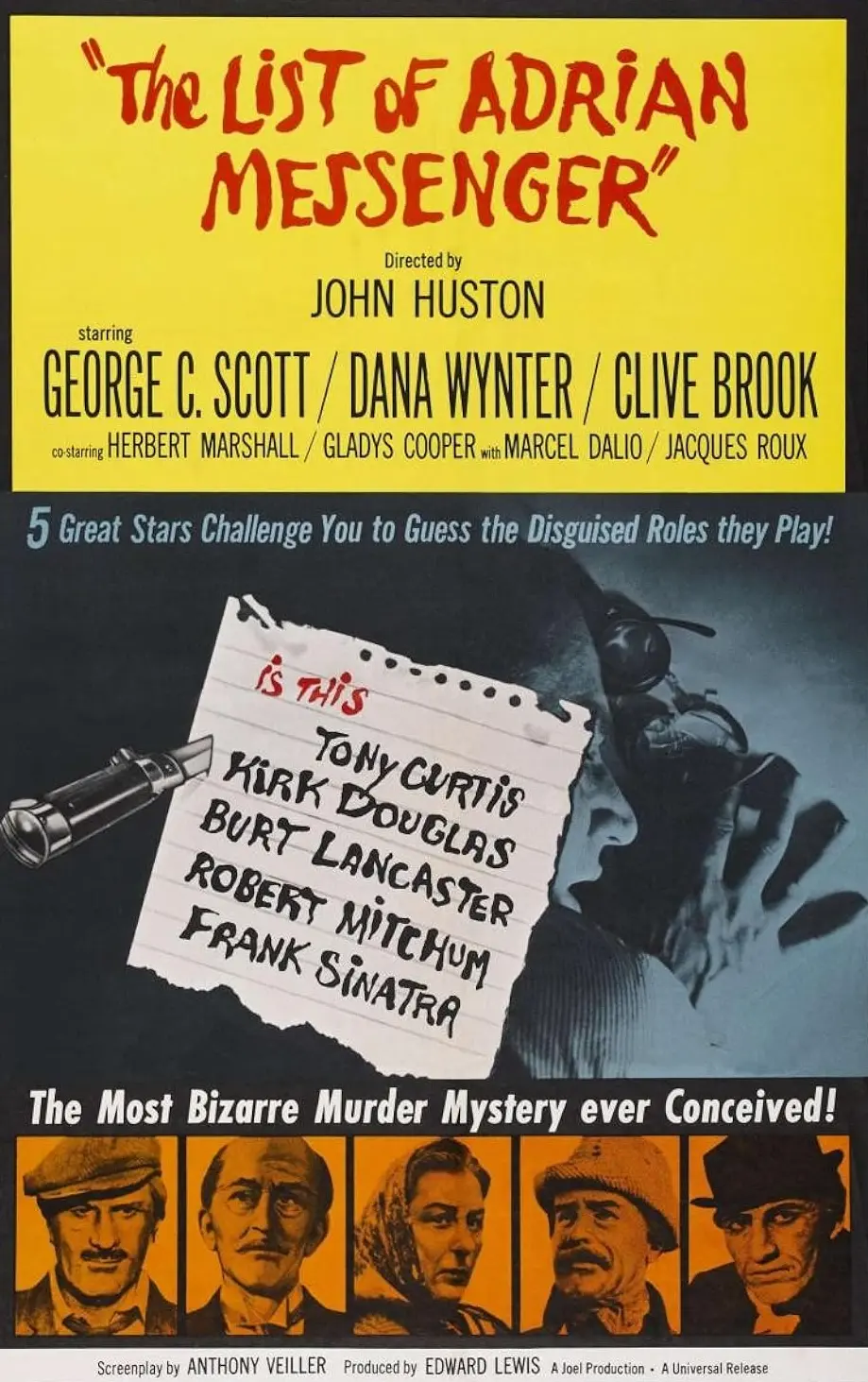
5/24:
Talk about a con job that was pulled on me.
On paper, the cast of The List of Adrian Messenger is impressive: George C. Scott, Kirk Douglas, Robert Mitchum,
Burt Lancaster, Frank Sinatra, and Tony Curtis. So, what happens? Only the first two show up as expected while the third has
a cameo appearance for a few minutes and the rest are purposefully absent until the end when they're all unmasked despite the fact that
some of them never appeared on screen for one second!
Oh, the mystery...it's a mystery, indeed, given that everybody had stopped caring about it halfway through or, rather, by the time Kirk
Douglas first showed up without a disguise. Thereafter, the movie is simply thrown away for the sake of über animal abuse, so
John Huston can have his fun with the fox hunting scenes on his estate in Ireland. After George C. Scott gets his man, the only
question that needed to be asked is: what do everybody else who are heavily disguised in makeup, sans Robert Mitchum's character,
have to do with the murders?
The clues are impossible, especially when it comes to the final words uttered by Adrian Messenger at sea ("manuscript"
for "photograph"?). I wondered if John Huston was making fun of Agatha Christie's stories on purpose. Le Borg shows great interest
in Jocelyn (Dana Wynter), but the romance subplot involving these two hardly materializes in the long run. If I thought the boy
was annoying, it turned out to be John Huston's son Tony. In the meantime, I have to say George C. Scott did a good job of
sustaining my interest despite the huge stretch to play a supposedly British character.
All in all, although a curio, the tagline of The List of Adrian Messenger should instead be: "The Biggest Waste-Of-Time
Murder Mystery Ever Conceived!"
Little Big Man (1970)
Rate:
6
Viewed:
6/07

6/07:
Prior to seeing Little Big Man, I expected another great Dustin Hoffman movie, but I got let down...big time.
What I got out of it is a story about a coward who witnessed many events. It's like watching
Forrest Gump all over again. So, why include Little Big Man, and why
should I sympathize with him? Why not cut him out and just focus on everything else?
The acting isn't bad, but the plot needs more work. What I don't like is the comical aspect. American Indians should
be portrayed more seriously. What's the purpose of the film after all? To lead me to the Battle of the
Little Bighorn, and that's it?
All in all, I prefer Dances With Wolves over Little Big Man.
Little Buddha (1993)
Rate:
5
Viewed:
5/13
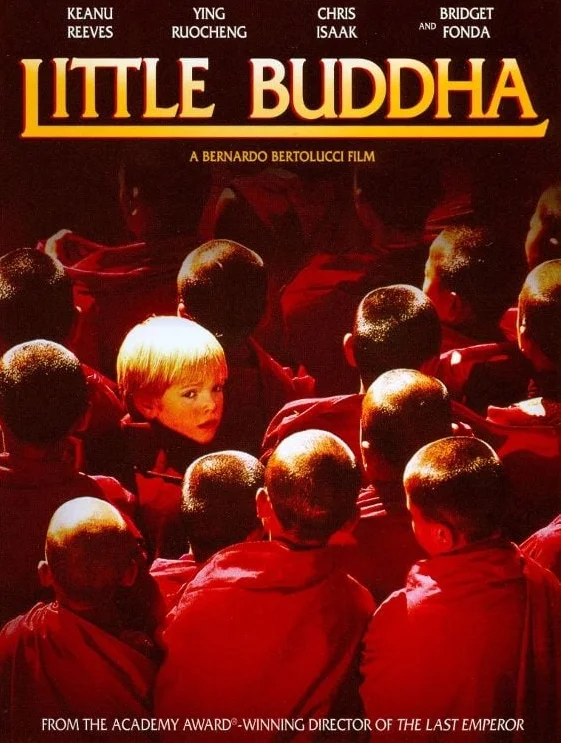
5/13:
I'm not sure why I hadn't heard of Little Buddha before until I came across it in Netflix.
Seeing that it failed at the box office, I thought Little Buddha was the kind of film that would do well given the
director was Bernardo Bertolucci. It was poorly reviewed because of Keanu Reeves. Historically, he's been the easiest piñata to
attack whenever a reason needs to be found. As many films as I've seen Keanu Reeves star in, he's an exceptional actor
who gives credible performances. But he's not the reason why Little Buddha didn't work. In fact, he has a minimal
amount of screen time.
On the other hand, the name "Bernardo Bertolucci" does mean film excellence. It's true while watching Little Buddha but
only on the surface. He recycles the same set of cinematic techniques from The Last Emperor but, this time, becomes overambitious
and thus loses control when it's clear the story is about three chosen kids who happen to be spoiled and undeserving. It's
comical when one of them is a white American kid which will never happen in the history of Buddhism.
Once the retelling of the story about Siddhartha fades away, there goes the film. The only reason why I decided on the
rating of '5' is the wonderful cinematography. Like I said, "Bernardo Bertolucci" does mean film excellence, and it also
means visionary genius through Vittorio Storaro. There are many shots that are amazing and unconventional. I haven't seen a
film that's photographed this way since The Last Emperor.
Although I have high praise for the cinematography, the truth is that the story had so little substance that I yearned for
the film to end early. It also leaves me wanting more information about the religion, the story, and the characters.
What is it that Little Buddha is trying to say? Why is there no sign of transformation within the white boy? What does
the trip to Nepal do for the father? What's that all about in regard to Evan? I think the mother should've went instead of
her husband because she seems more interested. Anyway, as bad as Bridget Fonda is in terms of acting, it's amusing
to see her trying keep up with the grand scheme of things by relying on her glasses as if it's a life preserver.
All in all, despite being overly ambitious, Little Buddha is worth watching for the cinematography alone.
Little Caesar (1931)
Rate:
2
Viewed:
10/08
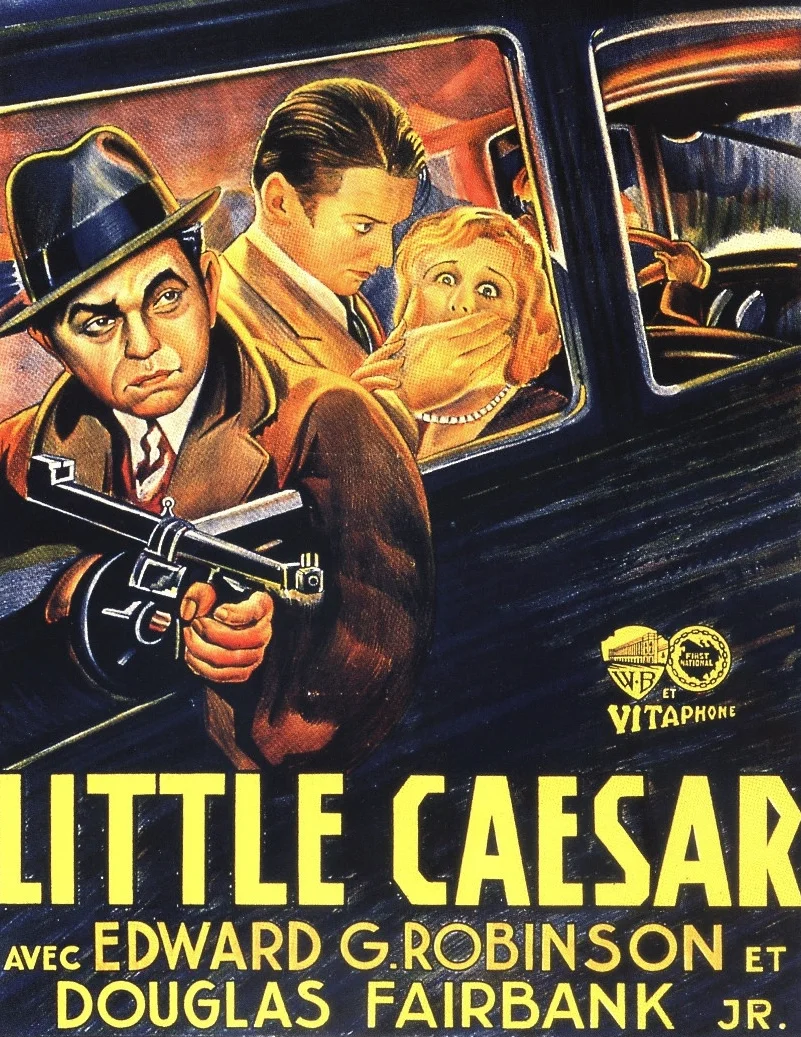
10/08:
Let's get one thing out of the way: Little Caesar, not Scarface with Paul Muni, is the original that
started the gangster genre.
It also put Edward G. Robinson on the map as his career took off, becoming one of the best actors during the 30's and 40's.
After hearing his character's name Rico so many times, I wondered if it was a labeling influence for a special act that
finally put gangsters away for life.
Anyway, Little Caesar is a slow and boring movie. There's not much of development in every scene as everybody
smokes cigars, drinks liquor, and chatters away. On the other hand, the performances are average.
Edward G. Robinson has been better in other films. Douglas Fairbanks, Jr., is terrible. I don't like the dialogue. It's like
trying to build a house without nails. In other words, the plot rarely advances. The truth is that Mervyn LeRoy had never been a
good director. I Am a Fugitive from a Chain Gang is the only exception of his career, and that's because Paul Muni
gave an outstanding performance.
All in all, Little Caesar is outdated today as compared to other gangster pictures of the time.
Little Fauss and Big Halsy (1970)
Rate:
1
Viewed:
7/25

7/25:
I've just seen the worst film of Robert Redford's career: Little Fauss and Big Halsy.
But what about Havana or
Up Close & Personal? No, this is worse. Yes, Robert Redford looks
gorgeous, and he's shirtless 75% of the time, but is that a reason enough to avoid the '1' rating? I have to
say no. His character has a broken back and yet is able to ride motorcycles full-on? Yeah, right. There are
other major issues that are impossible to overlook.
The first is pairing of Michael J. Pollard with Robert Redford. He sucks and doesn't belong in the film. What's
with his stupid glasses? I've never seen anybody wear them in my life. On the other hand, hadn't the powers
that be seen Butch Cassidy and the Sundance Kid?
Whatever the answer is, they should've kept watching it a dozen times more.
Next is the atrocious writing. Nothing the characters say makes sense. It's full of random talk. I had to check
out the internet to see who came up with this crap, and it turned out to be Charles Eastman. I said, "Not
familiar." When I proceeded to look over his tiny body of work, I was like, "No fucking surprise." This is
the same guy who produced one of the worst scripts ever in silver screen history for
Second-Hand Hearts. That movie has to be seen to believe which caused
millions and millions of dollars in losses. Paramount still refused to release it theatrically across the
country and prevented its availability in DVD until 2013. The other that met a similar fate is
The All-American Boy.
The third is the editing and the camera work. Both are consistently awful. I had no idea what's going on in any
of the motorcycle races. There's no way Robert Redford and Michael J. Pollard did the riding except for
the very easy, baby-like stuff. Anytime either actor is in a close-up with others in the background, that's
definitely a truck holding him.
All in all, there's no doubt that Steve McQueen, once upon a time, laughed at Robert Redford for
Little Fauss and Big Halsy and went on to do a far superior documentary film called
On Any Sunday.
Little Giants (1994)
Rate:
5
Viewed:
5/25

5/25:
The man...the myth...the legend: Al Bundy.
He once scored four touchdowns for Polk High in a city championship game against Andrew Johnson High. People
who were there that day would never forget. Decades later, Al Bundy brings his extensive football acumen to
Urbania, Ohio, to help a bunch of kids win a Pee-Wee championship.
Regardless, Little Giants is an all right movie that isn't on the same level as
The Sandlot with several strange parts. The child stars try too hard to be
the football version of The Bad News Bears and often come off looking
cheesy. Ed O'Neill is perfect while Rick Moranis is passable. The former actually played college football and
tried out for the Pittsburgh Steelers at the end of the 60's but failed to make the cut.
The girl who wasn't picked for the Cowboys wants to have a football team of her own. Along the way, she
falls in love with a boy, thinks about makeup and sex without kissing, and decides not to play for the Giants
anymore by becoming a cheerleader until the final two minutes of the important game. Talk about mixed-up
priorities. By the way, these Cowboys uniforms sure got super dirty in no time.
Oh, how about these NFL guys showing up: John Madden, Emmitt Smith, Bruce Smith, Tim Brown, and Steve Emtman?
When Emmitt Smith said, "I wasn't always the smartest," I thought, "Well...that's true." Steve Emtman getting
run over by the small fat kid with a Darth Vader helmet should explain why he went from the number one pick
overall to a total bust for the Indianapolis Colts. I wonder why Tim Brown didn't have something of his own
compared to the others.
Ah, yes...Spike. There's always one in every community. He usually flames out midway high school, having
accomplished little despite winning so many awards and state titles during elementary and middle schools. It's
called "living vicariously through his daddy's eyes." On the NFL level, the best example of this is Todd
Marinovich who became a drug addict and got arrested so frequently that it was a running joke for a long time.
All in all, it's simple to label what Little Giants is: a kid's movie.
Little Miss Sunshine (2006)
Rate:
6
Viewed:
6/17
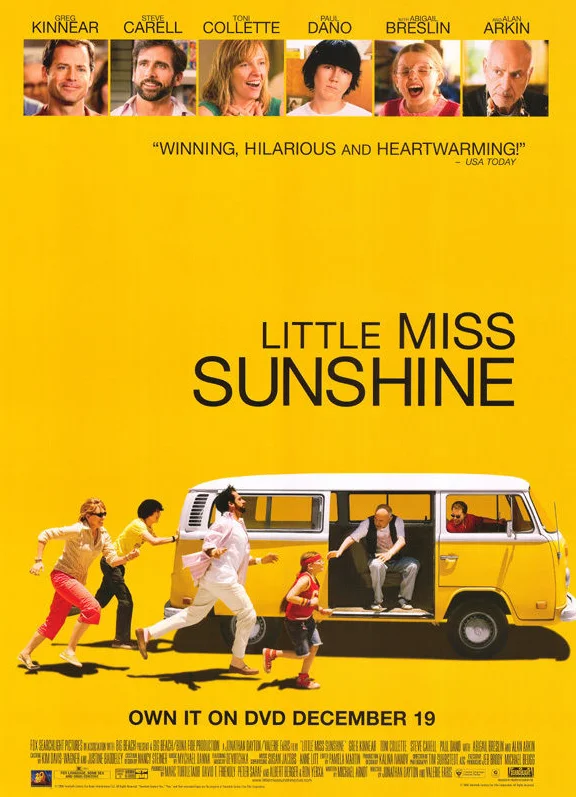
6/17:
While watching Little Miss Sunshine, all I could think of was how the filmmakers blatantly ripped off
National Lampoon's Vacation with a little bit from the third part.
It's about a dysfunctional family of father, mother, son, and daughter? Check. The father is a straight-arrow, maybe of the
slight corporate type who's always positive, no matter how bleak the situation is? Check. And his mind is on something
important that's work-related like a bonus check or a promotion? Check. The mother is down-to-earth and supportive? Check.
There's a weird, mess-up male relative in the family? Check
Somebody is mute? Check. They go on a road trip faraway, deeming the destination so important that the family has to do
everything to make it, no matter the cost, and the direction is to the west? Check. An old, ornery relative goes along
for the ride and dies during the trip? Check. And his body is placed somewhere weird in the car? Check. The family drives
a beat-down, faulty vehicle? Check. A cop pulls over the family and takes the father to the rear of the car to have a
discussion? Check. By the time the family arrives at the destination, it's not what they hoped for? Check.
I feel like the screenwriter, who's a one-time assistant to Matthew Broderick, saw too many films such as
American Beauty,
Parenthood, The Addams Family, and anything by John Hughes. At least, he didn't try to go by the way of
Weekend at Bernie's which would've been tired. Then, he took down some textbook ideas that were "tried-and-true" such
as the driving technique from The Karate Kid and twisted them to the point of appearing originally different and
conforming in this day and age. That's why I can't shake my mind off the deliberate move to make the yellow VW bus as the
centerpiece.
Rocky, Harold and Maude, and
Easy Rider were original, but Little Miss Sunshine has left me feeling cheated.
Like Gregory's Girl, it runs mainly on quirks; how can people hate the little cute girl with glasses? It's pure
manipulation of the highest order. However, it's a charming film that has plenty of funny scenes, especially the ending,
although inappropriate, and the moment when Dwayne found out that he's color-blind. As a matter of fact, I like this movie better
than National Lampoon's Vacation because it's less offensive.
I actually decided to watch Little Miss Sunshine because of Alan Arkin who won an Oscar for his supporting role.
Afterwards, I have to say I'm surprised because it's not a great performance. Instead, it must have been for his overall body
of work. He was brilliant during the 60's, having turned in powerful performances for
The Russians Are Coming, the Russians Are Coming,
The Heart Is a Lonely Hunter, and Wait Until Dark.
Nominated for the first two films, he should've won an Oscar for either of the last two. Then, the Academy forgot all about
him until thirty-eight years later. What Alan Arkin did in Little Miss Sunshine is akin to a day off for a 4-minute miler who
jogged an easy 5:30 mile, thinking nothing of it. His character did go too far with the profanity-laced diatribe in the van
while the girl had her headphones on.
Instead, it's Paul Dano who blows the doors off Alan Arkin's performance by playing a unique character. He provides the most
comic relief with a deadpan face to boot, only needing a Pink Floyd The Wall t-shirt to complete the look. Steve Carell is a
great complement to him and might have scored an Oscar nomination. Greg Kinnear is nothing new while Toni Collette
can't act. Abigail Breslin is merely used as a buffer to ward off the hate, making it easy for the audience to fall in love
with her and ultimately the movie.
One thing that bothers me the most, other than the blatant rip-off of National Lampoon's Vacation, is the weak
chemistry of the cast. It seems like everybody showed up on the set the first day and proceeded with the filming. Usually, movies
do well in terms of getting them to click together first, but this one never did until late in the show.
At the beginning, when Olive watched a tape of some beauty pageant, I immediately had a flash image of how it was going to go
down. By no surprise to me, it's exactly what happened when the family arrived at the hotel in Redondo Beach. I get it: nobody
approved of JonBenét Ramsey's underground lifestyle, and they all wanted to revel in the trashing of it. Plus, there's
no way that Frank was going to see his erstwhile student at a gas station in the middle of the road trip. Let me cue what Richard
Blaine would've said: "Of all the gas stations in all the towns in all the world, he walks into mine."
Finally, I cannot believe the family spent thousands of dollars to go all the way from Albuquerque, New Mexico, to California,
only to throw away the show at the end. It's why people should keep it local. Sure, they're quirky people and a band of
losers, but who are we kidding here? Let's face it: they all knew the girl was out of her league at the
beauty pageant. Hello, California? It's the land of money, palm trees, blonde women with boob jobs, and an endless stream of
money to waste.
All in all, it's easy to be reminded of National Lampoon's Vacation, but Little Miss Sunshine has charm.
Little Nikita (1988)
Rate:
3
Viewed:
3/25

3/25:
River Phoenix and Sidney Poitier in Little Nikita?
It seems like a winner only that the movie sucks. Where did it go wrong? For starters, the plot makes no sense.
What does the FBI agent need the kid for? He provides nothing of value. All the agent has to do is surveil the
parents, wait for Scuba to contact them, and make his move.
I don't know why the FBI wouldn't be interested in the now-known Russian spies (or members of the KGB) being killed
or apprehending the person doing it. Given the storyline with an improbable ending, why is the film marketed in
the United States when the topic is more suitable for the audience in the USSR? At least, they would be sympathetic
to the family of three.
Then, there's the fact that the FBI agent is doing all of the work alone. In the middle of it, he shags a
guidance counselor from the kid's school. Usually, FBI agents work in a team of two. What if Scuba arrives at the
house and the agent needs his beauty sleep because he's too tired to keep awake? Oh...that's why the computer
keeps spitting out, "Does not compute." Now, it all makes sense just like Scuba getting shot in front of the
crowd on the docks with nobody reacting afterwards.
Returning to the silver screen after an eleven-year absence, Sidney Poitier may look vintage at times, but he's
totally wasted because of the illogical script. His co-star River Phoenix overacts constantly. If I could go back
in time and meet him, my advice would simply be: less is always more. They'll reteam in a more successful picture
of the same genre called Sneakers. Oddly, Little Nikita has some
traits in common with Running on Empty, both released during the same year.
All in all, you'll have a better chance of falling sleep than trying to figure out the plot of Little Nikita.
Little Odessa (1994)
Rate:
6
Viewed:
2/15
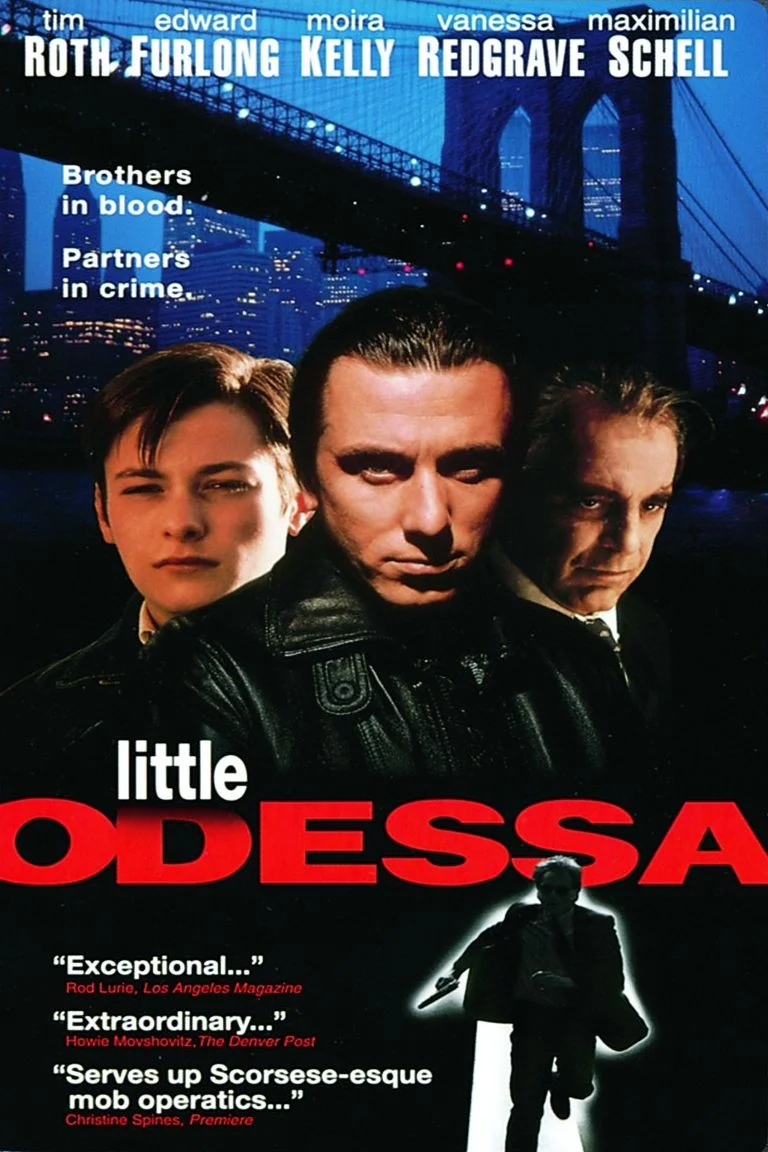
2/15:
Having seen We Own the Night years ago, I immediately became a fan of James Gray's directing style.
He doesn't have much of a résumé. Little Odessa is the only one that stands out. It's clear that Tim Roth is
a natural actor, but he doesn't look credible enough to play a Russian mafia hood despite the paucity of tattoos on him.
The longer the story unfolds, the more fearful I've become. It's because of the inclusion of Edward Furlong. By the time
his character is shot dead, it's American History X all over again. Hence, I wonder if Tony Kaye ripped off
Little Odessa after seeing it while supplying a Nazi hook.
There's not much of a difference between these two films as far as base elements go. Two brothers have a tough upbringing
and make do with what they can. The plot says and reveals little when what it really needs is a strong punch to be a gripping
picture.
All in all, Little Odessa is a good start for James Gray, but it's a big letdown.
A Little Romance (1979)
Rate:
8
Viewed:
2/17
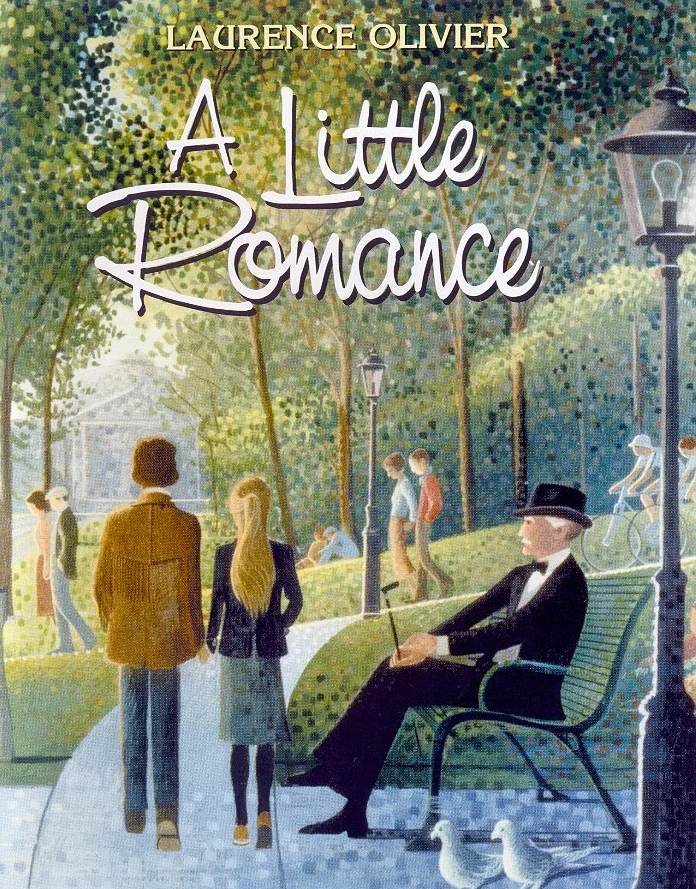
2/17:
A Little Romance is a nice, charming romantic picture that takes place in France and Italy.
Although the boy and girl are the main show, it's Laurence Olivier who steals their thunder. He's surprisingly at his
best, considering how out-of-shape he was in The Boys from Brazil.
Arthur Hill, who plays the girl's father, comes in a close second. What a masterful job he has done.
It's also nice to see Broderick Crawford, the long-time veteran who's an Oscar winner for his performance in
All the King's Men which goes all the way back to 1949, having a good time by being himself.
Making her debut role, Diane Lane gives the only good performance of her highly overrated career. She's a natural here.
Thelonious Bernard starred in just two films, A Little Romance and Allons z'enfants, before
calling it quits. I find him saccharinely annoying as Daniel although he could've been a good child actor for a while.
The biggest trouble is that the young characters are too precocious given their vast knowledge about various subjects. Hence, the film
is more suitable for actors in their early 20's. Nonetheless, I prefer A Little Romance over either
Before Sunrise
or Before Sunset any time of the day because the dialogue is a lot better. Plus, it has kept me interested by being a
quirky, cute movie.
All in all, it's hard to stomach A Little Romance because of Thelonious Bernard, but both George Roy Hill's direction
and Laurence Olivier's classy performance have made it worthwhile.
The Little Shop of Horrors (1960)
Rate:
2
Viewed:
3/05
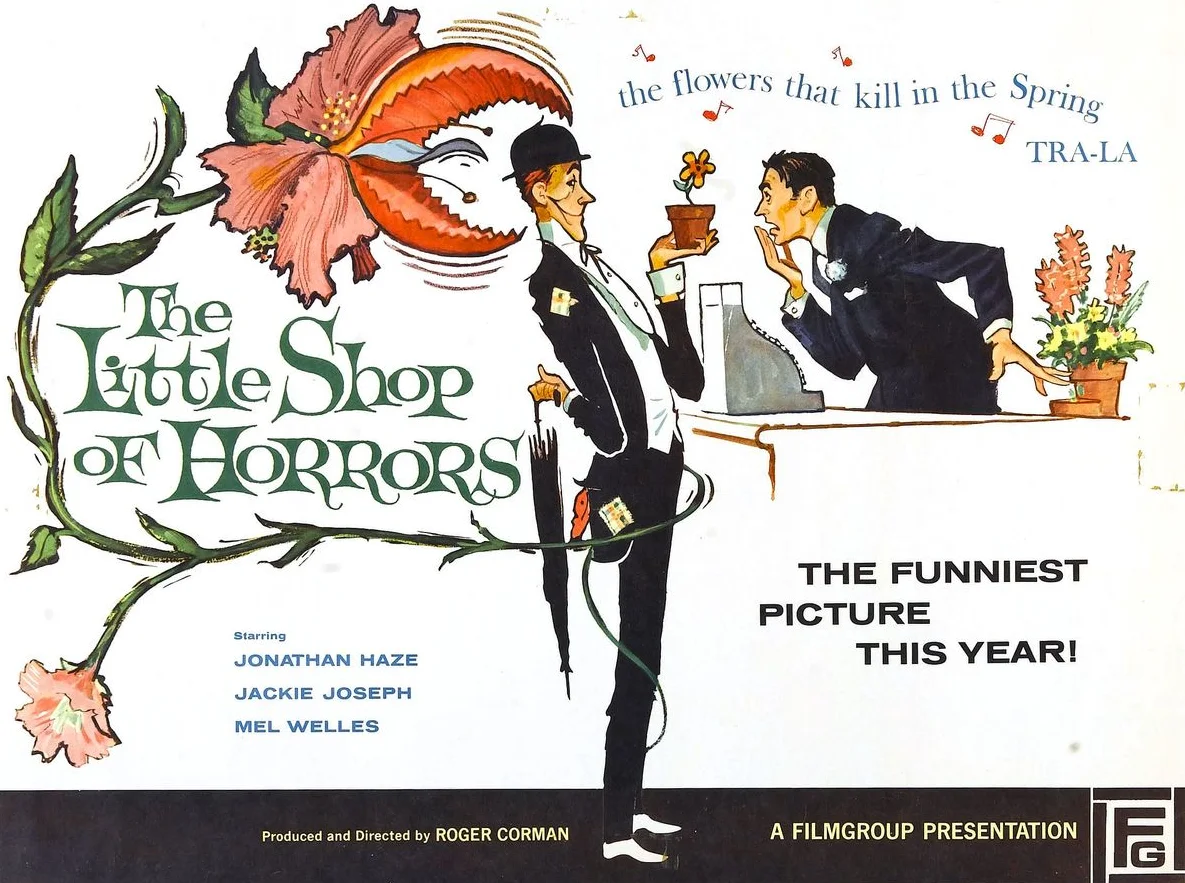
3/05:
Once in a while, I'll watch a stupid movie, and this time, it's The Little Shop of Horrors.
At first, I was attracted to it because of Jack Nicholson which is the earliest performance I can recall seeing for him.
Afterwards, I was somewhat disappointed but understood he had a long way to go, that is, nine years to establish
himself as a solid actor.
The plot is cheap and lame, and the jokes are dumb. Jonathan Haze's character is so awful that I can't stand him. Why is he
stupid to climb into the flower bulb?
All in all, shot in two and half days under a budget of $22,500, The Little Shop of Horrors is a D picture as it gets.
Live and Let Die (1973)
Rate:
2
Viewed:
1/11
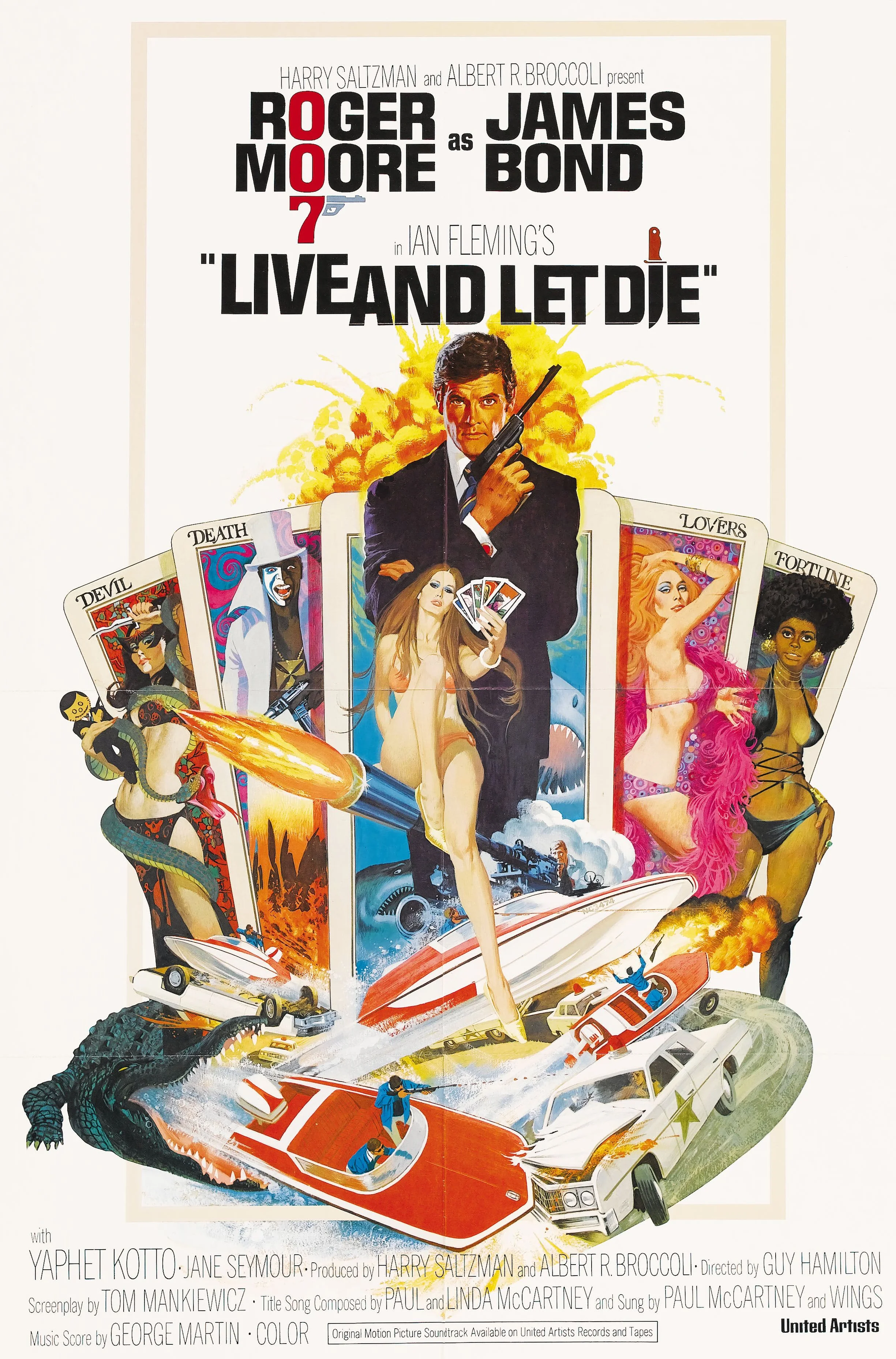
1/11:
Live and Let Die...what a silly title.
And what the hell does that mean? Roger Moore replaces Sean Connery, and things are supposed to be better?
Making me fall asleep, I hate films that involve voodoo and black magic, and they must always take place in either Louisiana
or Haiti. James Bond beds more women as usual. If the black female agent is for real, then coming up is a sexual harassment
lawsuit against 007. When will the madness ever end?
The boat chase scenes are too long, forcing me to yearn for the ending. The sight of the redneck cop doesn't help matters
any, either. Why does this particular operation require the services of a British spy agent? At one point, James Bond should've
been mauled by crocodiles. Honestly, I'm just tired of seeing him survive many improbable scenes when a simple bullet
right between his eyes will suffice.
All in all, Live and Let Die is another failure for the overrated James Bond franchise.
Live Free or Die Hard (2007)
Rate:
1
Viewed:
3/08

3/08:
What a stupid title Live Free or Die Hard is.
Why couldn't they name it Die Hard 4 for the sake of simplicity? One reviewer described it as old-school. I don't
think he understood what the adjective meant.
The fourth film of any franchise is usually the signal of a death knell, and that's what happened here. All
physics laws known to man are broken. I've traveled through West Virginia, Maryland, Baltimore, Washington, D.C., and
Camden, New Jersey, many times, but what I saw in the film doesn't resemble them.
Also, it should be an hour shorter. When something happens, I'll ask the five important questions: why, how,
who, what, and are-you-shitting-me. I don't see Bruce Willis as John McClane but rather a parody of himself.
All in all, it's not necessary to sacrifice millions of brain cells to watch Live Free or Die Hard.
The Living Daylights (1987)
Rate:
3
Viewed:
12/11
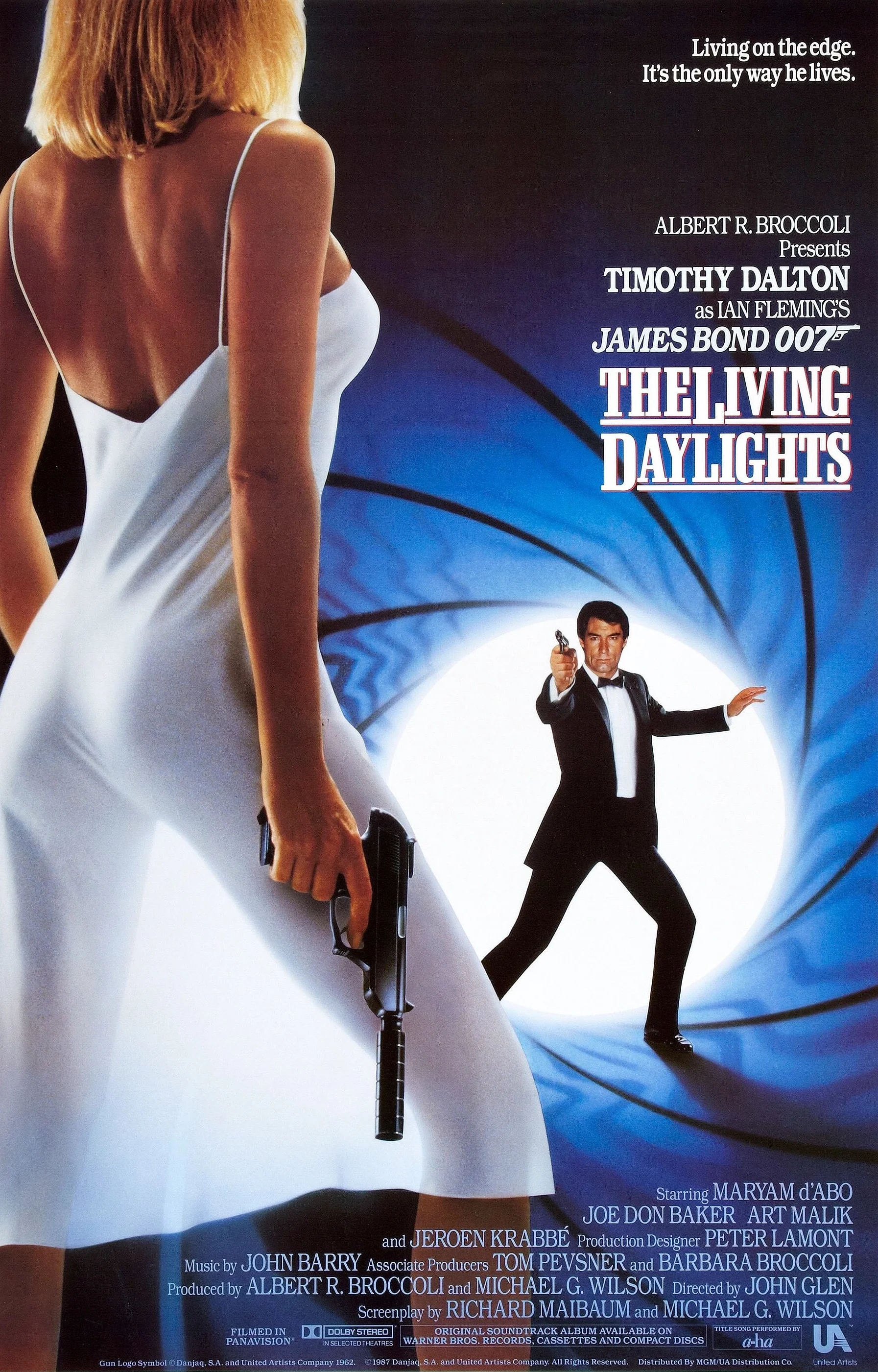
12/11:
After finishing The Living Daylights, I had to decide who gave the worst performance: Timothy Dalton, Maryam d'Abo,
Jeroen Krabbe, or Joe Don Baker.
They're all bad, so I've settled on Krabbe. That man cannot act at all. Becoming the seventh actor to play James Bond,
Timothy Dalton, who was a good-looking guy back then, is terrible. He's flat and has no personality.
The plot is all right, and as always, the best part is the title sequence. They sure knew how to make it stylish.
By the way, Smiert Shpionam means "Death to Spies." That's funny because they failed to kill 007.
All in all, The Living Daylights is a small improvement over the dreck pictures with Roger Moore but is still
ridiculous.
Local Hero (1983)
Rate:
7
Viewed:
8/21

8/21:
Before there were Hugh Grant's English comedies, there was Local Hero.
Reminding me a lot of
The Englishman Who Went Up a Hill but Came Down a Mountain, the movie takes place in Pennan,
Scotland (Ferness), has a well-thought-out story, and is supplied with great cinematography and terrific acting.
Unfortunately, it's too long for my liking.
A lot of time was spent on community togetherness, but I got the point already halfway through. Of course,
MacIntyre felt it and therefore missed what he had, wanting to call somebody there after he got back to Houston.
Peter Riegert, not Burt Lancaster, is the star of the film. However, I don't think he's the local hero. That's Danny Oldsen
who's wonderfully played by Peter Capaldi. It's he who listened and understood what the island should be about. Burt
Lancaster is just there to serve as a plot device for the film. Also, it's a fabulous job by Denis Lawson and Jenny Seagrove.
All in all, having captured the human spirit, Local Hero is a quiet Scottish gem.
Lock Up (1989)
Rate:
8
Viewed:
1/04, 1/05, 7/08, 5/16, 2/22

7/08:
Lock Up is a memorable prison picture in Sylvester Stallone's oeuvre.
Tom Sizemore, in his first movie role, isn't bad as Dallas. Hampered by poor start, his character gets on a roll by
delivering great lines. He has a memorable death scene with Jordan Lund who plays the sadistic guard Manly.
My favorite scene is when Frank Leone was recovering in the infirmary after he got stabbed in the back and had a conversation
with a Henry Rollins look-alike inmate in wheelchair. He seemed friendly and genuine, and then the next
second, he had plans to rape Leone's fiancé. Meanwhile, the showdown between Leone and Drumgoole is a can't-miss, and the
sight of Donald Sutherland's face as he begs for mercy is comical.
All in all, Lock Up is a shot of testosterone in the arm for all Stallone's fans.
5/16:
Lock Up is Stallone's Shawshank Redemption.
No matter how many times I've seen the movie, I don't agree with the nomination given to Donald Sutherland for Worst
Supporting Actor. He did fine, and I like his character. I realize now Tom Sizemore gave a very good performance as the
hyperactive, talkative Dallas. Or was he really hopped up on drugs? Either way, kudos to him for being memorable. Playing
Chink Weber the yard boss, Sonny Landham is great as always. He will always be well known as Billy in
Predator.
There are a lot of great scenes which were shot on location at New Jersey's Rahway State Prison with real
inmates and guards. My favorite is when Frank Leone has a nice conversation with an inmate in wheelchair and it immediately
goes sour when he has plans to rape Leone's fiancé. The football scenes are not to be missed, either; they did it for real,
with no stunt doubles, resulting in serious injuries for Sylvester Stallone.
All in all, Lock Up is an underrated Stallone classic, and I never get tired of watching it over and over.
2/22:
One aspect I look for in a film is realism, and Lock Up oozes it aplenty.
Shot on location at East Jersey State Prison (formerly Rahway State Prison), the extras are actual prisoners and guards,
providing the look. Of course, Sylvester Stallone is the man while Predator's Sonny Landham matches him intensity for
intensity. The most brutal scene is the football game. I can tell these people were duking it out for real. Stallone
almost broke his leg. Now, that's what I call realism.
To this day, I have no idea why Donald Sutherland was nominated for Worst Supporting Performance of the Year. What he did is
simply excellent. The warden is a sadist along with his guards. It's nice to see John Amos not to be part of them who's just
doing his job. I've got to love his frameless glasses that's held back by a couple of strings to achieve the tough look.
Tom Sizemore makes his feature film debut and sees his career take off afterwards.
On the other hand, the story is great and entirely believable with terrific editing and many Stallone moments. In prison, you
have decent guys versus stone-cold killers. Hence, rooting for Frank Leone and his buddies becomes easy. I got
invested into the film almost immediately.
All in all, I think of Lock Up as Shawshank Stallone.
Lock, Stock and
Two Smoking Barrels (1998)
Rate:
5
Viewed:
12/04, 8/07
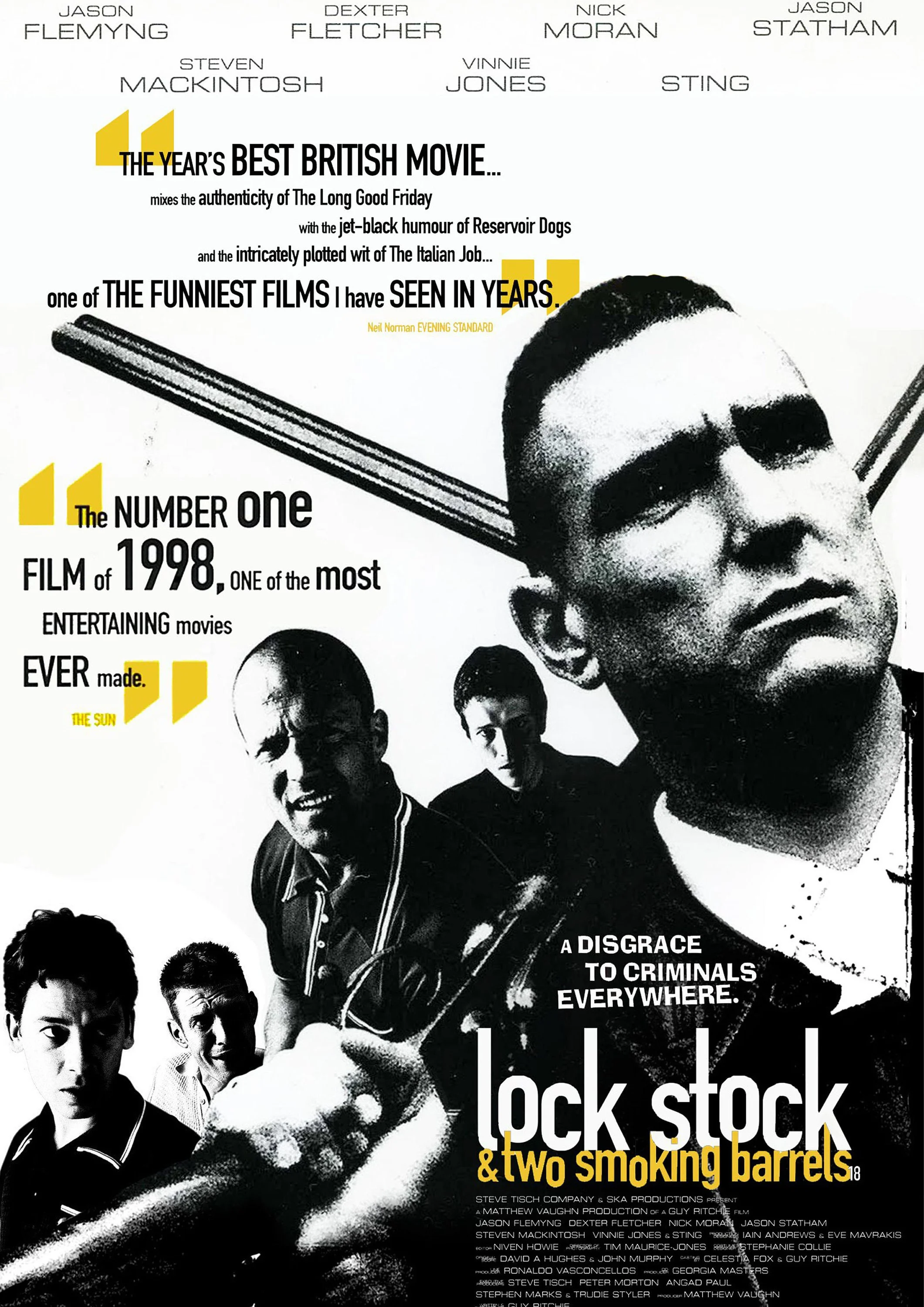
8/07:
From the United Kingdom, Lock, Stock and Two Smoking Barrels has an enormous reputation of being an ultra-cool picture
that'll lead to Snatch.
Unfortunately, it doesn't stand the test of time. If I compare both pictures, it's easy to see how much the
latter improved in all aspects of filmmaking. I don't like the characters, most especially Rory Breaker. Some of them
are annoying and stupid. Yet the style, story, and cinematography score points.
All in all, it's too bad that Guy Ritchie didn't make any more such pictures, so Lock, Stock and Two Smoking Barrels
and Snatch remain the alpha and omega of his career.
The Locusts (1997)
Rate:
5
Viewed:
11/23
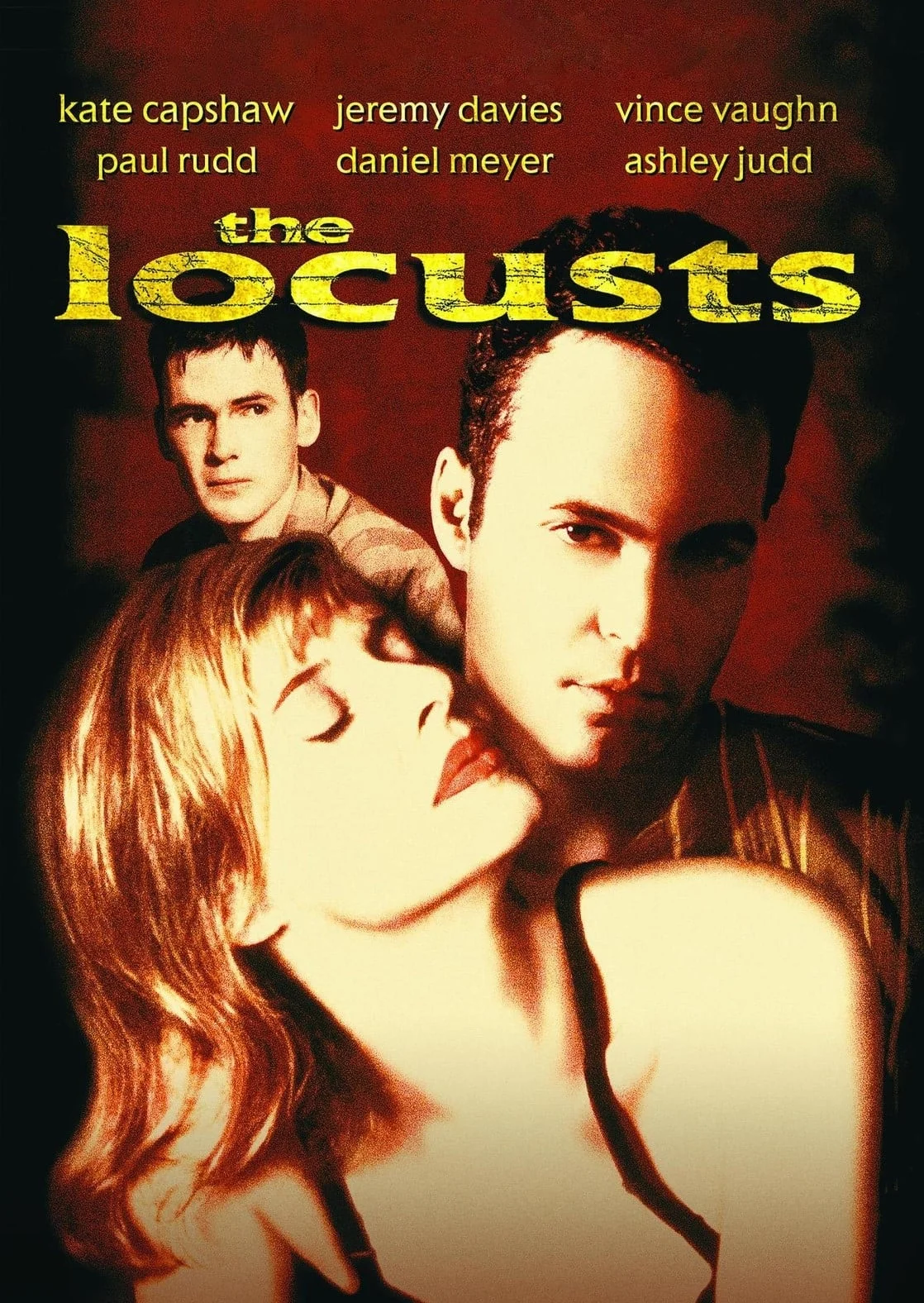
11/23:
To summarize what The Locusts is about, Earl said it perfectly:
"Well, I can see you're determined. One thing, though...people here, they like things to stay the same, mostly.
As bad as it may seem, the way things are around here's the way she wants them. You'll have a hell of a battle
on your hands if you try and change them."
So, what does Clay Hewitt do? He goes to fuck it up. The result is: Flyboy and his mother are dead. Given that
the plot takes place during the 50's, he didn't know any better, so I'll give him a pass. On the other hand, if
Clay left the situation alone and minded his own business, there's a 100% chance they stay alive and life will
be just like before, even if it isn't perfect.
More of a Midwestern than a Southern Gothic because of the Kansan setting despite being shot on location in Texas,
the movie isn't terrible, symbolisms and all, but nothing happens for the longest time. Why
Chinatown worked is that there were a lot of bones thrown out, allowing me
to absorb the characters, the language, and the cinematography. The Locusts? It's been a lot of drinking
and smoking. That's it which isn't good enough. Even the bull castration scene isn't my idea of "oh, yeah...this
is so cool to watch."
Doing what Paul Newman did back in the day when he appeared in
The Long, Hot Summer and Hud, Vince
Vaughn is fine, but he isn't the problem. Kate Capshaw fits the part in the emasculating sense but is,
unfortunately, too old to be considered "hot" for a femme fatale. My biggest issue is Jeremy Davies. He
has made a career out of playing a retard many times, and here he does it again. I'm telling you:
it's...really...tiresome.
All in all, The Locusts needs to be shorter by half an hour, and it'll play well this way.
Logan's Run (1976)
Rate:
6
Viewed:
2/17

2/17:
Logan's Run is a compelling sci-fi picture that's hampered by problems.
First of all, there's no way people can survive without sun. Being enclosed in a dome for all of one's life is okay, but
it's not healthy. Everybody needs the sun in order to live. Plus, not knowing what a sun is isn't possible, and it heats any
planet.
If it's 2274, then the spoken language will have to be drastically different from 1976. This always happens. You only need to
check out Shakespeare's plays for confirmation. Then, take a look at anything from the 19th century, and read some more
from the 50's. Language does change a lot.
All I saw in the world of Logan's Run is white people. I guess they're essential to survival. No fatsos,
people with disabilities, or anybody of color, it's like When Worlds Collide all over again. When Logan and
Jessica discovered the ruins of Washington, D.C., I'm immediately reminded of what happened at the end of
Planet of the Apes. Why couldn't the filmmakers come up with something original?
Richard Jordan, who plays Logan's friend Francis, was Learned Hand's grandson. He died of brain tumor in 1993 at the age of
56. His role was intended for William Devane, but he dropped out to replace Roy Thinnes in Alfred Hitchcock's final picture
Family Plot. Like everybody else, Michael York does an okay job. The truth is
that he's never been a great actor, just serviceable enough not to ruin the picture.
Highlighted by the cinematography and visual effects despite the apparent look of a miniature set, the story is
interesting to follow, and I like it when the writers take the time to explain the terminology such as sandman, runner, and
Carrousal. I had to figure out the meaning of the colors which represented differences of age groups. Why people must
die at age 30 for the purpose of population control makes sense. The reason for the runners is that they want to live past 30,
knowing full well the concept of "renewal" is fraudulent.
Yes, Logan's Run is painfully dated for 1976. The fact of matter is that it was in development hell, starting in
1968, and thus missed the wave of successful sci-fi pictures. Star Wars came out a year later, and the difference between
these two was night and day.
All in all, Logan's Run is a worthwhile sci-fi picture, but it drags a lot and the plot needs more meat.
Lola rennt (1998)
Rate:
4
Viewed:
5/16

5/16:
Lola rennt, which is better known as Run Lola Run to us American pigs, is one of the most overrated films to
come out of the late 90's.
It's a stupid, silly, and infantile picture that's marketed heavily toward the MTV generation of video game addicts.
Every time Manni is shown, I just want to punch him in the face. Lola runs, runs, and runs. Yet she never sweats for a second.
Worst of all, it's a blatant rip-off of Groundhog Day. Watching the Bill Murray classic once is enough to last me a
lifetime when it comes to movies that repeat the same sequence of events endlessly but with different results.
How the events unfolded in the German picture is impossible by going from an extreme outcome to another. Trivial moments don't
become catalysts for big changes; they always involve a long chain of events toward the final outcome. Plus, people
don't change, not even a tiny fraction, their movements over time if they're unconscious of being stuck in a time loop.
All in all, why should I care about the two criminal screwups in Lola rennt?
Lolita (1962)
Rate:
6
Viewed:
5/08
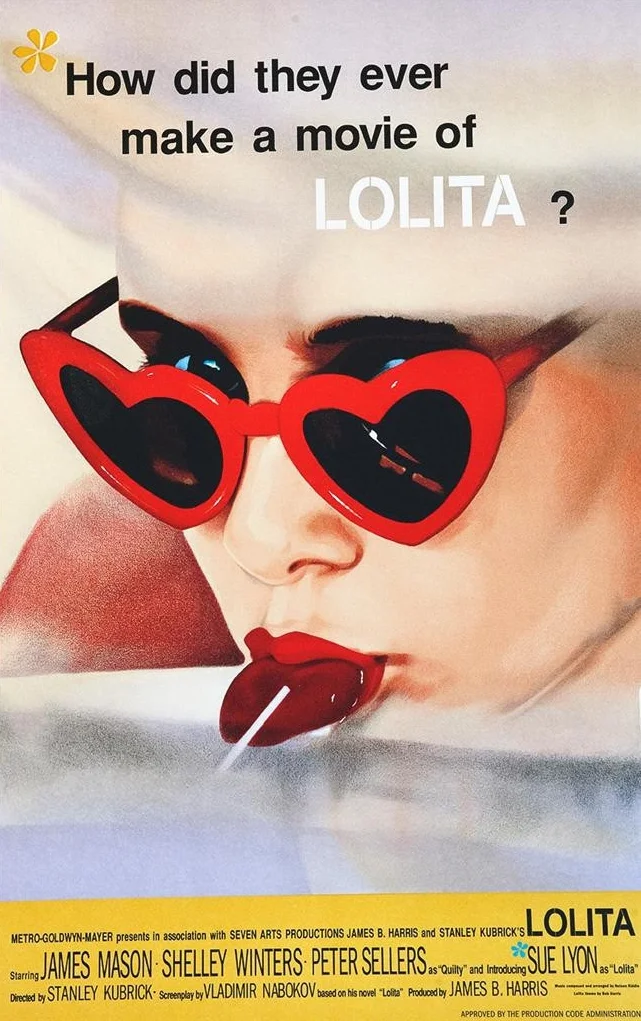
5/08:
If not for Peter Sellers, Lolita would've been a masterpiece.
Well, nah. Stanley Kubrick fucks this up as usual. Just stop being too damned technical, will ya? You're killing me, Stanley.
Sue Lyon isn't much of a looker. She's an annoying, whiny girl who can't stop sucking her lollipop so much. Hey, check
out the movie poster for further proof.
The focus should be placed on James Mason. He's brilliant as his character transforms from a sensible, morally
repressive to insanely lovesick person. I hate Peter Sellers' character who won't shut the fuck up for a minute. Thus, he
killed the movie for me.
All in all, here's a Hollywood cardinal rule: letting Peter Sellers take over is the film's kiss of death.
Lolita (1997)
Rate:
2
Viewed:
3/09
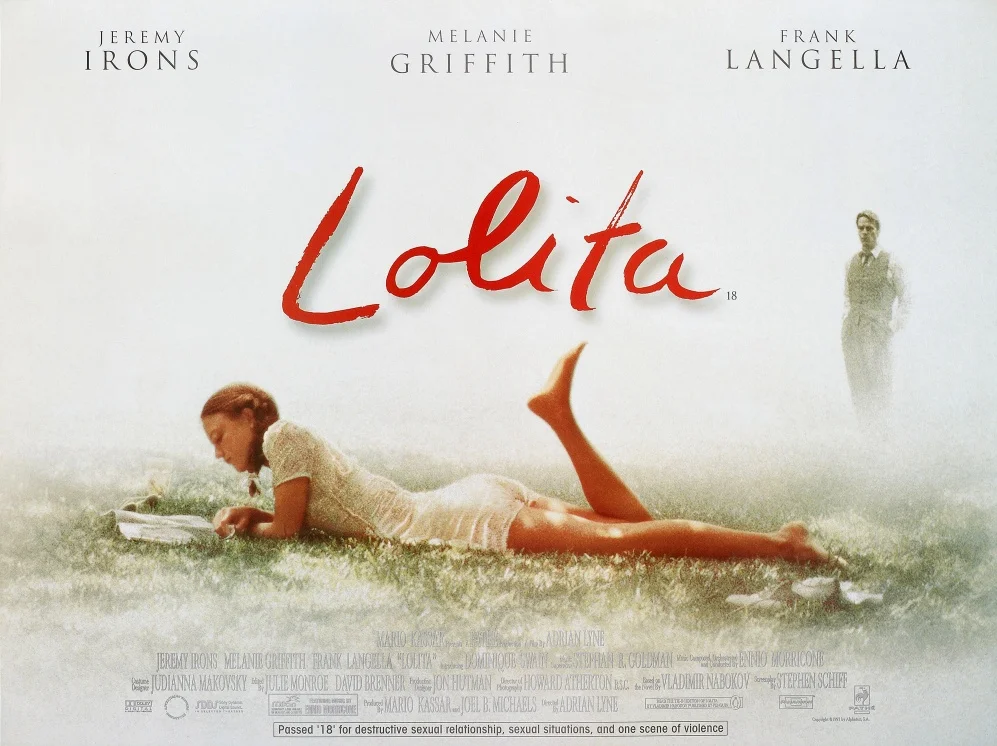
3/09:
Whoever thinks the 1997 version of Lolita is a great film must be deluding himself.
Stanely Kubrick's version is about implicitness while it's explicitness for Adrian Lyne. It's wiser to go with the former,
and the remake isn't necessary which is an endless cycle of nothings.
Lolita, played by Dominique Swain, reminds me of the red-haired boy from Problem Child. Even worse, she was
18 playing a fourteen-year-old girl and was thus too old to be believable. And judging her character, Lolita seems mentally retarded.
Jeremy Irons is disappointing. All he can do is stand there and stare at people all day. His bleached hair looks stupid. His
infatuation with the girl is unconvincing because it's obvious that he didn't have sex with her. The best part
of this movie is...no Peter Sellers! But is it necessary to show Frank Langella's penis? It's so ridiculous.
All in all, one Lolita is enough.
Lone Star (1996)
Rate:
8
Viewed:
6/17
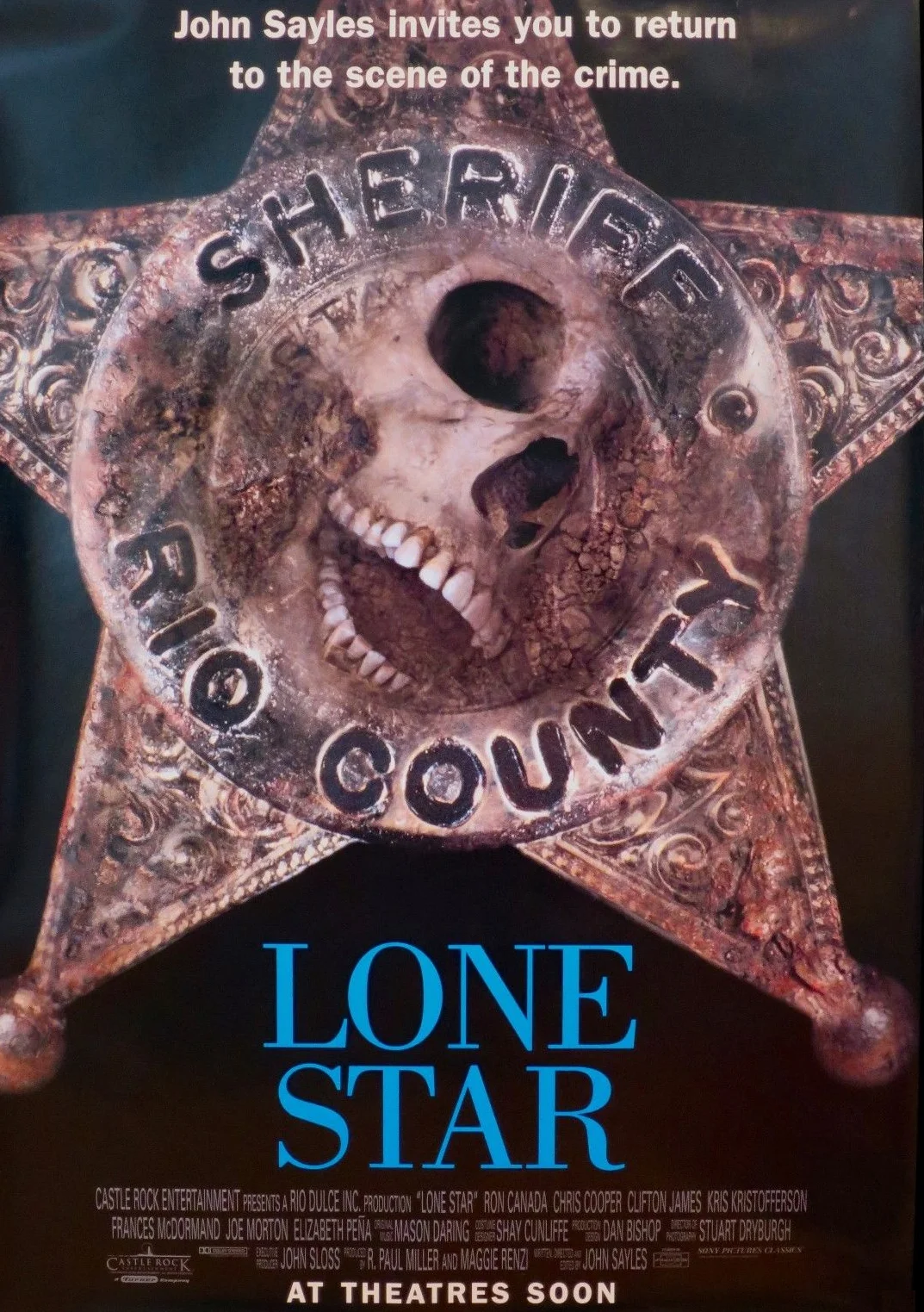
6/17:
I'm a huge fan of John Sayles' work, especially
Return of the Secaucus 7 which is one of the all-time great pictures.
After seeing who the director was for Lone Star, I was immediately in. Maybe Matthew McConaughey played some
role in my decision, but the fact that he had only less than five minutes of screen time didn't bother me the slightest bit.
Chris Cooper is a phenomenal actor, and I'm pleased to see him in a starring role. Elizabeth Peña is
wonderful. She sadly died three years ago from liver cirrhosis at the age of 55 due to alcohol abuse. Kris
Kristofferson is a baddie which is a nice change. Frances McDormand is truly out there. I can't imagine putting up with her
character.
As usual, the film's strength is the story which is original, earning John Sayles a much-deserved Oscar nomination.
Sadly, Fargo's screenplay took home the award when it should've gone the other way.
However long the running length is, the movie is absorbing, and I was surprised by the ending in
terms of what really happened. The acting is flawless. Relying on it, John Sayles takes his time to unpeel the layers
to get to the core of the mystery which is surprisingly human and real. He also does a good job of paying attention to
the debate of revisionist and actual history of Texas. Another keen aspect is the integration of whites, blacks, and
Mexicans because that's the reality of living in Texas and the state has a long history of racism.
The Border is what I call a chaotic, Kafka-esque picture, but Lone Star is the opposite, being
more of a later period picture when things have settled down with residents setting themselves up for life in the long run.
Thinking it was somewhere around McAllen or Brownsville, it was actually shot on location in Del Rio, Eagle Pass, and Laredo.
All in all, having reminded me of The Last Picture Show, Lone Star gets a great deal correct of what it's
like to live in a Texas border town.
The Loneliness of the
Long Distance Runner (1962)
Rate:
3
Viewed:
4/08

4/08:
Because of the title The Loneliness of the Long Distance Runner, I thought it would be about running.
Then again, Tony Richardson is the director of the film which is enough to tell me otherwise. All he does is make mediocre
pictures. The Loneliness of the Long Distance Runner turns out to be just that. Plus, it's not even a movie about
running. What a joke.
The acting isn't bad. Tom Courtenay does fine, but he would've benefited from a better director. The
cinematography is fair at times, and the editing is nice. But it's the direction that's lacking. There are
a lot of random scenes that don't add up to much. The flashbacks aren't done well as they haphazardly come and go.
All in all, The Loneliness of the Long Distance Runner is slow, dull, and pointless.
The Lonely Guy (1984)
Rate:
7
Viewed:
4/08

4/08:
The Lonely Guy is quirky, unusual, and unique.
Steve Martin is excellent and does a nice spoof of the ending scene from
The Graduate. Charles Grodin isn't bad but overacts. Yet his presence makes a difference.
I like the story, and it's funny during the first hour. Then, starting with the nauseating pseudo-sex scene, it goes
downhill in the next fifteen minutes. Luckily, the film pulls itself together, gets back on track, and has a nice finish.
There are some memorable scenes such as the conversation about bums with hair, the depressing "dinner-for-one" at the
restaurant with a food critic skit afterwards to save face, and the dog running away, showing up at the cruise, jumping into
the middle of the Atlantic Ocean, and finally appearing at the end.
All in all, Steve Martin is great in The Lonely Guy.
Lonelyhearts (1958)
Rate:
8
Viewed:
6/24
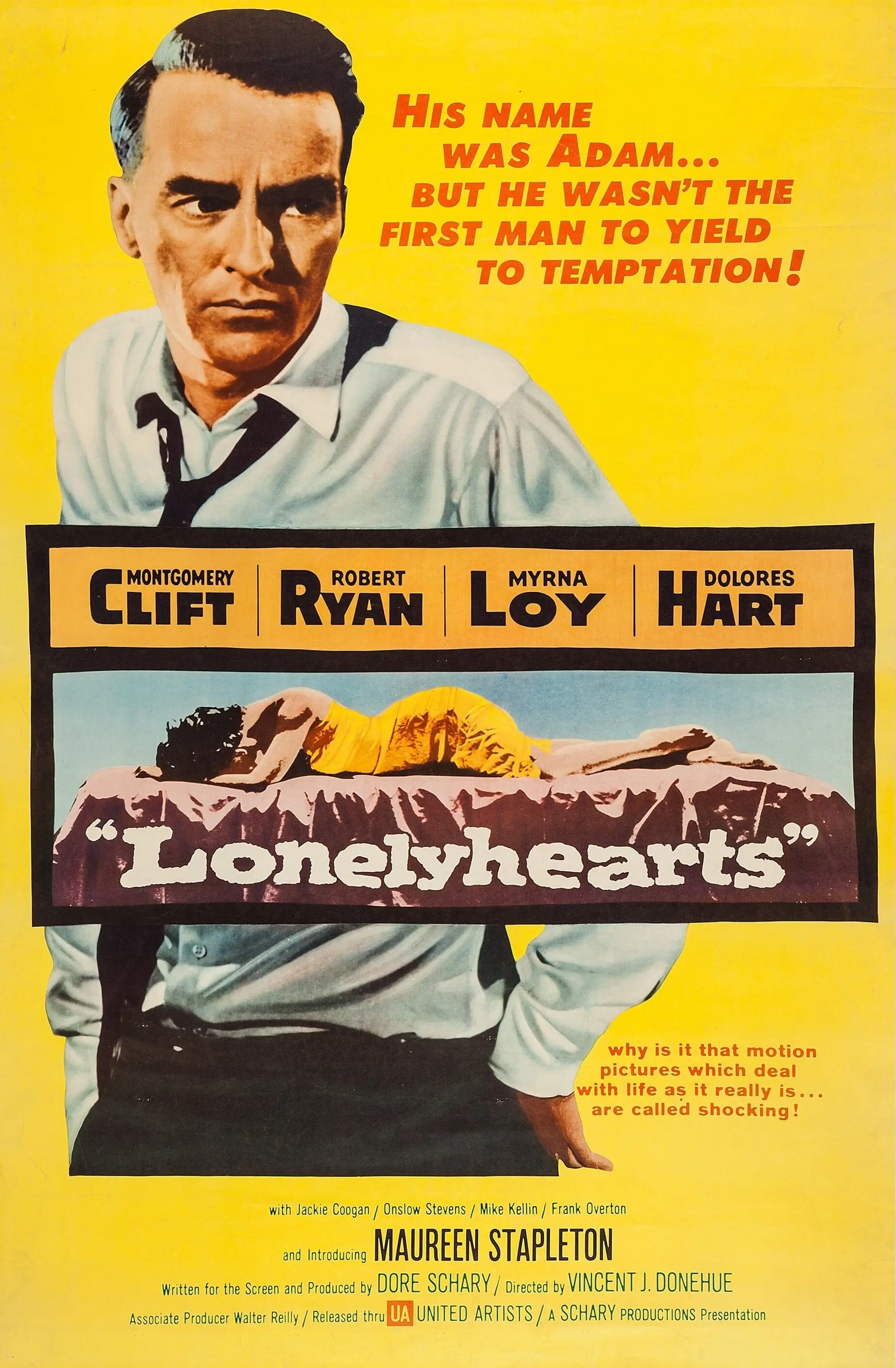
6/24:
When the former MGM head honcho Dore Schary's name appeared as the adapted screenwriter of Lonelyhearts, I
quizzically raised my eye brow.
At first, I was put off by the pompous, meandering dialogue, but the more the show went on, it got better. Similarly, I thought
the same of Montgomery Clift, but he did turn in the best performance of his career since
From Here to Eternity. The same goes for Robert Ryan when it comes
to all-time while I can see why Maureen Stapleton received an Oscar nomination. I'm surprised to see Myrna Loy
looking so unglamorously old.
The downbeat theme is along the lines of Tennessee Williams' and Carson McCullers' works. It's about people who have
been soundly defeated by life. As an idealistic, Montgomery Clift is the perfect choice for taking it all in while the ever-cynic
Robert Ryan just can't resist putting down anyone as often as possible. Everybody in the newspaper room laughs off the
desperate pleas for help. If these letters are for real, then some of the people who wrote them are in serious need of professional
help, not advice from some Lonelyhearts columnist who has no business of being involved in such matters.
If anything, the biggest mistake is not giving the film a sad ending just like how it happened in
The Heart Is a Lonely Hunter. Dore Schary would ultimately regret this move.
Ironically, there were several turned-down chances for Montgomery Clift's character to drink when in real life he was a chronic
alcoholic that started to escalate more after his automobile accident two years prior which completely altered his face as
painfully shown on screen.
All in all, if you don't mind sad movies, Lonelyhearts is a fine choice.
The Long Good Friday (1980)
Rate:
6
Viewed:
7/14

7/14:
The Long Good Friday is a British gangster picture that's somewhat similar to
The Godfather but is more
concerned about finding out who the mole is for sabotaging the leader's potential deal.
That being said, it's not exciting to watch. However, Bob Hoskins, who died a few months ago, is terrific. Hence, he's the
sole reason why the film is watchable. But my preference is Mona Lisa, which
is better, having netted Bob Hoskins a much-deserved Oscar nomination.
All in all, I wish that The Long Good Friday was more interesting.
The Long Goodbye (1973)
Rate:
6
Viewed:
3/14

3/14:
The Long Goodbye is another one in the long line of Robert Altman's frustrating pictures.
Ever since M*A*S*H, he has been inconsistent and is more intent in letting promising films go tediously long and
then eventually nowhere. That's the case with The Long Goodbye although I like it from a cinematography point of view.
Yet I'm tired of the zoom shots. It's been an endless series of back and forth...back and forth...back and forth.
Hey Robert, how about focusing more on the pace? The mystery seems to solve on its own as the private eye is either visiting
somebody or is being visited. From start to finish, the story is linear and thus dull. The ending is at
best terrible and at worst contradictory.
I'm not sure what to make of Elliott Gould's rendition of Phillip Marlowe despite his interesting look. Despite
having played the role well, he has an annoying habit of chain-smoking, but the oft-repeated namesake song is a strong contender for knocking it out of
the park.
It's interesting to notice how Arnold Schwarzenegger's character is treated as a joke. Well, he can laugh because he went
on to become an icon unlike everybody else. I didn't realize it until now, after looking up the internet, that the guy who
played Terry Lennox was Jim Bouton. He wrote Ball Four which is a famous tell-all book about Major League Baseball.
All in all, The Long Goodbye needs more substance.
The Long Kiss Goodnight (1996)
Rate:
1
Viewed:
11/08
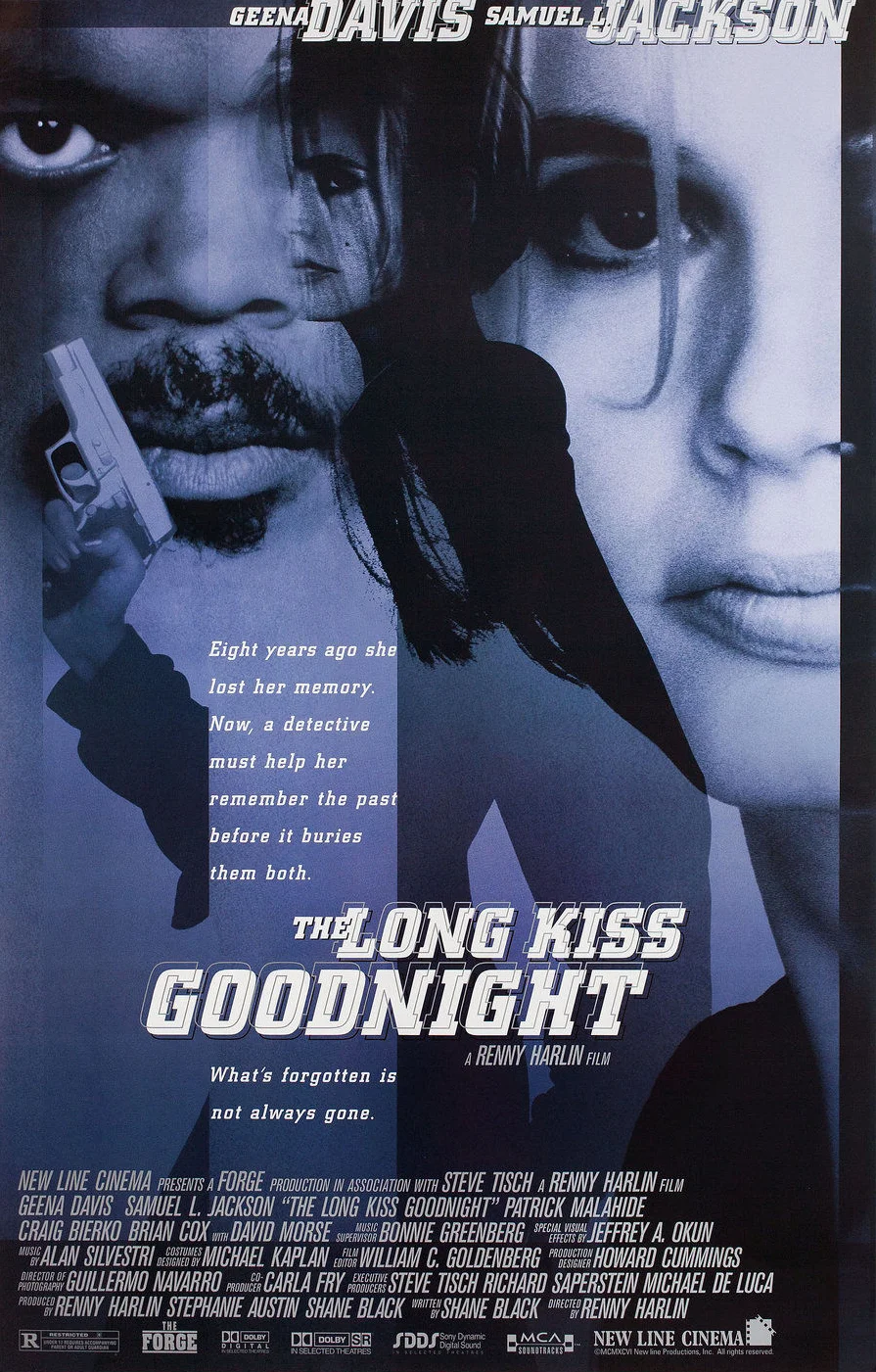
11/08:
Ten minutes into The Long Kiss Goodnight, I quickly asked myself, "Is this one of the worst movie I've
ever seen?"
It turns out to be in the affirmative. Renny Harlin has a lot to do with that. This is the same guy who directed
the all-time box-office disaster of the 20th century, Cutthroat Island,
which shuttered Carolco Pictures for good.
I probably wouldn't be surprised to find out if he, before agreeing to do The Long Kiss Goodnight, woke
up one day and said, "I'm going to make a crap movie featuring my wife!" Unsurprisingly, the two films took a
toll on their five-year marriage, leading to a divorce in 1998.
Why is Samantha Caine allowed the chance to escape death many times? Is Mitch Hennessey supposed to die because
he's spilling a gallon of blood per minute after being shot in the chest? One reviewer exclaimed
that the action scenes were spectacular. Well, I thought they were crap like the special effects and editing.
All in all, The Long Kiss Goodnight is Bad Filmmaking 101.
The Long, Hot Summer (1958)
Rate:
7
Viewed:
6/20
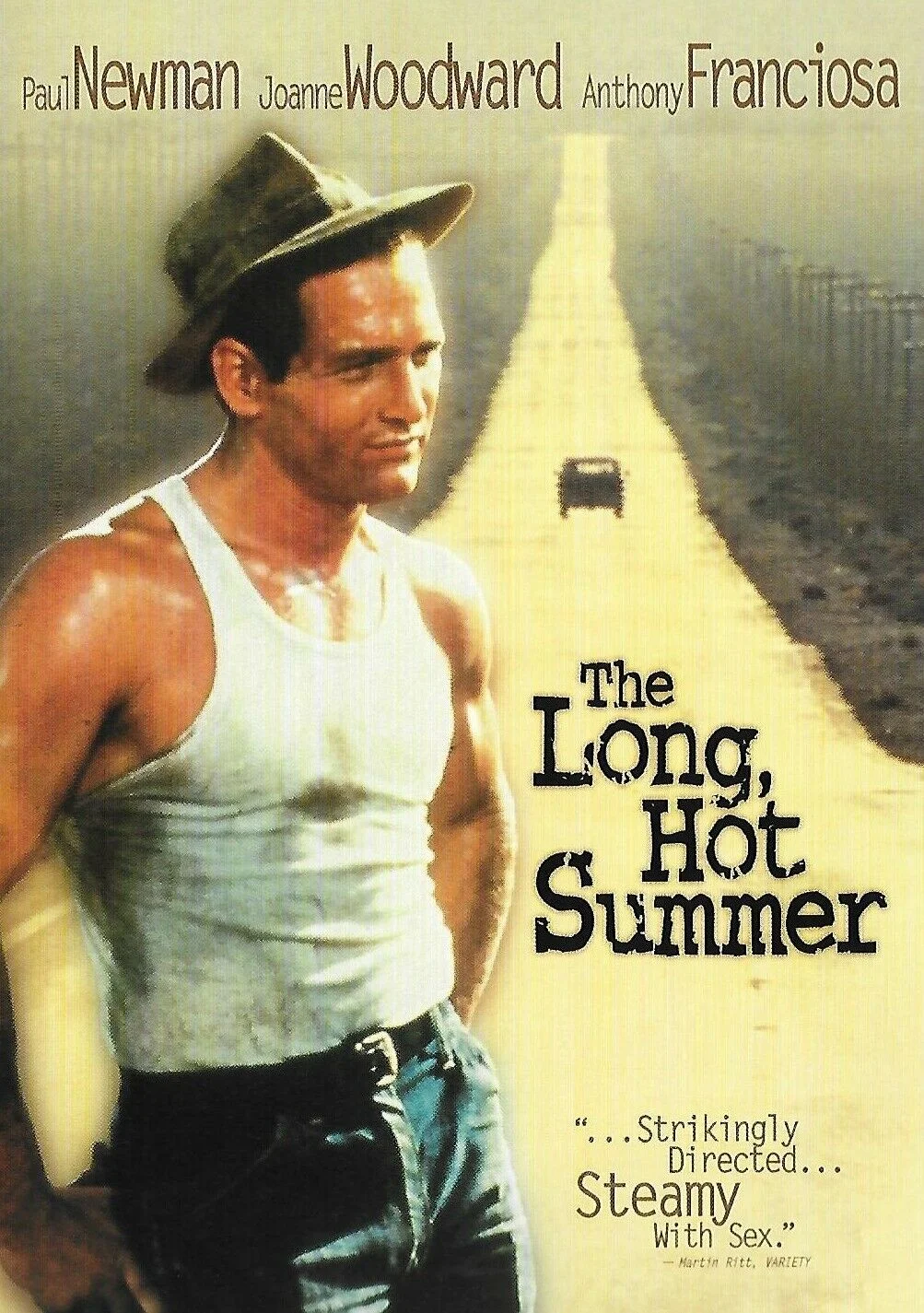
6/20:
The Long, Hot Summer can be safely retitled as Take a Long, Good Look because Paul Newman is absolutely gorgeous.
The movie starts off badly because the dialogue is full of fluff. Then, it gets better as the
lines become more polished and therefore poetic. At the end, I have to say that I was impressed with the strength of the
screenplay which largely drove the movie.
At first, I thought Orson Welles, who looks fat, was too talky, but he finally got it going to become a
memorable, larger-than-life character. Hence, what a shame he didn't pick up an Oscar nomination. Orson Welles
is the reason why I prefer this over Cat on a Hot Tin Roof; both are similar in character motivation except
the former doesn't deal with homosexuality.
The Long, Hot Summer is a notable film for a reason. It's when the romance between Paul Newman and
Joanne Woodward started to gain steam although they knew each other four years prior but he was married at the time.
After his divorce, they went on to have the longest marriage for a Hollywood power couple which lasted for fifty
years, appearing in eleven films together.
As for the performances by Paul Newman and Joanne Woodward, they're good and sexy, having been served well by
the lines they're supplied with. Of course, he makes a big impression, and it's hard for her to deny
him. If she does, then well...she's the biggest fool in the world. Both could've scored Oscar nominations, but
it's fair enough that Paul Newman received a consolation prize by winning Best Actor at the Cannes Film Festival.
All in all, you'll need the air conditioner on when you watch Paul Newman in The Long, Hot Summer.
The Longest Day (1962)
Rate:
5
Viewed:
5/10, 3/24

5/10:
Having mentioned it in my review of Battle of the Bulge, I present you again the
ingredients in order to create a bad war picture:
1. Soldiers throwing their arms in the air before dropping to the ground without being physically shot.
2. Lack of blood.
3. A smattering of troops.
4. Lots of focus on big-name actors who end up making cameos.
5. Bad acting.
6. Corny characters.
7. Germans speaking English.
8. Tons of explosions.
9. Anachronistic vehicles rolling everywhere.
10. A running time of three hours.
11. Closing screen credits to show gratitude for the dedication and lives lost of men who fought in the
battle and/or war.
12. An avalanche of historical inaccuracies.
13. Telly Savalas.
Although it doesn't have Telly and the Germans actually speak their own language, the list is damn near accurate
for The Longest Day. Knowing that John Wayne never served in WWII because he was too busy fucking Marlene Dietrich's
brains out, it's insulting to see him in uniform, pretending to be a soldier and ordering everybody around.
The film boasts of a cast of fortysomething international stars, yet more than half of them are practically unrecognizable.
It's safe to say that all were too old, too. The guy who won $2,500, is it relevant in the grand scheme of things? You know, the
Holocaust is still going on. When the Frenchman was jubilant upon the sight of incoming Allied soldiers on the beach,
he was probably thinking of getting an autograph from James Bond.
All in all, The Longest Day is a dinosaur compared to Saving Private Ryan.
3/24:
Showcasing many all-stars doesn't necessarily make a film better, and that's what happened for The Longest Day.
The finished product is worse every time that a big-name star shows up for a minute or two and says his lines of the sopa opera garden
variety before disappearing forever. John Wayne, the biggest draft dodger ever who made a chunk of his living starring in
war pictures, is the most ridiculous of them all. Being too old at age 54, his character lands in Normandy, breaks his leg, and
has to be carted around. Why not just force him to stay home? The pathetic guy was paid $250,000, which was $75,000 more than
what's doled out to author Cornelius Ryan, while everybody else got 10%. To add insult to injury, Richard Burton and Roddy
McDowall did their scenes for free.
There are tons of names to keep up with. Hence, it's better to focus on the battle scenes, however few of them there are, which are
outstandingly shot, winning the Best Black-And-White Cinematography Oscar for Jean Bourgoin and Walter Wottitz. Two incredible
scenes are when the troops landed on the beach in Normany and when the men ran through Ouistreham. Had the film
showed more of them while discarding the soap opera crap, The Longest Day would've been a WWII masterpiece.
Both sides were filmed by different directors, but only the Germans got my interest. Why? It's because there's no fluff!
They went about their business and conducted themselves in a militaristic manner. On the other hand, none of the actors
stands out, but Red Buttons is the most annoying. Won't he can it already? I don't care about what happens to him. Ditto
for Richard Beymer.
All in all, overlong and disappointing, The Longest Day is worth watching only for the battle scenes.
The Longest Yard (1974)
Rate:
6
Viewed:
10/15

10/15:
Burt Reynolds has charisma, and it goes a long way.
That's what happened for The Longest Yard. As a football picture, it's not great, runs too long, and
reminds me of the gridiron scenes in M*A*S*H which were filmed four years
earlier. The plot doesn't work well, either. Also, there are many product placements during the game, making
me think the film was meant to be a long-ass commercial. In fact, that's the trouble with the NFL nowadays.
Speaking of domestic violence, it's interesting the opening scene showed an ex-football player beating up
a woman. I guess nothing has changed. Regardless, Burt Reynolds has moments, but apart from him, there's
nothing to like about the film. Meanwhile, it's impossible to root for the convicts against guards. Why would
I do that?
All in all, The Longest Yard is a fumble.
Longtime Companion (1989)
Rate:
8
Viewed:
3/14, 7/20

3/14:
Longtime Companion is a terrific period picture about the nascent AIDS pandemic; in fact, it's the very first
mainstream picture to touch this topic.
What's interesting is the preservation of the initial fears and misconceptions by heterosexuals and homosexuals alike
about AIDS. I can see how the disease was once labeled as "gay cancer." People thought it was spread by a simple contact
through touching, kissing, and breathing; simply put, nobody knew what was going on.
As for the victims of AIDS, it's too bad and unfortunate. Seeing the scenes which involve homosexuality, I'm surprised,
although it's unfair to say that, these actors risked their careers, yet several of them are well known today.
Regardless, the performances are outstanding, and Bruce Davison earned an Oscar nomination, which is well-deserved, for
playing David. I like to think of it as a representation of the cast because everybody is more or less as good as he.
I'm knocking a couple of points from the rating because the film can be a little uneven, causing me to struggle to
keep up with many characters at once. Regardless, it moves forward without tying up some loose ends yet is never melodramatic.
All in all, Longtime Companion is an outstanding picture that has a sad story to tell.
7/20:
The first of its kind to deal with the AIDS pandemic, Longtime Companion is a sad picture that
highlights the devastating aftermath of the sexual revolution among homosexual males in San Francisco and New York City.
Covering the "Before" and "After," Randy Shilts' And the Band Played On is probably the best book to understand
what it was like during the time. Of course, the aggressive sexual behavior of homosexual men is the main culprit why AIDS
spread so quickly, especially in bathhouses.
It's also about the victims who are caught in the pandemic, try their best to deal with the disease, and
are, sooner or later, forced to pay the ultimate price. The ending is depressing, showing a lot of people who have
succumbed to AIDS and can't wait for a cure which unfortunately hasn't happened yet and probably never will.
One negative is that the dialogue isn't enlightening by any means, making some scenes go slow. Nevertheless, the acting is strong,
and everybody is sincere about the issue with endearing sensitivity. Another is the weak secondary thread which concerns
two jocks. They aren't given much attention while the primary one has many characters involved who are more
well-developed. It's better to drop the two jocks unless the filmmakers want to further strengthen their story.
All in all, Longtime Companion paints a realistic picture of what it's like to be a homosexual male during the
middle of the AIDS pandemic.
Look Back in Anger (1959)
Rate:
6
Viewed:
3/16
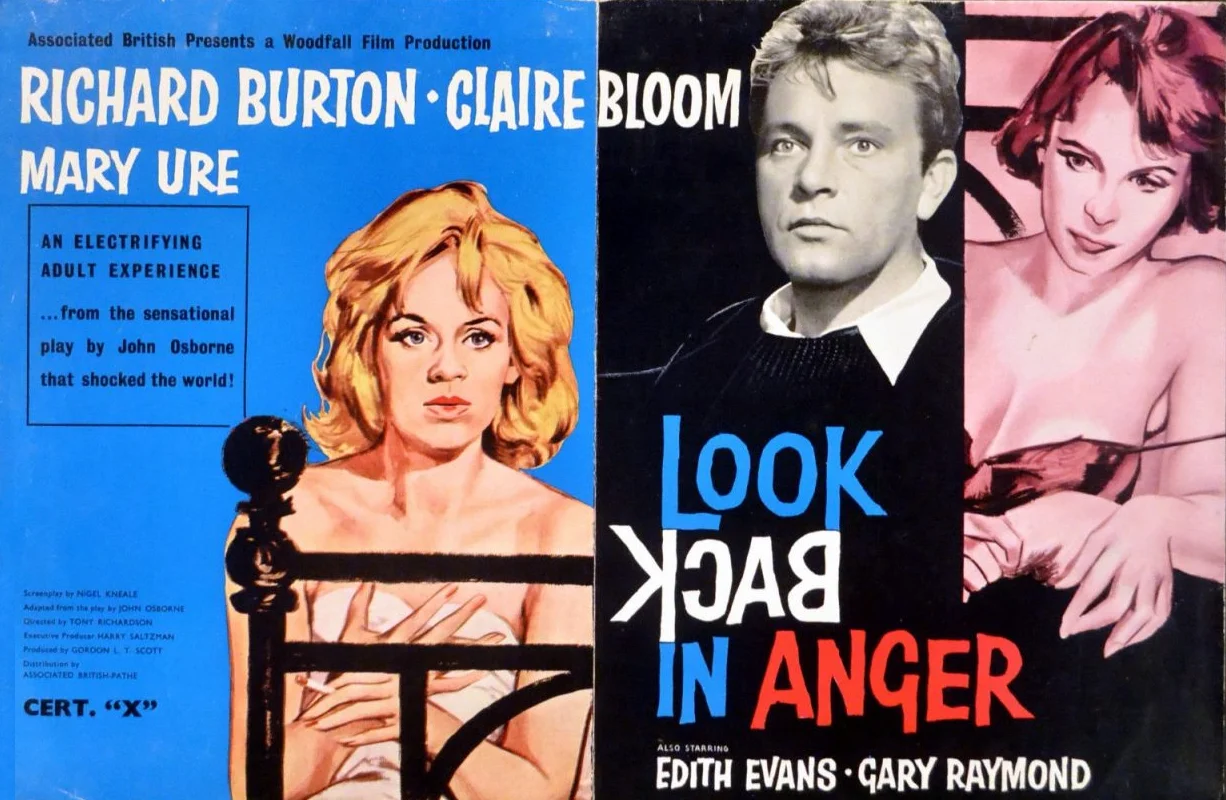
3/16:
It doesn't take long to realize that Look Back in Anger is Richard Burton's show all the way through and that he's
ready to destroy anyone with his superior acting.
However, it's not clear why his acerbic character is angry all the time who seems to be dead set in making everybody else
as miserable as he, hence the lowered rating.
A lot of people said that Richard Burton was too old to play the role. But I think he's fine. Claire Bloom and Mary Ure do a
good job of holding their own against the fiery star. Gary Raymond is the weakest link of the four, having used his dark,
pretty-boy looks to get by.
All in all, Look Back in Anger is a definitive British kitchen sink drama picture, but
A Streetcar Named Desire and
Who's Afraid of Virginia Woolf? are better.
Lookin' to Get Out (1982)
Rate:
6
Viewed:
12/17
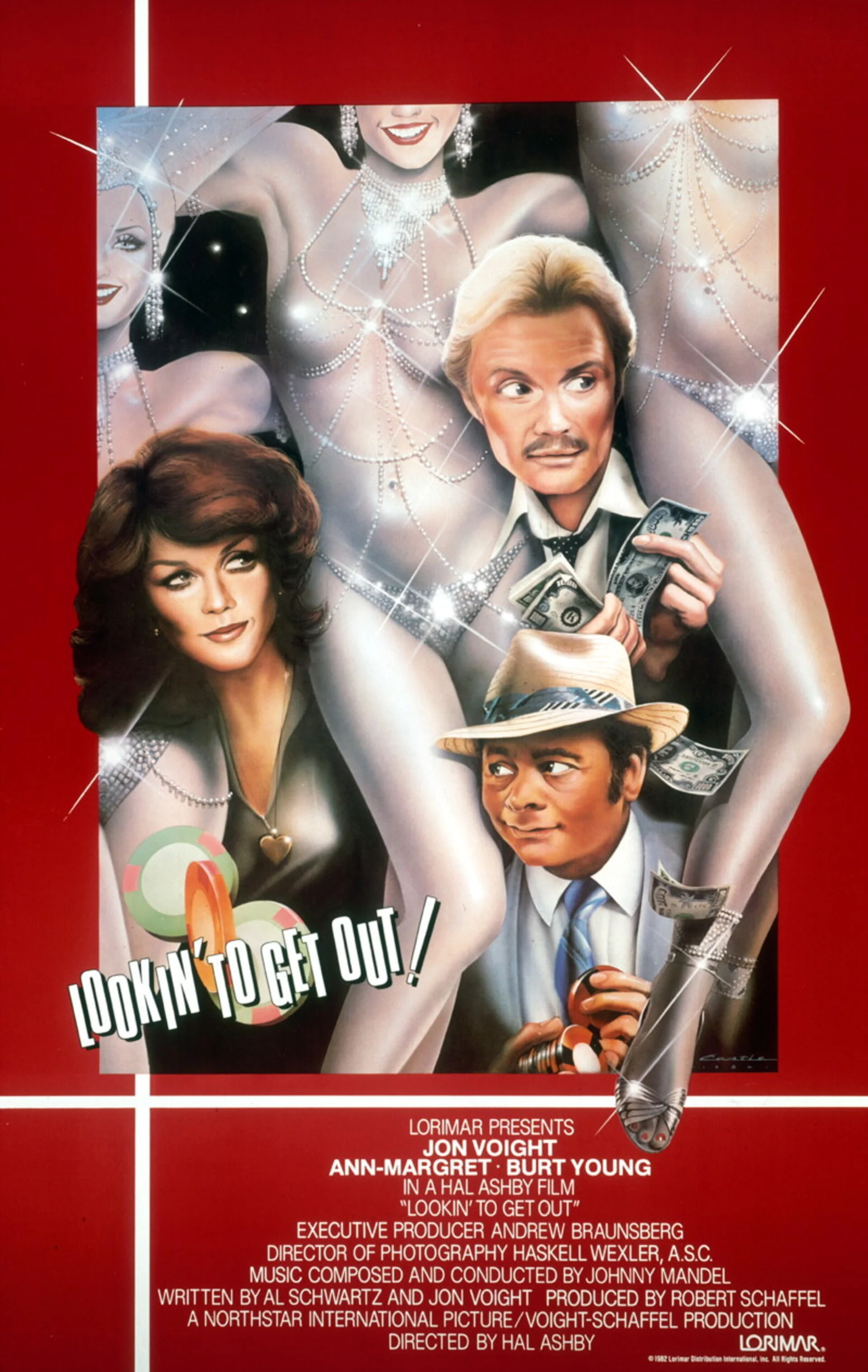
12/17:
I thought so.
Filmed in 1980 but was not theatrically released for two years, Lookin' to Get Out goes down the same path as
Second-Hand Hearts, marking the downfall of Hal Ashby's Hollywood career. Yet it's not a bad filmmaking effort by
any means which is similar to Atlantic City with some
Midnight Cowboy thrown in.
In the prime of his career, Jon Voight co-wrote the quirky screenplay and starred with Burt Young who may have given the
best performance ever. Yep, it's the first acting role for Angelina Jolie as she, at five years old, appears at the end.
Connecting the dots, it wasn't hard to make an educated guess of who that was before checking online.
But don't stop there. Wait for the great juggling act by Kris Kremo during the closing credits. It's mesmerizing
to watch. That's what I call talent unlike what a lot of people have nowadays. By the way, he was trained by Béla Kremo, and
the juggling act is virtually the same as passed down by his father.
All in all, to enjoy an Hal Ashby movie is to be open-minded, and that's what's needed to appreciate Lookin' to Get Out.
Looking for Mr. Goodbar (1977)
Rate:
6
Viewed:
12/16
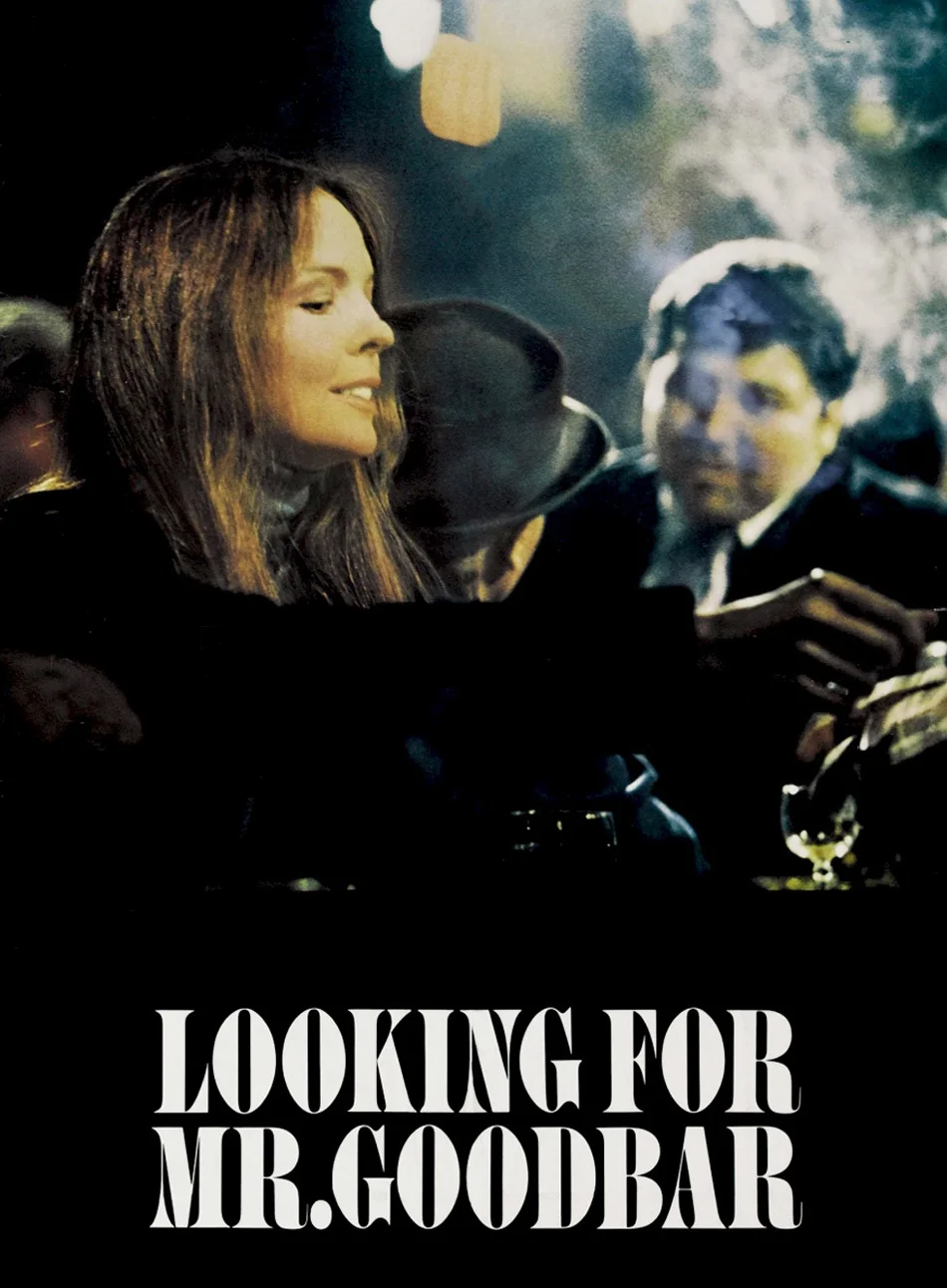
12/16:
Based on the real-life case of a female schoolteacher who was murdered in 1973, Looking for Mr. Goodbar is a disjointed
mess with many repetitions, but the point has been made.
It's pretty much Diane Keaton's movie, and she gives a realistic performance. Her character, Theresa, tries to be part
of the times by getting involved with the bar scene, making a clumsy mistake here and there without being careful about
herself, and letting strange men come and go through her apartment.
In progression, every man is worse than the last. The final one turns out to be the worst of them all, costing her life
in an unforgettable bizarre rape-murder scene. At the same time, her drug use and appetite for sex spiral out of control.
It's easy to feel bad for Theresa, who shows symptoms of a borderline personality disorder, because she's the type
who can do a lot better by being with somebody who's at least decent. Really, there's no reason for her to consume drugs.
Checking out Diane Keaton's signs, they're accurate in two ways. When Theresa was learning ASL,
she showed beginner's mistakes which were either far off where the hands should be at or not technically correct. When she
worked as a teacher of the deaf and hard of hearing, her signs turned out to be correct. However, Theresa isn't a
good interpreter and thus needs more training. No matter what, it's an excellent job overall.
Tuesday Weld secures the only Oscar nomination (it should've gone to Diane Keaton who actually won the award during the same
year for her performance in Annie Hall) of her career by playing Theresa's sister. She's okay, playing a secondary
character who goes through the motions. LeVar Burton, who's famous as Kunta Kinte in
Roots, makes his
screen debut. The same goes for Brian Dennehy when I thought he had been acting for a long time up hitherto.
However, he wouldn't be popular yet until First Blood came along.
It's safe to say that Richard Gere and Tom Berenger launched their careers based on their work here. Both are good. The former
will do the exact same thing in Breathless. It's certainly different league for the latter, so I'm surprised. He
would later admit playing Gary gave him nightmares. By the way, when Richard Gere's character mentioned to Theresa
that he saw The Godfather and that he liked Al Pacino's performance, Diane Keaton was actually in it and had a
relationship with Al Pacino. Talk about feeling stupid.
All in all, Looking for Mr. Goodbar pre-dates the AIDS epidemic and shows how dangerous, especially for the females,
bar-hopping can be while under the influence.
Lord Jim (1965)
Rate:
9
Viewed:
12/16
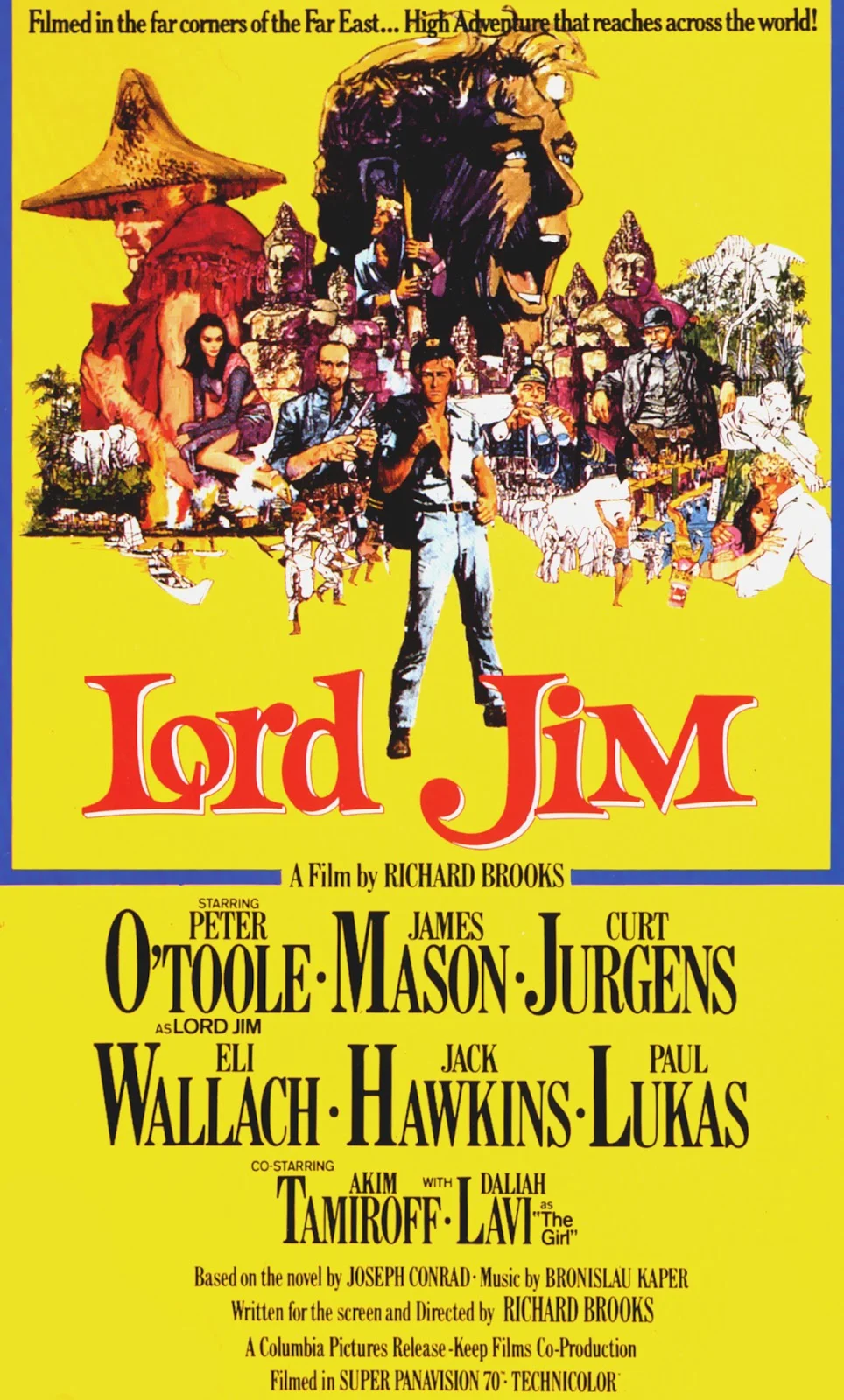
12/16:
If you can't get enough of Peter O'Toole in Lawrence of Arabia, then make Lord Jim your next fix.
I must say that I'm surprised at the negative reviews because it's a near masterpiece, but the film has a glaring fault.
Alan Osbiston's editing is awful. The pace moves too fast. I'm sure the average length per scene had to be between five
and seven seconds. There's no reason for it to happen. Let each sink in for a moment or two while allowing the thespians
to do the heavy work. When they, most especially Peter O'Toole, do their job, the results will come out good.
The film works well for the majority of the time. It's just that the editing left me peeved. One valuable asset Richard Brooks
brought to the table is Freddie Young's expertise. He did the cinematography for Lawrence of Arabia, winning himself
an Oscar. For Lord Jim, it's incredible once again, and he should've won another.
Peter O'Toole, of course, is marvelous. I can watch Lawrence of Arabia and Lord Jim back-to-back. He's a
big reason why both films worked. Peter O'Toole could act and was assuredly capable of leading an epic. He did say the role of
Lord Jim was the finest that he ever did, but everybody knows his work in Lawrence of Arabia will never be topped.
Eli Wallach and James Mason are great, bringing a dimension to their villainous characters. It's a different, interesting
role for each. Curd Jürgens is something else, too. Daliah Lavi is pretty and does a good job of playing the
mysterious woman. On a side note, she's actually Israeli, not Cambodian.
Parts remind me of Apocalypse Now which is not surprising because Joseph Conrad wrote the novels that served an
inspiration to both pictures. As a matter of fact, Francis Ford Coppola studied Lord Jim to prepare for his
Vietnam masterpiece.
Although it has bits of Hong Kong and Malaysia, Lord Jim was mostly filmed in Cambodia (Patusan as mentioned
is a fictional country). Everybody had a hell of a time there, causing them to fear for their lives from all
elements: tropical weather, diseases of the garden variety, stinging insects, slimy snakes and lizards,
restless natives, and potential political violence. Peter O'Toole went so far as to say, "If I live to be a thousand,
I want nothing like Cambodia again. It was a bloody nightmare." This statement led him to be banned from the
country for good.
Interestingly, Dith Pran served as a translator during the filming. He would later become the subject of
The Killing Fields which saw the actor, Haing S. Ngor, win an Oscar for Best Supporting Actor. He and Harold Russell,
from The Best Years of Our Lives, remain the only two nonprofessional actors to win an Academy Award for acting.
All in all, a complicated psychological drama with an action-adventure story to boot, Lord Jim is the Cambodian version
of Lawrence of Arabia.
Lord of the Flies (1990)
Rate:
7
Viewed:
8/13
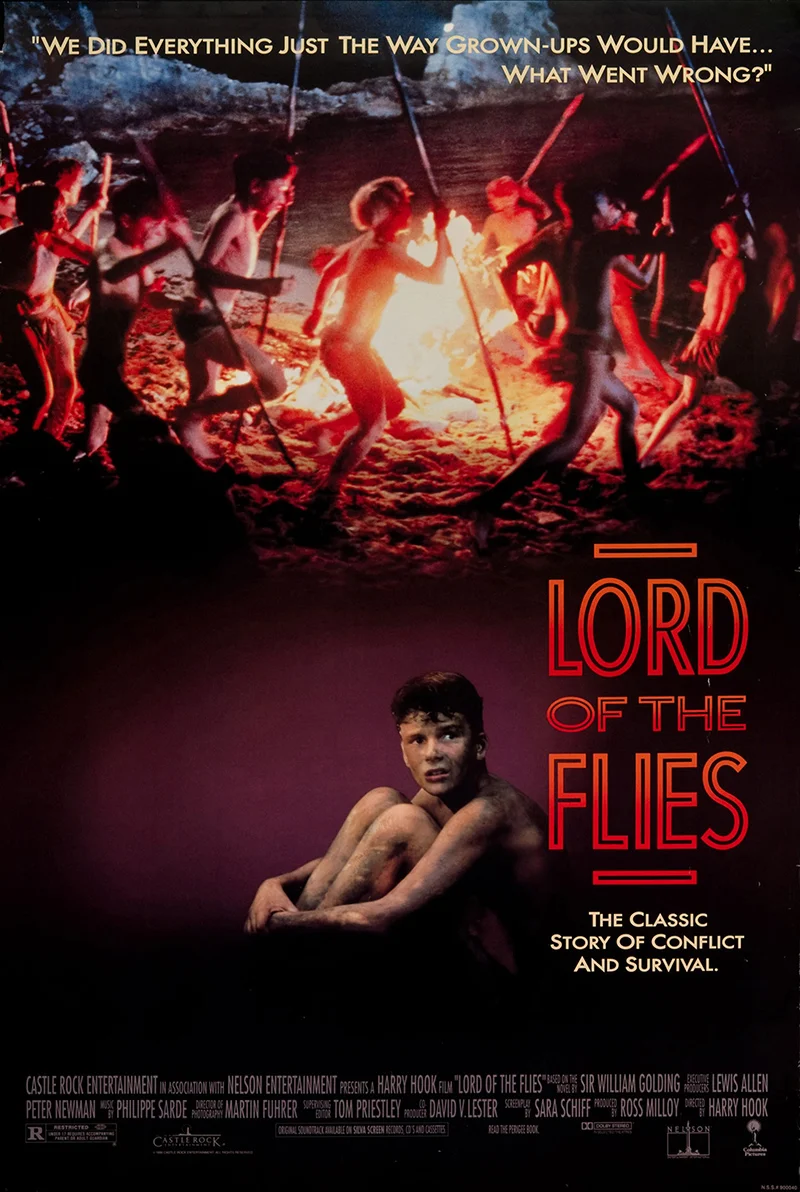
8/13:
What do you call a film that involves bad child actors running around in their underwear with painted faces?
Lord of the Flies although a more appropriate title should be What the Hell Are You Doing? I read the
book but didn't like it. After, I went straight for the film. There are significant differences between these two, but I like
the latter more because it's Americanized and thus not boring. The book is dated, ultimately tuning me out because of
the language. The movie deliver the points well but in a shorter amount of time.
I find the ending perfect. The sight of the Marine's face at the wild kids running around in their underwear is dang
hilarious. It just had to happen because if not, they were going to advance to the next stage: gay sex. If you hated Jack like
I did, then have no worries. The actor who played him is Chris Furrh. He served time in a Texas prison for unknown
reasons (probably drugs), and half of his body is covered by some of the worst-looking tattoos I've seen. By the way, glow
sticks don't last powerfully for a long time.
All in all, Lord of the Flies is all right.
The Lords of Discipline (1983)
Rate:
10
Viewed:
9/19

9/19:
The Lords of Discipline may be the best Pat Conroy film made.
If I thought Taps was corny, The Lords of Discipline is superior in every
aspect. It's also realistic and has a lot to say about racism, backwards thinking, and misplaced male
superiority. Pat Conroy attended The Citadel, and the story is based on his experiences and what he witnessed
for four years there.
There's an internal battle within David Keith's character. He knows the whole situation is wrong but
must keep it to himself in order to not to look silly in front of his fellow gung-ho military students. However,
he has to be a leader by showing everybody the way. Eventually, he makes the right decision because honestly...who
needs it?
The acting is very good. David Keith, fresh off from
An Officer and a Gentleman, and Robert Prosky get the top honors.
G. D. Spradlin and Rick Rossovich are also outstanding. Making his debut, Mark Breland, who plays the black
victim, is a former world and Olympic champion boxer in the welterweight division.
There's no such place called Carolina Military Institute. The Lords of Discipline looks like it was shot at
The Citadel with the intention of besmirching the school. Hence, it was instead filmed in England, specifically
at Wellington College, with some scenes in Charleston, South Carolina. Unsurprisingly, all military schools in
the United States refused any filming on their campuses to avoid the bad publicity after what happened
with Taps.
If I were presented with a challenge, I would never agree to the idea of going to The Citadel or any other
military school. The main reason is sleep deprivation. I hear an average cadet averages about five hours of
bedtime. That's unhealthy and unreasonable. I'll be easily worn out in a week with lowered immune system and
impaired judgment. Then, add the crazy yelling, forced calisthenics, and mindless chickenshit work into the
mix. Nope, that's not a challenge but a tremendous waste of my time and life.
All in all, The Lords of Discipline succeeds in making all military schools look bad.
The Lord's of Flatbush (1974)
Rate:
7
Viewed:
11/04, 10/06, 1/25

10/06:
Short on brains, The Lord's of Flatbush is a ridiculous atavistic picture about a primitive gang of
leather-jacket wearers in the Flatbush neighborhood of Brooklyn, New York.
Perry King looks stupid playing a character who's desperate in the attempt of getting into the pants of some girl.
Henry Winkler (this is before he was the Fonz in Happy Days) and Paul Mace (who's the biggest wimp if
I ever saw one) are forgettable.
The award for the worst acting performance goes to Sylvester Stallone. It's obvious that he was pretending to be
Terry Malloy while thinking himself as the second coming of Marlon Brando. The pigeon cage scene is downright
bad. At first, Sylvester Stallone was outside of it. Then, he went inside to yell after Perry King. Why
couldn't he go after him and have it out?
All in all, the four clowns in The Lord's of Flatbush need to grow up and get a real job.
1/25:
Time has now been kind to The Lord's of Flatbush.
Just think of it as a slice-of-life movie. Notice the misplaced apostrophe in the film title; that's because
these four guys in the "social athletic club" are idiots. Funnily enough, Perry King and Henry Winkler graduated
from Yale University. One of the two directors didn't know that until midway through the shooting when they told
him what's up.
Naturally, Sylvester Stallone and Perry King dominate the show while
Henry Winkler and Paul Mace have little character development. Henry Winkler used the basis of Sylvester Stallone's
character to create the Fonz for Happy Days. On the other hand, this is the film that started a lifelong feud
between Sylvester Stallone and Richard Gere, who was eventually replaced by Perry King, for failing to get along.
Between Stanley and Chico, who won? I'm going with the latter because Perry King is so good and likeable
that I might have had him pegged as the most likely actor to break through big time if I saw it in 1974. But we know
how it came out at the end. As a matter of fact, there wasn't much footage on Sylvester Stallone prior to the
making of Rocky, and this is the one that sealed the deal to give him the
go-ahead even though the studio execs were mistakenly excited to see Perry King in the role of Rocky Balboa.
There are plenty of memorable scenes in The Lord's of Flatbush, and the best one is Stanley with two women
at the jewelry store which was actually thought up and written by Sylvester Stallone.
However, the pigeon scene is absolutely the worst and most nonsensical with cheesy lines coming out of
his mouth. Just hilariously bad. Maybe that's meant to be keeping in line with these four idiots.
All in all, before there were Happy Days and Grease, there was
The Lord's of Flatbush.
Lorenzo's Oil (1992)
Rate:
10
Viewed:
5/16
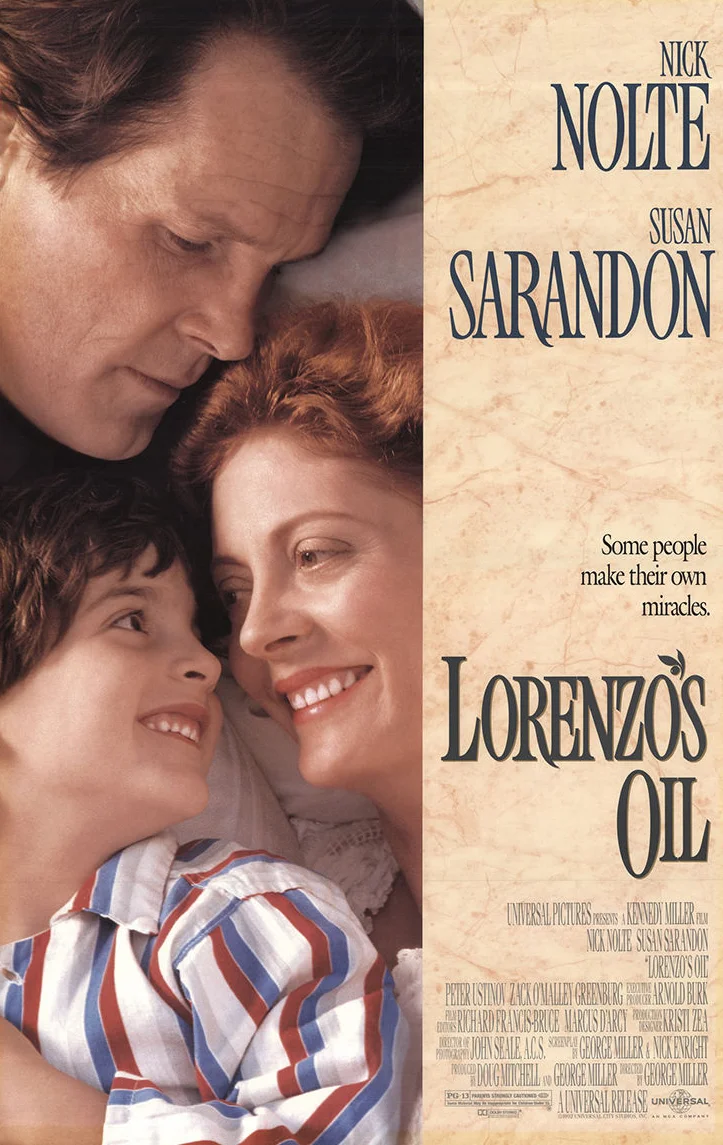
5/16:
Lorenzo's Oil is what movies should be about: to inform, to move, and to inspire.
Also, it contains some of the best acting I've seen from Nick Nolte to date. He's beyond brilliant. Most viewers don't realize
he was mimicking Augusto Ordone's mannerisms and speaking style right down to the eyeglasses hanging by his ear.
Basically, Lorenzo's Oil is about Ordone's son who was diagnosed with adrenoleukodystrophy (ALD) and his parents' quest
of a miracle cure for the deadly genetic disease because they refused to stand still and watch him die.
Despite having no medical background, they, after months of study, found a "cure" which is called Lorenzo's Oil, but it's
only effective before the onset of ALD happens. Regardless, the son ended up living two decades longer than predicted. As a result,
his father was awarded an honorary medical degree.
Susan Sarandon's performance isn't bad. Her character is interesting because she blurs the fine line between motherly
love and obsession. It's been confusing for me to judge her actions whether they were appropriate or not.
All in all, Lorenzo's Oil is an unexpected surprise from George Miller, the director of
Mad Max pictures, which features the best acting of Nick Nolte's career.
Losing Isaiah (1995)
Rate:
4
Viewed:
4/25

4/25:
Losing Isaiah will make somebody hate black people more than before.
In a potential career setback, Samuel L. Jackson has to play the bad guy by asking idiotic racial questions
like "Have you ever had your black pediatrician over to dinner, Mr. Lewin?", "When you and Isaiah read together,
do any of the books you read have African-American characters or pertain to African-American history or culture?",
"Oh, I'm sure you do, but is there a black face in any of them?", and "You ever stop to think how Isaiah must feel
living in a world where he never sees anyone like himself?"
To tell you the truth, while watching Losing Isaiah, race never entered my mind for the longest time.
I didn't see a white family adopting a black child. Instead, I saw a family adopting a child who was abandoned
by his birth mother. It's simple as that. A lot of viewers are mistaken that this happened for real
and that the story played out as exactly. As a matter of fact, the situations are completely
different if you think about Baby Byron in Pennsylvania during the 90's.
There shouldn't have been a case in the first place. Adoption laws are pretty clear in all states. Anybody who
abandons a baby for at least six months is charged with a low-level felony, if not misdemeanor, resulting
in a fine and/or prison time. Also, adopting a child after proof of abandonment and no contact from birth
mother and/or relatives has been furnished will sever any natural parental rights going forward.
In the movie, Isaiah was abandoned for two years with no contact from his birth mother. No matter she says in
terms of "but...I didn't know," it means nothing. Then, there is the history of substance abuse. She doesn't
have a steady job or a concrete living situation. What lawyer gave her is just for show. In other words, it's
not a stable life for Isaiah. The white family has the black mother beat in all departments by a wide margin.
Race has nothing to do with it. But it's Hollywood and they like to make up crap that won't stick in real
life. Let's backtrack this a bit and change one tiny variable while keeping the rest unchanged. What
if the adopting family was entirely black? Do you think there would've been a case in the first place? Of
course not. That's why the movie doesn't work because the argument holds no water whatsoever. If I were the
white mother, I would refuse to help the black mother with Isaiah and move on. Let her deal with the problems,
and remember...she asked for it.
All in all, Losing Isaiah shouldn't have been conceived from the get-go.
The Lost Boys (1987)
Rate:
8
Viewed:
10/03, 12/05, 1/22
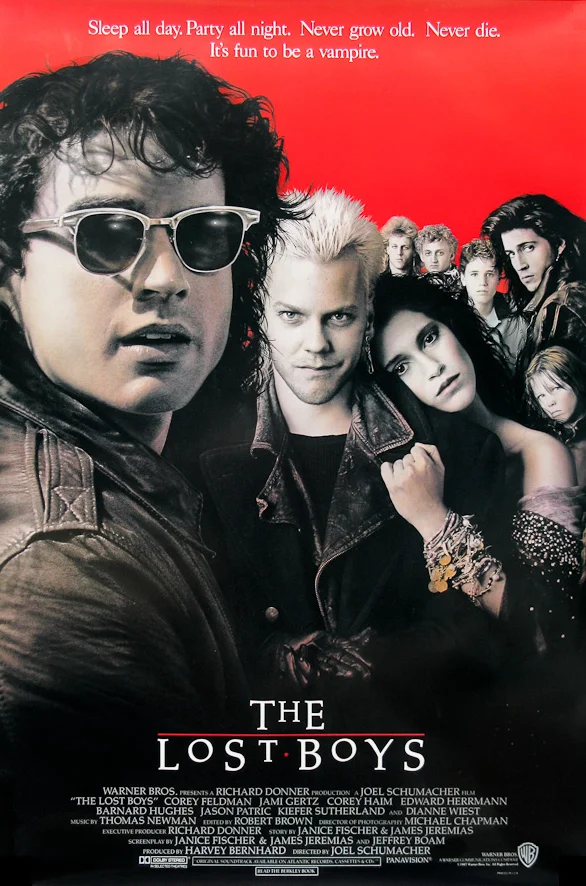
12/05:
The Lost Boys is the most Joel Schumacher film made: all style but little substance.
Although the cast looks the part when it comes to 80's fashion and style, the acting is across-the-board amateur.
The horror story is nothing new: a new-born vampire suddenly has a conscience. It's been done countless times.
The most recent film I can think of is Interview with the Vampire.
For a 98-minute movie, I swear to have heard the name "Michael" so many times that I looked up the internet for the
actual count which turns out to be 118. By the way, it's a cool-looking movie poster which is easily its
biggest selling point.
All in all, The Lost Boys is a stylish vampire picture.
1/22:
Mostly shot on location in Santa Cruz, California, The Lost Boys is a stylish, sexy vampire picture
that ranks one of the best in Joel Schumacher's oeuvre.
Everybody is famous for appearing in it: Jason Patric, Corey Haim, Kiefer Sutherland, Jami Gertz, Corey Feldman, Brooke
McCarter, Alex Winter, Jamison Newlander, Billy Wirth, and Chance Michael Corbitt. When Michael eyed Star for the first time,
the muscular saxophone player is Tim Cappello who had done supporting work for Tina Turner. Dianne Wiest will do a similar
role in Parenthood that saw her be Oscar-nominated.
The best part is Robert Brown's editing. It's what makes The Lost Boys go. Unfortunately, an annoying aspect
is the Frog brothers screaming. At least, Corey Haim's presence drowns them out while Jason Patric and
Kiefer Sutherland provide the look. There are some funny parts as well.
All in all, The Lost Boys is an unforgettable 80's film featuring the best cast of teen pop stars.
Lost Command (1966)
Rate:
3
Viewed:
3/25
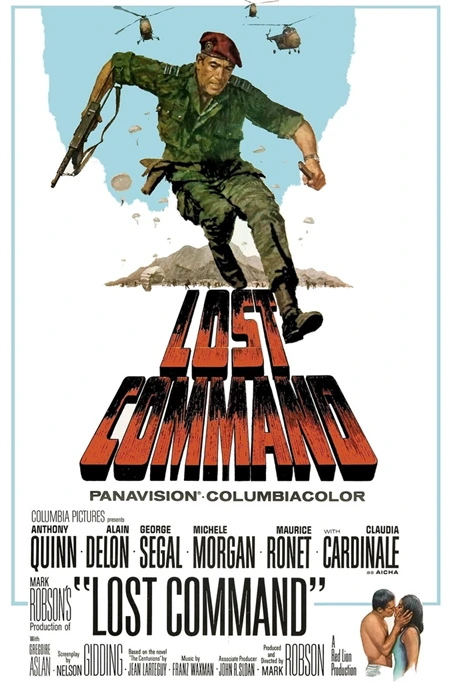
3/25:
Why must they insist on making war pictures to bore me to death?
One of them is Lost Command. It's based on a French novel called The Centurions by Jean
Lartéguy that became a literary sensation. Dealing with guerilla warfare and terrorism is part of its
uniqueness that would foreshadow the wars that the United States got involved with.
Let's be real: who are the bad guys? It's the French who had no business being in Algeria. They're
the true murderers, committing crimes against humanity. It first began with the slaughter of up to 12,000
Muslims in Philippeville which set off a war that lasted from 1954 to 1962. As usual, France lost, and
Algeria achieved independence. According to one report, "French historians estimate that up to 400,000 Algerians
were killed, while the Algerian government says more than one million people died." Many were abused, raped, and
tortured as well.
You know who George Segal is...the guy who was Oscar-nominated for
Who's Afraid of Virginia Woolf? Now, picture
him as a dark-skinned Arab. What an embarrassment. They could've gotten somebody else, even a nonprofessional
actor, to play Mahidi. How about that Claudia Cardinale? She may be a beauty, but for an Arab, how come she's
allowed to walk around in the city without wearing a full Islamic attire?
All in all, no matter how much Anthony Quinn is shown, he can't prevent the awfulness of Lost Command.
The Lost City (2005)
Rate:
6
Viewed:
5/24
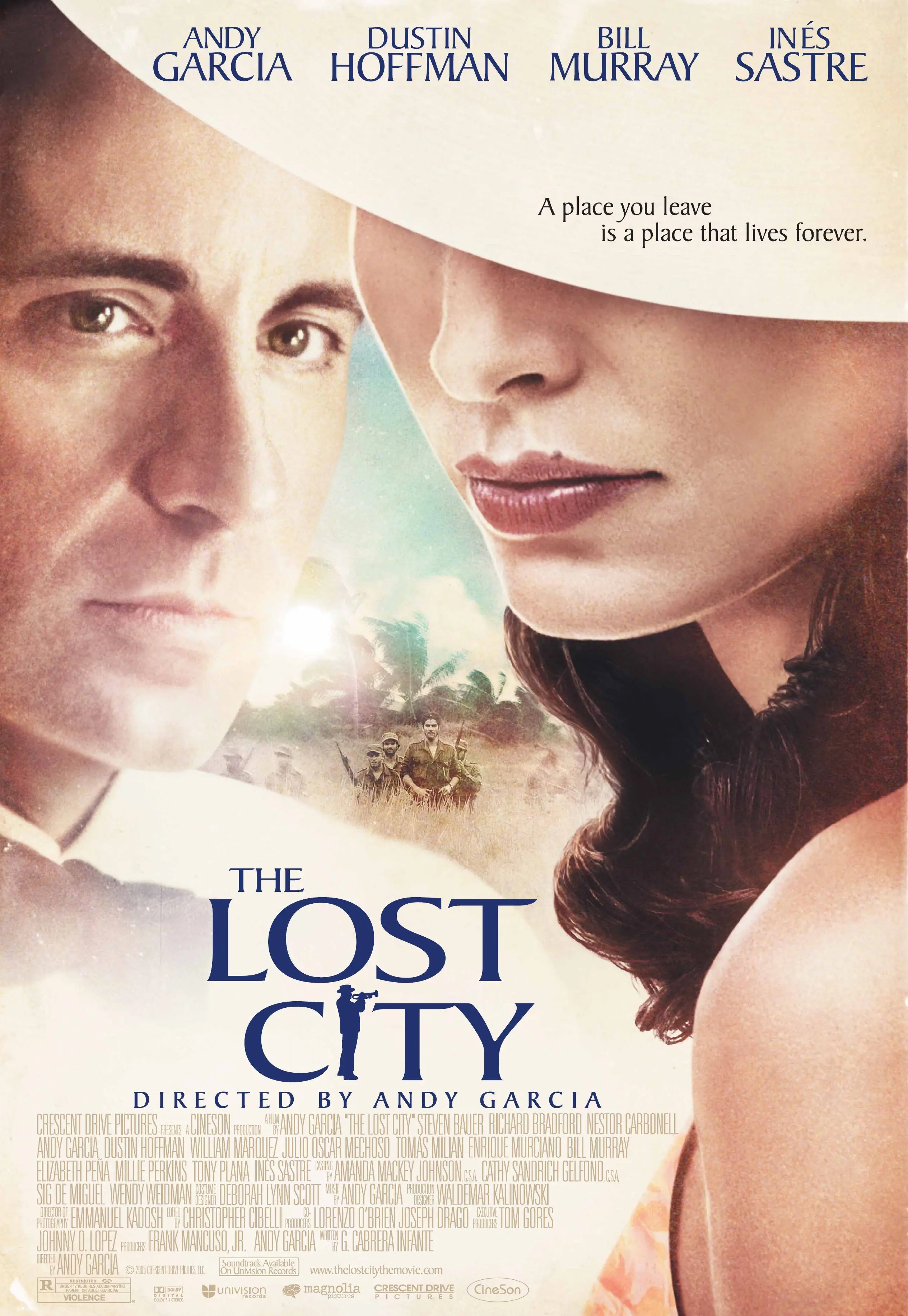
5/24:
It's inevitable: Andy Garcia must direct a movie about his native country Cuba.
The problem? Nobody cares. Hence, it grossed $4.4 million against a budget of $9.6 million. You know, every
time the story takes place in Cuba, it always has to be about the revolution.
The Godfather Part II covered the subject so well that there's no
need for another. Then, Robert Redford must have his own: Havana. It became
one of the biggest bombs ever during the 90's. Not the one to be daunted, The Lost City appeared, and
*drum roll* history repeated.
To be fair, it's a nice-looking picture with plenty of Cuban music and fashion which was actually shot on
location in the Dominican Republic; that's because it would've been 100% impossible to do so in Cuba. Another
treat is the collection of familiar Latino stars from way back such as Tomas Milian, Elizabeth Peña, Tony
Plana, Juan Fernández, and Steven Bauer. Strangely, almost everybody in the cast isn't Cuban, and it's a very
English-speaking picture given that the official language of Cuba is Spanish. Anyway, the acting is fine, but
I question the ornamental presences of Bill Murray, although I understand he's there as the sarcastic voice
of reason, and Dustin Hoffman.
In spite of the thin story that's not initially ambitious, the second half is better than the first, but Andy
Garcia has a hard time letting the film go, hence the prolonged ending of him on the stairs. He also makes
Cuba irrelevant in the eyes of common people as they're never featured; it's all about the elite, wealthy
people who felt forced to give up everything and leave the country for good.
By the way, the on-screen depiction of Che Guevara is accurate; he was actually a mass murderer and an idiot
windbag whom nobody including Fidel Castro could stand. That's why he was sent to Bolivia in the form of good
riddance. As for the revolution, it was simply a corrupt leader being replaced by an even more corrupt leader.
When Andy Garcia's character made an insulting remark at the party with Castro standing atop the balcony, he
would've never gotten away with it. The most likely outcome is he would be imprisoned, tortured, and summarily
executed by a firing squad. As for his "girlfriend" showing no interest in leaving the country, it's no big
deal to me because she happened to be his...late brother's wife!
All in all, The Lost City is a fair directorial achievement by Andy Garcia, but it runs too long by
trying to touch everything as possible.
Lost Highway (1997)
Rate:
3
Viewed:
9/11
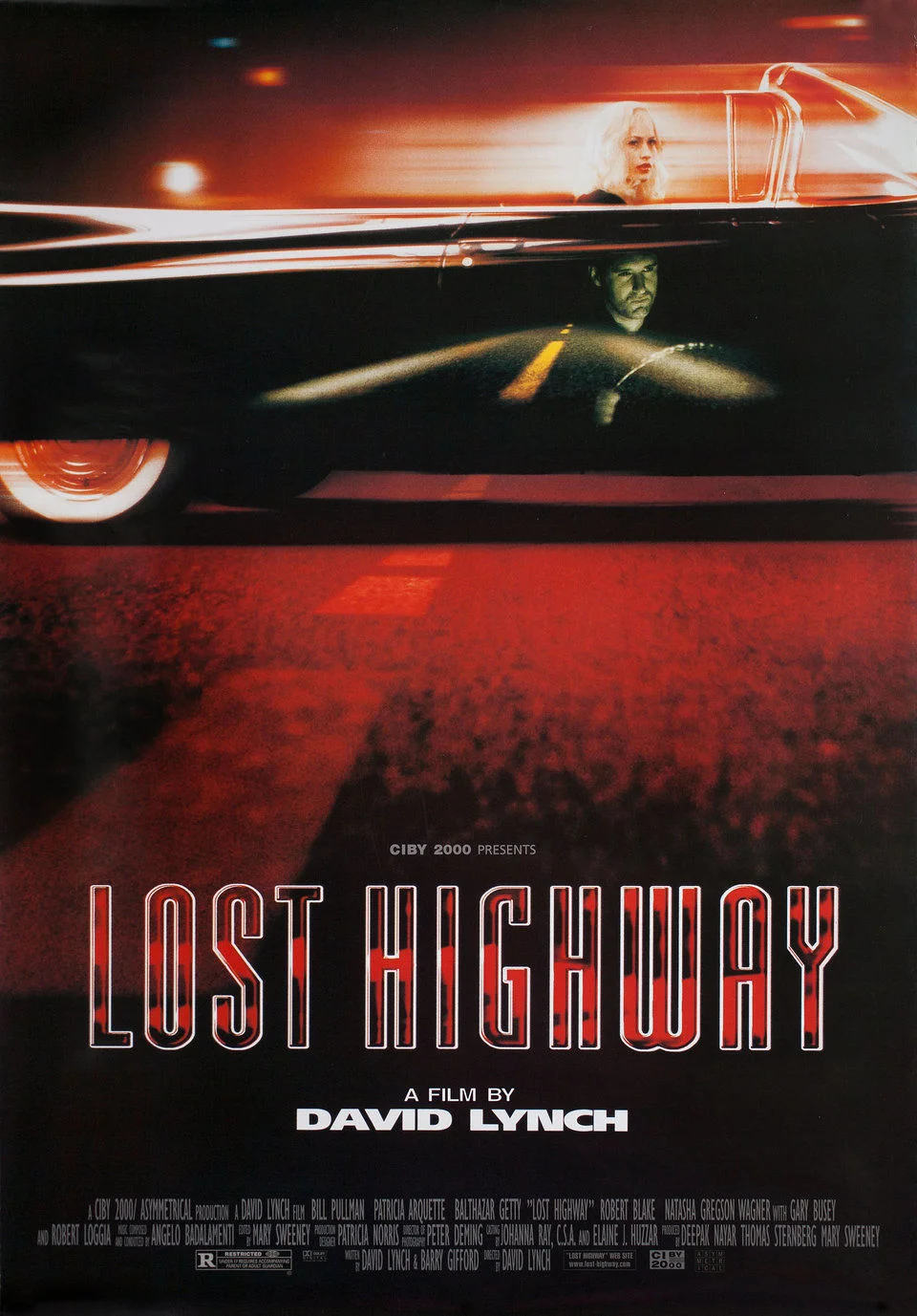
9/11:
Yeah, it's what I call a David Lynch experience and a bad one at that.
Lost Highway seems to have all the right elements, but it falls apart midway when I asked myself a simple question:
"What's the point?" It's also long to sit through, leaving me uneasy in the hopes of a quick finish. Hence, forty-five
minutes should've been cut out.
The film starts off slowly during the first half-hour by not getting anywhere, and then, all of a sudden, it's a whole new
ballgame. Eventually, two threads link together that's abstractly accomplished. The plot is common which is about a guy losing
his self-control by letting a woman decide his fate. If not for David Lynch's name, the film deserves a rating of '1'.
All in all, I'm beginning to realize that David Lynch sucks.
The Lost Skeleton of Cadavra (2001)
Rate:
1
Viewed:
10/08

10/08:
I was fooled big time by the DVD cover of The Lost Skeleton of Cadavra, thinking it's a film from the 50's.
As soon as I played it, I realized my mistake after seeing how modern everybody looked and acted. The rest of the way is
mindless drivel. After looking up the internet, I didn't know it was meant to be a spoof of 50's sci-fi pictures given
that I didn't laugh the entire time.
All in all, Plan 9 from Outer Space is shockingly better than The Lost Skeleton of Cadavra.
The Lost Weekend (1945)
Rate:
4
Viewed:
12/10

12/10:
Can I hear a round of applause for the one of the most overrated Best Pictures of all time: The Lost Weekend?!?
What the hell were they thinking that time? The topic has been played so many times throughout the history of
cinema that I'm convinced the role of an alcoholic is by far the easiest. All an actor has to do is to get
drunk and bingo! An Oscar on a silver platter. It's exactly what happened to Ray Milland.
The Lost Weekend is a talky picture that paints an incomplete story of how Don Birnam got to this point. I don't know
why I must care about him. Alcoholism is so damn common that it has been around since liquor was invented
ten thousands of years ago.
It's a poorly written picture which is a surprise considering it was penned by Billy Wilder. He could've made it better.
The ending is laughably bad and unrealistic. Don Birnam gets saved easily just like that! That old Hollywood crap is becoming
too much for me.
All in all, The Lost Weekend is overrated.
The Lost World: Jurassic Park (1997)
Rate:
5
Viewed:
12/13

12/13:
The Lost World: Jurassic Park is slightly better than the original because it doesn't rely too much on stupidity,
but it's still a dumb picture all the same.
After what happened previously, why will the mathematician revisit the island that's populated with dinosaurs?
Also, he can do better than the infinitely ugly Julianne Moore.
As the film is meant to be anti-capitalistic, it ironically engages in capitalism. Speaking of the plot, if the old man,
who's insane to begin with, is intent on making sure the dinosaurs aren't taken out of the island, why not send an army
of mercenaries? Instead, a scientist, a photographer, a mathematician, and a hunter are taken advantage to get the job done.
To cap it off, I'm forced to watch the Godzilla crap which gets old quickly. I still don't understand the logic of
bringing a Tyrannosaurus rex to the United States. Is it because the audience want to see carnage?
All in all, The Lost World: Jurassic Park is for bloodthirsty idiots.
Love & Basketball (2000)
Rate:
2
Viewed:
9/13
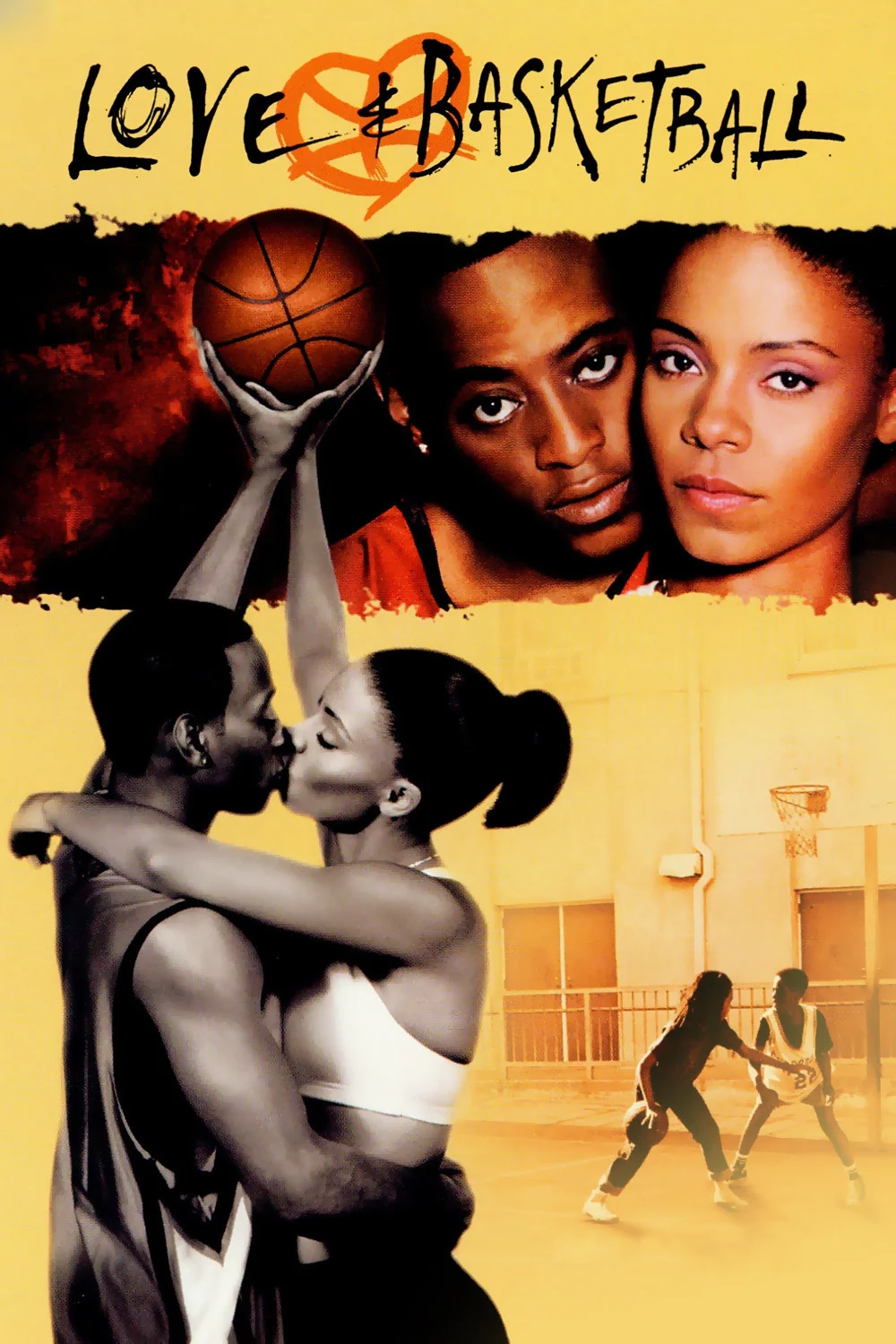
9/13:
After seeing Omar Epps in Love & Basketball, I'll say it's time for him to retire from acting for
good or pretend to be the head coach of the Pittsburgh Steelers.
All Omar can do is: look down and then up, show off his eyes, do something with his lips, and go slow-mo
with his face as if he has "mad skillz." His female co-star isn't any better, and they have zero chemistry.
As for the film, nothing much happens. In fact, there's no story. Five years pass without contact between these
two all because she didn't want to miss her curfew. Yeah, right.
There's little basketball involved. The characters are poorly developed. Some of them don't appear for a long
time. When they do, it's too late, adding nothing to the story. I didn't feel engaged with whatever was going on.
Nobody has friends; it's just each other among family and neighbors. After being forced to put up with corny,
cringeworthy scenes, I was like, "Duh," when the ending came.
All in all, Love & Basketball is an all-around bad movie.
Love Among the Ruins (1975)
Rate:
6
Viewed:
5/24
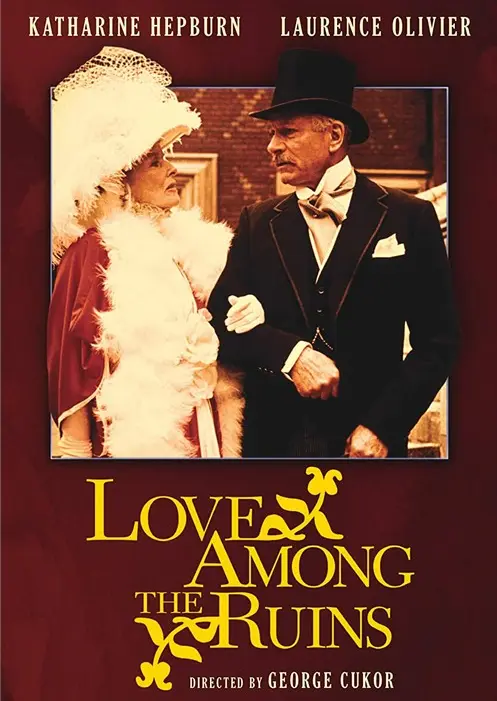
5/24:
Love Among the Ruins is too unconvincing.
It starts with Katharine Hepburn who tries to be all that and more. I've always hated her and thus can't
stand her. She's 100% lesbian. How any guy could fall head over heels at the sight of Katharine Hepburn is
beyond me. In truth, her role of Jessica Medlicott feels like it was meant to be for Vivien Leigh, a far superior
actress, but she passed away eight years earlier at age 53.
On the other hand, Laurence Olivier is in top form, showing why he was among the best thespians ever. The way
he spoke and handled the language is brilliant. But the problem with the well-written script is that it's often
suffocating. So many words when a few will do to get the point across. The case about the breach-of-promise crap
is rather silly and could never happen the last 75 years in the United States. Yet Douglas Slocombe's
cinematography is fantastic along with the locations, cars, and costumes.
All in all, had it been Vivien Leigh instead of Katharine Hepburn for Love Among the Ruins, I would've
believed the story more.
Love and Pain and
the Whole Damn Thing (1973)
Rate:
3
Viewed:
7/25
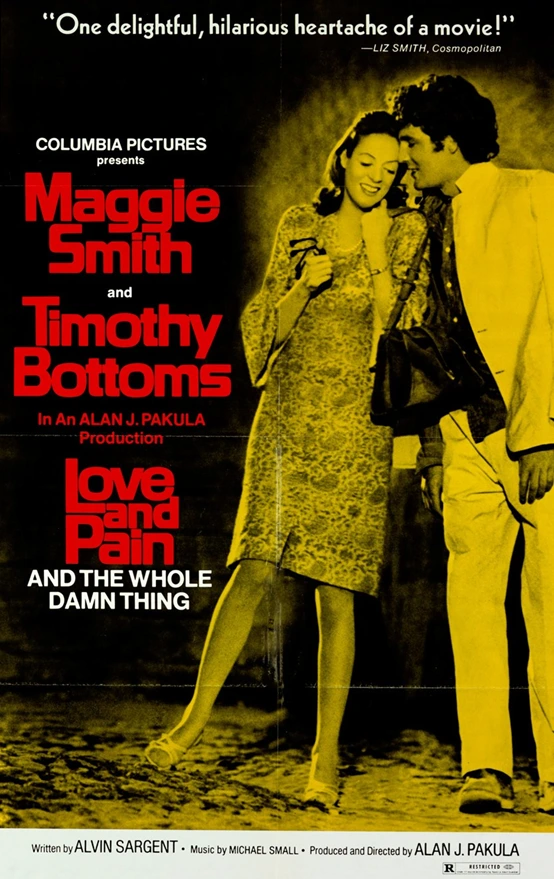
7/25:
Timothy Bottoms once said in an interview, "I do not consider myself that good of an actor. I take dialogue
and direction given and try to make choices that pleases the director."
It shows in Love and Pain and the Whole Damn Thing. This is the best anyone is going to get from Timothy
Bottoms despite appearing in The Last Picture Show and
The Paper Chase. As a result, Maggie Smith was left foundering for
herself while he fell off the map for good.
Timothy Bottoms plays a hopeless, immature loser who gives off heavy vibes of a rapist. Maggie Smith's klutz
character has no inkling of how potentially dangerous he is. That one night at the hotel in Spain is a good
glimpse, but it doesn't matter anyway because she'll pass away shortly from an undisclosed illness.
To make matters worse, the film is full of clichés, having been covered so many times like
Love Story, Harold and Maude, and
Bobby Deerfield. The photography of Spain is okay considering it was
handled by Geoffrey Unsworth. It's keen that, at one point, a tour guide mentioned
King of Kings was filmed up the hill. At the beginning, the two
leads were revealed to be learners of Spanish at the beginning stage, but there are almost no subtitles to show
what they were saying. Not long after, they've completely stopped playing around with the language.
All in all, it's uncomfortable to watch Love and Pain and the Whole Damn Thing because of Timothy
Bottoms' character.
Love at First Bite (1979)
Rate:
2
Viewed:
4/08
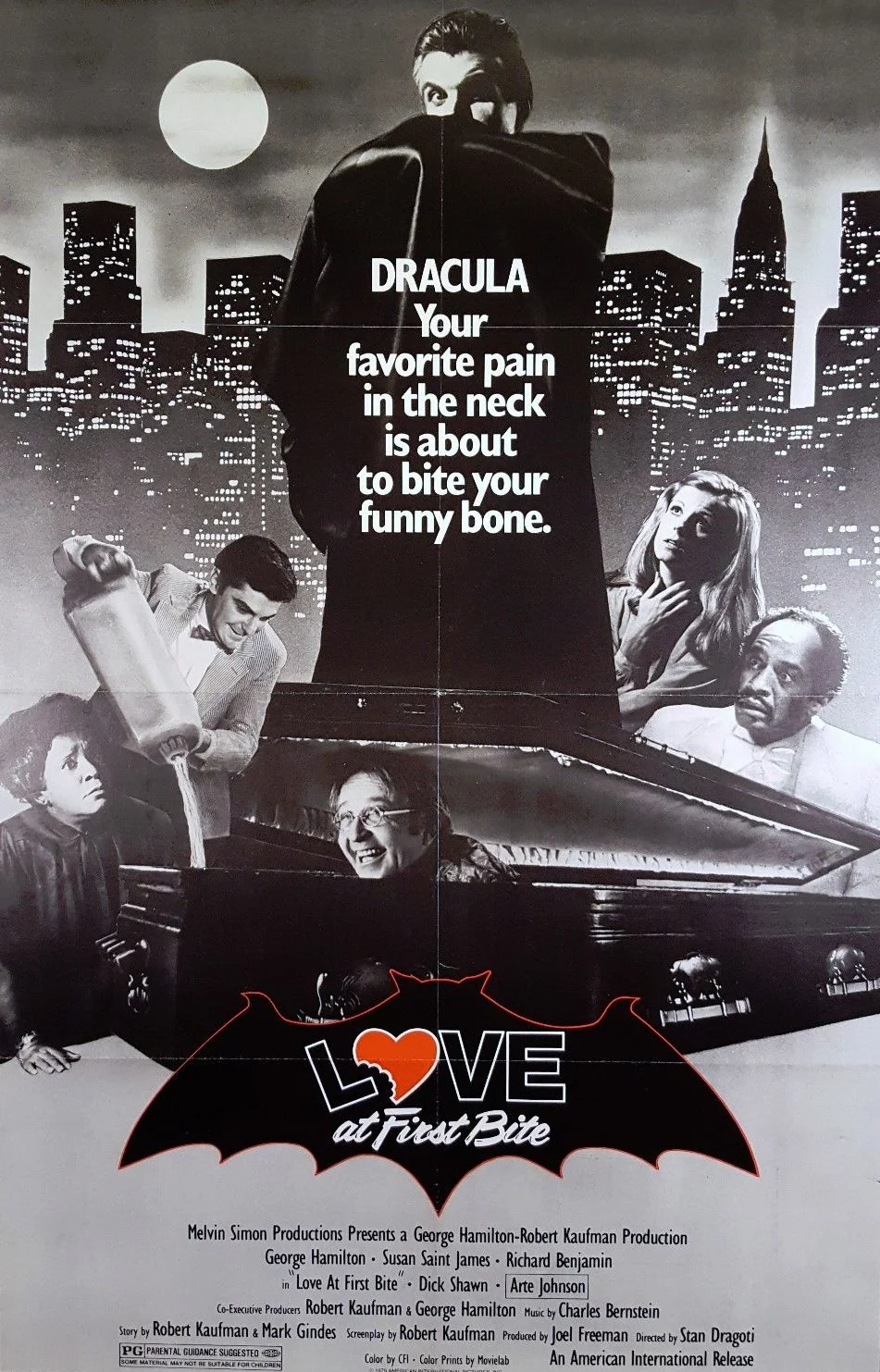
4/08:
Zorro, The Gay Blade had me laughing hard, so I was interested in
another comedy with George Hamilton.
This time, it's called Love at First Bite. My expectations were initially high, and I wanted a laugh-fest again.
After half an hour into it, I was thinking, "Damn, this is boring." Sadly, there aren't many jokes to be found.
Richard Benjamin, a Sean Connery look-alike, ruins the movie. George Hamilton doesn't do much. Based on the
high amount of alcohol, tobacco, and drug consumption, Susan Saint James' character looks like she's heading down the same
route as Baby Jane Hudson.
All in all, Sleep at First Bore is more like it.
Love at Large (1990)
Rate:
7
Viewed:
7/20
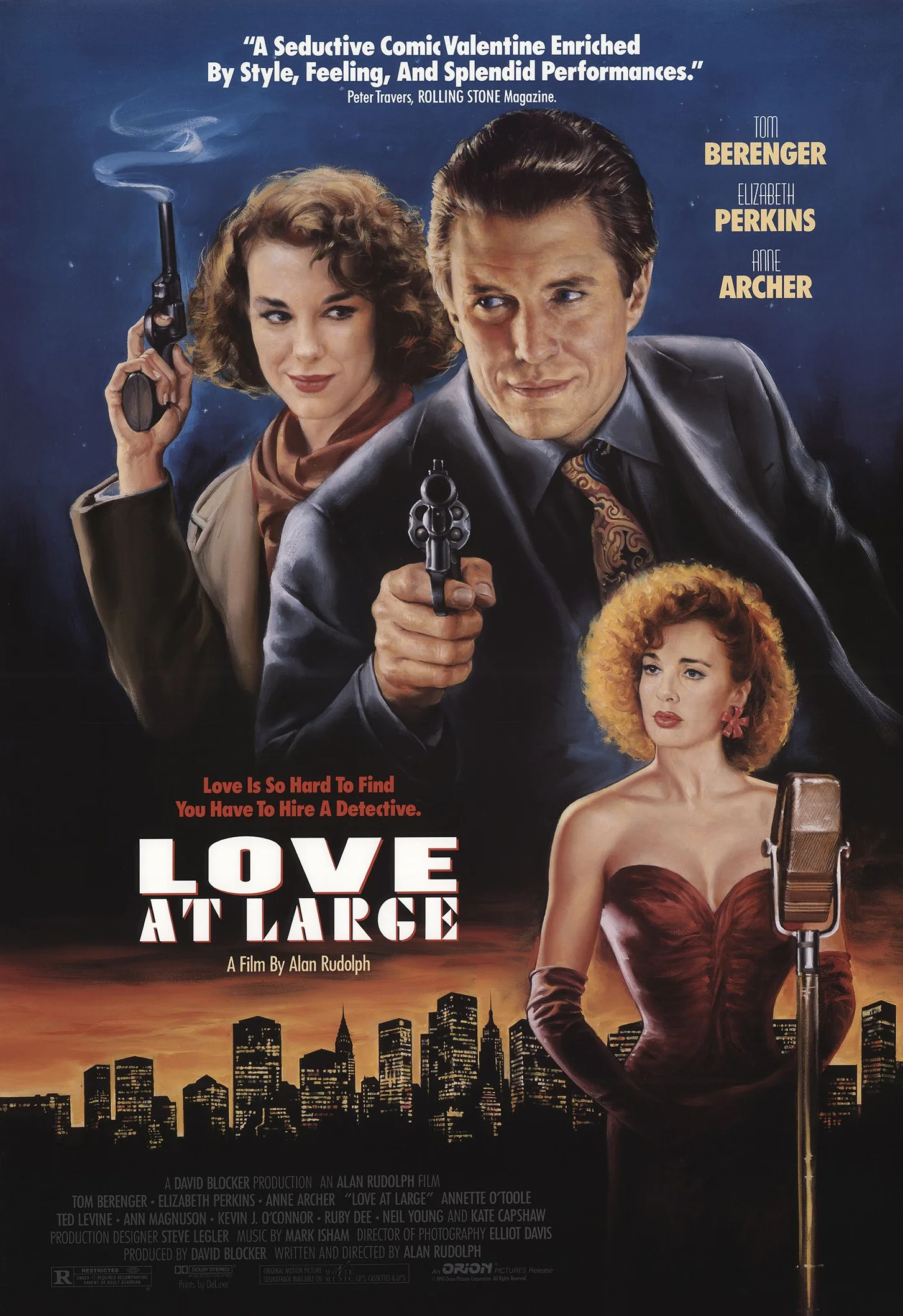
7/20:
If you told me Robert Altman directed Love at Large, I would've believed it.
But Alan Rudolph is the one who did. I'm a big fan of his two Keith Carradine films:
Choose Me and The Moderns.
The style of Love at Large is similar to Robert Altman's pictures, especially when it comes to the zoom-in-and-out
effect.
Tom Berenger made his living by appearing in many sexy psychological thrillers that require a suspension of disbelief such
as Last Rites, Shattered,
Sliver, and Body Language. This one is among them, and it's an
keen picture that's full of anachronisms which sometimes poke fun at past potboilers. Yet the noir atmosphere is the
key element.
There are good performances by Tom Berenger, Ann Magnuson, Elizabeth Perkins, Ted Levine, Annette O'Toole, and, most of all,
Anne Archer who must have known what she was doing by exaggerating her character. When I saw his name during the opening
credits, I said to myself, "Neil Young, the musician?" At any rate, it's an interesting choice.
The P.I. follows the wrong guy, and it's total fun all the way through with no real importance. But the
case didn't go waste because three positive things came out of it: he got the right girl, Miss Dolan was finally rid
of the dangerous boyfriend, and the mystery man would stick to one family from now on. Despite everything, it's
exactly what Stella Wynkowski was looking for in her life: some danger.
All in all, Love at Large is an amusing film that keeps changing things up every five minutes.
Love Is a Many-Splendored Thing (1955)
Rate:
3
Viewed:
10/14

10/14:
Who can believe Jennifer Jones as a Chinese, an Eurasian, an European, or whatever the hell she's supposed to be in
Love Is a Many-Splendored Thing?
Some of my favorite lines from her character are: "My father was Chinese. My mother was English. I think of myself as Chinese,
however," "Like all Chinese, I'm spellbound by my own country," "No Chinese girl would dare dine alone with an American she
had just met," "I am still Chinese," "I'm Eurasian," "My Chinese side was debating with my European side," "In my heart, I am
Chinese," and "I'm proud to be Eurasian."
Hey, Suyin, do me a favor...please shut the fuck up. Besides, where does she come off thinking that being Chinese or Eurasian
would make her so damned special? Her corny fortune-cookie talk is hard to bear. On the other hand, William Holden is okay,
but his character is a cad. There's no chemistry between him and Jennifer Jones. Every scene has been as if they
just met on the first day of filming. In fact, both didn't get along during the entire time. According to Wikipedia:
"Holden was turned off by Jones' obsessive involvement with her character and complaints about her makeup, which she said
made her 'look old,' costumes, and dialogue. According to Holden's biography, Jones was also generally rude and abrasive to
everyone involved in the production."
The plot is as cardboard as it gets which basically goes like this. A man sees a doctor at the party. He asks her out for a
date. The next day, they go for a swim. Within a month, they get married despite the fact that he has no time for her.
Finally, he dies during the war. Hence, it's the weepiest love story of all time. The things they said,
I just wanted to bury my head in sand.
Oscar-nominated for Best Cinematography in Color, Love Is a Many-Splendored Thing looks fake because of the extensive use
of mattes. It turns out that most of the film was shot on location in California, not Hong Kong, including the couple's special
meeting place with a solitary tree atop the hill.
Ironically, two Chinese characters, Ann and Suyin's sister, are played by white females because the theme of the
film is about overcoming racism. I mean, one billion people in China, and they still couldn't find anyone? Hands down the
most ridiculous and corniest scene ever is when Jennifer Jones and William Holden kissed each other with their cigarettes.
What?!? Please pile on more sand over my head.
All in all, The World of Suzie Wong is an infinitely better film than Love Is a Many-Splendored Thing.
Love Jones (1997)
Rate:
2
Viewed:
6/24

6/24:
There were a lot of cheesy movies released in 1997, and Love Jones is among them.
The sex-obsessed screenplay is awful. So are the characters. Larenz Tate and Nia Long have virtually zero chemistry. The story
has been done hundreds of times before, going back to The Way We Were with
Robert Redford and Barbra Streisand. That being said, Love Jones was already over after the first breakup.
I checked whether or not writer-director Theodore Witcher had done more films. It turns out to be one more after this, signaling
the end of his Hollywood career. The poems by the lead characters? Gee, they're so bad that I laughed at every line.
She even threw her book in the trash can.
Larenz Tate looks uncool when he smokes. Then, Nia Long undermines herself when she decides to adopt his habit. There are a lot of
cringeworthy scenes, but the worst is the final one when Larenz Tate went outside in the pouring rain for Nia Long instead of
meeting her inside the club. No matter what, I know their characters will break up in the near future.
All in all, I hope never to see anything like Love Jones again.
The Love Letter (1999)
Rate:
1
Viewed:
11/08
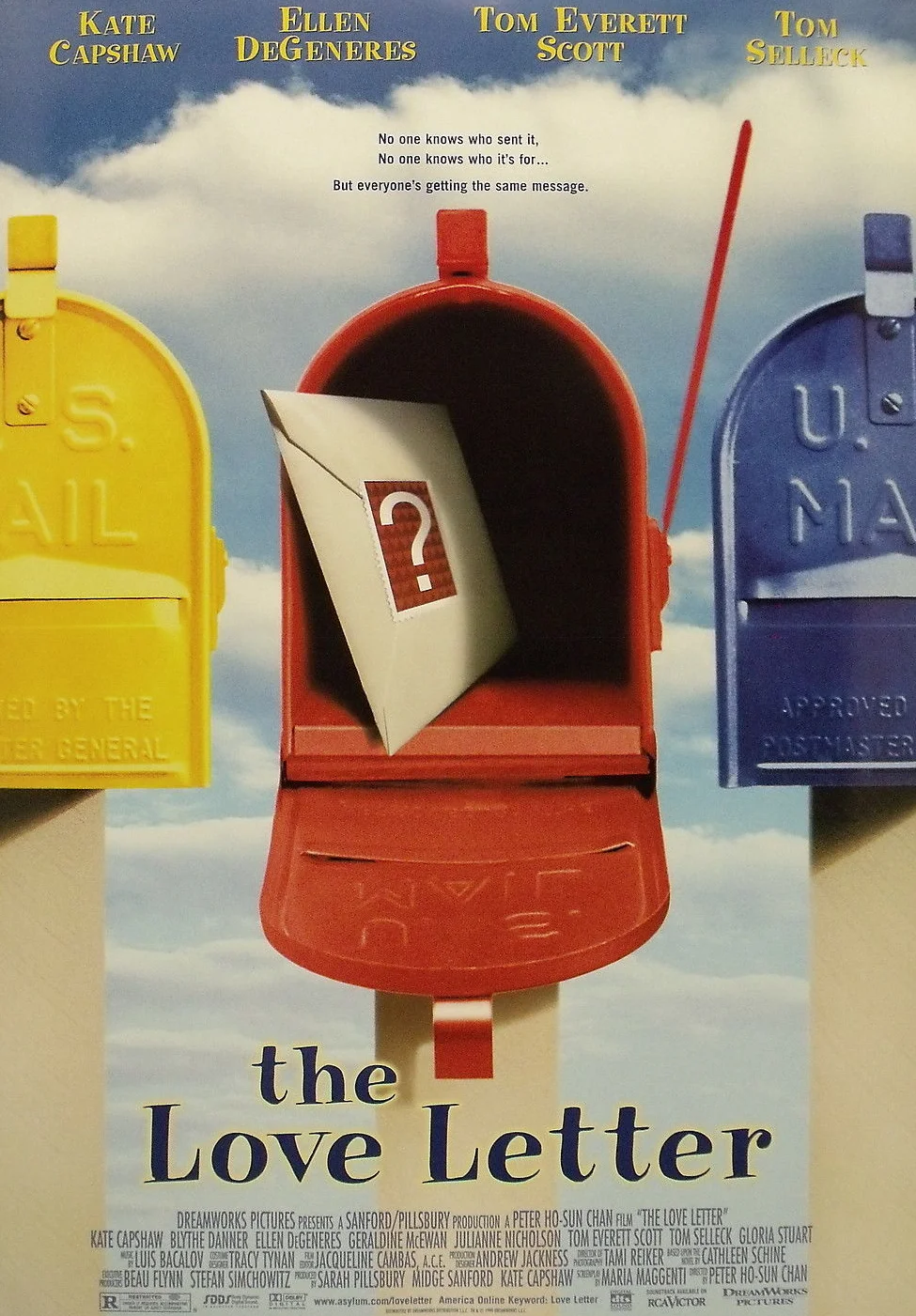
11/08:
The back cover of the DVD case for The Love Letter claimed to feature an all-star cast.
Wha...wha...wha...what? Kate Capshaw is described as an all-star given the fact that she desecrated
Indiana Jones and the Temple of Doom? Tom Everett Scott is an all-star given the fact that he's a full-blown dork
who hasn't starred in a hit movie apart from That Thing You Do!? Ellen DeGeneres is an all-star given
the fact that many people including me cannot stand her? Tom Selleck is an all-star given the fact that he turned down the
role of Indiana Jones so he could focus on his TV show?
Boy, Tom Selleck looks silly with these stupid glasses on. By the way, DreamWorks, which is co-run by Steven
Spielberg, financed The Love Letter. He's married to Kate Capshaw. Now, you can see how the old hag found work in
Hollywood. Of course, this stinker lost over $12 million at the box office.
The film is mostly of the artsy-fartsy fluff about idiotic men and women who live in a picturesque Maine town and fall
in love when one of the either sex reads a love letter. It's like Chocolat but with love letters. The rest is
disastrous, having similar scenes to Mentos commercials. By the way, I have a question: if the woman wrote the letter and gave it to
her lover, then why would the letter be displaced when it should've been stored away in a lockbox?
All in all, The Love Letter is a vomit-inducer.
Love Nest (1951)
Rate:
7
Viewed:
1/25
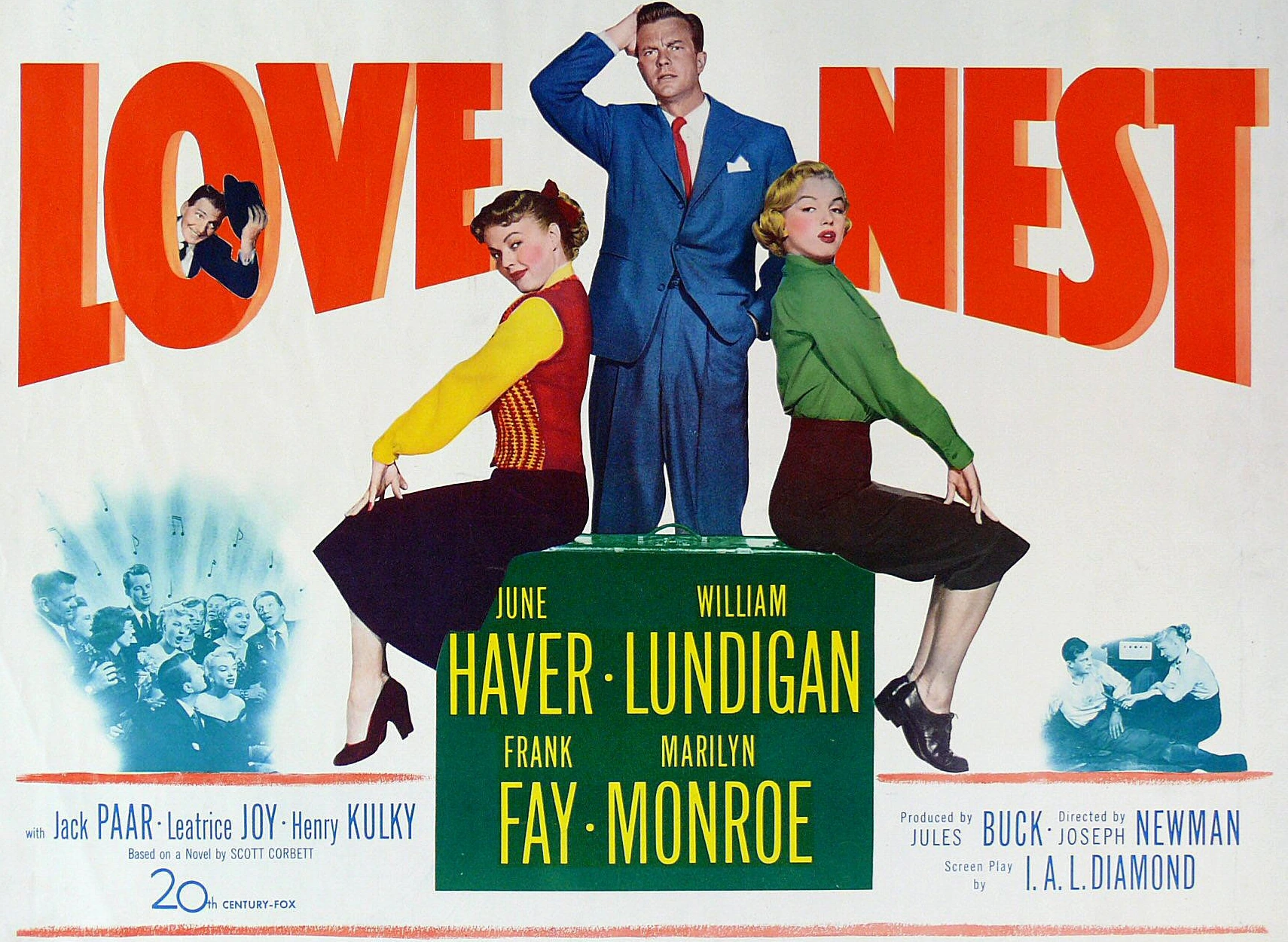
1/25:
I.A.L. Diamond was actually a good writer who frequently worked with Billy Wilder.
Using Scott Corbett's 1950 novel The Reluctant Landlord, he penned the screenplay for Love Nest.
The first half is too talky, but the verbosity is finally cut down during the second half, making for
a satisfying finish. For a while, I wasn't sure where the movie was heading, but everything had been
neatly tied up at the end.
I'm impressed with the filmmaking quality. It's not exactly a play due to the lack of theatrical
feel. June Haver and William Lundigan should be commended for carrying the show from start to finish.
Having failed to achieve enough popularity after this penultimate film of her career, the former married Fred
MacMurray, and they stayed together for almost forty years until his death.
Obviously, Frank Fay gives the best performance as the lothario. Not many know this, but he was the
most hated person in Hollywood despite being the first stand-up comedian in history. Also, he was Barbara
Stanwyck's first husband, and that's when she wasn't well known yet. Because of the failed marriage which
saw him go down in flames while her
career began to flourish, it served as the basis of A Star Is Born. Frank Fay didn't do many films
(only twelve in all), so this one was the final performance of his career.
Back to Love Nest, when the couple was slapped with a $800 bill to repair the electricity issue, I
was thinking why not take out a loan of $1,000 while putting up the building for collateral. No bank would
turn them down because it was paid for with $22,000. Regardless, they got lucky at the end. Either way,
I would've told them to keep holding on to the building because it's going to be worth over a million
dollars. Oh, yeah...Marilyn Monroe? She's way too stunning-looking, and nobody noticed that?
Impossible. Therefore, she was miscast.
All in all, the script for Love Nest just needs to be reduced by 20% to play better.
Love Stinks (1999)
Rate:
8
Viewed:
10/06, 11/19
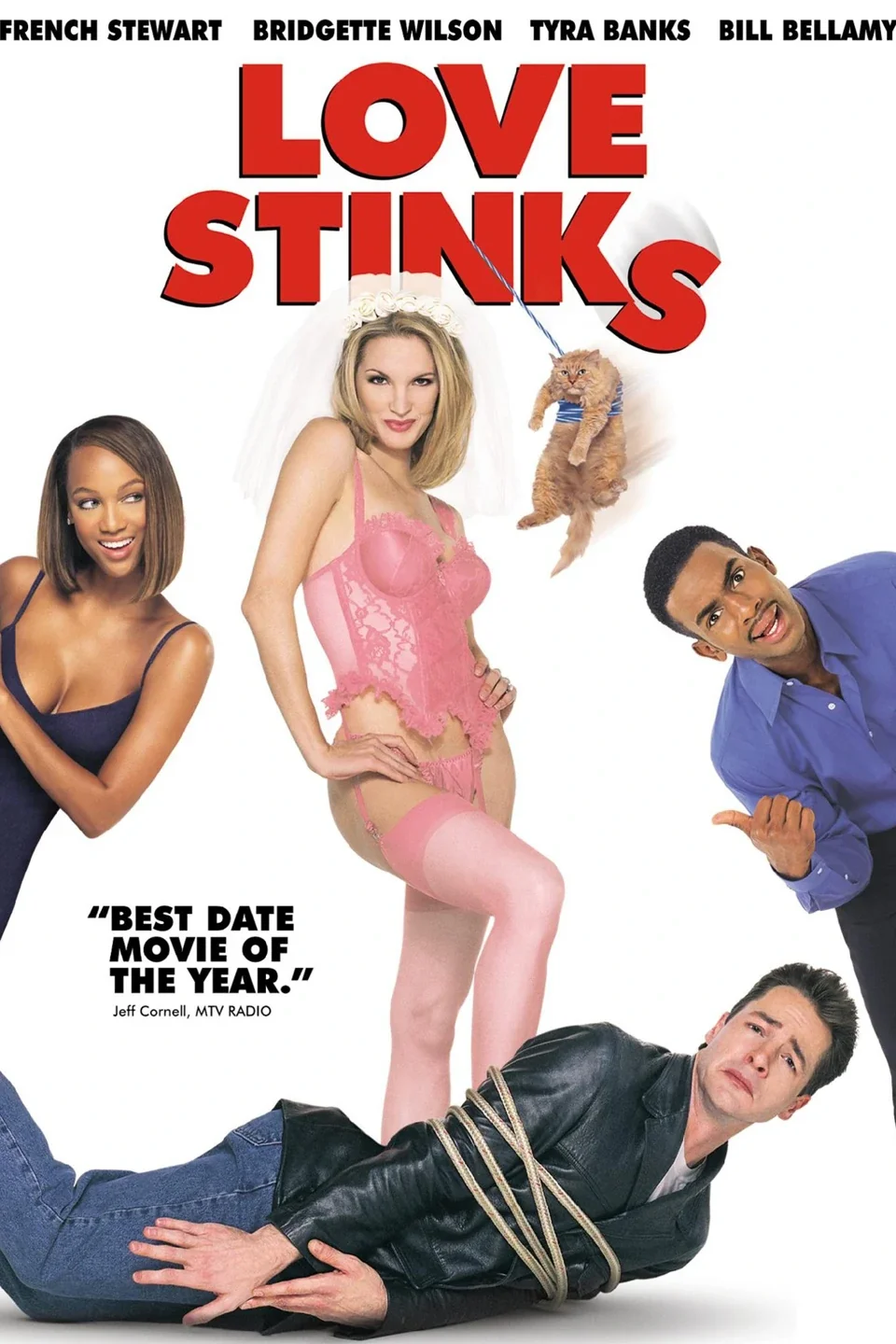
10/06:
What an excellent film Love Stinks is.
Sharing similar themes as The War of the Roses, it avoids the label of "clichéd" by letting the ending be a
total opposite of what I was expecting which is right on the money given everything that happened.
I didn't realize at first the director was Jeff Franklin. After looking up the internet, it turns out it's his first and only
directorial effort after writing the screenplays for Just One of the Guys and
Summer School.
French Stewart is fabulous, and he's a funny guy. However, the rest of the cast is okay. Several key elements that
led to Love Stinks becoming a terrific picture are as follows: the wonderful chemistry, the ingenious story
which has lots of ups and downs of a relationship, and the ending. I thought I would be disappointed by getting the common
Hollywood treatment but got pleasantly surprised.
All in all, Love Stinks is a charmer.
11/19:
My rating for Love Stinks remains unchanged.
It's still an excellent, well-written picture from the one-time director Jeff Franklin who wrote the screenplays for
Just One of the Guys and Summer School
and created two TV sitcoms: Full House and
Hangin' with Mr. Cooper.
As he was in 3rd Rock from the Sun, French Stewart is funny as ever. Married to Pete Sampras, Bridgette Wilson
isn't bad as the biggest bitch and plays well with her co-star, but she wears too much makeup constantly, even to bed.
On the other hand, I hate Tyra Banks, who's more interested in looking good than anything else, and don't
care much for her character. She and Bill Bellamy make things worse by their exagerrated acting, often trying to preclude
Love Stinks as an all-around solid movie.
An anti-Valentine picture, it speaks to those who are against the idea of marriage which is thought of as a major financial
trap when things go wrong. Divorce rate in the United States remains the highest compared to other countries. The other
reason is the unwillingness to surrender freedom and independence in exchange of being stuck in an institution. Hence, they're
putting off marriage to later by wanting to spend more time on themselves while contemplating their future.
All in all, Love Stinks doesn't get the respect that it deserves.
Love Story (1970)
Rate:
2
Viewed:
4/05, 1/09
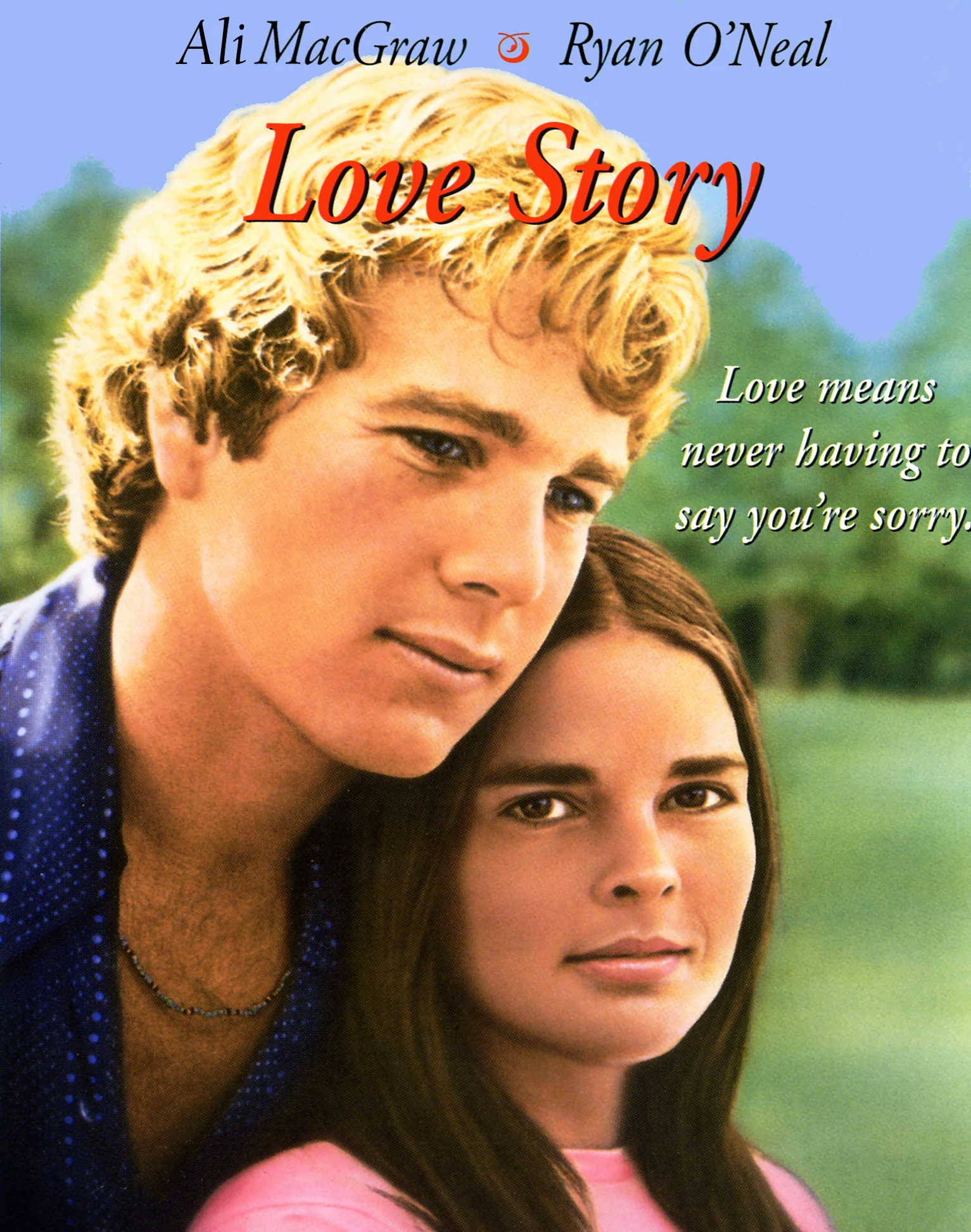
4/05:
Full of sappy bullshit, Love Story is the most overrated film of 1970 although it saved Paramount Pictures
from bankruptcy.
"Love means never having to say you're sorry" is the corniest line of the decade if not all time. This is the
movie that transformed Ali MacGraw into an overrated actress. She'll do one more before disappearing from
Hollywood for good. If not for her overnight fame, she would've never been married to Steve McQueen.
Plain and unconvincing as Jenny, Ali McGraw is annoying like fingernails scratching on a chalkboard. Profanity
comes out of her mouth unnaturally. Ryan O'Neal manages to keep things as real as possible, but the phony acting
hurts him constantly.
I appreciate the straightforward, direct communication between the two principal characters, but it hasn't
strengthened their chemistry. In fact, there isn't any. That's why when Jenny died, I was like, "Uh, bye." Happily,
young Tommy Lee Jones makes his motion picture debut. Who knew he would end up being an Oscar winner down the road?
All in all, I can't believe people fell for that bullshit in Love Story en masse.
1/09:
The corniest line of 1970 is: *drum roll* "Love means never having to say you're sorry"!
Come on up, Love Story! You just won a year's supply of corn from Nebraska. The movie is so terrible that
it has become more and more of a Ripley's Believe It or Not! tidbit for saving Paramount Pictures from
the brink of collapse. How the two lead thespians, Ryan O'Neal and Ali MacGraw, got Oscar-nominated for their
roles is beyond me. They're terrible and have little chemistry. When Ryan O'Neal and Ali MacGraw deliver their
lines, it feels forced and unnatural.
The plot is underdeveloped and fails to explain the bitter relationship between the father and his son. Otherwise,
it's been an endless cycle of corny lines, kisses, car rides, and snow activities. Speaking of car rides, I can't
believe they kept the top on during the middle of the winter. Perhaps that's why Jenny died of leukemia.
All in all, Love Story is corny with a capital C.
The Loveless (1981)
Rate:
5
Viewed:
5/25
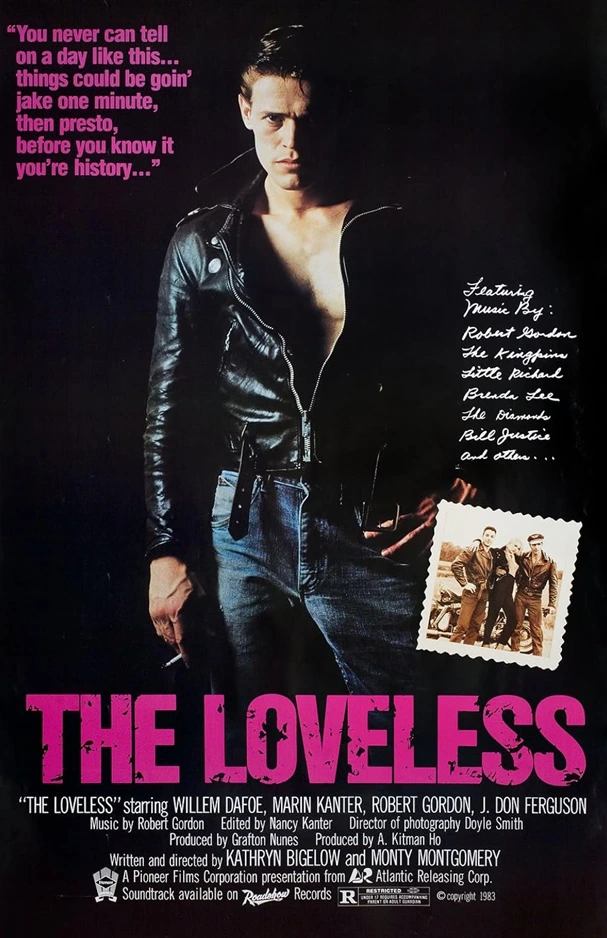
5/25:
If you are into black leather and motorcycle gangs of the 50's, The Loveless will do.
Sure, there are heavy reminders of The Wild One and
The Lord's of Flatbush, but the pace is very, very, very slow. I
thought about giving The Loveless a '2', but it got better over time by focusing on the ambience which
was shot along U.S. Route 17 in Midway of Liberty County, Georgia.
The characters just take it easy and get through the day in their own way. How the movie is shot is extremely
well-done. I wish the first half was done the same way as the final thirty minutes due to the pickup
in the tempo. Nostalgia is derived by the motorcycles, cars, and product placements and the simplicity of the
locale. The red convertible is obviously anachronistic as it's a 1960 Chevrolet Corvette.
The only reason anyone will give The Loveless a look is Willem Dafoe, It's his first movie;
Heaven's Gate doesn't count. Marin Kanter might have shown some
potential, but her career didn't go anywhere soon after. The rest of the cast isn't good at acting, but they
look realistic by not being too glamorous.
All in all, The Loveless is more about the 50's feel than anything else.
The Lover (1992)
Rate:
3
Viewed:
3/20
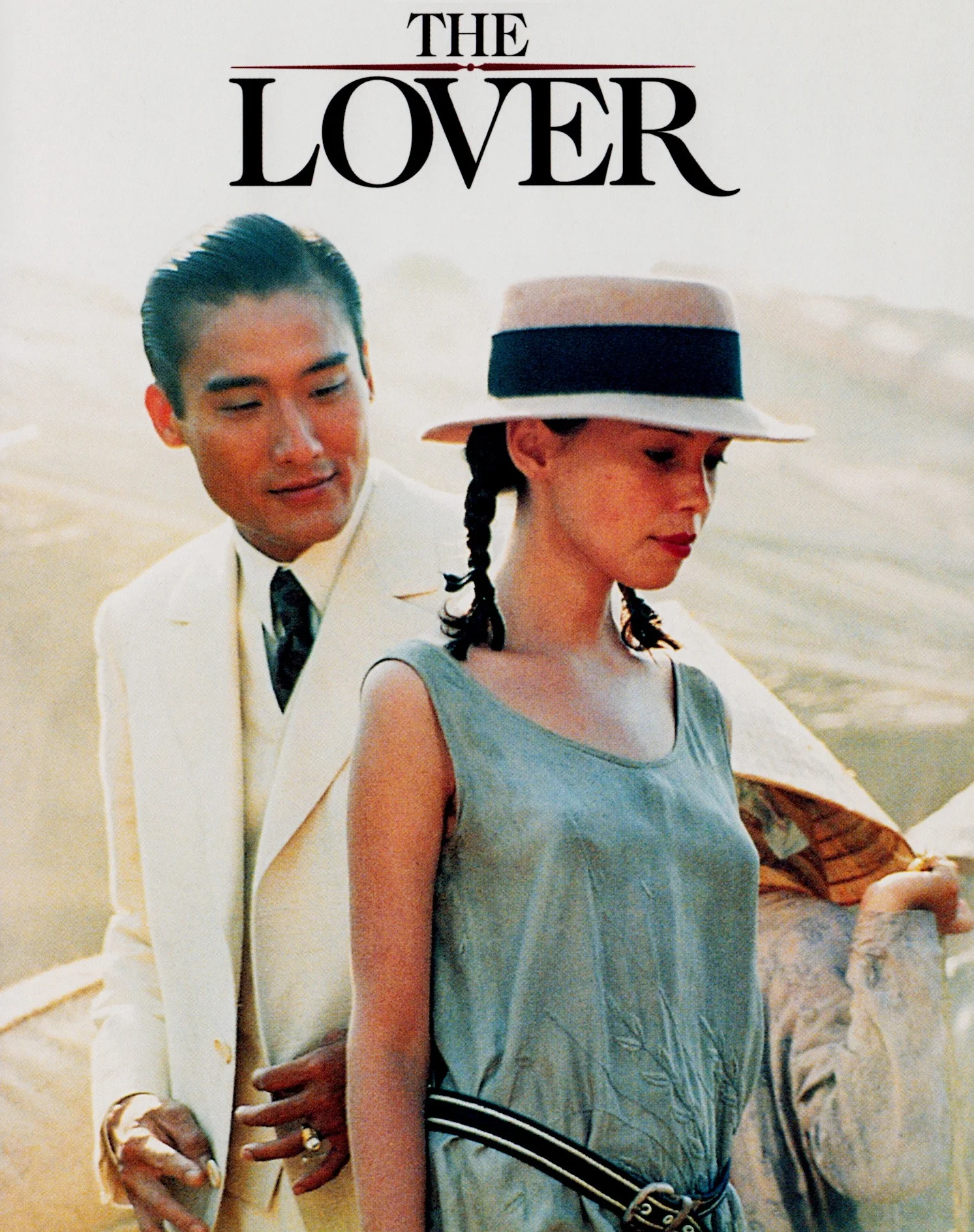
3/20:
The Lover is about sex, sex, sex, sex, and sex.
Have I missed anything else? Good, that's settled. The sole reason why I picked it up is Jane March. She hadn't been
in a notable film besides Color of Night. What the heck happened to her afterwards?
Well, going back to what I said, The Lover is all about Jane getting it on with Tony Leung many times. There's no
doubt that the sex was for real. Director Jean-Jacques Annaud says otherwise, but I don't believe him. Yet where's everything else?
Where is the story? What am I watching the film for? Why do I need to see a man and a woman having sex? But is that what pornos
are for?
The cinematography is fine, but the two characters wearing the same nice-looking clothes, exactly as displayed in the
movie poster, every single day is tiresome. They need a bigger wardrobe.
All in all, please, Jean-Jacques...produce a story, or the film dies.
Loverboy (2005)
Rate:
1
Viewed:
8/07
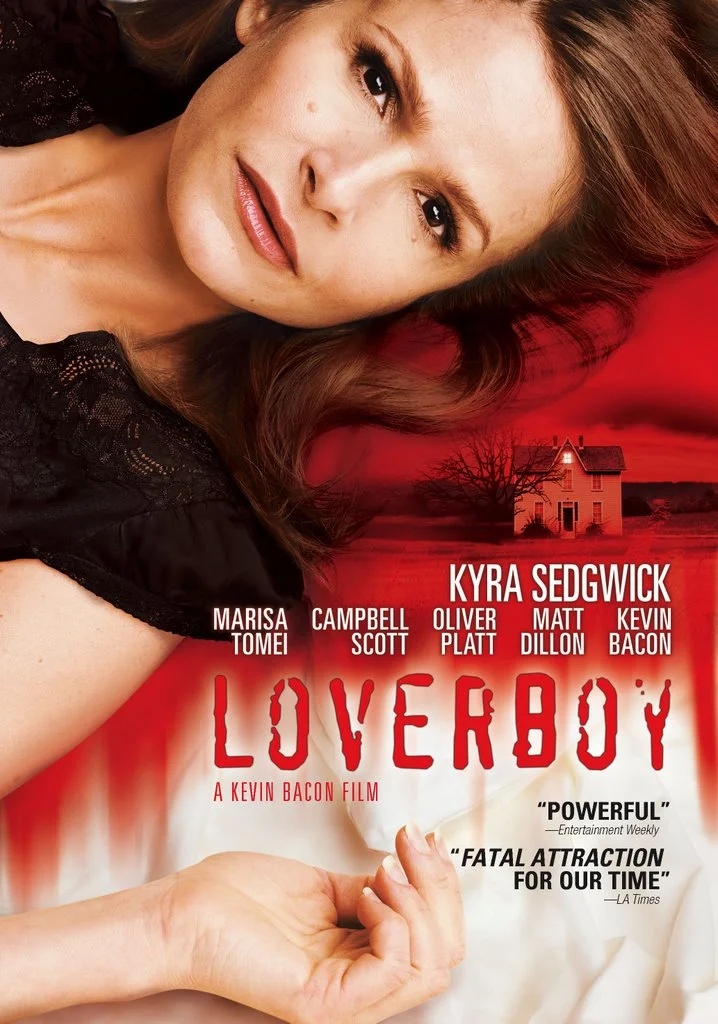
8/07:
Loverboy is painful to watch, cheesy enough to be compared with a lot of bad films, and is so poorly directed that
Kevin Bacon should stick with what he's good at: acting.
The film is a cross between Divine Secrets of the Ya-Ya Sisterhood and
What Ever Happened to Baby Jane? It fails
to explain anything about protagonist before she's judged to be legally cuckoo. Worse, I can see everything
coming a mile ahead before it happens.
The plot makes no sense, either. Oddly enough, the writer of the screenplay is...hold your laughter, please...Hannah
Shakespeare. Is that her real name? The amount of cheesiness she pours on is high. I've had the damnedest
time believing that Kyra Sedgwick plays a young adult. When the film was made, she was 40. Regardless, Kyra
Sedgwick, a weak Julia Roberts clone, has never been a good actress to begin with.
As for the cast, there are many from Kevin Bacon's circle of friends as evidenced in other films such as
Singles,
Flatliners, Gun Shy, and
Wild Things: Kyra Sedgwick, Matt Dillon, Oliver Platt, Campbell Scott, and
Sandra Bullock. Anything for Kev, eh?
All in all, I highly doubt that Kevin Bacon will direct a feature film again.
A Low Down Dirty Shame (1994)
Rate:
2
Viewed:
11/13
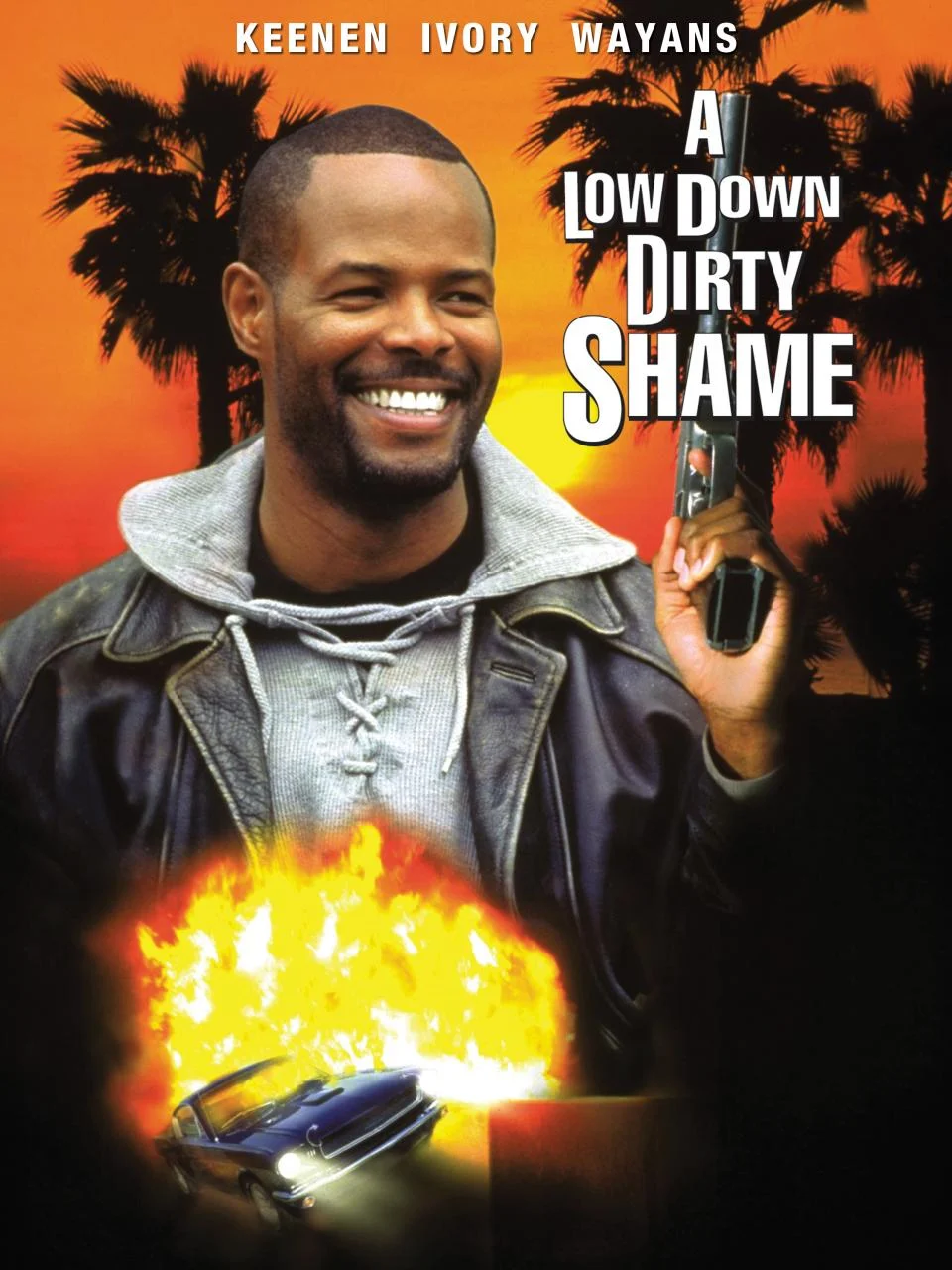
11/13:
A Low Down Dirty Shame is a god-awful picture that relies on too much stupidity to get by.
I got confused after watching it a bit and asked myself, "Whose show is this supposed to be: Keenen Ivory Wayans' or Jada
Pinkett's?" At any rate, it's safe to say the low down dirty shame for him was giving her the role because she killed the film,
plain and simple. It's like watching a female version of Will Smith who won't shut the hell up. Ironically, they married each
other.
Notice how Keenen Ivory Wayans' hair is growing quickly daily. On the other hand, there's a stupid
Shaft getup going on
for his character who drives an expensive automobile when he's supposed to be broke. The action scenes are beyond stupid. By
now, I've been using the word "stupid" a lot, but it's what the film has been: stupid.
All in all, A Low Down Dirty Shame is that I watched it.
Lucas (1986)
Rate:
7
Viewed:
10/11

10/11:
Lucas is a charming film, but unfortunately, it's hard to stomach Corey Haim who plays the titular character.
Lucas is darned annoying when he's moping around and whining for attention. He becomes easy to hate because of his
selfishness. On the other hand, the film doesn't say much and has many undeveloped subplots. Hence, I'm left
with more questions than answers.
A lot of times, the story is a perfect example of Bullying 101. Oddly, for some reason, the movie starts out
as a sappy, offbeat romance. Then, it's a drama before changing to comedy before settling for a tearjerker.
If I were Lucas, I would go for Winona Ryder's character over the redheaded
Goonies girl.
All in all, Lucas works well for the most part, but it's Corey Haim who's irritating to put up with.
Lucky Numbers (2000)
Rate:
6
Viewed:
10/14

10/14:
I spotted Lucky Numbers on the DVD shelf at the library, but I had never heard of it before.
Made for $65 million but grossed a paltry $10 million, it's easy to see why the film remains obscure. The setting is
interesting as it takes place in Harrisburg, the state capital of Pennsylvania, because the residents around there and
Philadelphia have an obsession with the news reporters, most especially meteorologists.
The Delaware Valley is where Action News-Channel 6 has been entrenched as the number 1 local news station since ever. Let us
not forget to mention the juicy scandal involving Alycia Lane and Larry Mendte. Then, there's the Pennsylvania lottery fix
which occurred in 1980. Back to the film, John Travolta is the star of the show who has the "it" factor. If you listen to
the commentary, everybody was glee about working with him. It's exactly why I gave Lucky Numbers a try.
John Travolta is excellent, making the movie funny. Lisa Kudlow, whom I wasn't initially gaga over,
does a great job of playing the femme fatale which gives the film a certain neo-noir quality at times. The
dialogue is well-written, letting the time fly by fast. Of course, the tractor-trailer was going to jackknife.
The most unbelievable is the casting of Michael Moore. Yes, the same Michael Moore of Roger & Me,
Fahrenheit 9/11, and Bowling for Columbine fame. When I saw his face, I was like, "Is that really him? Michael
Moore?" I couldn't believe my eyes. Anyway, he's good and also funny, playing the best character by far. In
reference to him, John Travolta said the funniest thing I heard in years: "There's enough mist in this thing to save ten
masturbators!" It perfectly sums up Moore's deceased character in one sentence.
As for the negatives, the whole thing is shallow and hard to believe. Everything looks modern. Hence, there's no point in
setting the time to 1989. The outcomes aren't realistic because, sooner or later, the state authorities will be smart enough
to smell the fraud due to the suspicious pattern in the number of winning tickets. As a matter of fact, everybody involved with
the Triple Six Fix case had to serve time in prison. Tim Roth's character is redundant,
having reminded me of Reservoir Dogs
and Pulp Fiction. Bill Pullman's dumb cop skit goes too far to discredit the film and therefore shouldn't be included.
All in all, Lucky Numbers is an uneven comedy picture, but it's fun to watch.